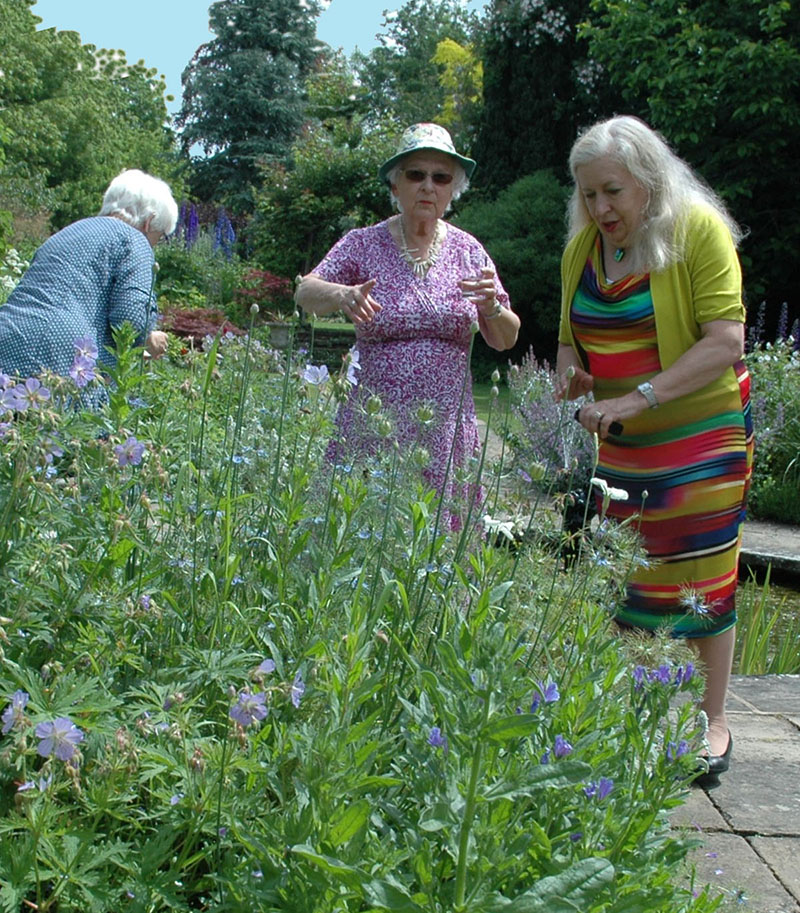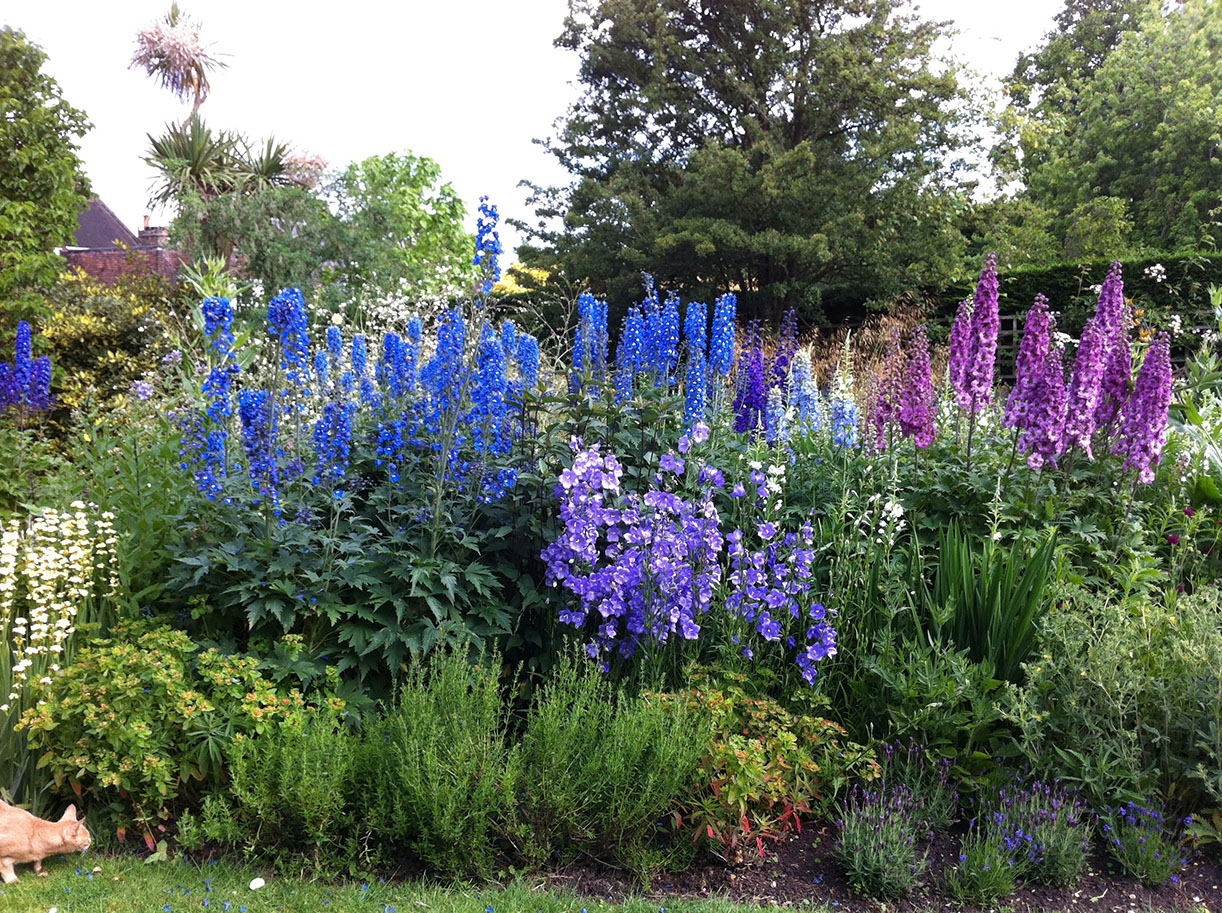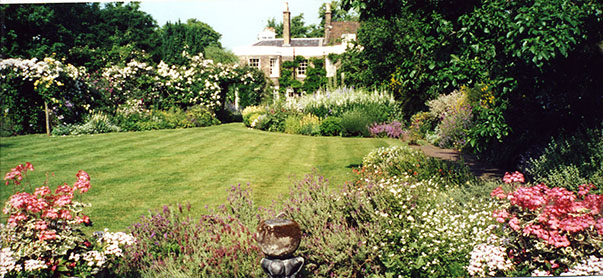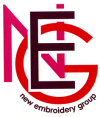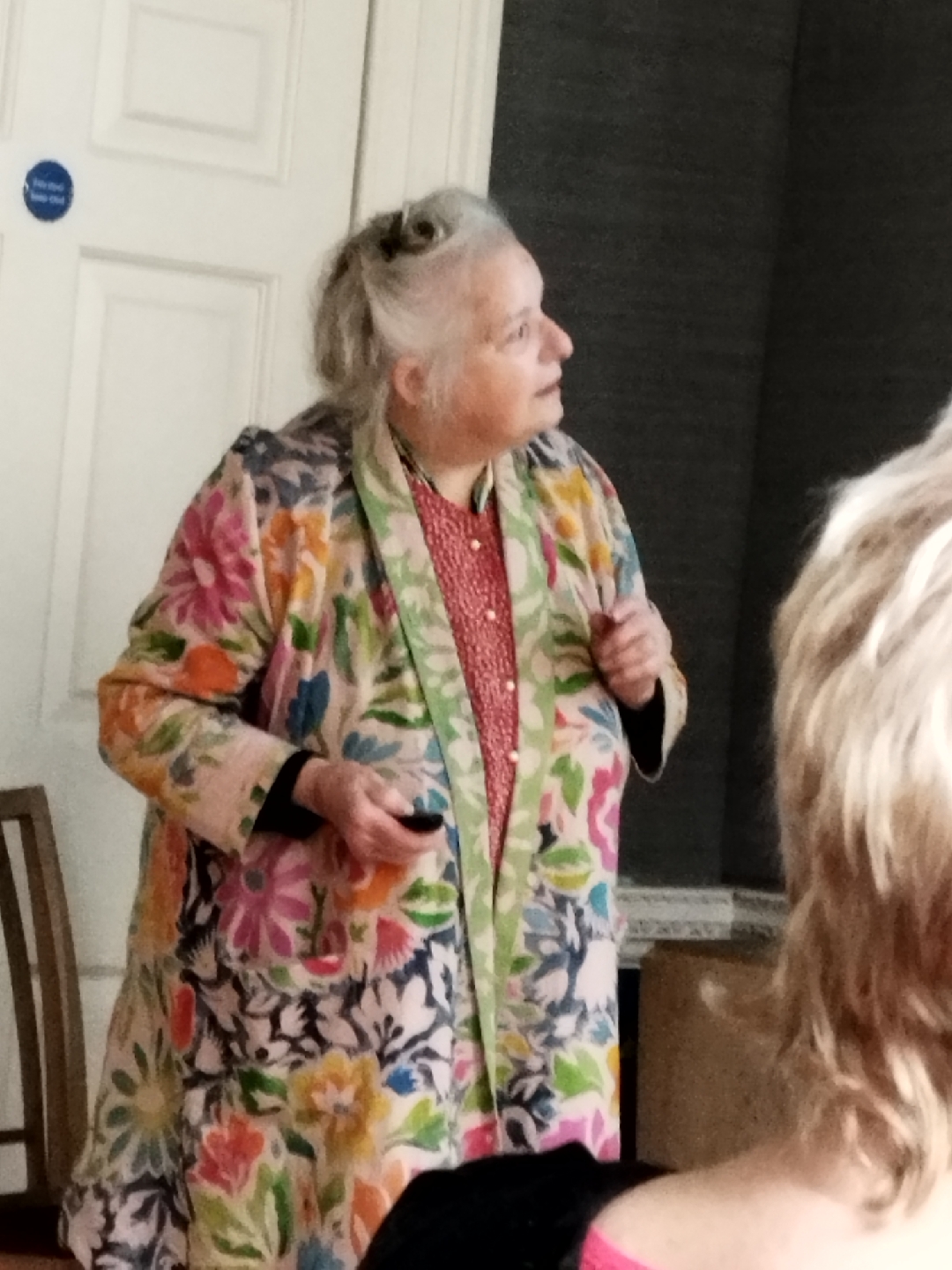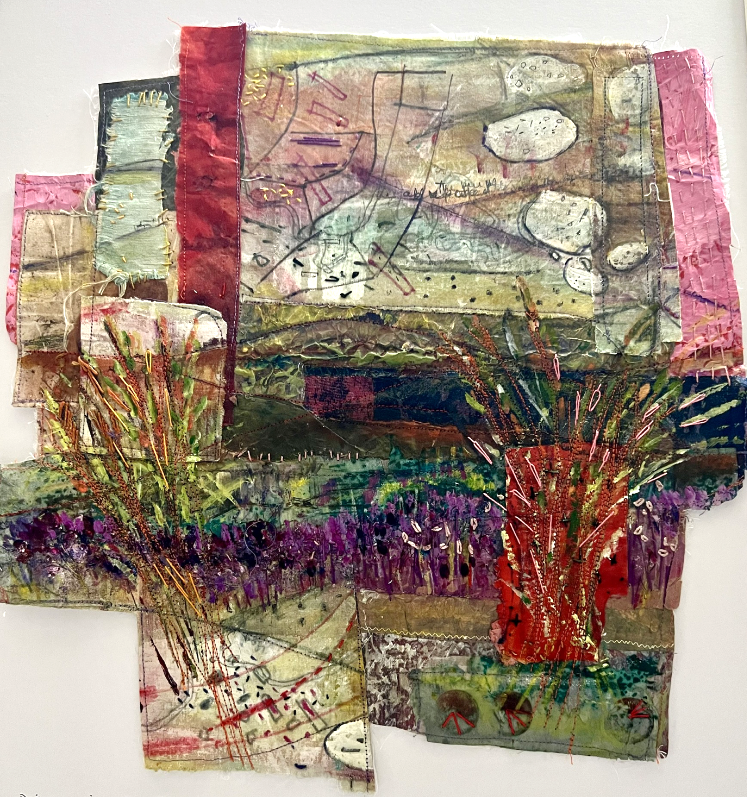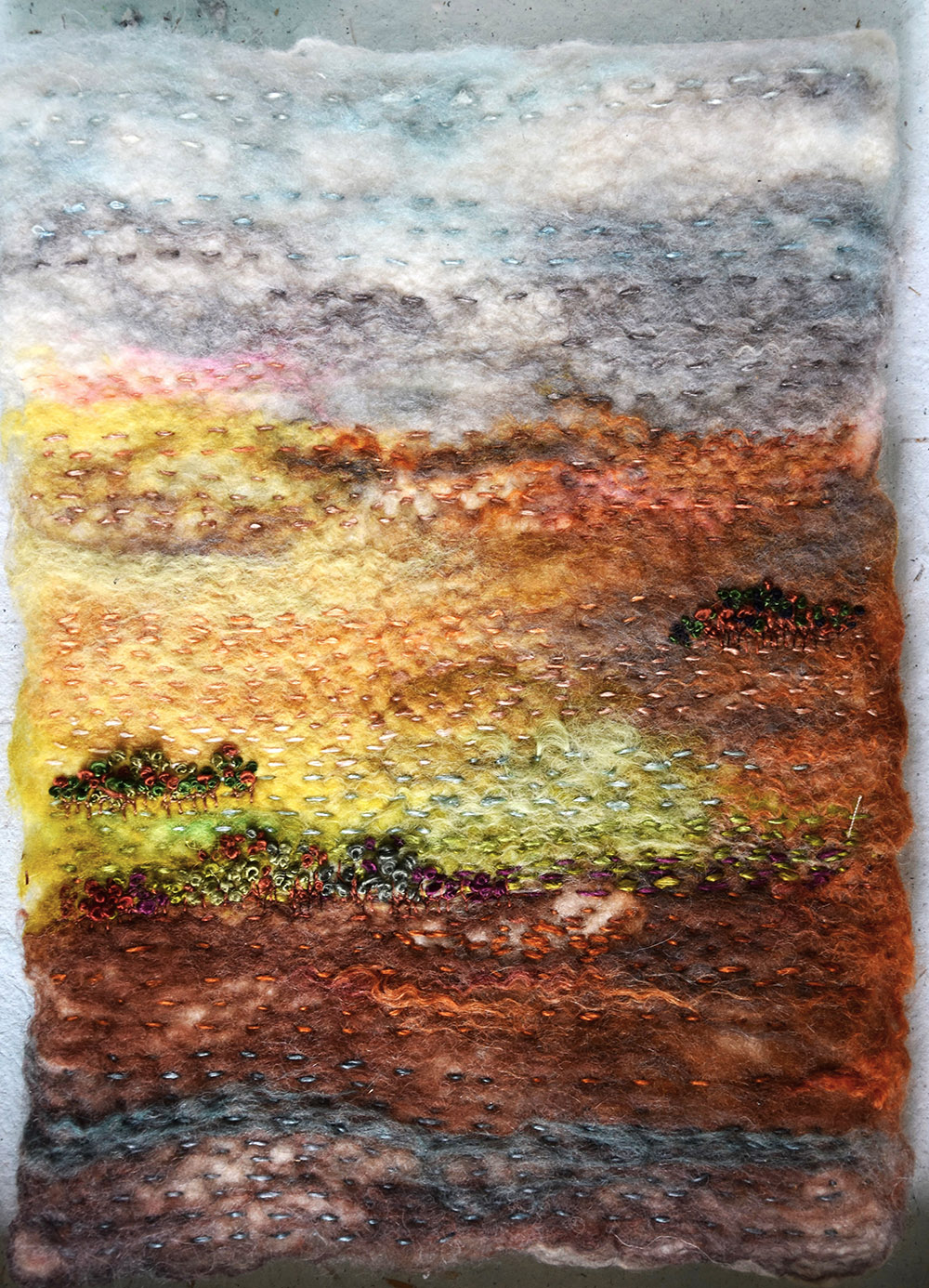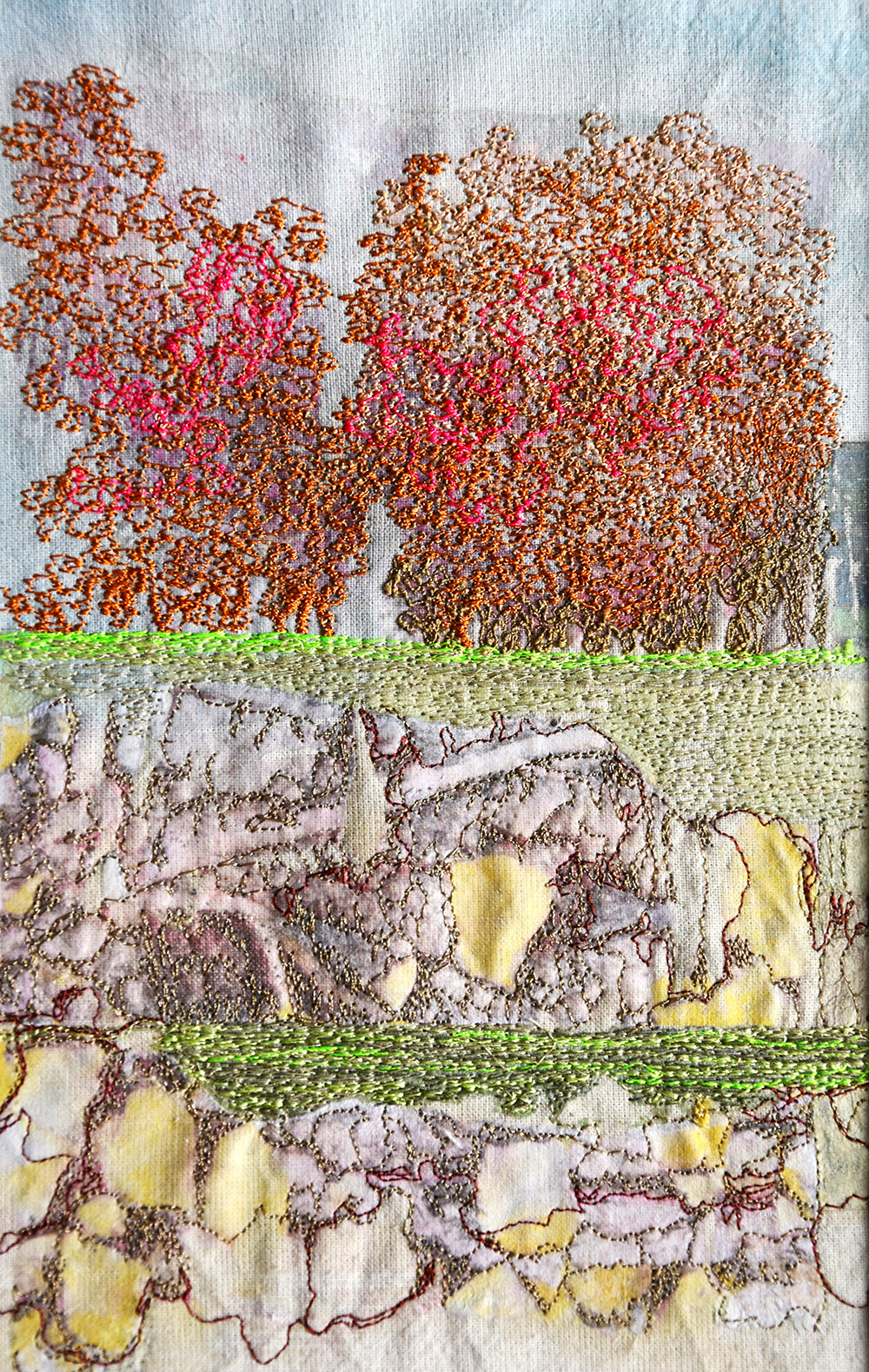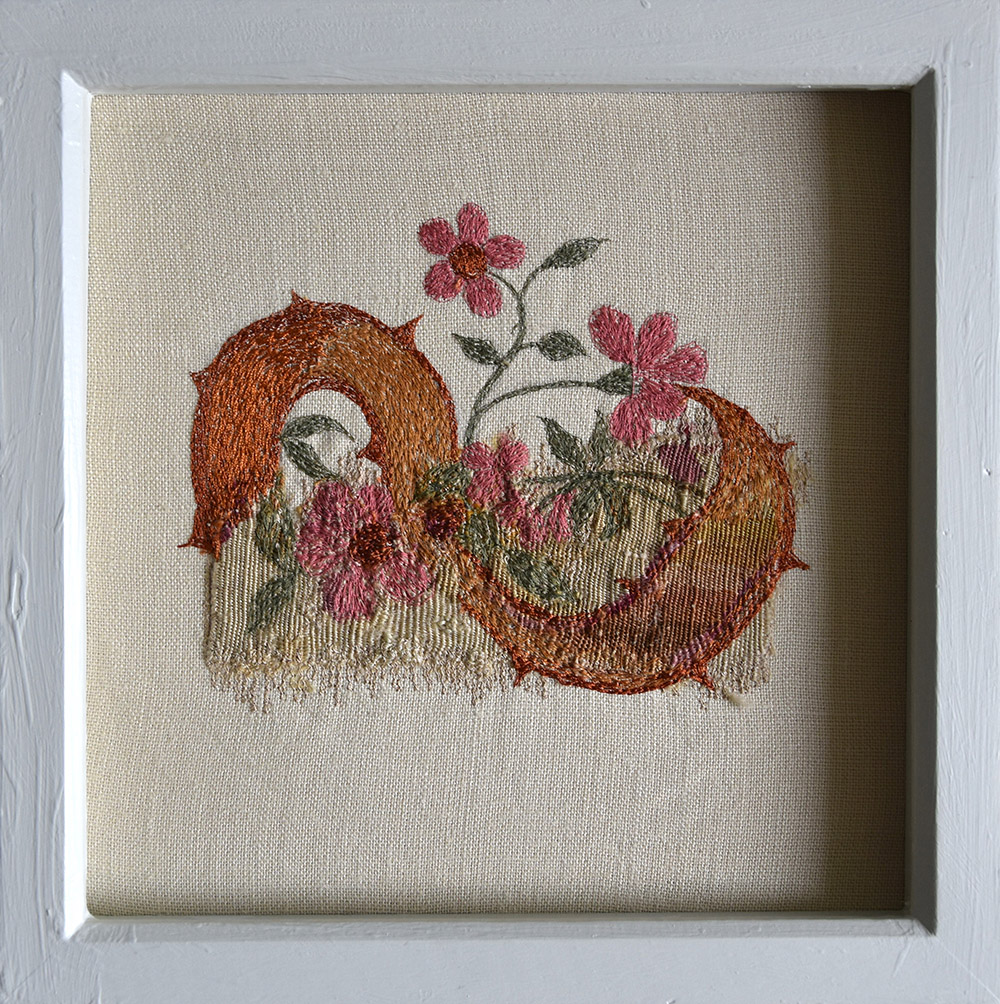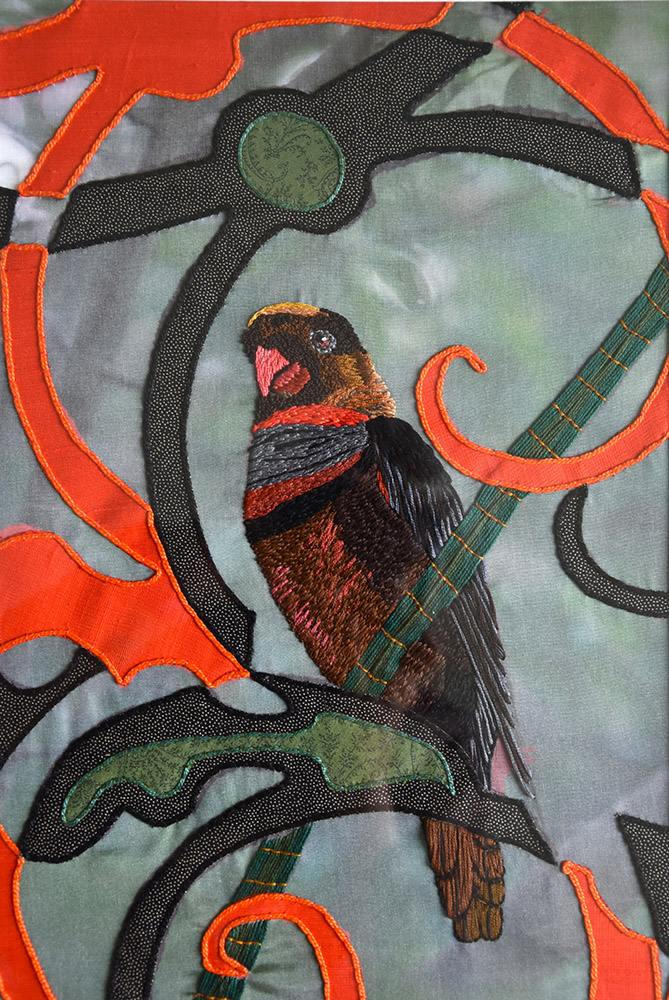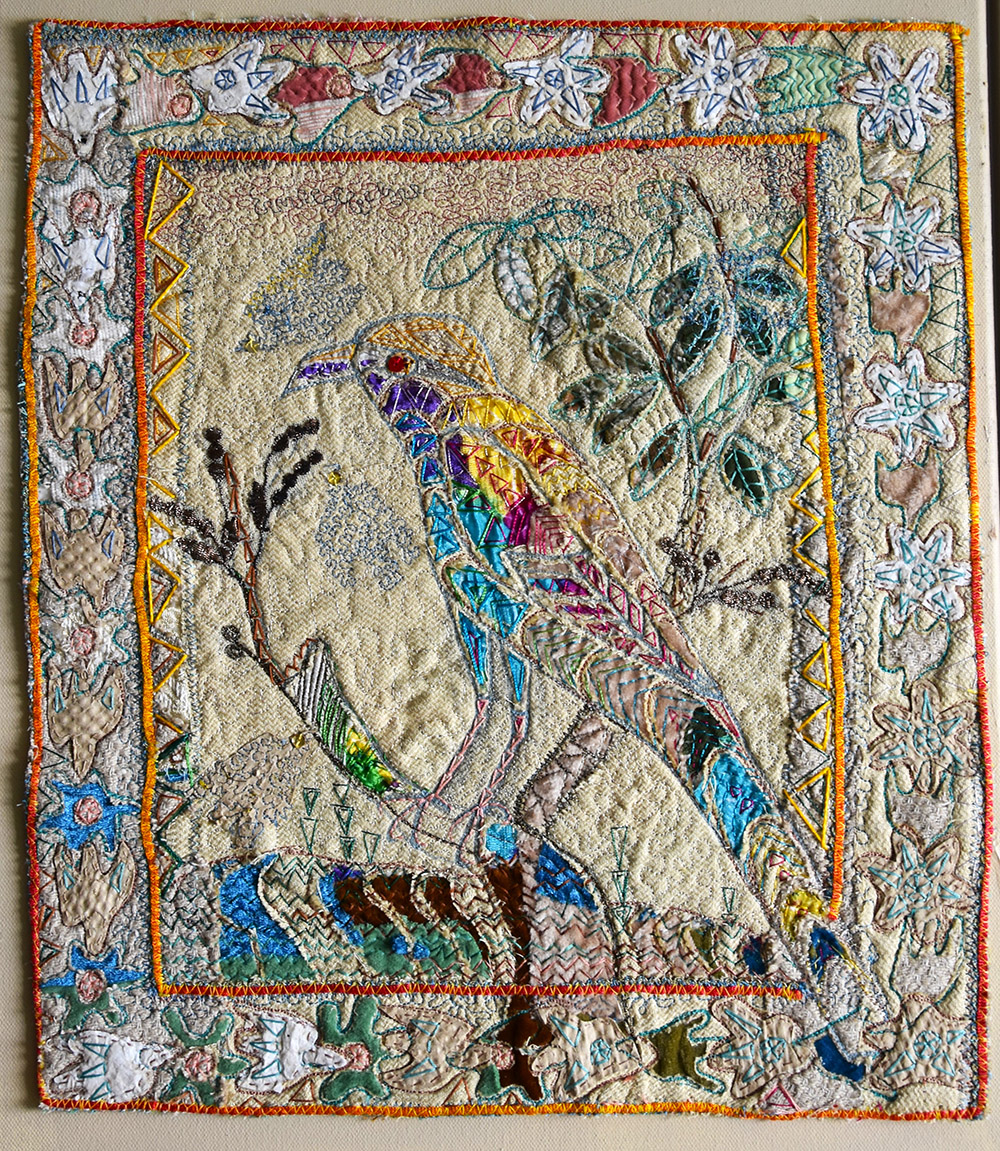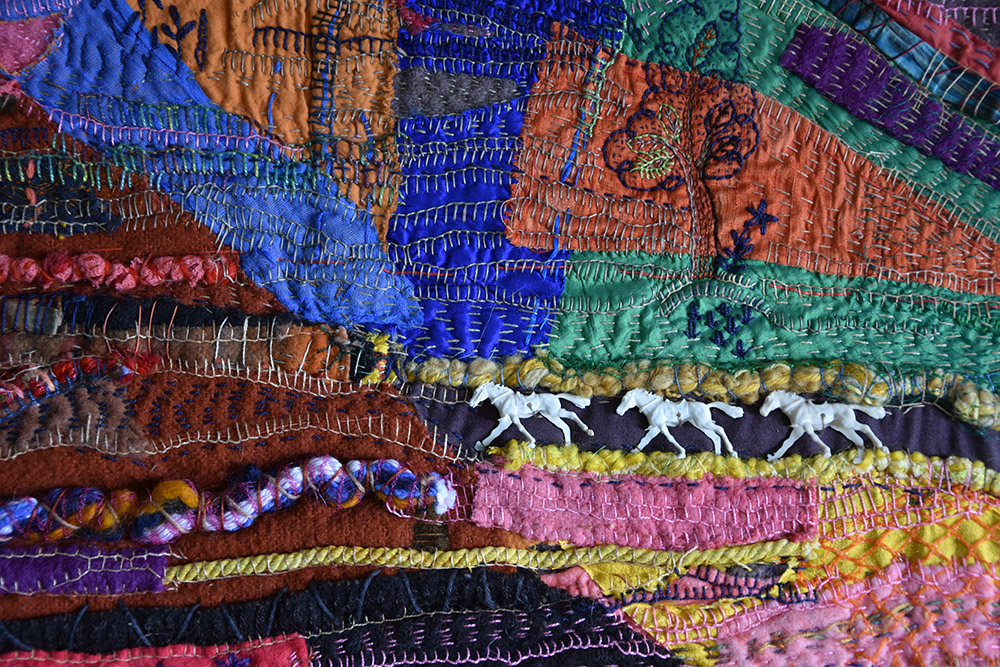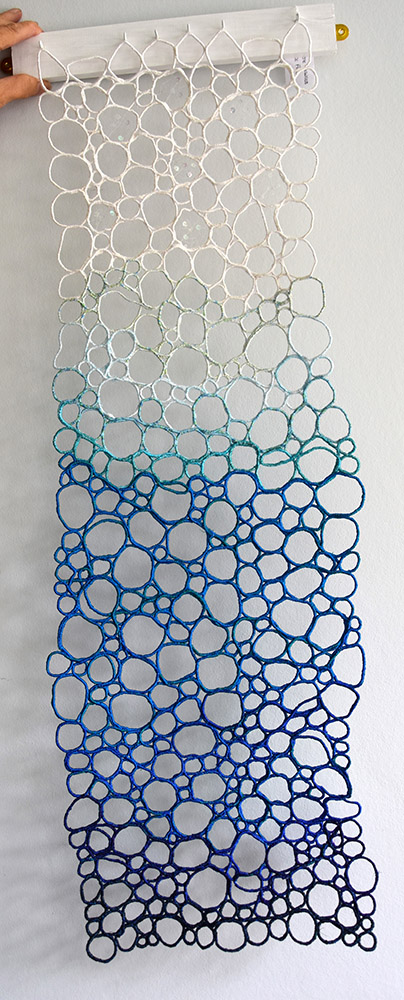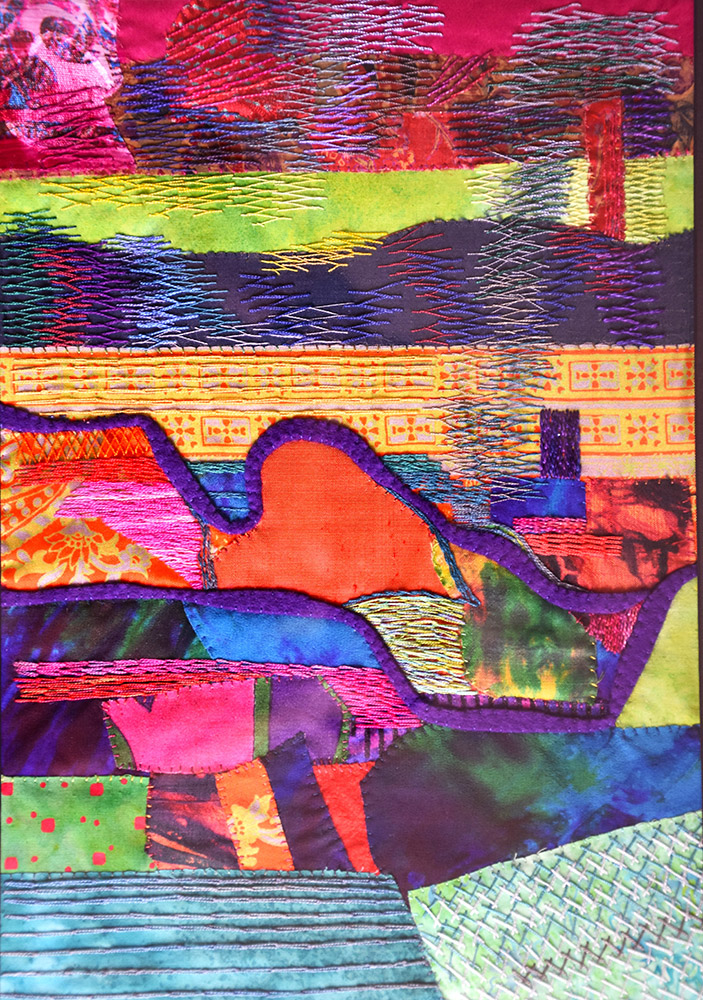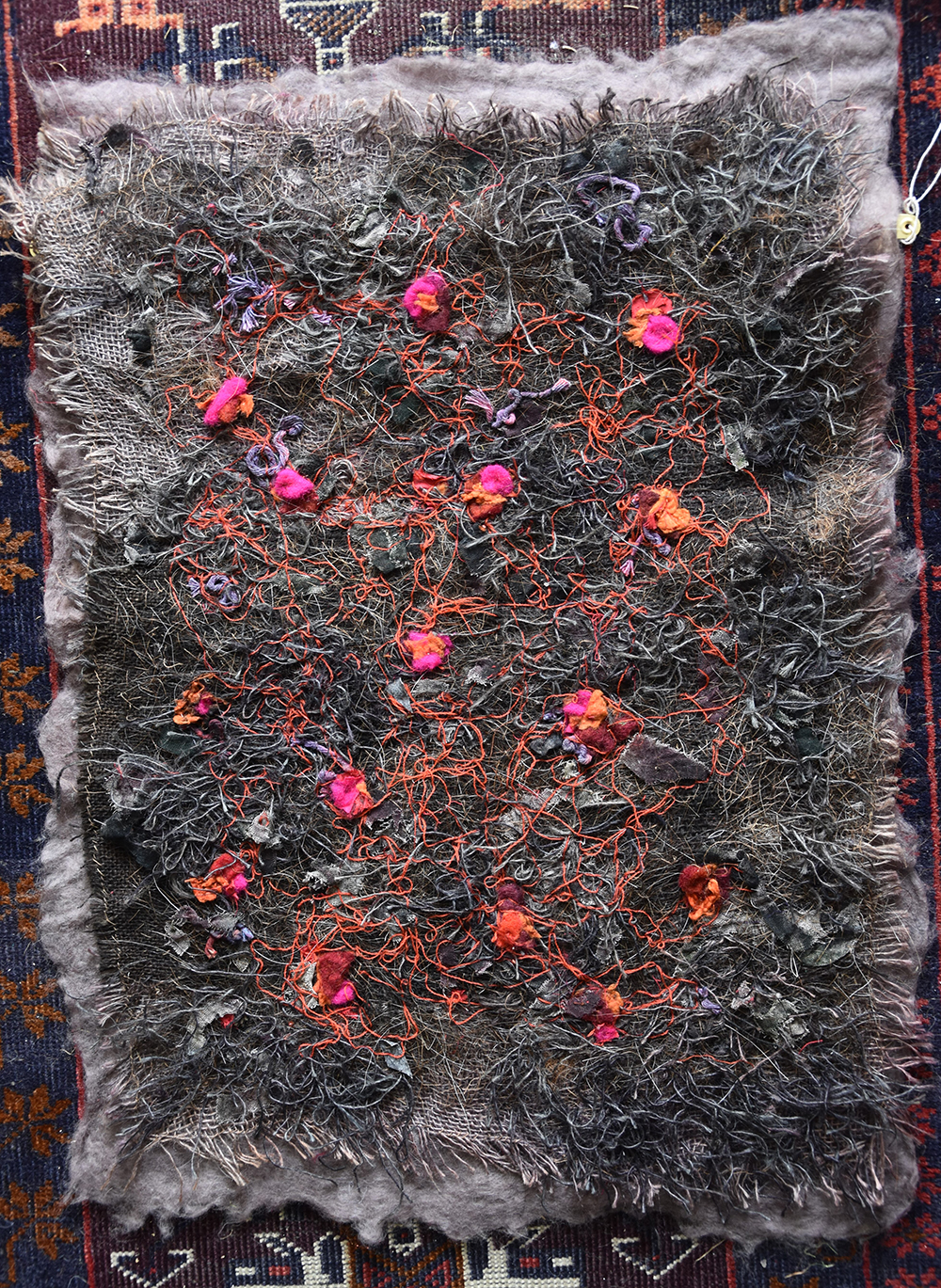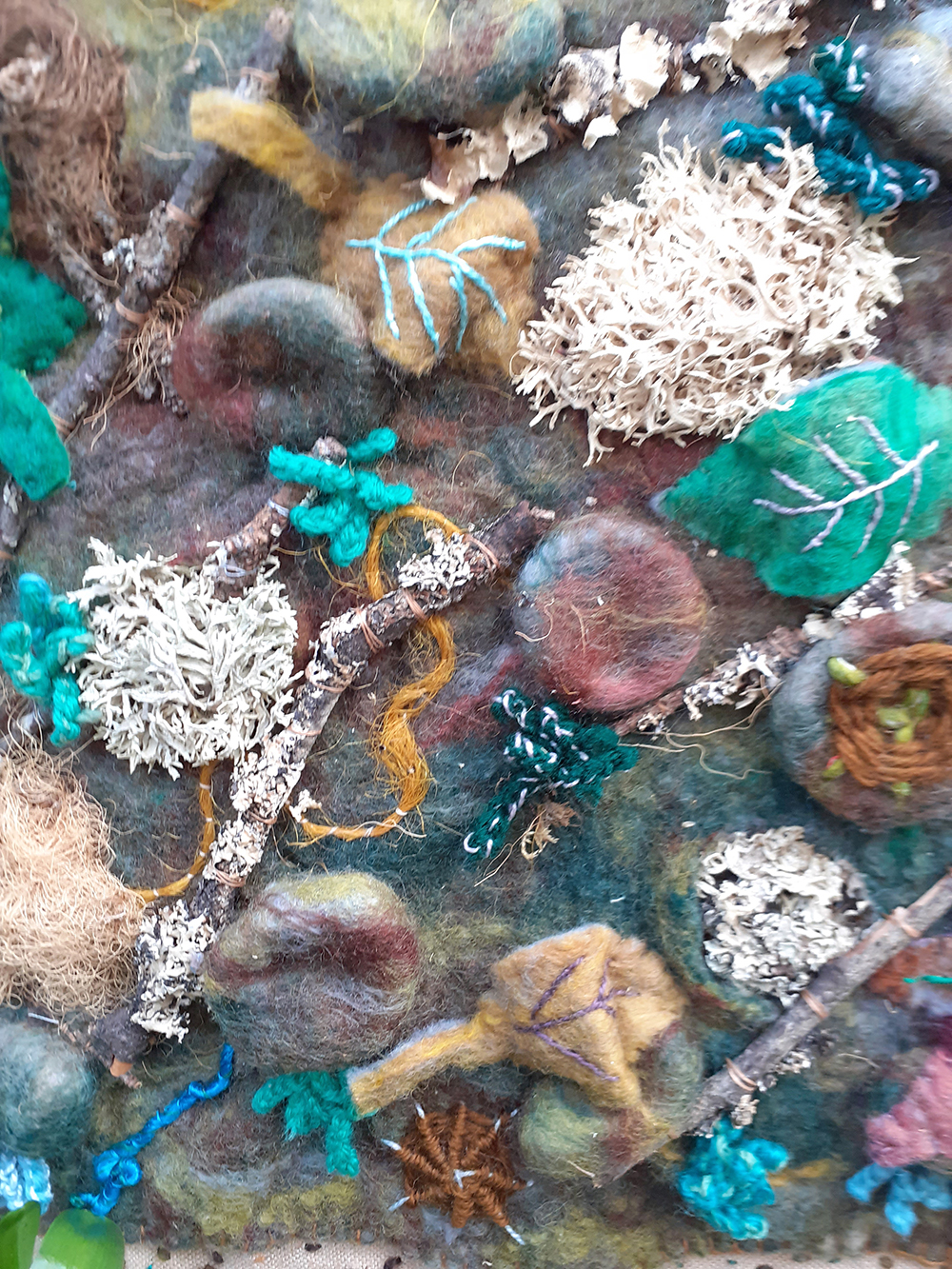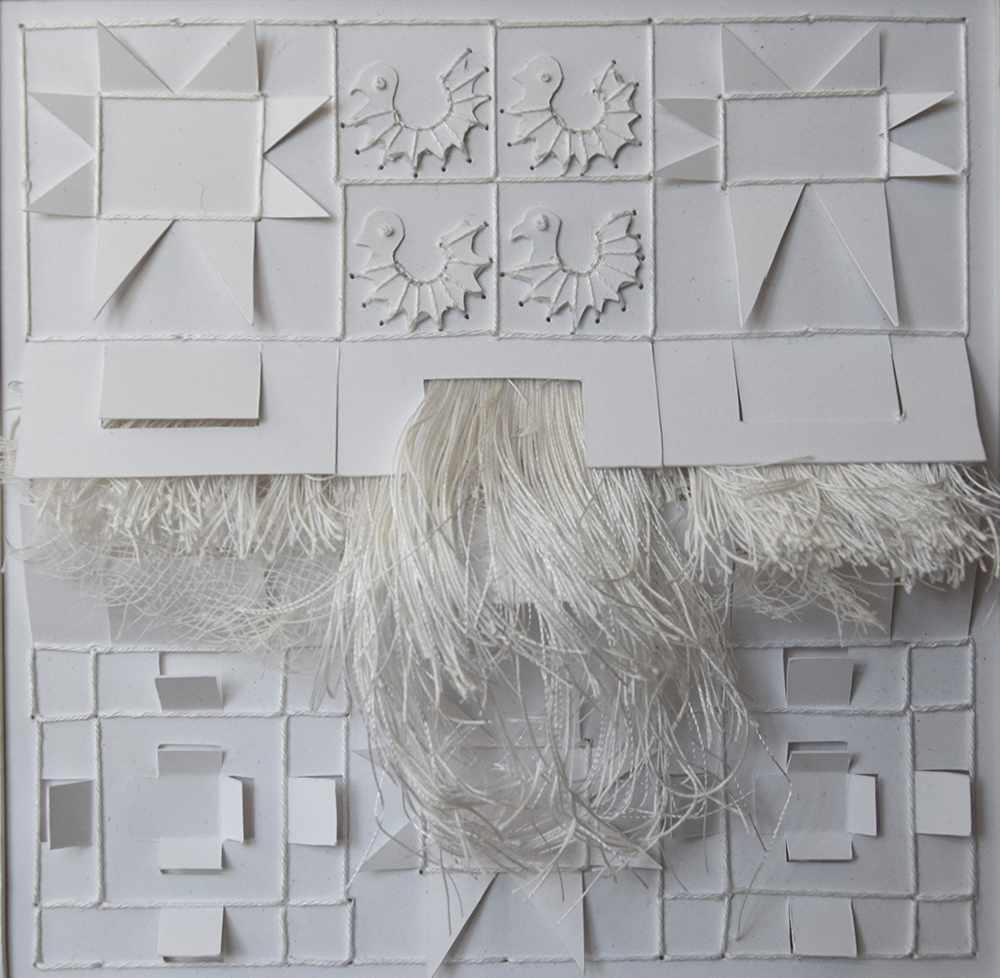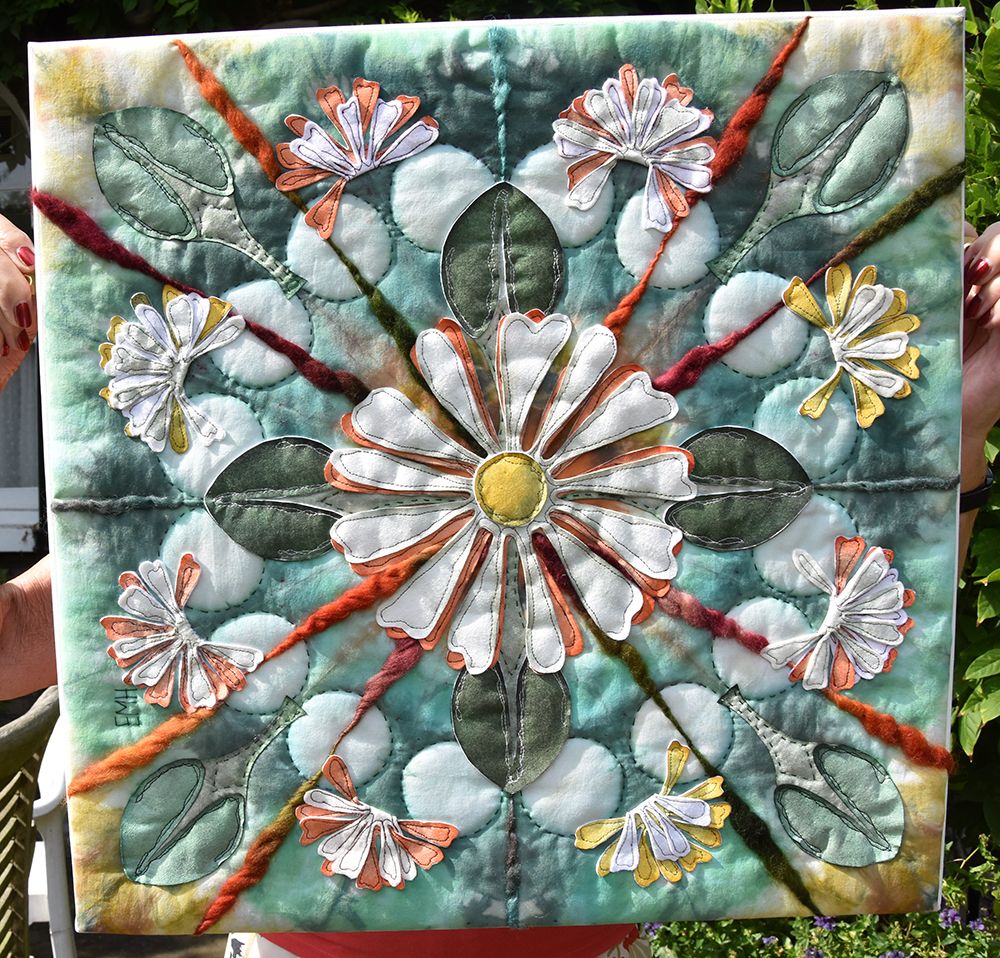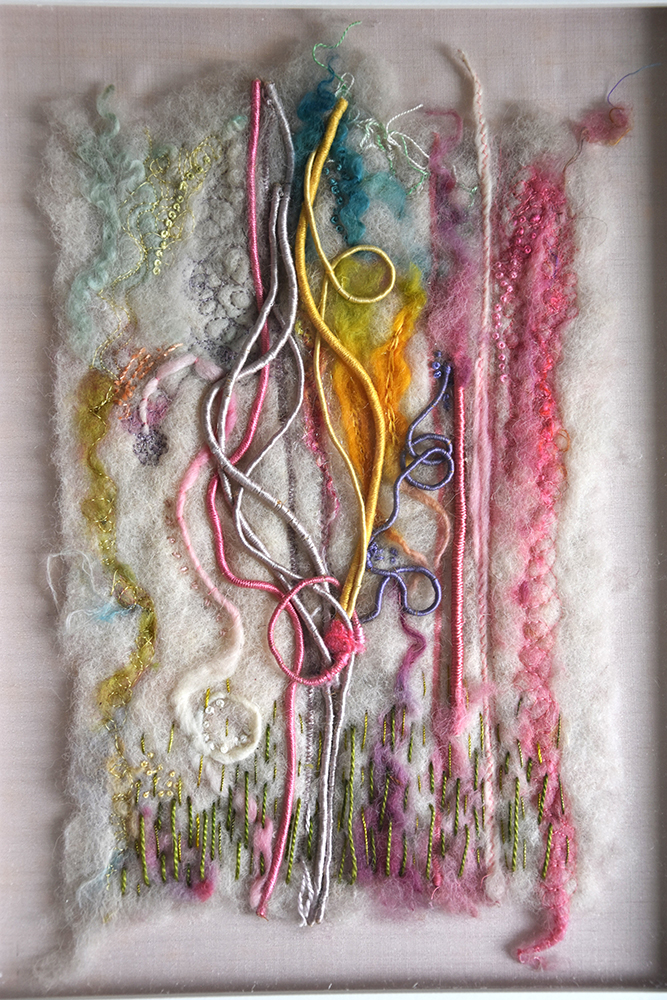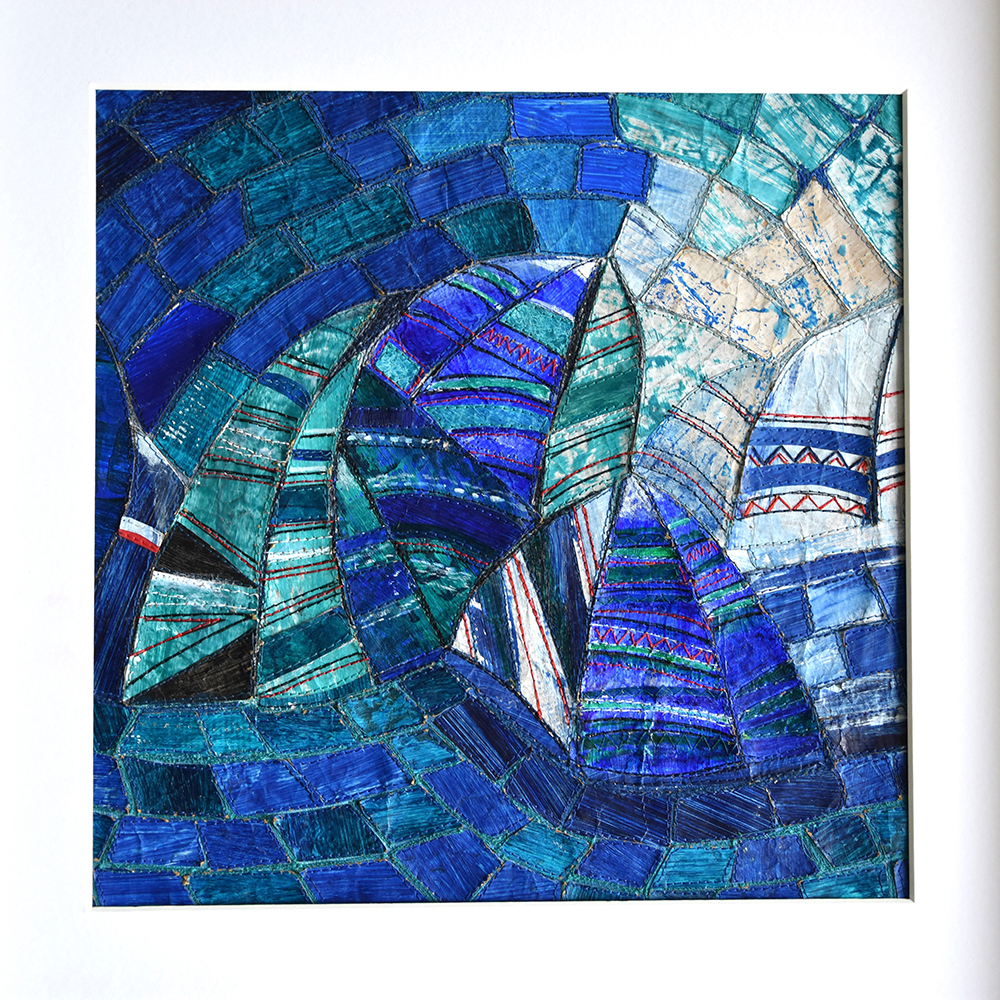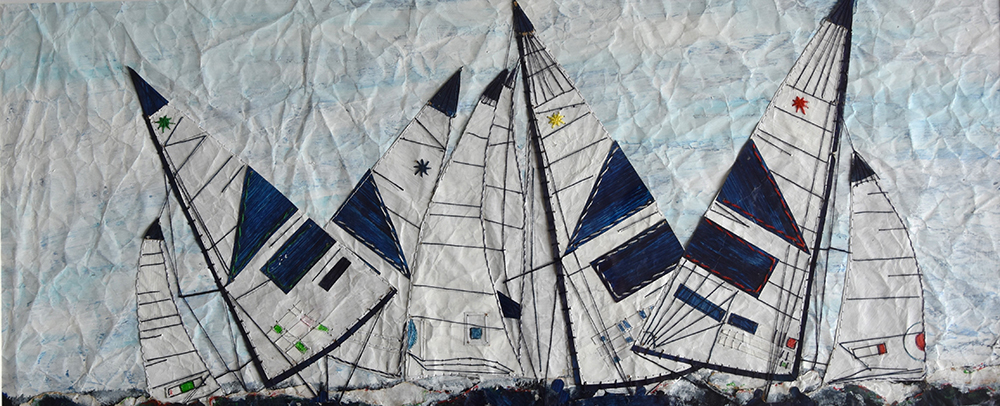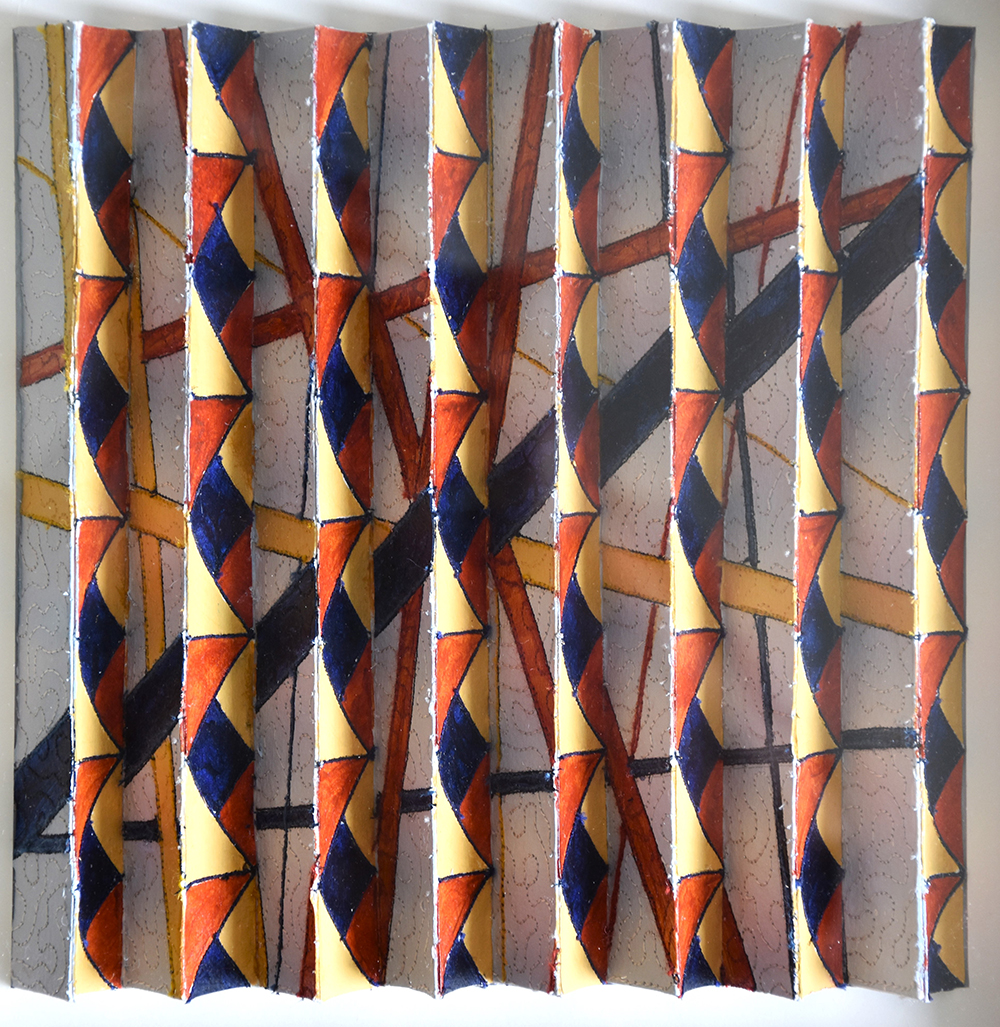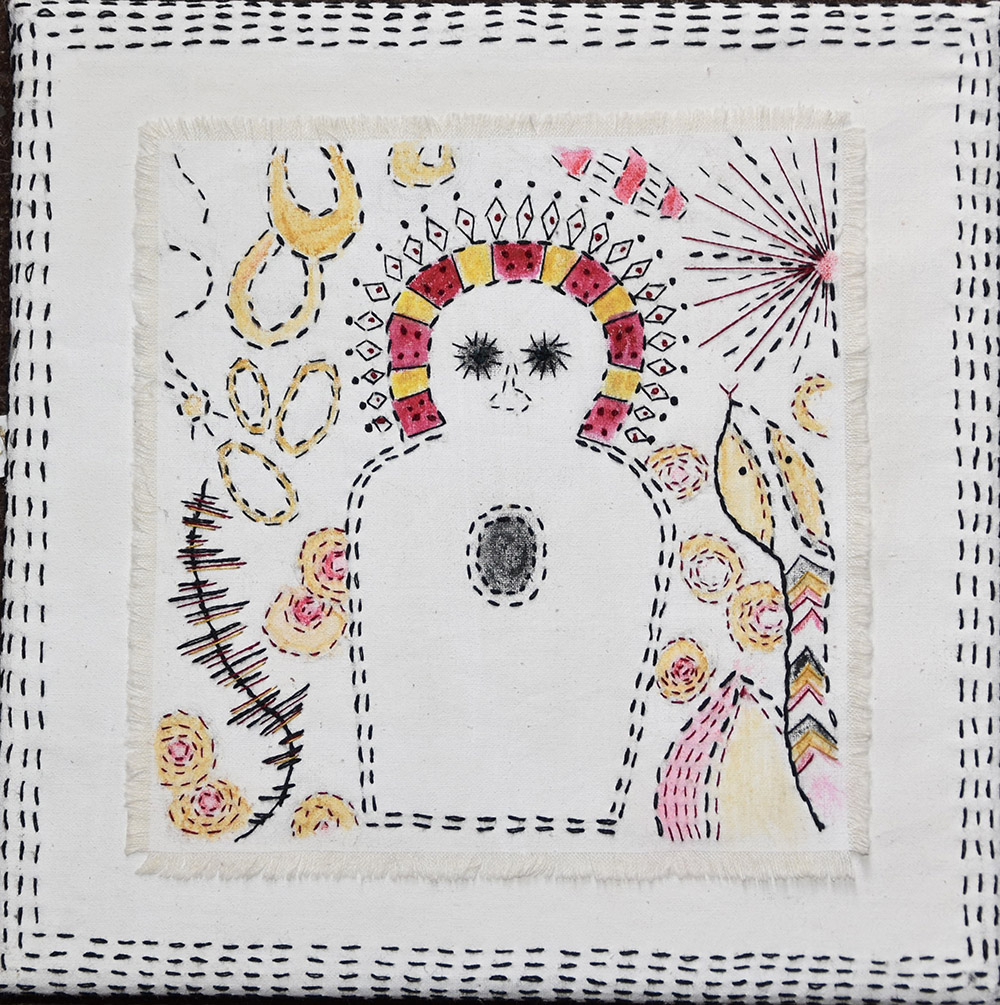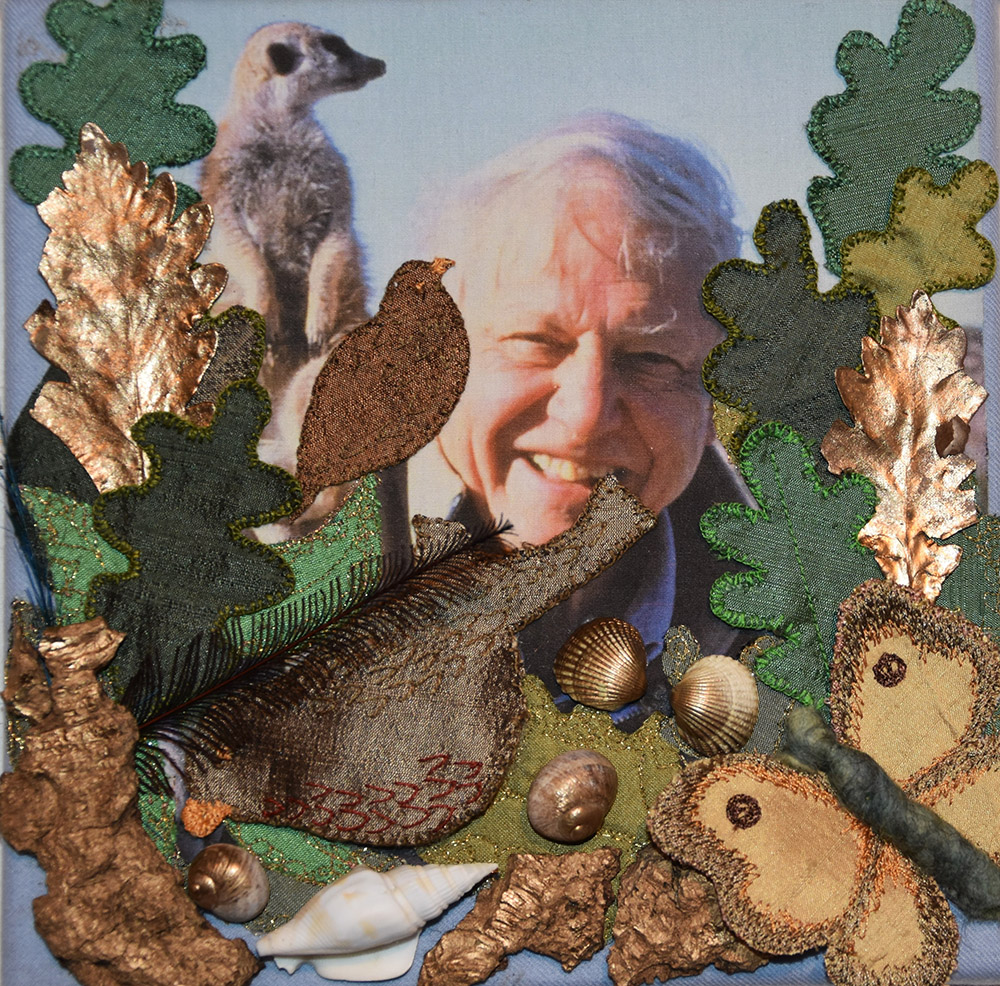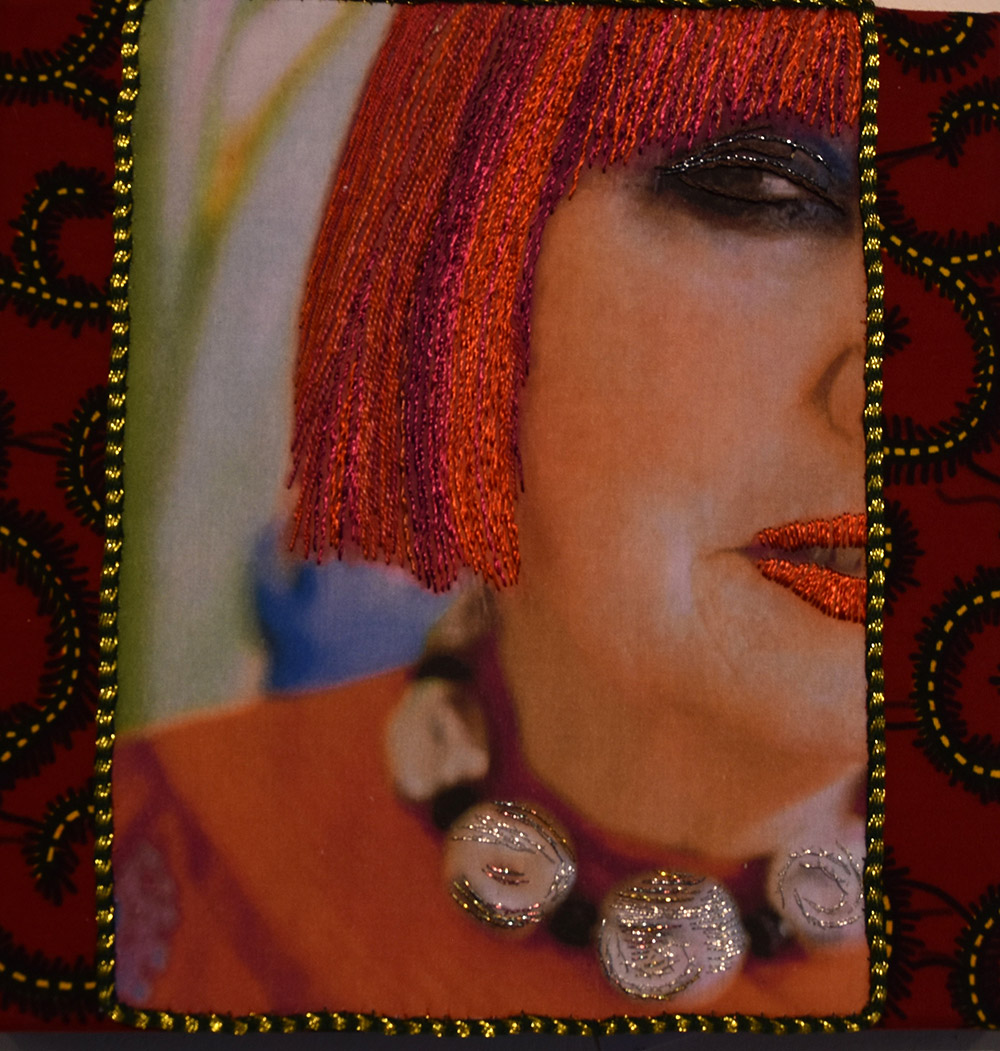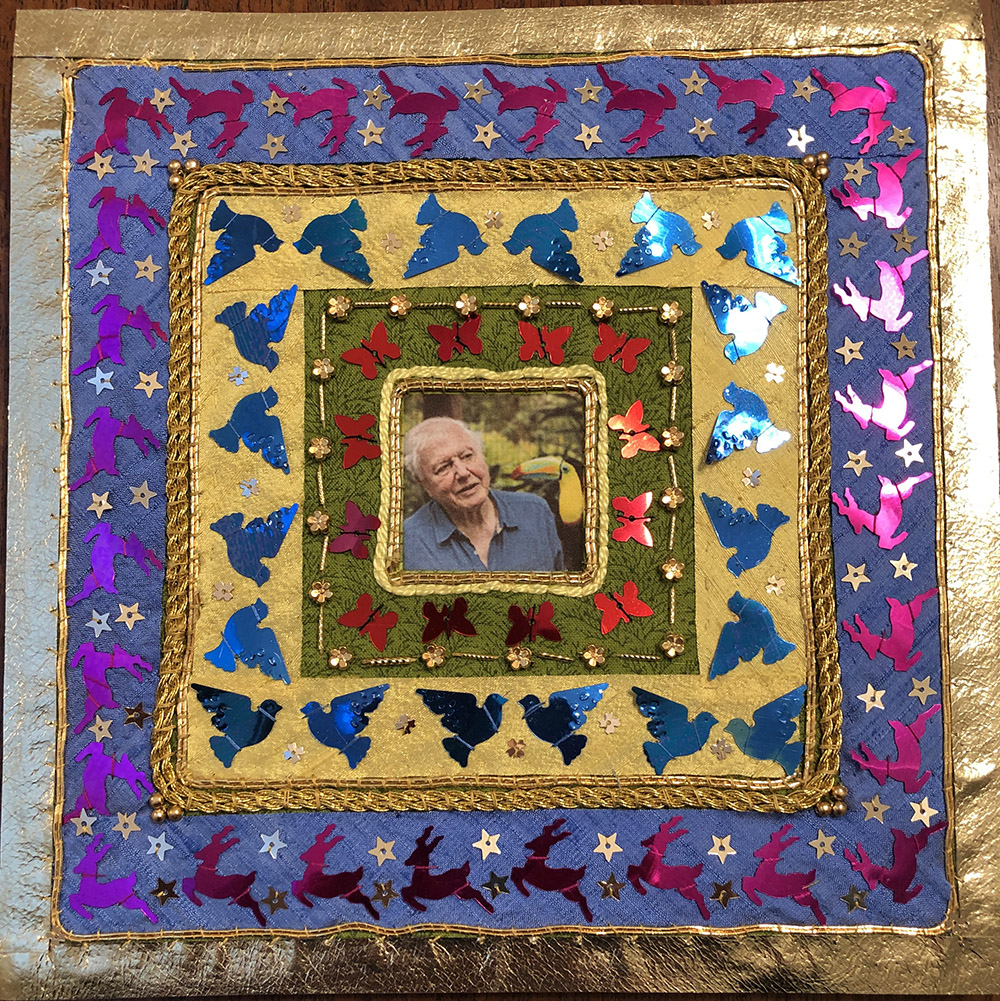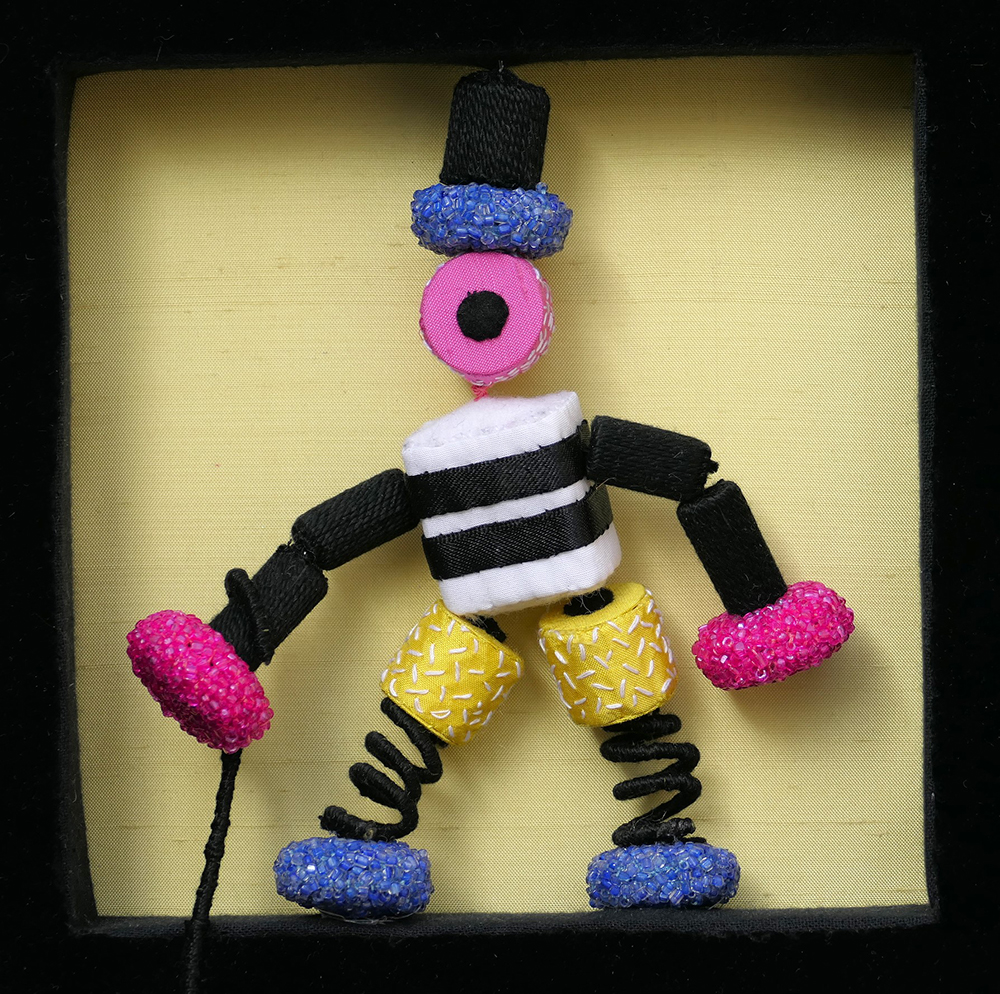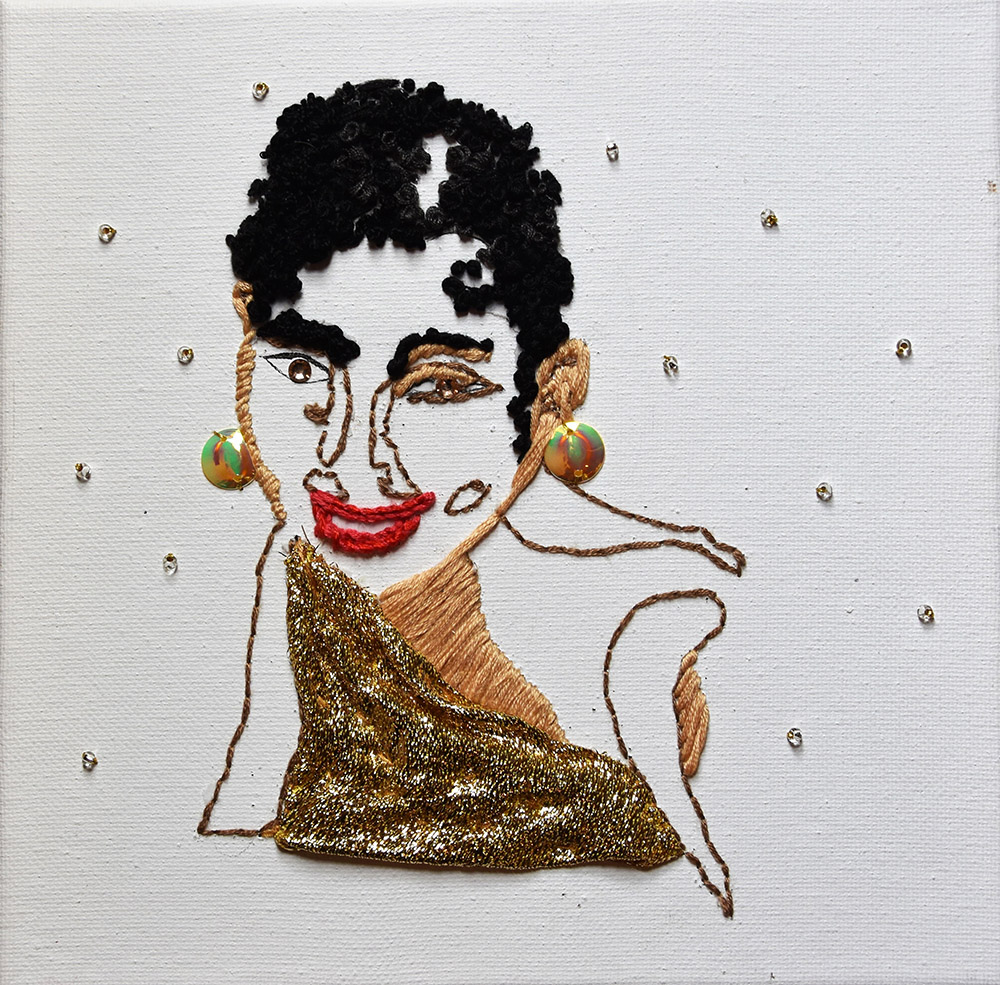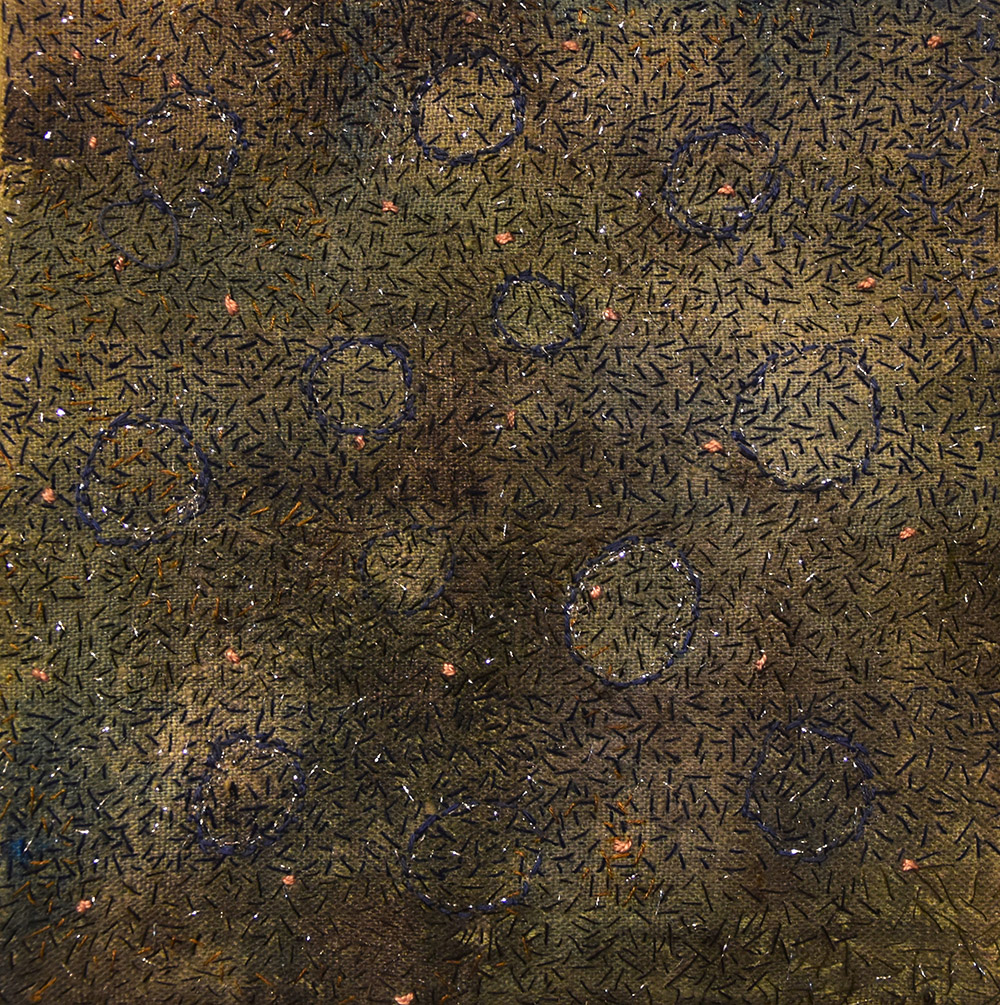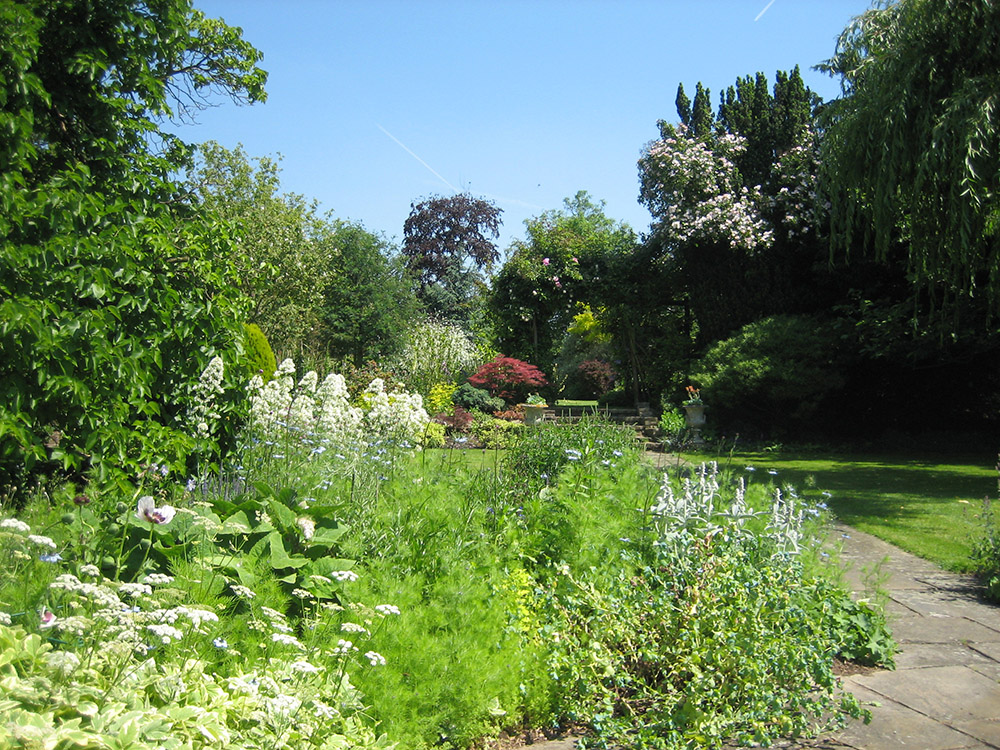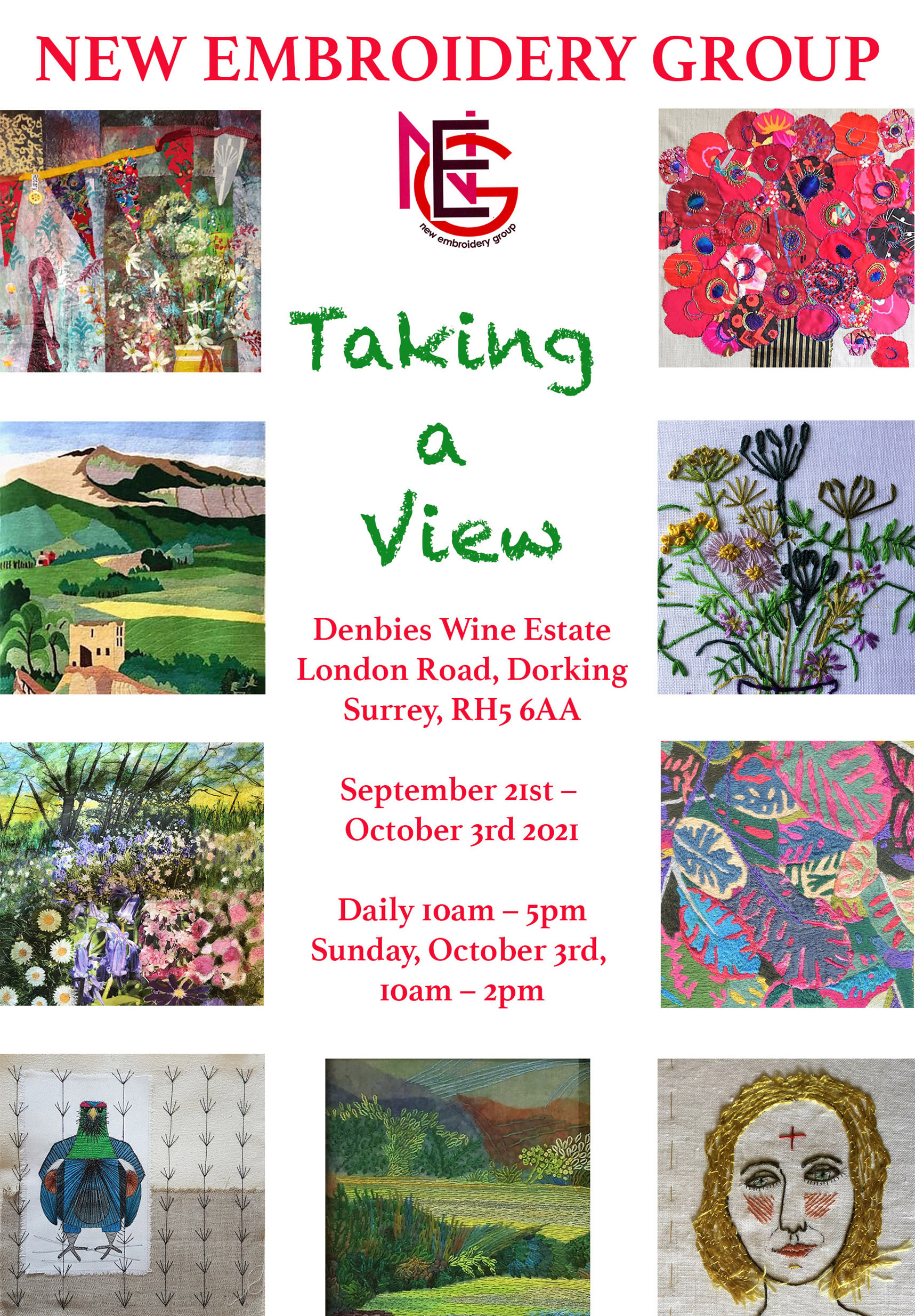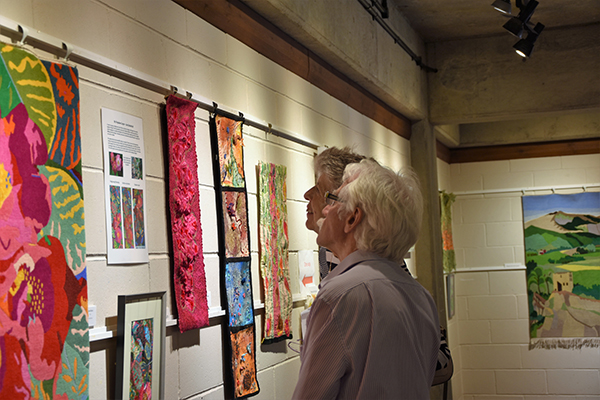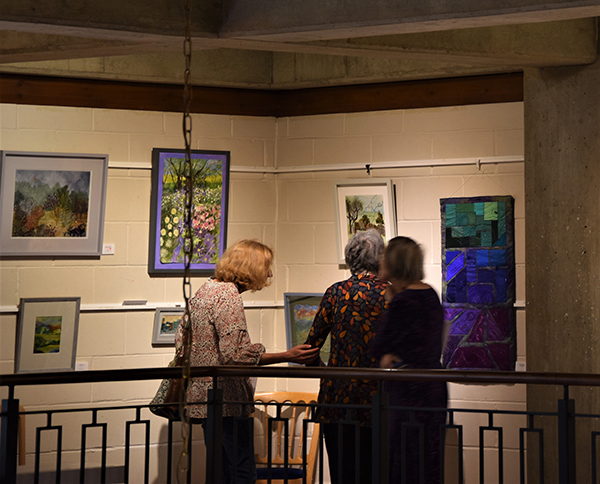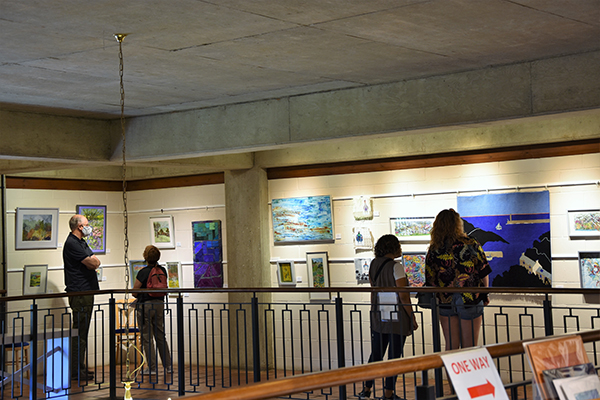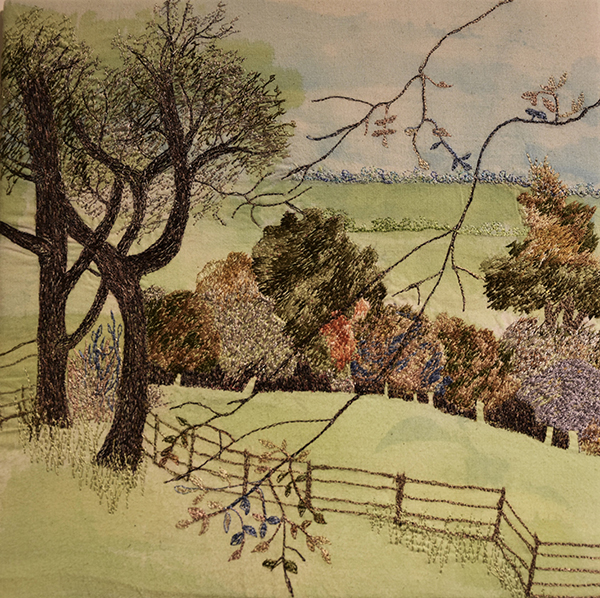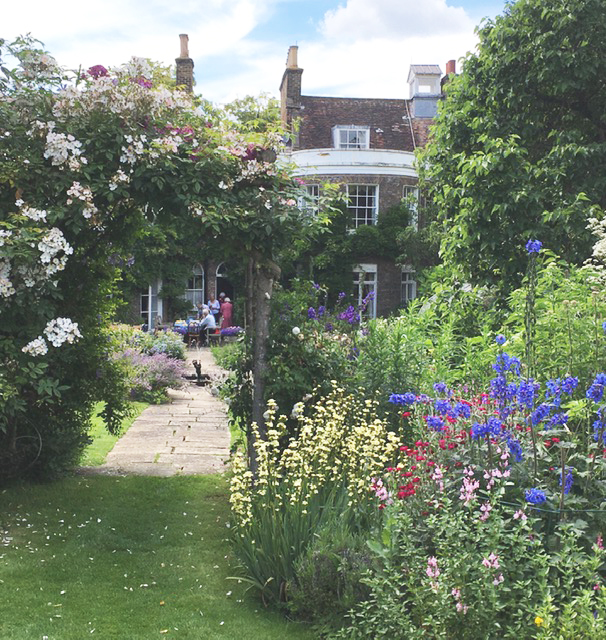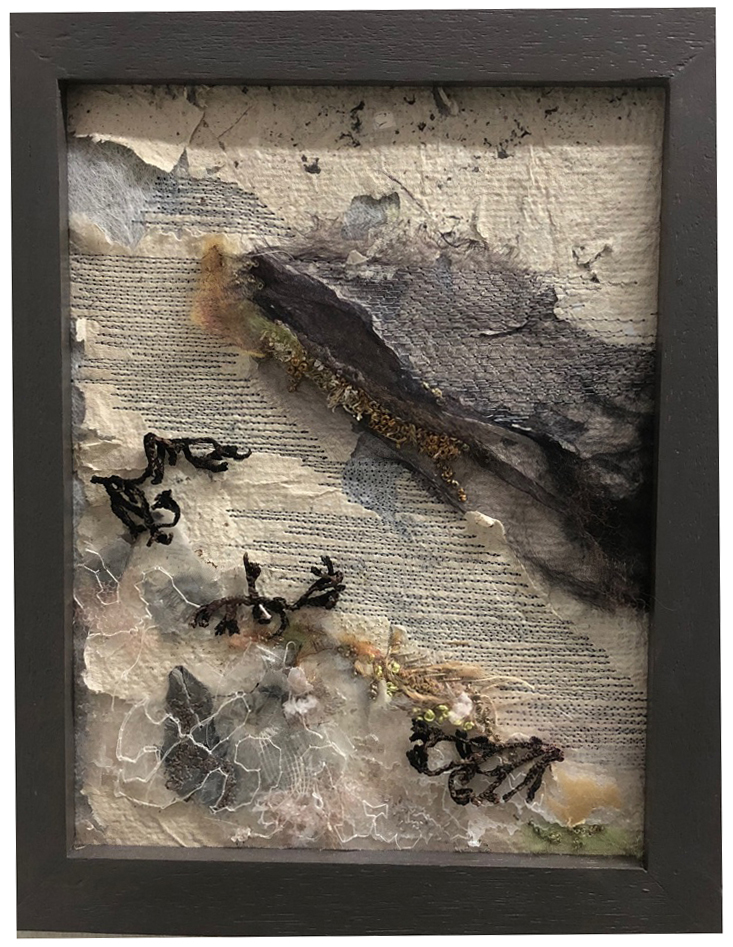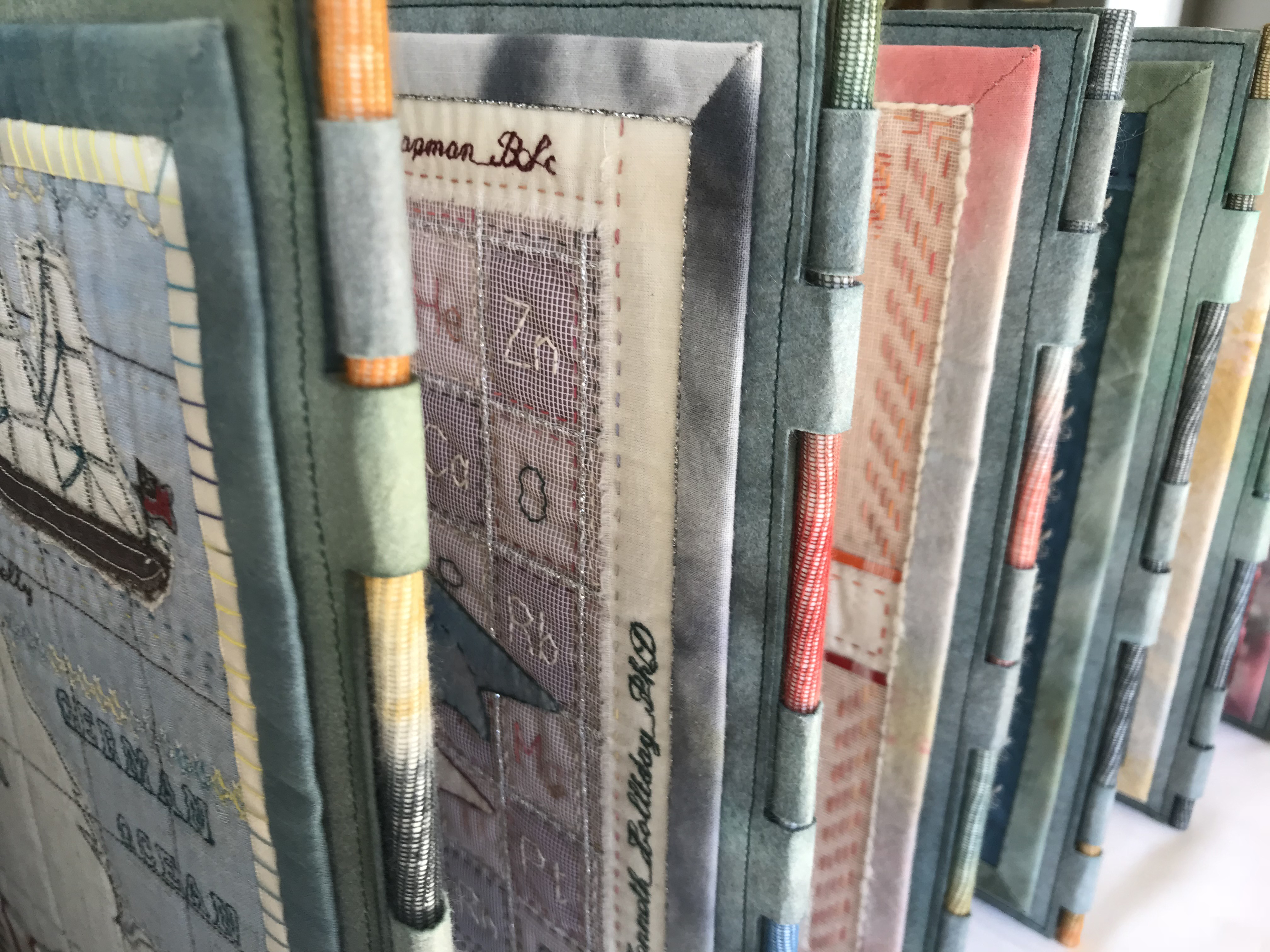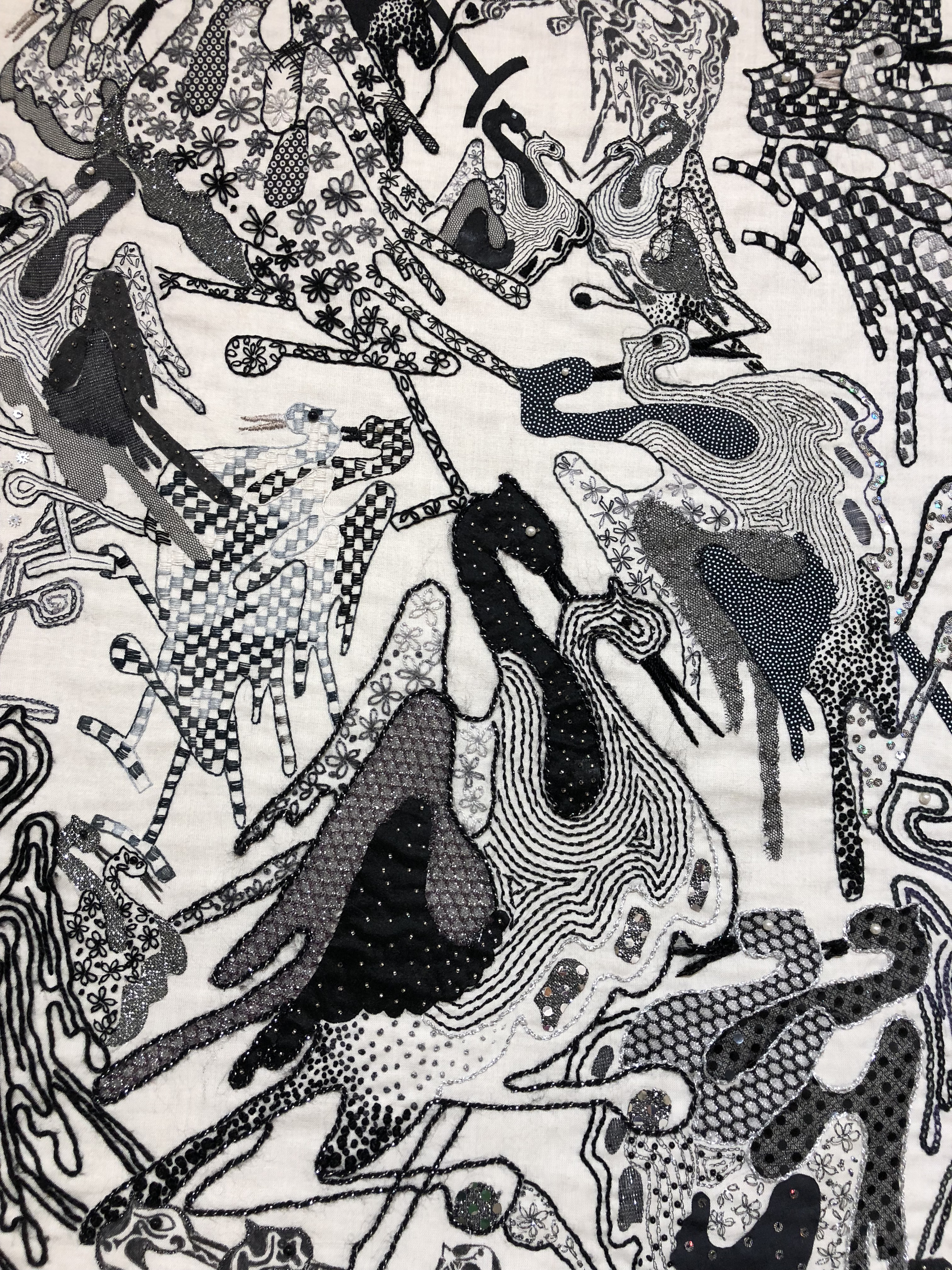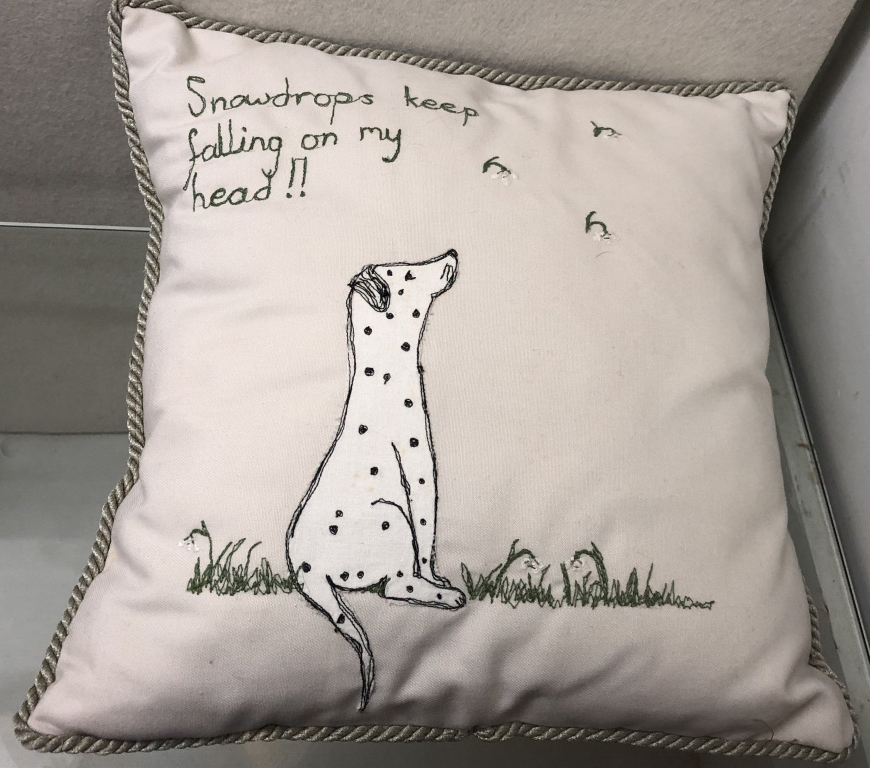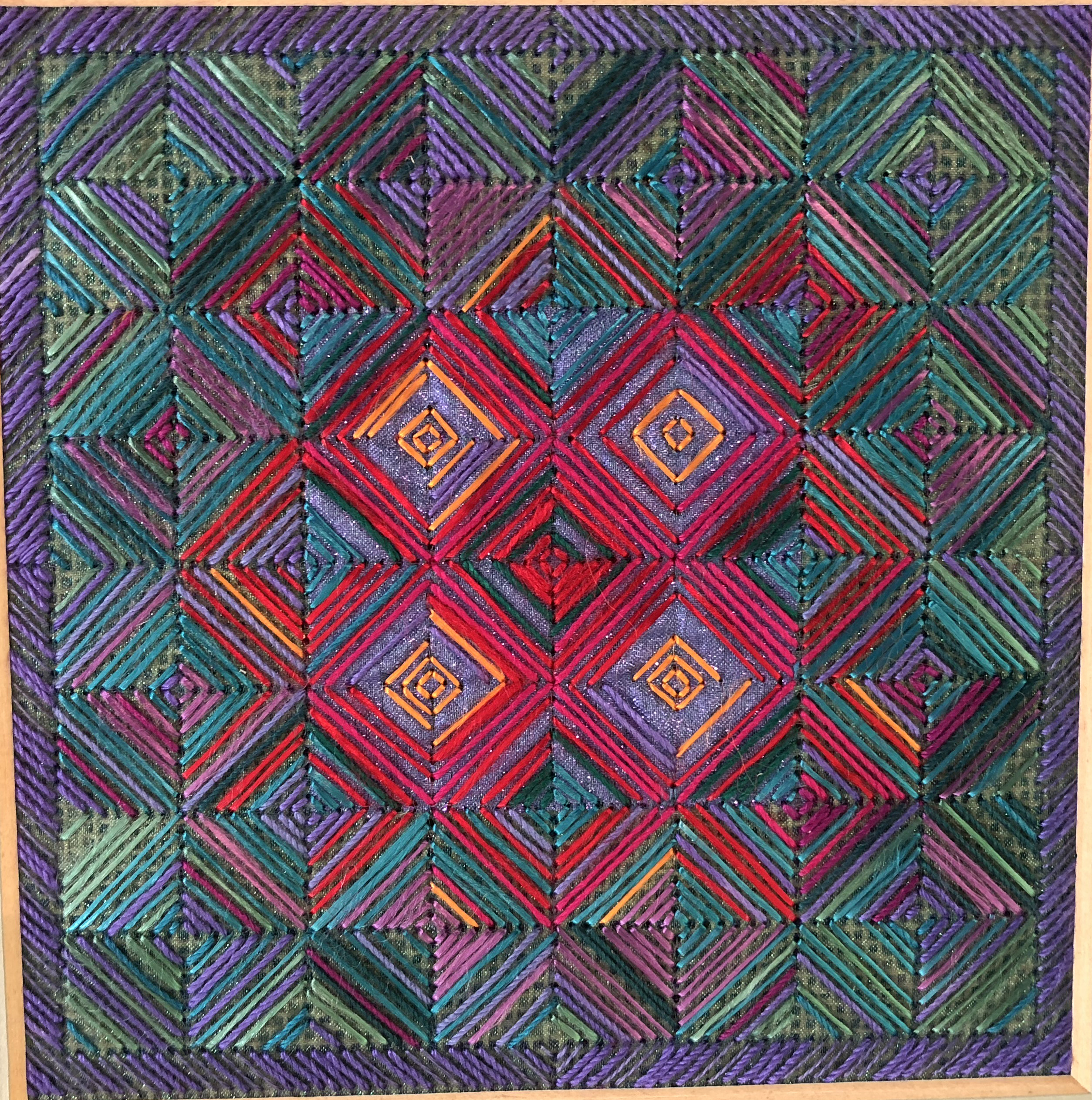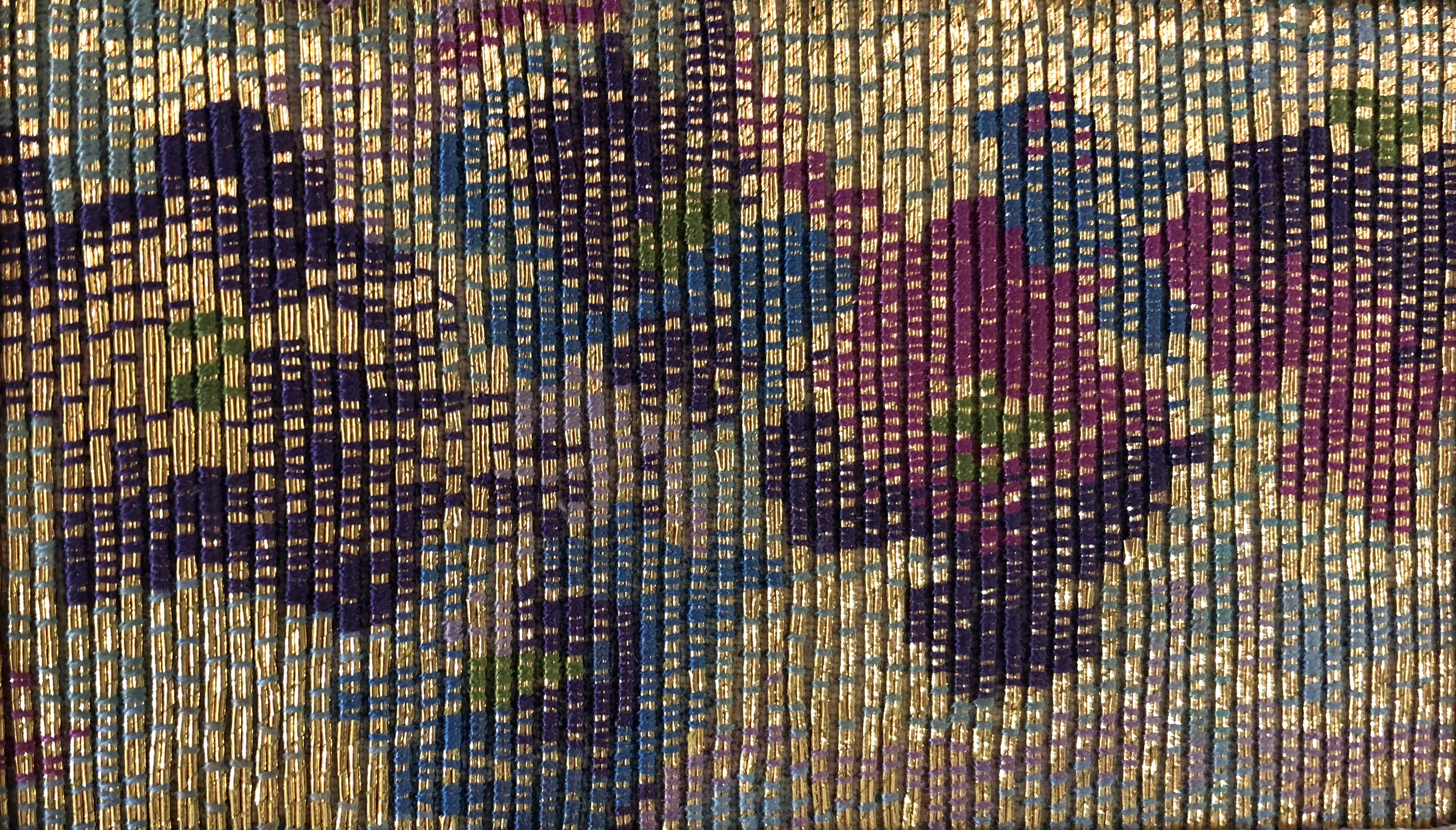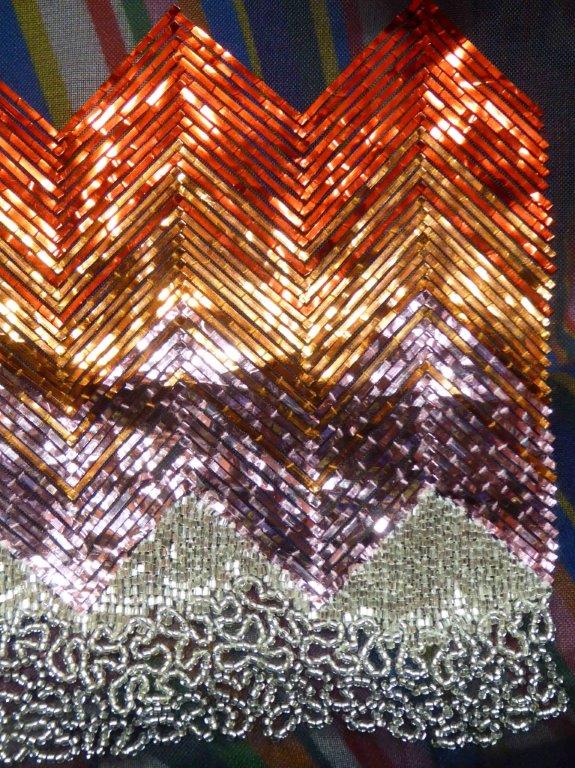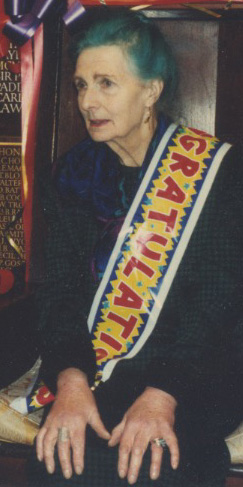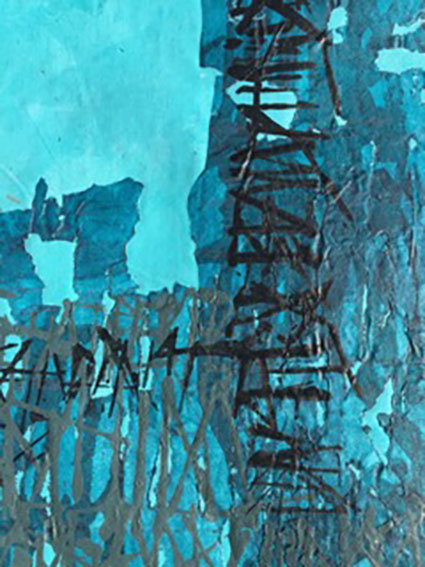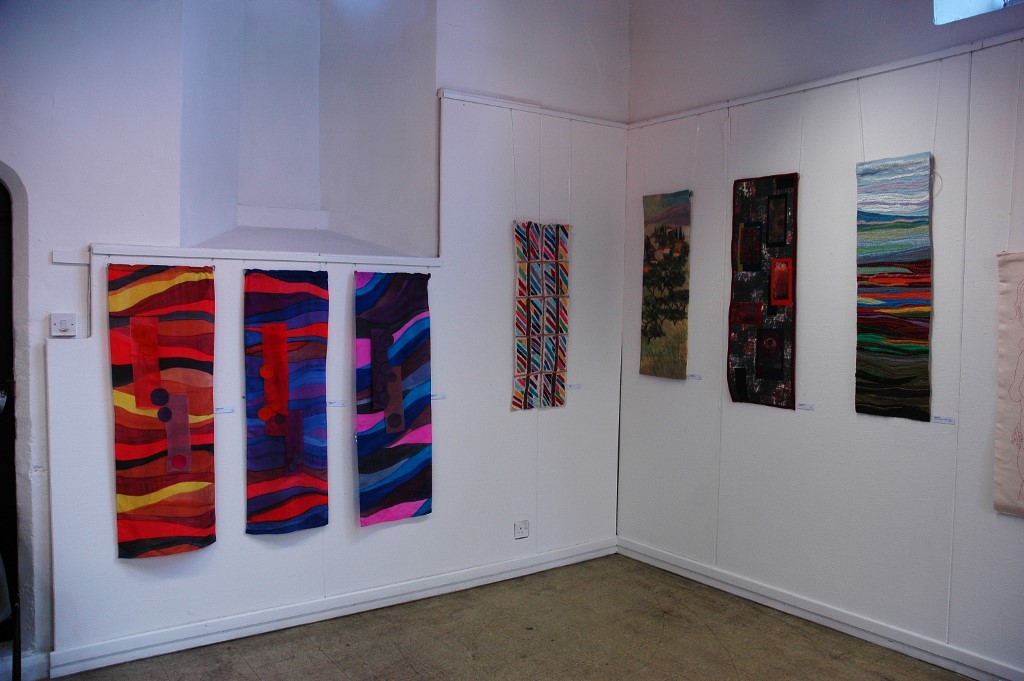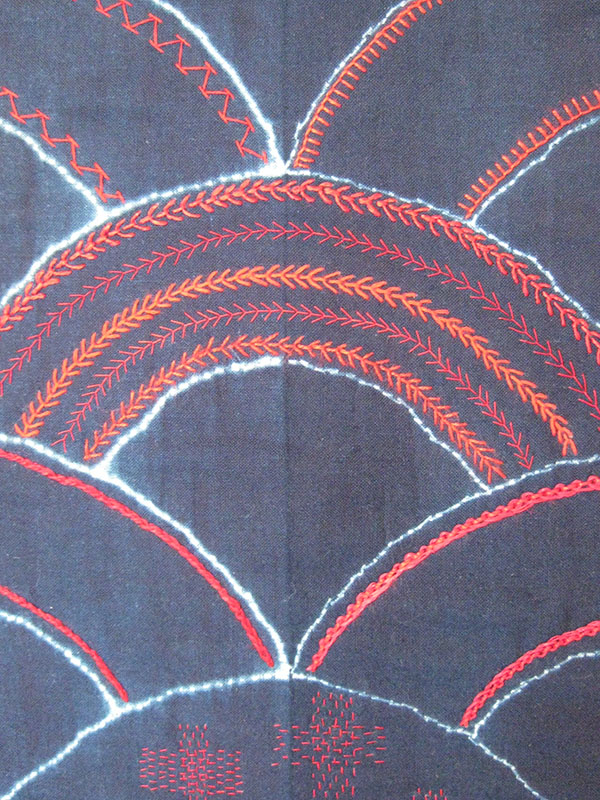Content
Keep up to date with the latest News and Events from the New Embroidery Group.
 Winter Treat in Dulwich
Angela Dewar
Ann had offered us a winter treat, to see her wonderful collection of quilts.
Some of these she has made herself and most of them she has collected over a considerable number of years. Some of them she still uses on her own beds. About eight NEG members met at eleven for coffee and a chat before we went into her sitting room for the viewing. It was unhurried and good to chat without constraints of time and to get to know one another a little better. Ann’s collection is stunning. The colours and workmanship are outstanding. The quilts are from England and America, some from Wales and Canada. They were a means of introducing beauty into the home and developing creative skills, and this is probably how they are mostly regarded today. We were fortunate to have Sarah Campbell with us, whose knowledge of fabric production history is phenomenal.
It was very interesting to learn of Ann’s interest in Fine Cell Work, an organisation which encourages prisoners to use their time to develop their creative skills. As embroiderers, we all know that the act of stitching is usually soothing and calming, important for mental health. Prisoners’ acquired skills could provide them with a means of earning a bit of money on their release, although this must be pretty difficult. Ann showed us one beautiful example of a quilt which she had commissioned from three prisoners. One of them, after his release, quilted a patchwork top sewn by Ann
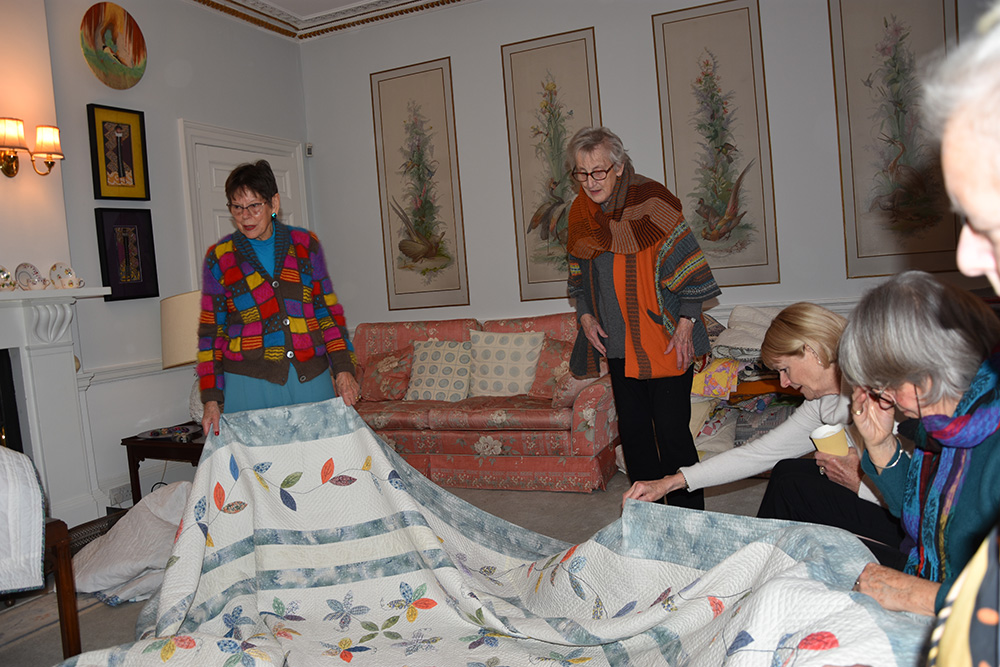
 Quilt made by three Wandsworth prisoners. It is 10 feet square, has embroidery, appliqué and lines of perfect quilting one centimetre apart.
Helen ScalwayÂ
On Friday January 12th, 2024, Ann Rutherford kindly showed members of the N.E.G her collection, as she put it, “of 40 or more vintage quilts from England, Wales, America, Canada and India, plus a couple worked by prisoners and some group quilts which I have masterminded over the years or made myrself.â€
This event took place in Ann’s house in Dulwich village. Nine NEG members attended, for whom Ann unfolded quilt after quilt from her collection. There were mid-19th century quilts, made in small exquisite hexagons: another mid-nineteenth century ‘crazy’ quilt made, interestingly, of various fabrics which might have been thought incompatible but in fact had been fitted together to form a varied, wondrous whole: American quilts of the mid-twentieth century, with ‘naïve’ imagery: a scarlet wool, backed by grey wool Welsh quilt in which there was no piecing but the fabric had been quilted in elaborate intricate patterns, sewn in by hand. There were sumptuous quilts on the one hand and on the other, quilts of the greatest austerity and refinement: quilts for children, quilts most touchingly made by prisoners and commissioned by Ann through the organisation Fine Cell Work. At every moment it was demonstrated that textiles vividly tell stories in their very being, that they richly embody social and personal histories as well as often being magnificent craftworks in their own right. The whole event was a wonderful lesson in how such textiles are imbued with the culture and history of their makers.
 I for one came away feeling bowled over by the visual riches which Ann unfolded for us one by one.
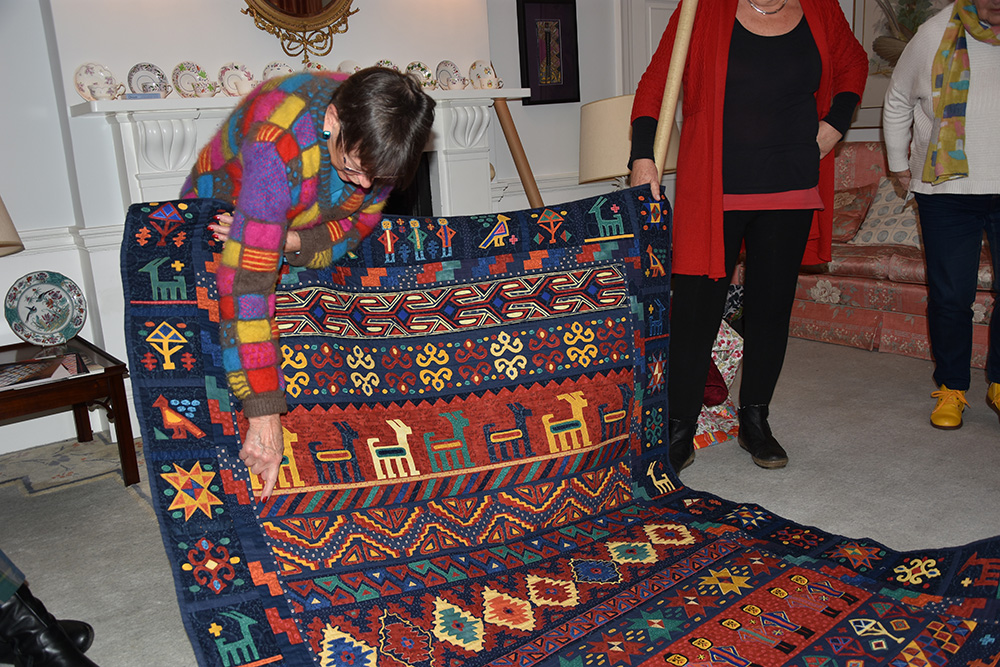
Quilt (Only God is perfect) designed by Ann and made by Dulwich Quilters. Design elements taken from a number of carpets in a book.
Janice Lawrence
The new year started with so much grey it was uplifting to visit Ann Rutherford home to see her quilt collection. After a reviving coffee we moved into the sitting room to be greeted by a large pile of folded quilts, only the backs were on view but as Ann unfolded each quilt the magic of colour and pattern was revealed. To start with we were treated to a series of quilts either made entirely by Ann or a group project set by her for the Dulwich Quilters to execute. It would be hard to name a favourite.
Next came a selection of American and British quilts. The former, block patterns variously hand and machine quilted. Some gently faded with wear others still retaining their joyful brightness. As we all stared to flag a little as we reminded ourselves the many dedicated hours had gone into making each quilt, we were blown away by two hand stitched quilts made of miniscule hexagons one 19th.and the other 18th century. Finally, whilst we were all buzzing Ann unfolded a crazy quilt. Rich velvets, brocades and ribbons stitch into blocks further embellished with assorted embroidered motifs.
What a feast of the stitcher’s art. We are so grateful that Ann was kind enough to share with us so many beautiful quilts. Those who could not make the day missed a treat, not just to see fine work but also to share the enthusiasm of likeminded friends.
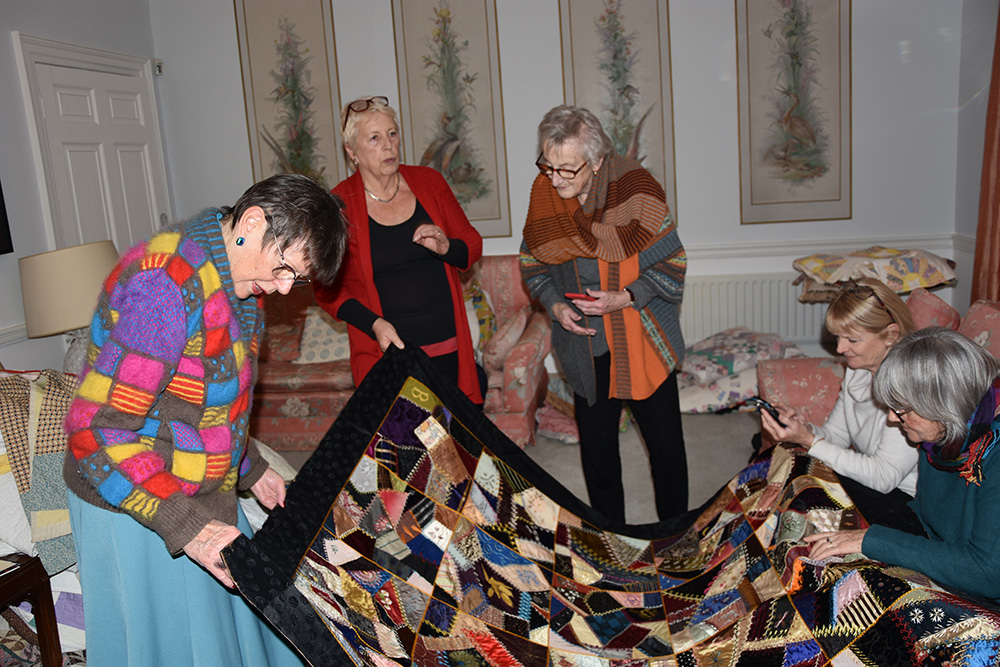
Victorian silk crazy quilt. The maker had enjoyed herself, putting together all manner of fancy silks and then embroidering the seams with equally fancy stitching. One patch is a piece of commemorative ribbon with the date 1883.
 Christmas Meeting: Speaker Sarah Campbell
Helen Scalway
The Christmas meeting took place on December 1st 2023 at the Artworkers Guild in Queen’s Square, London. The distinguished textile designer Sarah Campbell was the invited speaker on this occasion, giving a talk with slides on the subject ‘Art into Design’. Sarah brought a wonderful array of fabric samples to handle as well.
Ann Rutherford wrote in her invitation to the event, that Sarah Campbell ‘and her sister Susan Collier designed fabrics from the1960’s and some were used by Ives St. Laurent in 1971. They went on to collaborate with many of the world’s top designers, retailers and manufacturers including Liberty, Habitat, Jaeger and Conran in the UK and Martex, Westpoint and Springs in the USA.
Their designs have won many awards and can be found in several museum collections featuring the best of modern design including the V&A Museum, London.’ These accolades are well deserved. Sarah’s talk was a fascinating survey of the prolific and characterful output of the Collier/Campbell team. Above all, the fabrics communicated joy, through their clear bright colour palette, their lively, uninhibited patterning, their qualities of freshness and of movement. They were a tonic to behold on a short dark December day: in two words, life-enhancing.
The setting of the event, in the beautiful Artworkers’ Guild building in Queen Square, London, seemed particularly apt, for as the Guild website tells us, ‘the Guild was founded in 1884 by young architects and designers who wanted to create a meeting place for the fine arts and the applied arts on an equal footing. Many of the prominent figures of the Arts and Crafts Movement were active in the first fifty years.
It has represented traditional skills when they might have disappeared, but it has always maintained a dialogue with modern design’.
What better setting could there have been for Sarah Campbell to speak about her work? Thank you, Sarah, and to the NEG committee organisers who made this event such a pleasure in the dark of the year.
Angela Dewar
I found Sarah Campbell’s talk very inspiring and came home feeling more like doing some work, which I haven’t done for ages. Her clothes were brave and beautiful and, although she claims not to be, she really is an artist. But I do understand what she says about art versus design. I hope that we may have a workshop with Sarah at some point. We used to have workshops quite frequently, I seem to remember. It was in a workshop with Valerie Campbell Harding at Church House, Westminster, that I made a little design which subsequently became the festal frontal at Truro Cathedral.
 Janice Lawrence
The NEG Christmas get-together is always a chance to catch up with old friends and become acquainted with new members. After Covid and the vagaries of the transport system it was good to see so many returning to such a pleasurable event. We were privileged to have Sarah Campbell as our speaker. It wasn’t difficult to spot our guest as she was wearing a colourful jacket which we learnt was one of her own designs.
She started by telling us about her childhood in Ahmedabad, where both parents were scientists and interested in the natural world. She showed us an embroidery of exotic butterflies worked by her mother and the specimen drawers containing a collection of the butterflies themselves.
Sarah shared with us her introduction to fabric design, enticed by her sister. Unlike Susan, Sarah had attended art school, then continued to partner in the fabric design business known to many of us as Collier Campbell. She related how they had their work taken up by Liberty, John Lewis and Heals.
Many of us remembered some the work that she showed either on screen or as pieces of fabric. The pattern repeats of many the fabrics were so subtle and complex they were quite hard to follow for the untrained eye. Sarah’s gentle, and quiet manner left the audience spellbound as everyone engaged in her colourful designs, coming to life with questions that they had saved until the end of the talk.
Exhibition 2023
Allen Gallery, Alton, Hampshire: Â Â Â New Embroidery Group Exhibition:
‘Taking a Thread’

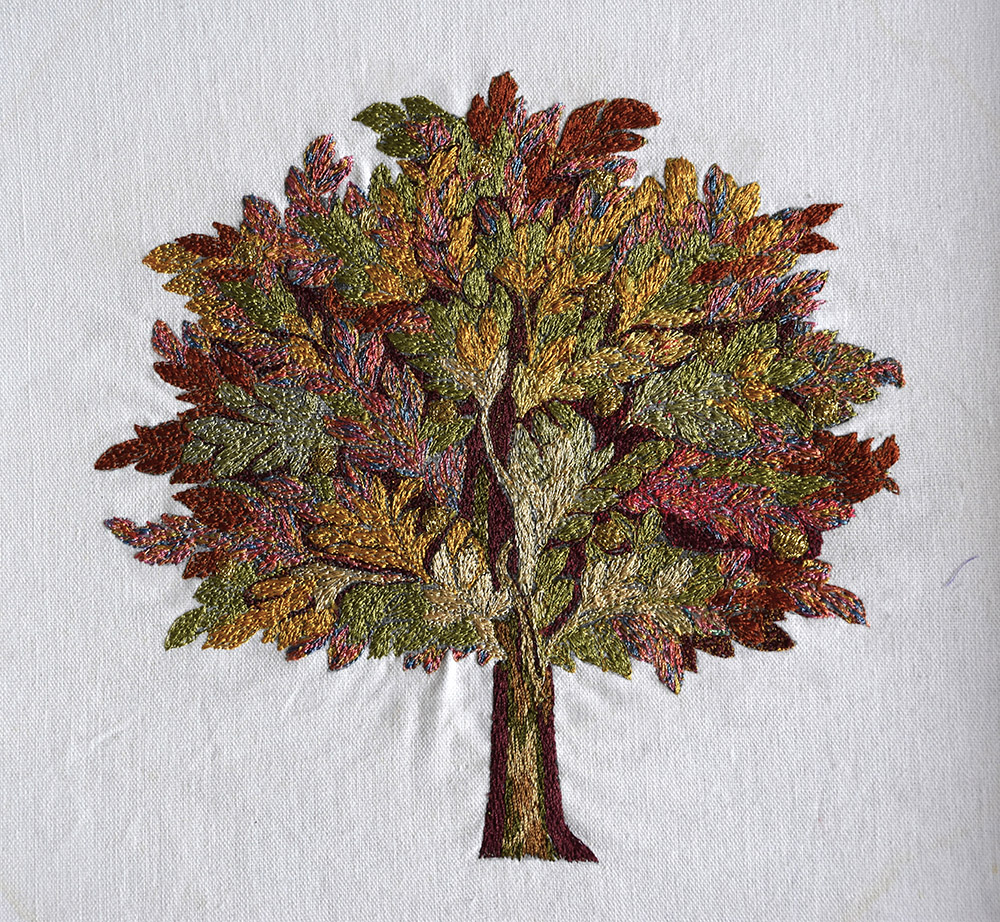
Angela Dewar: Tree of Life
Brenda Parsons: Discovering the Tor
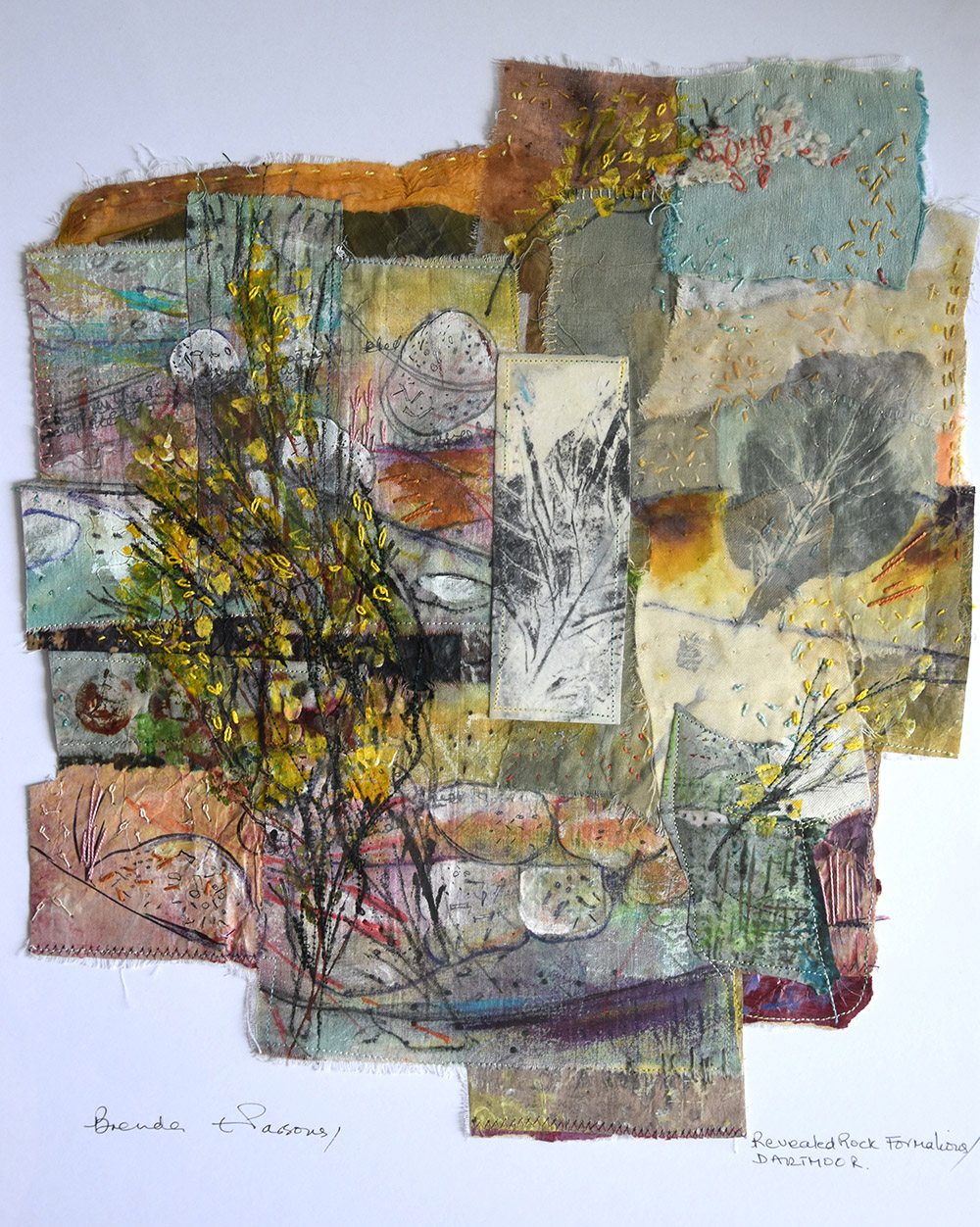
Brenda Parsons: Revealed Rock Formations
Angela Dewar: Autumn Landscape
Angela Dewar: Over the Garden Wall at Cyffredin Cottage
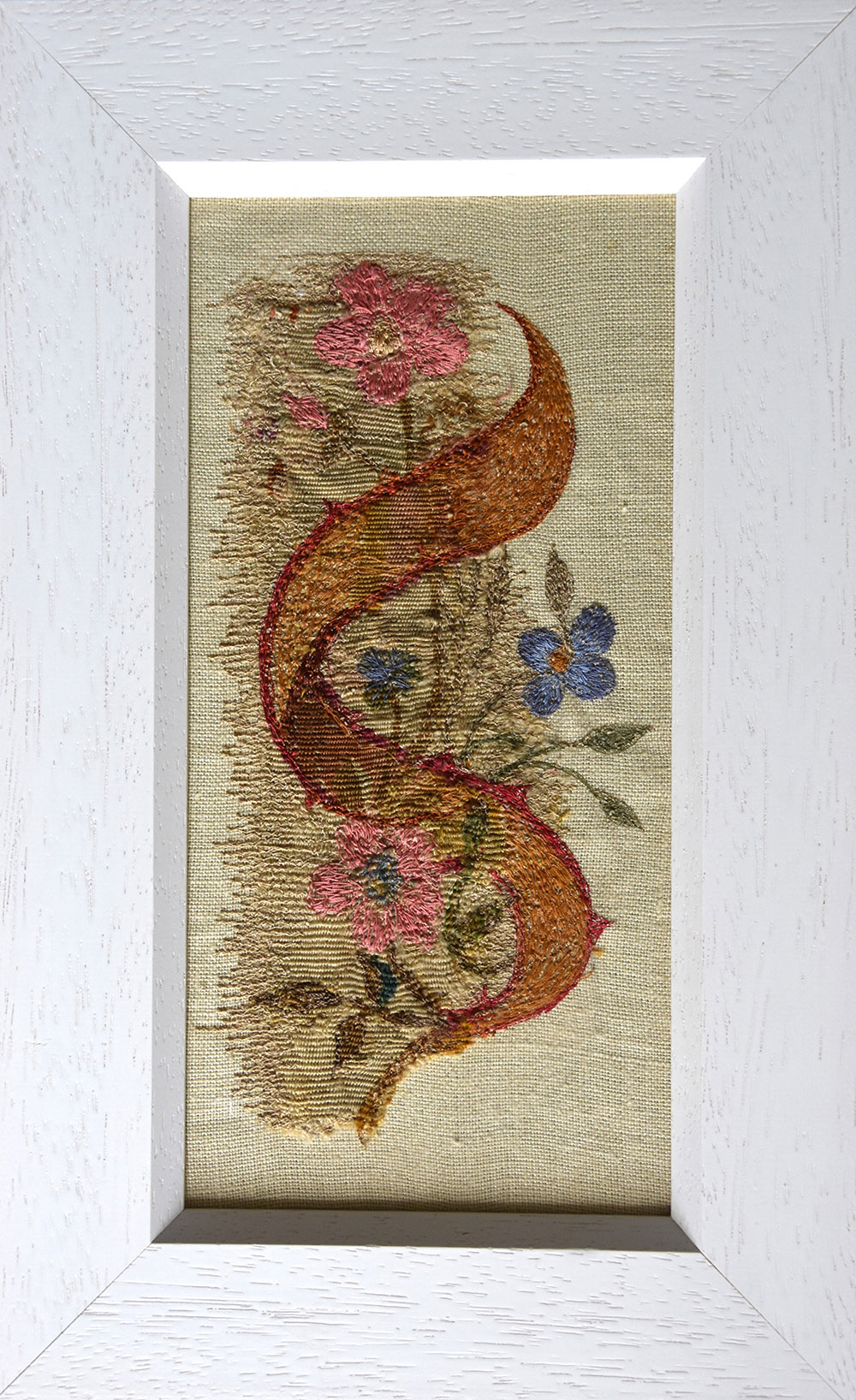
Angela Dewar: Recycled 1
Angela Dewar: Recycled 2
Ann Rutherford: Bird
Annette Collinge: Indian Bird
Annette Collinge: Landscape with Horses
Arlene Shawcross: Ice Flow
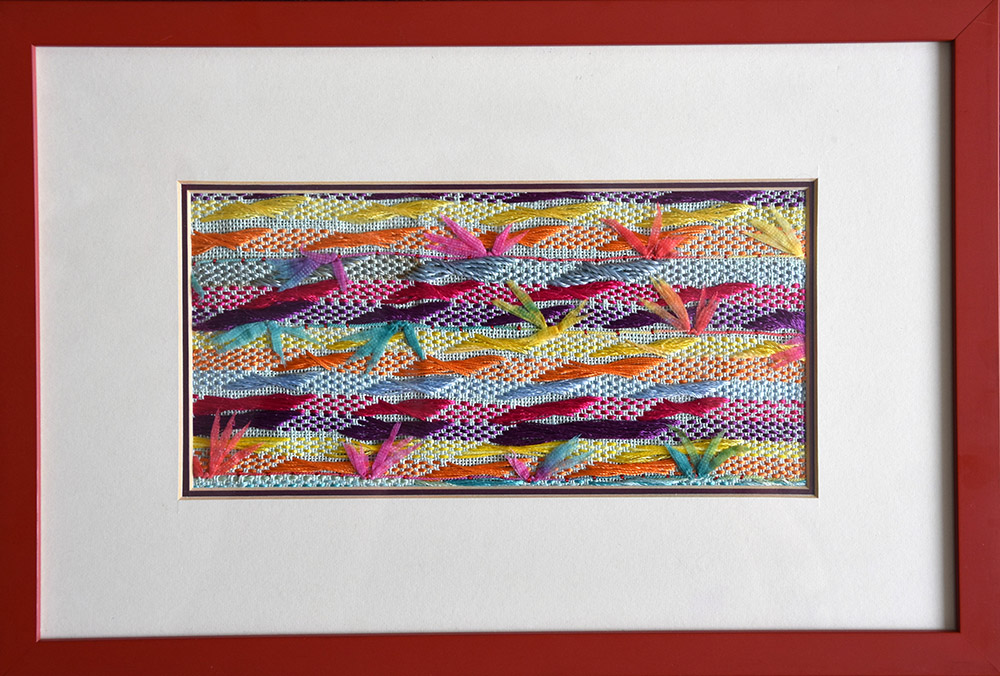
Barbara Jeremiah: Dragonfly Light
Bridget Barber: Earwig Corner
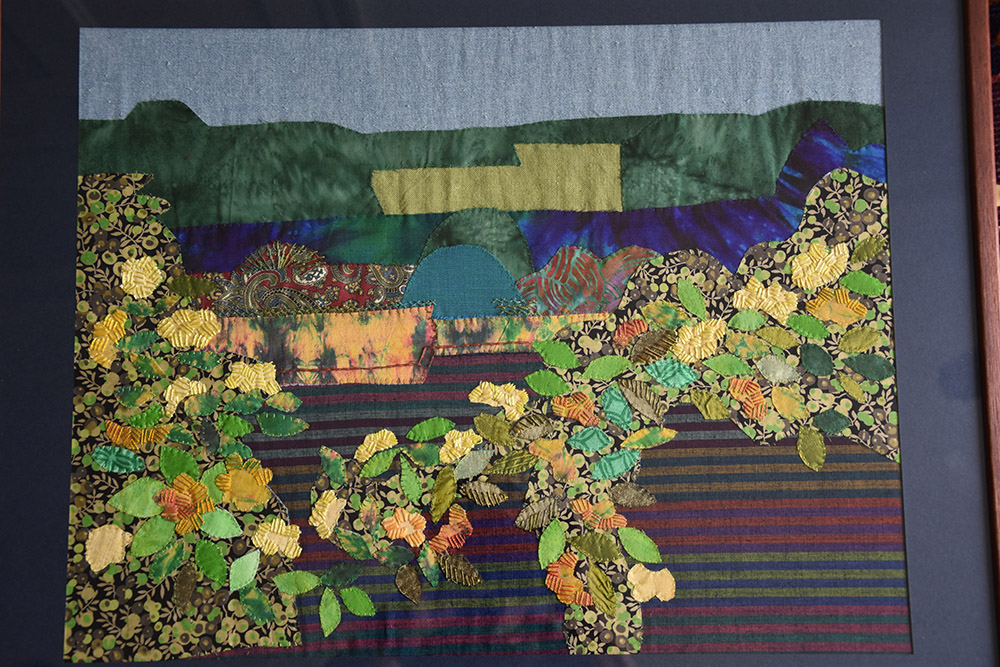
Bridget Barber: Hinton Ampner

Buffy Fieldhouse: Early Morning Walk
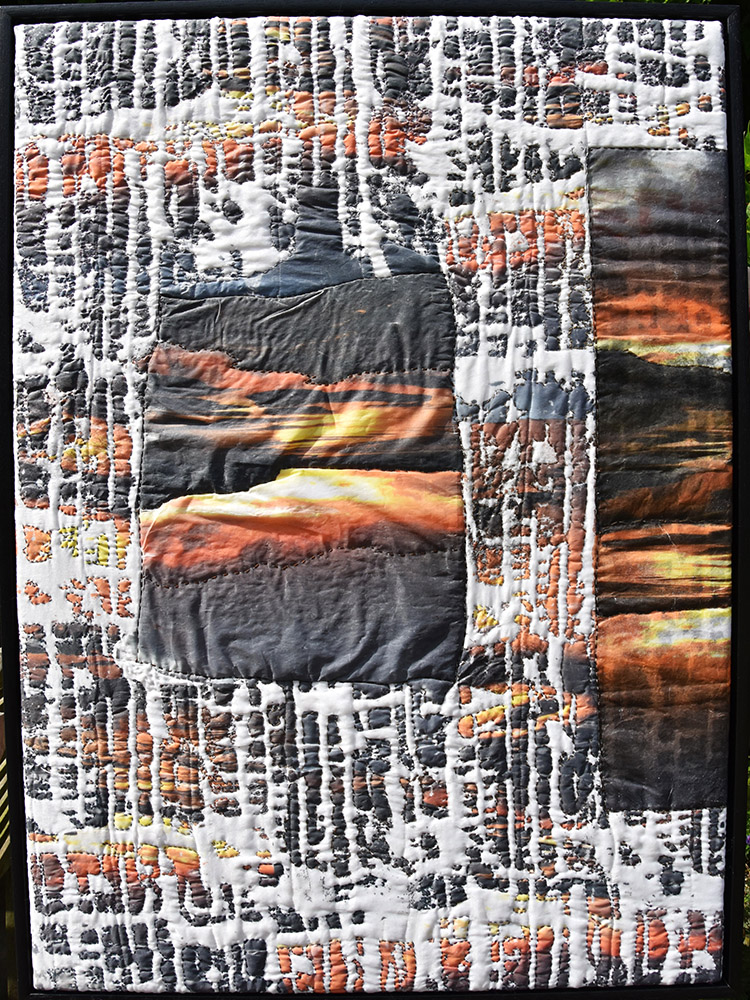
Buffy Fieldhouse: Splintered Sunset
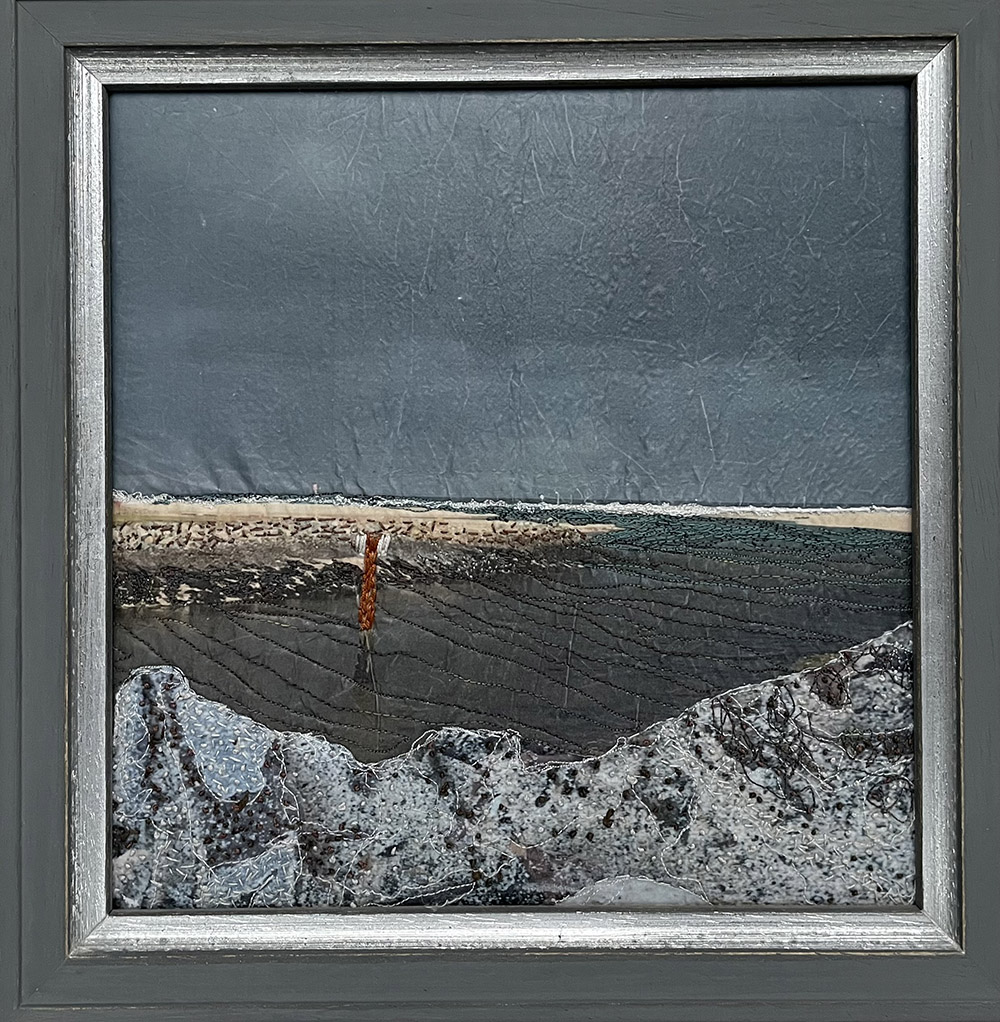
Buffy Fieldhouse: Storm Approaching
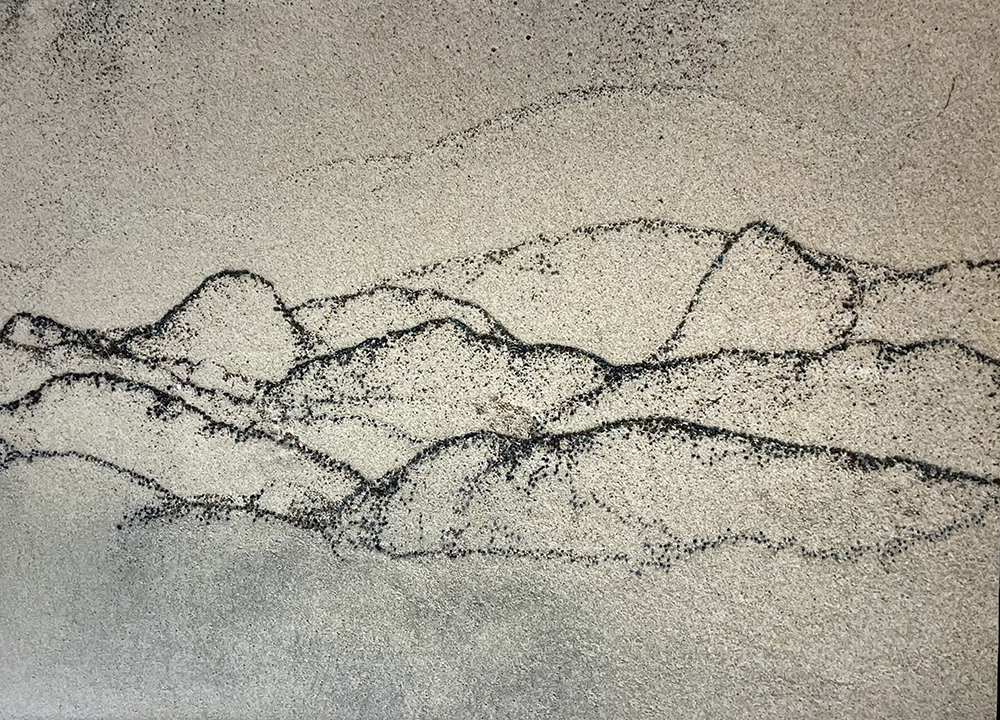
Buffy Fieldhouse: Untitled
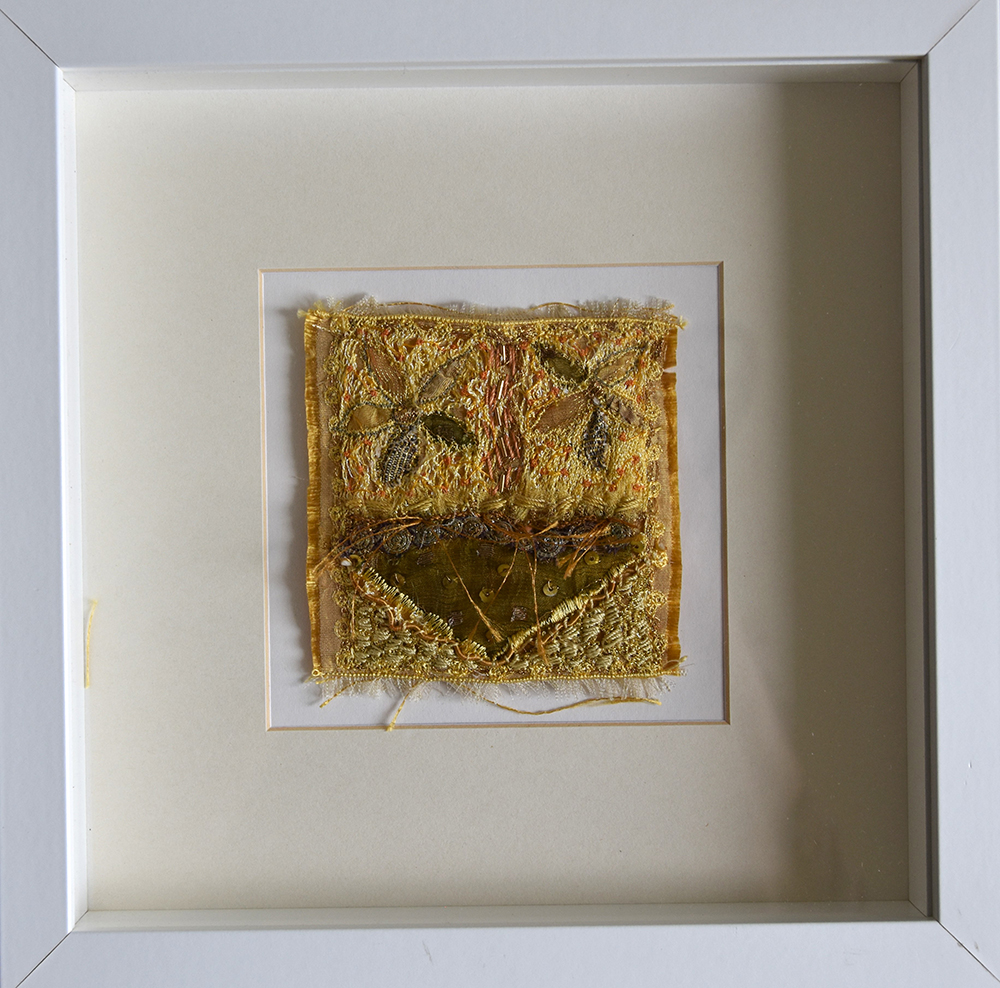
Catherine Griffiths: A Wrinkle in Time 1
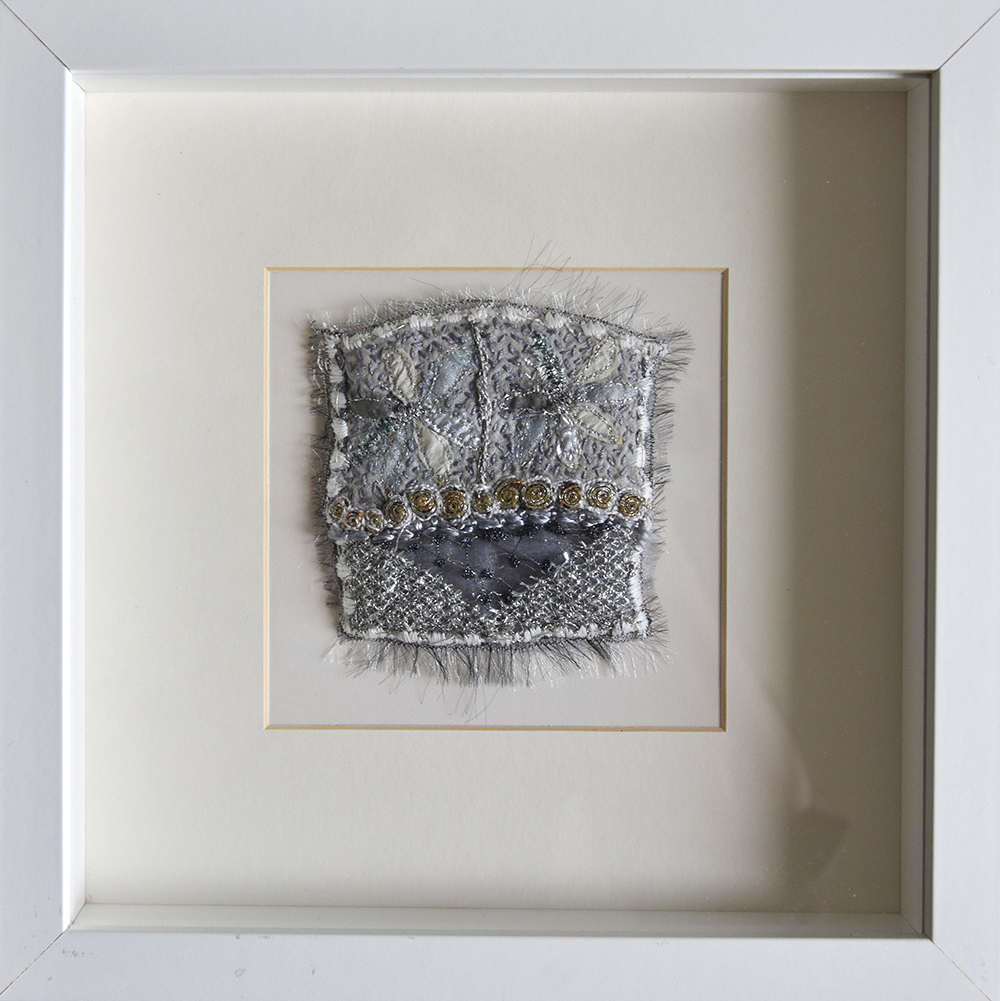
Catherine Griffiths: A Wrinkle in Time
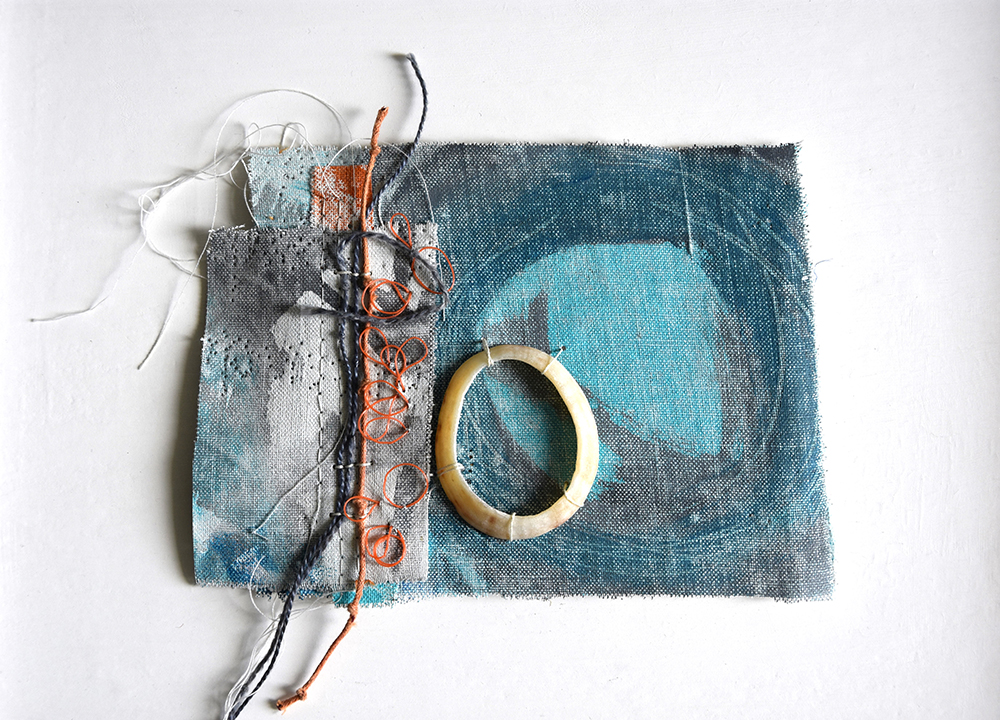
Catherine Griffiths: Roots
Helen Scalway: Untitled
Eleonor Rollen: The Forest Floor
Janice Lawrence:
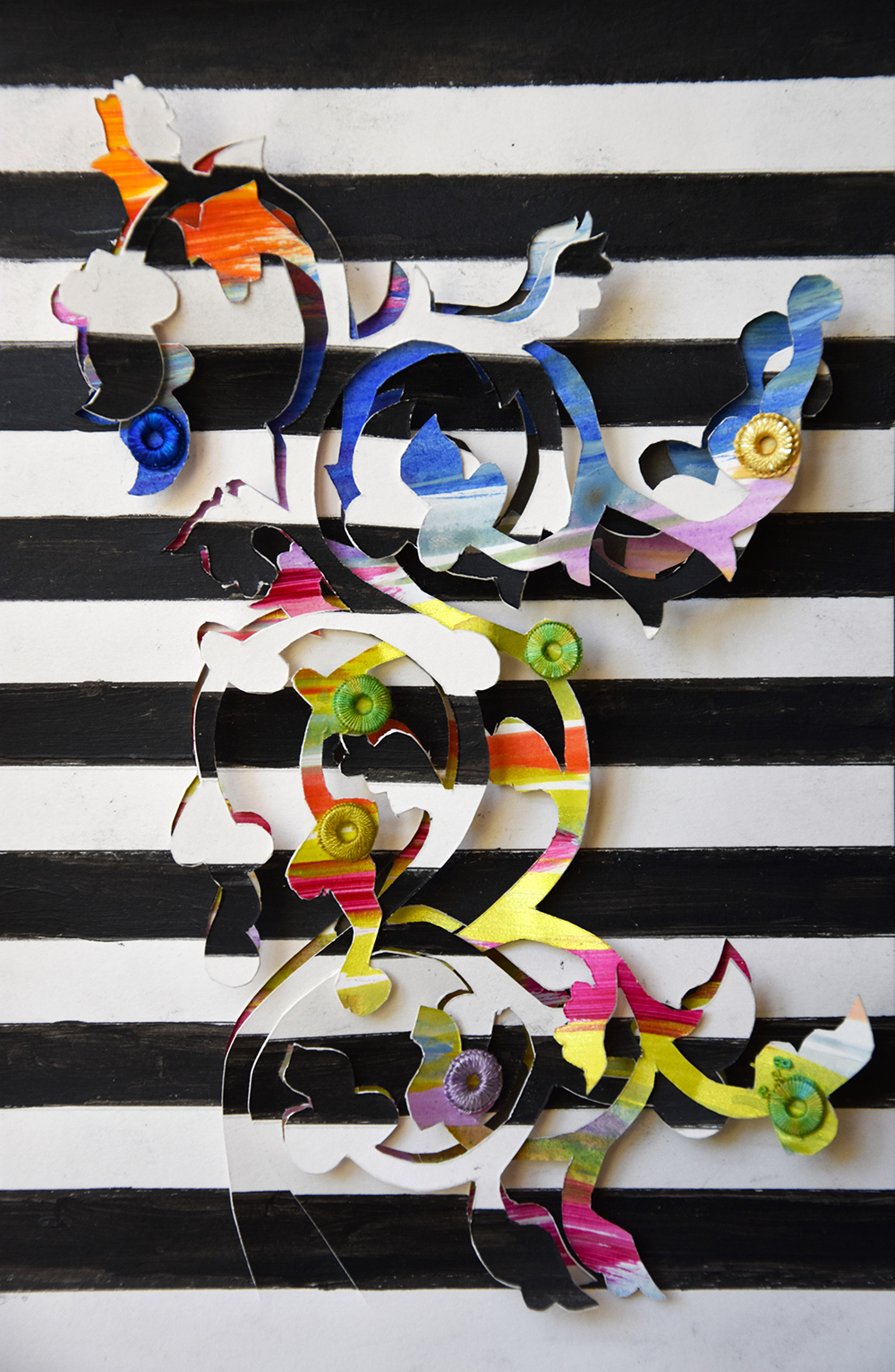
Janice Lawrence: Hidden Fruit
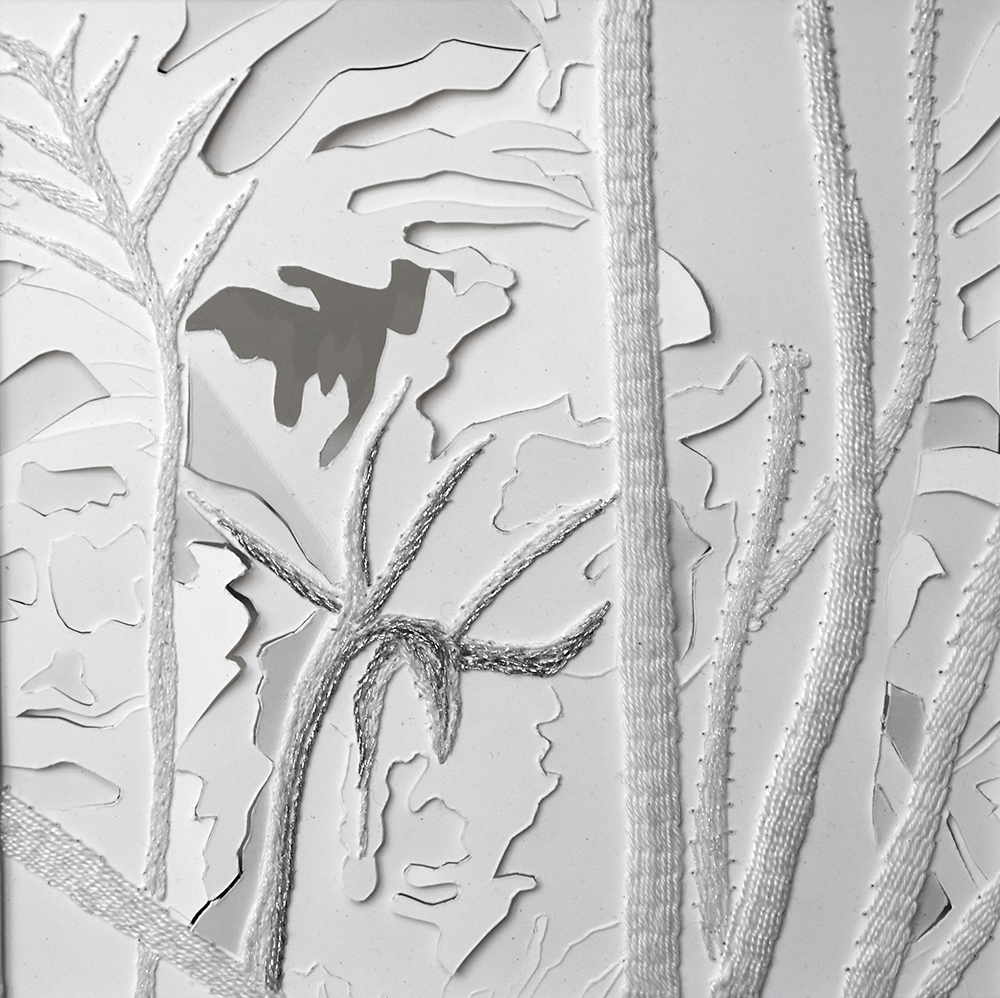
Janice Lawrence: Shadows of Kew
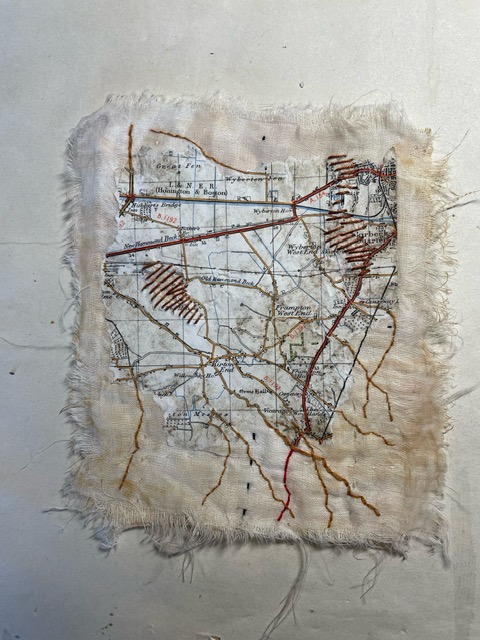

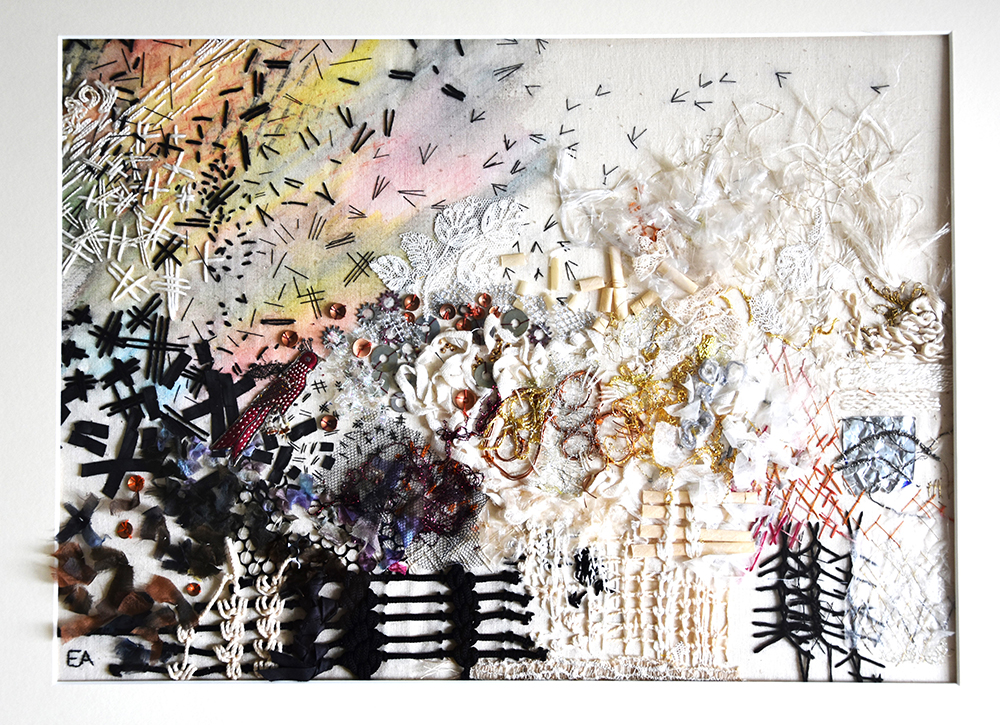 Liz Ashurst: Hanging by a Thread
Liz Ashurst: Hanging by a Thread
Liz Holliday: Daisy Daisy
Pat Cove: Freesias
Sandra Hurll: Setting Sail
Sandra Hurll: Stormy Weather
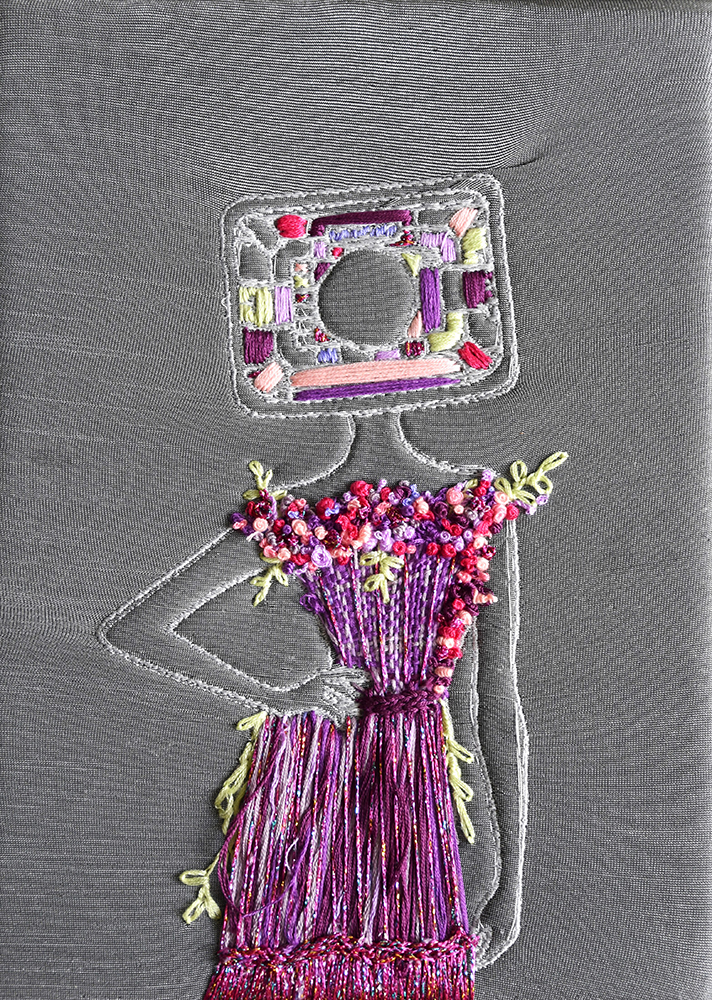
Shanique Thompson: Cyber Rose
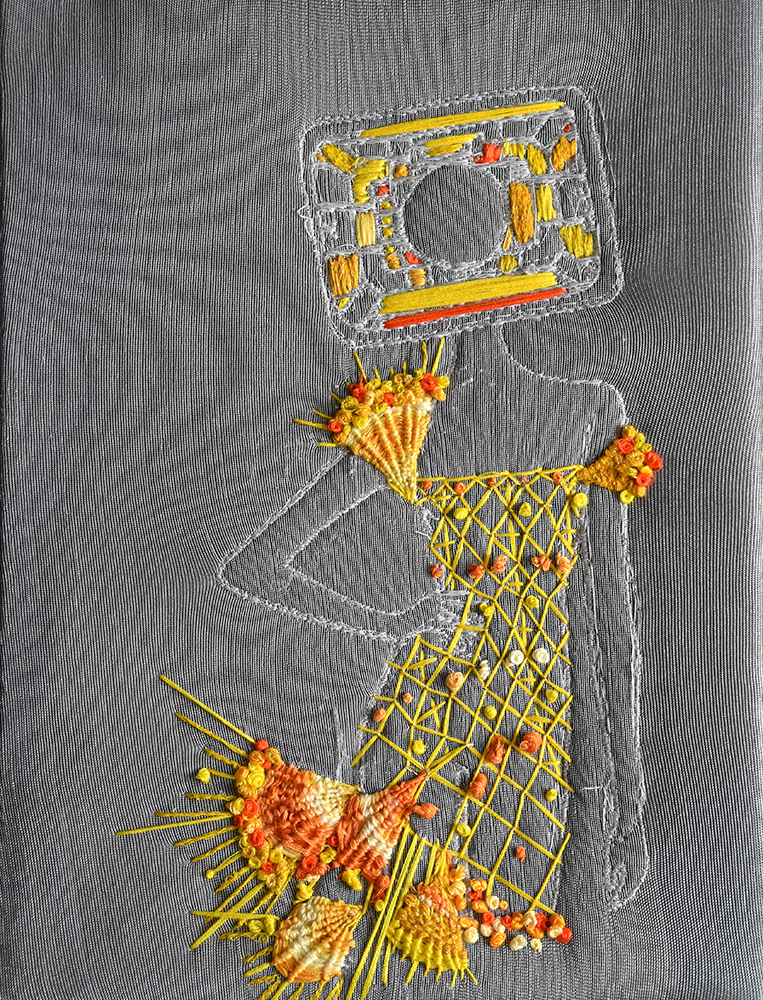
Shanique Thompson: Electric Star
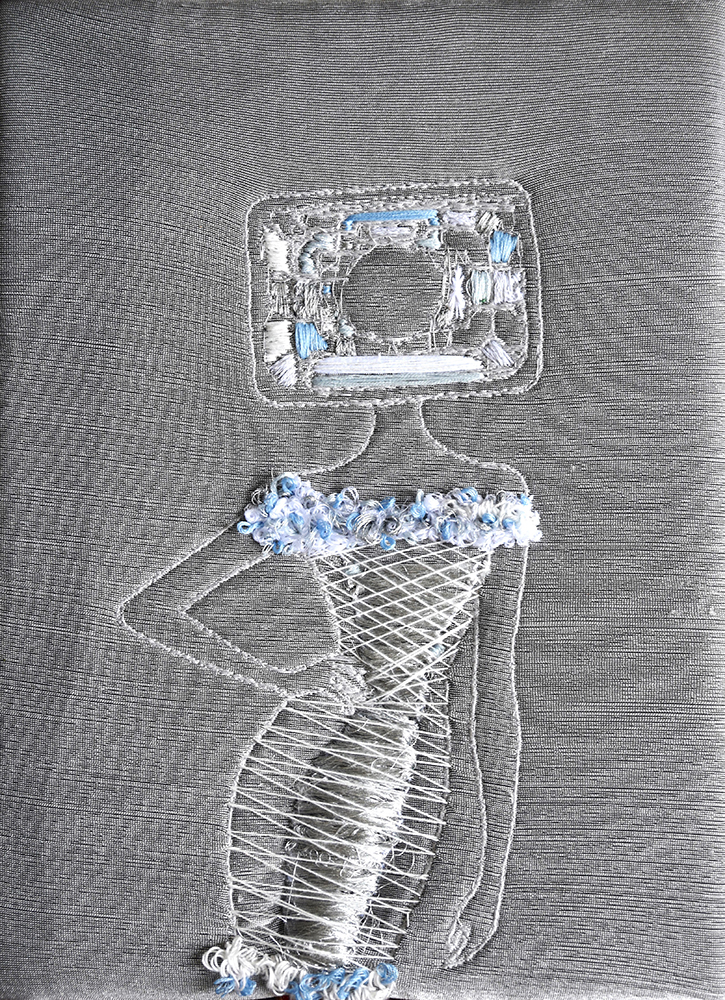
Shanique Thompson: Digital Scales
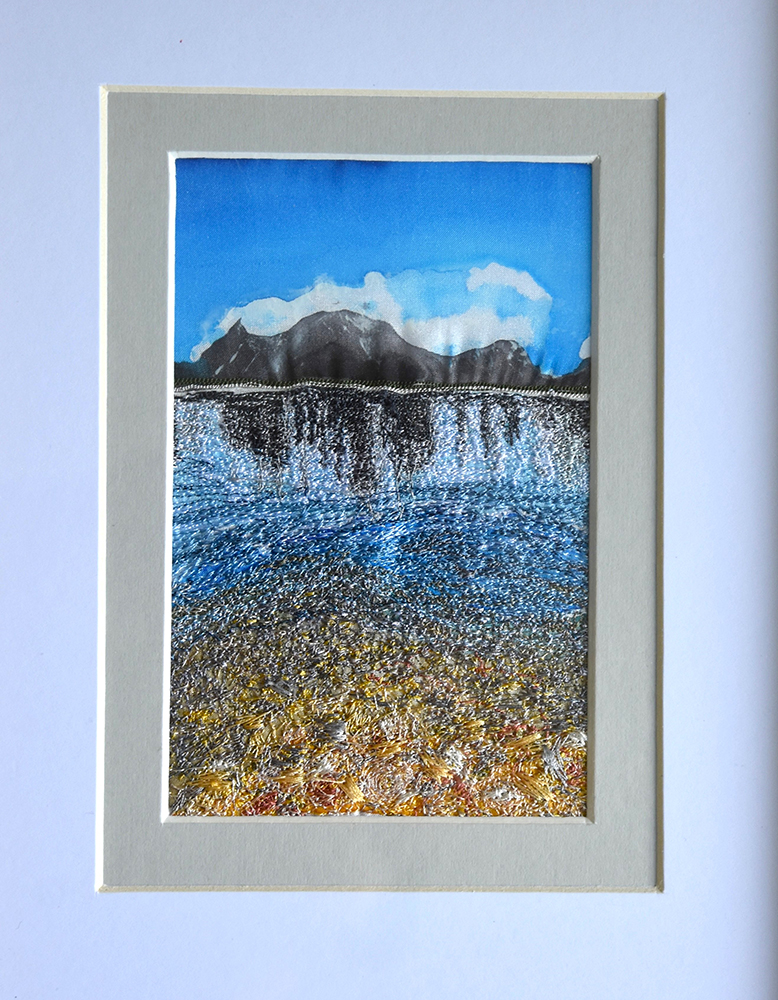
Sue Dunkerley: The Rockies
Sue Dunkerley: Geometric Fun
President (John Allen)’s Challenge
‘Icon’ 20×20 cms
![]()
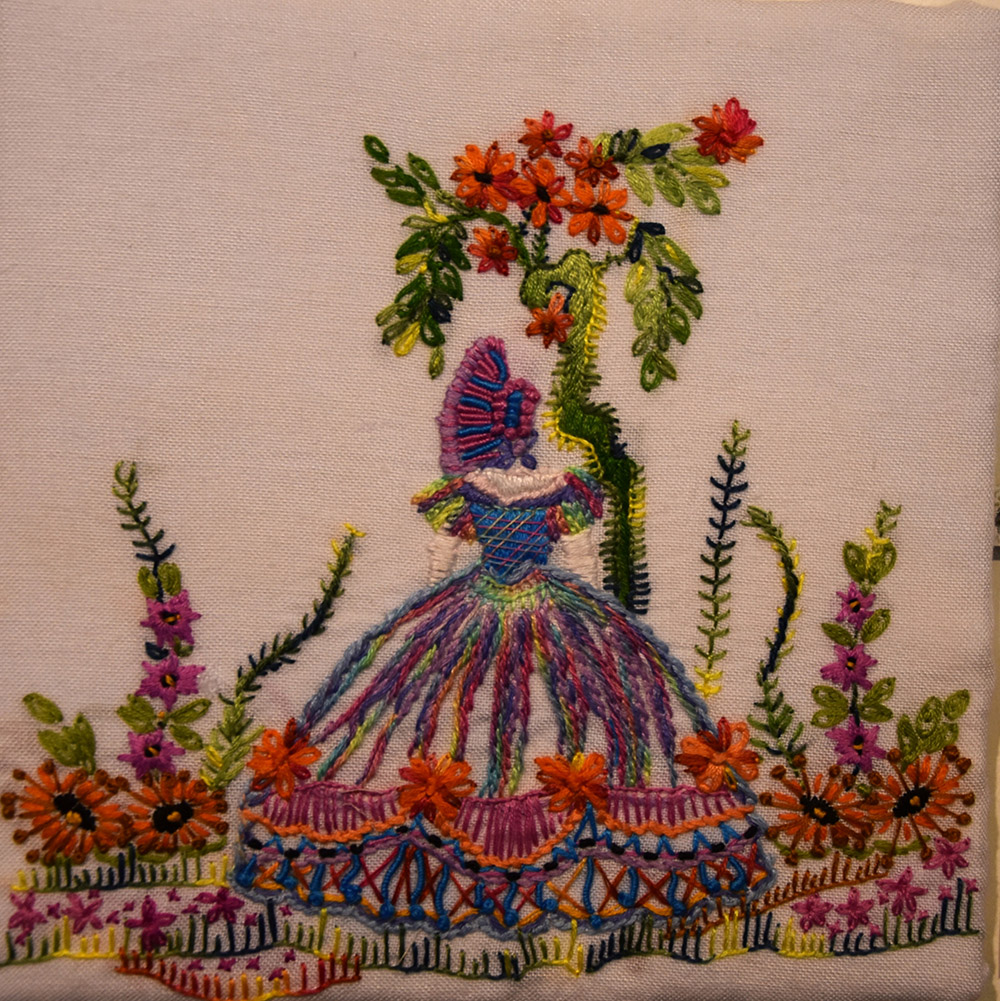
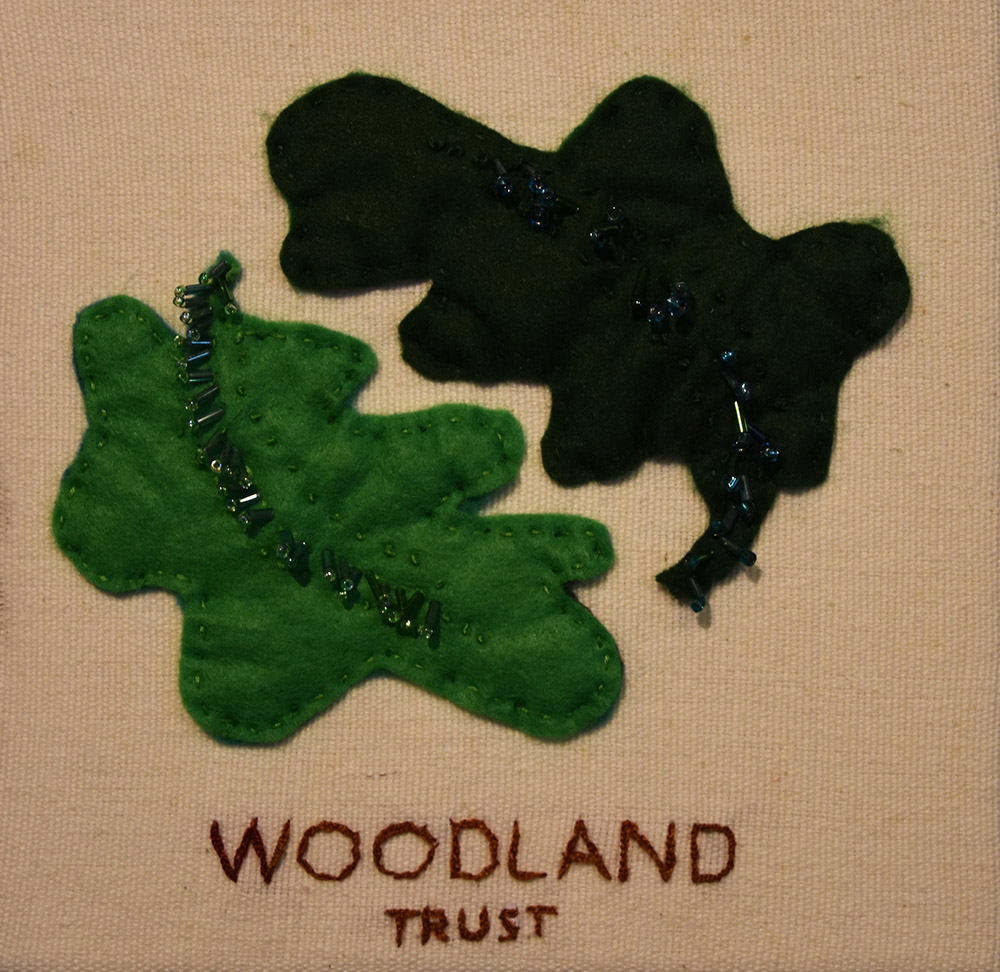
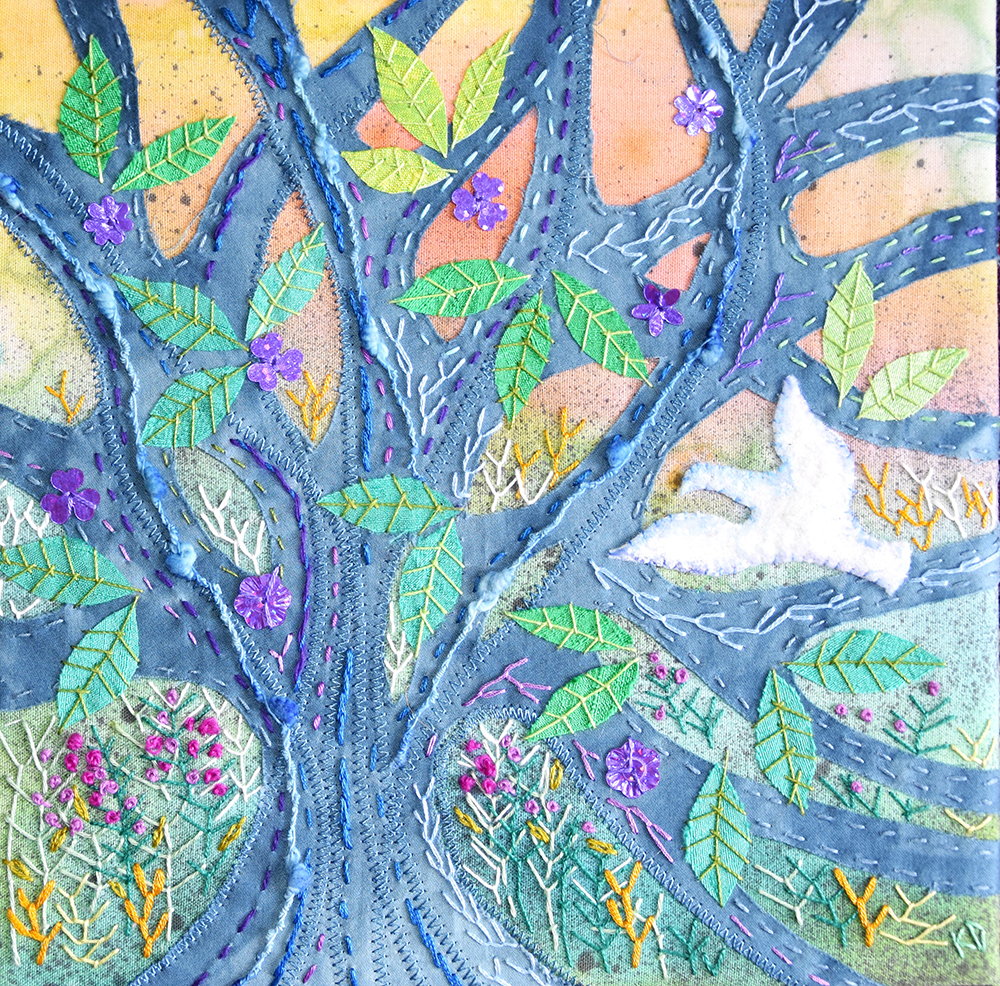
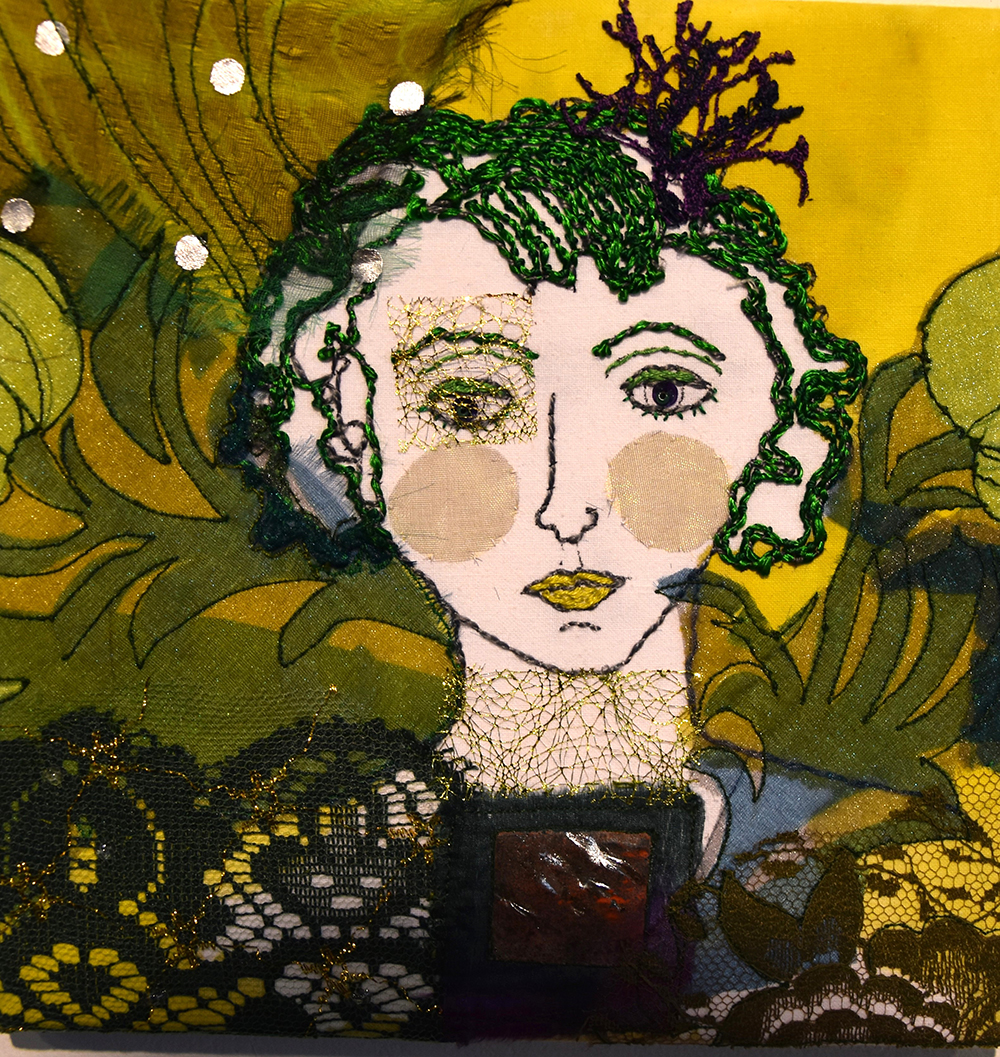
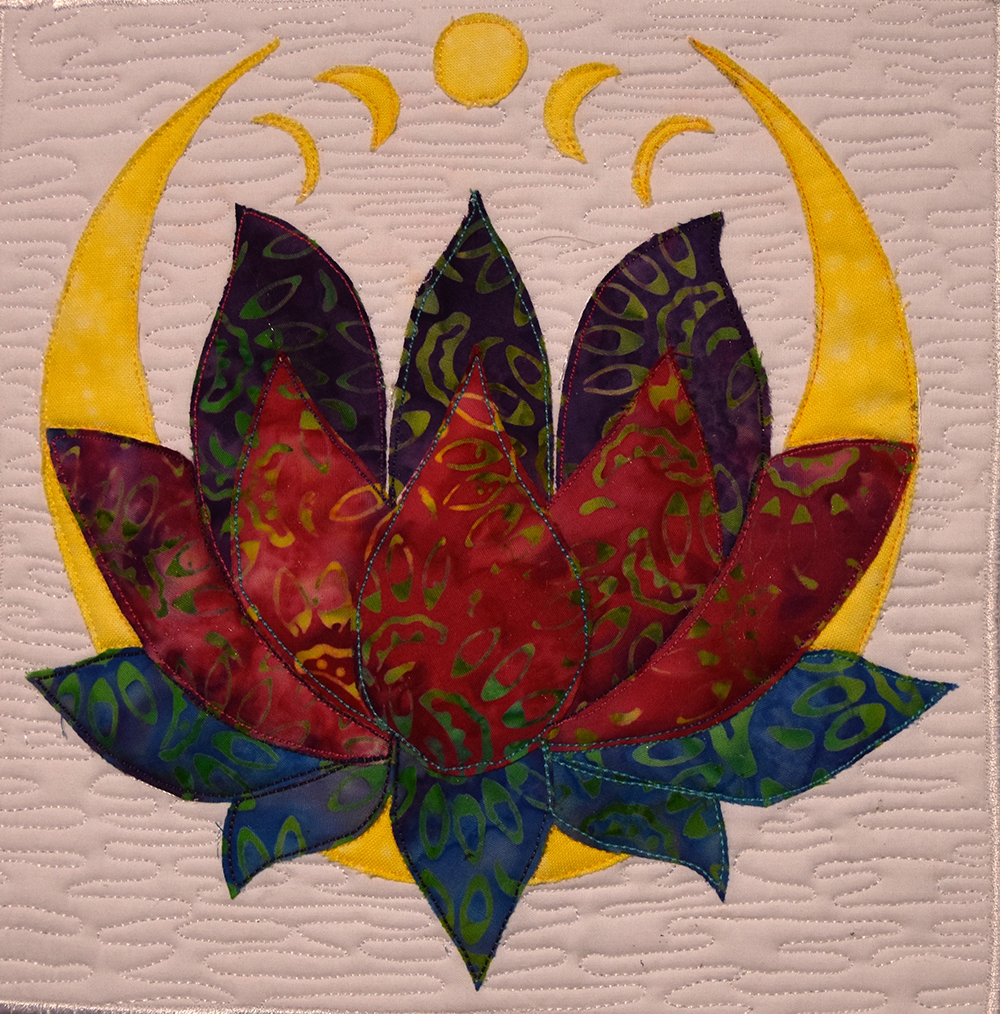
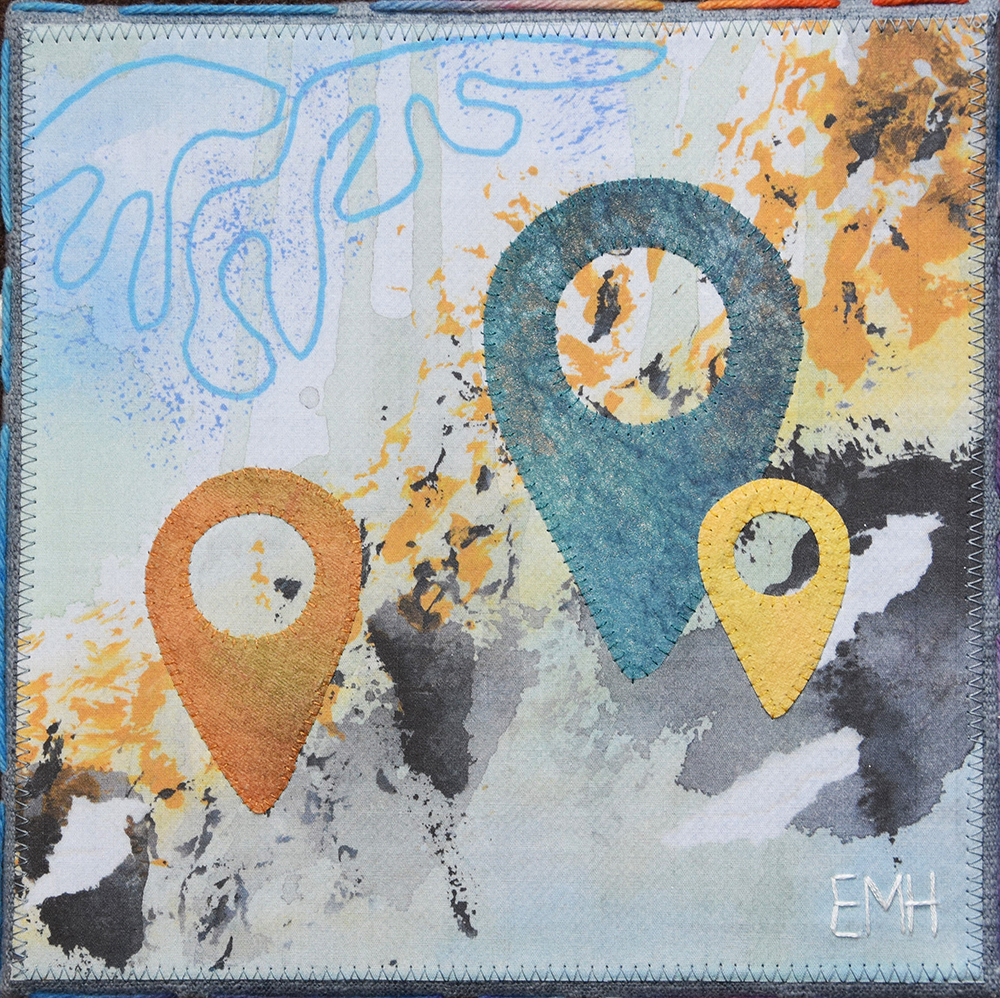
New Embroidery Group Garden Party
The garden party was for me a rich, delectable experience. I loved it and would like to thank Ann most sincerely for so generously hosting such a lovely event.
Allen Gallery, Alton, Hampshire
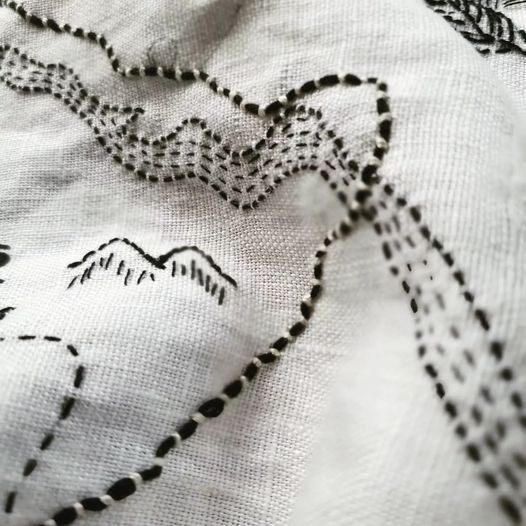
News from New Zealand
It has travelled with my ministry in the USA and now here in Aotearoa New Zealand.
With kindest regards, Graham
brgeem@gmail.com

AGM March 2022
Eleonor Rollen
Janet brought quite a few applique? pieces for us to look at and some she mounts by stitching them onto a soft mounting board. She showed us the back of one piece and explained how it had been executed. She sometimes puts her work in wooden frames that she paints a colour to match her textile. She had a few of her books of textiles on display and some cards for us to buy.
Janet has exhibited in several countries: England, Japan, America and Canada and she has run work-shops in lots of countries and also with the Maiwa foundation in Vancouver.
It was a most wonderful talk and such a pleasure to meet this very friendly and talented lady. I felt extremely sorry for all of you who missed it.
Views of the Exhibition
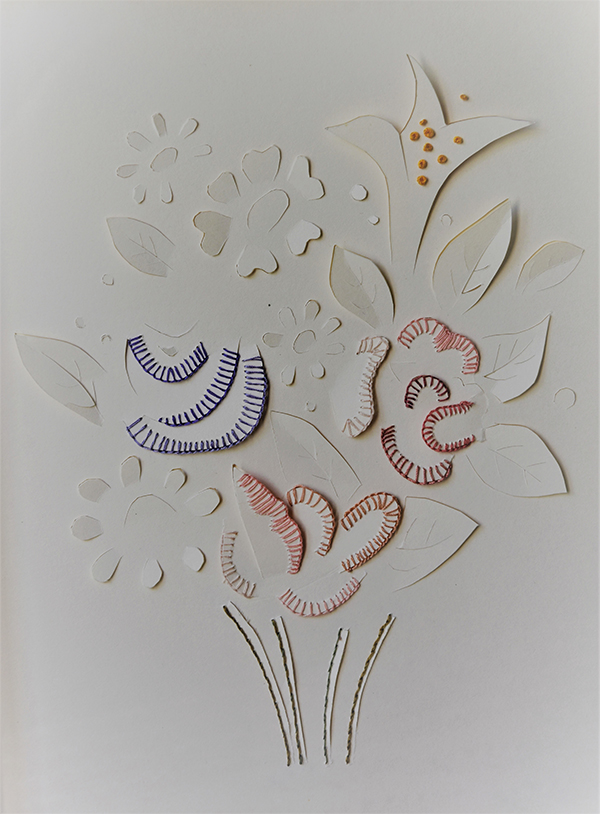 Janice Lawrence
Janice Lawrence
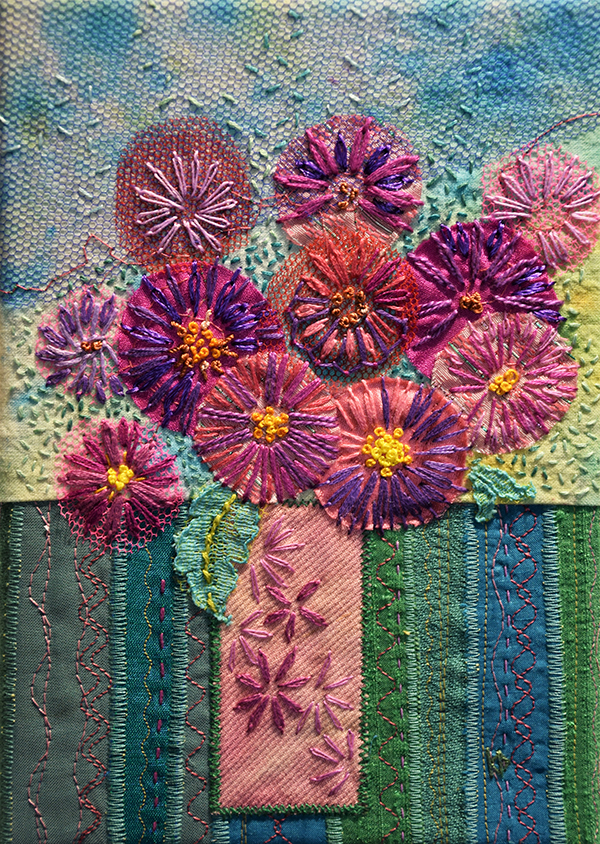 Kate Davis
Kate Davis
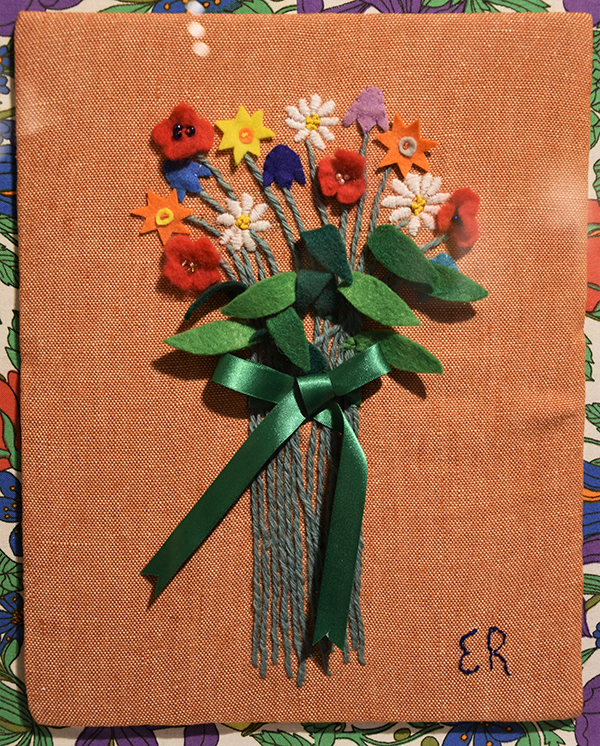 Eleonor Rollen
Eleonor Rollen
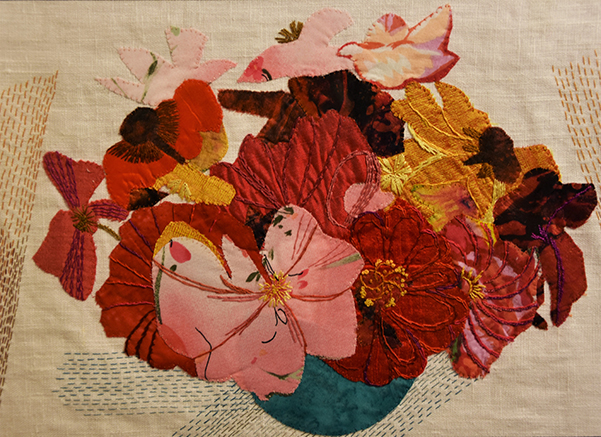 Bridget Barber
Bridget Barber
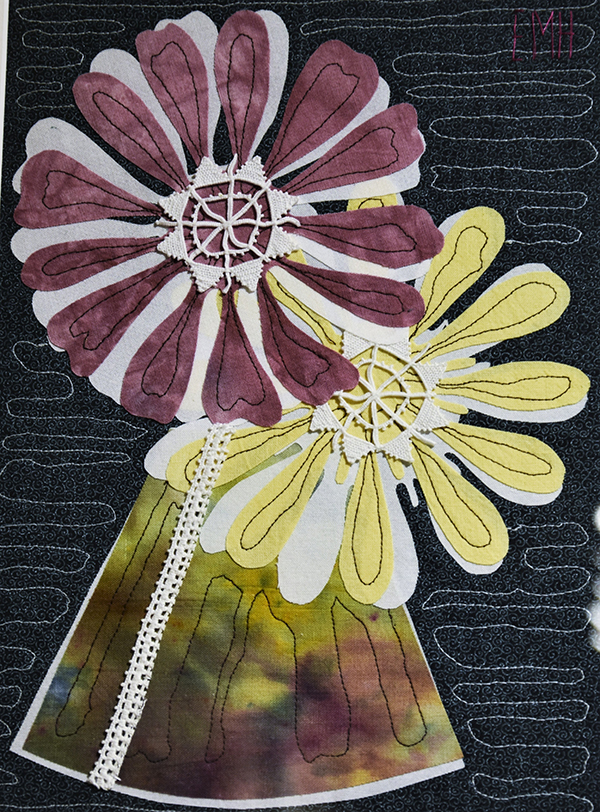 Liz Holiday
Liz Holiday
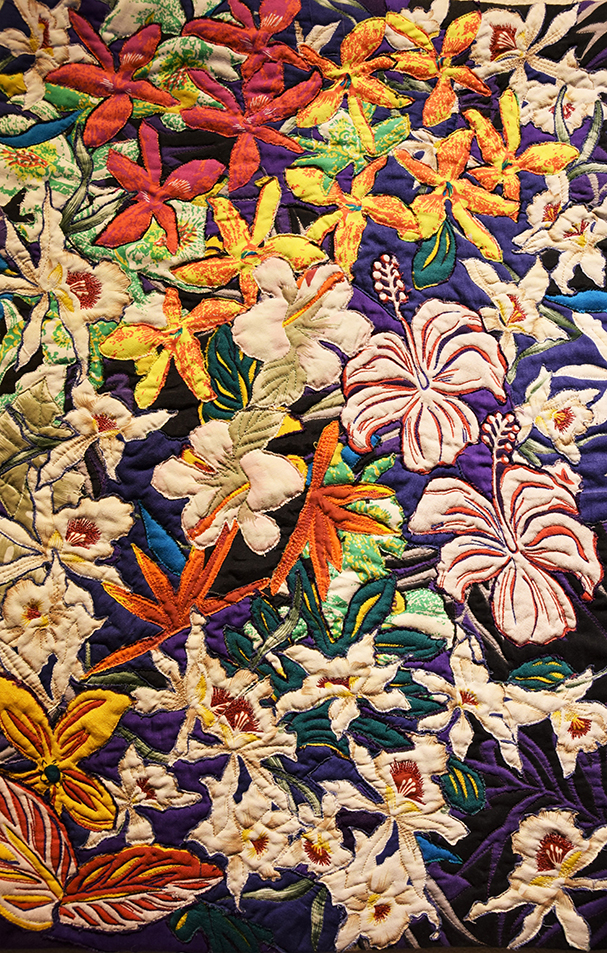 Dianne Whyte
Dianne Whyte
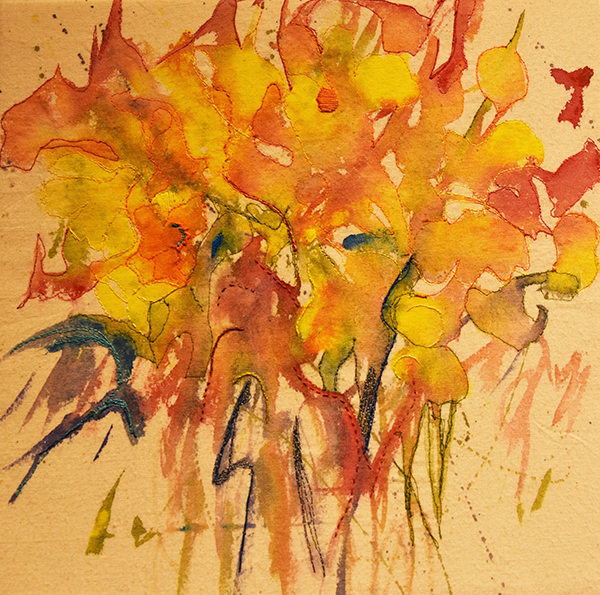 Jenny Black
Jenny Black
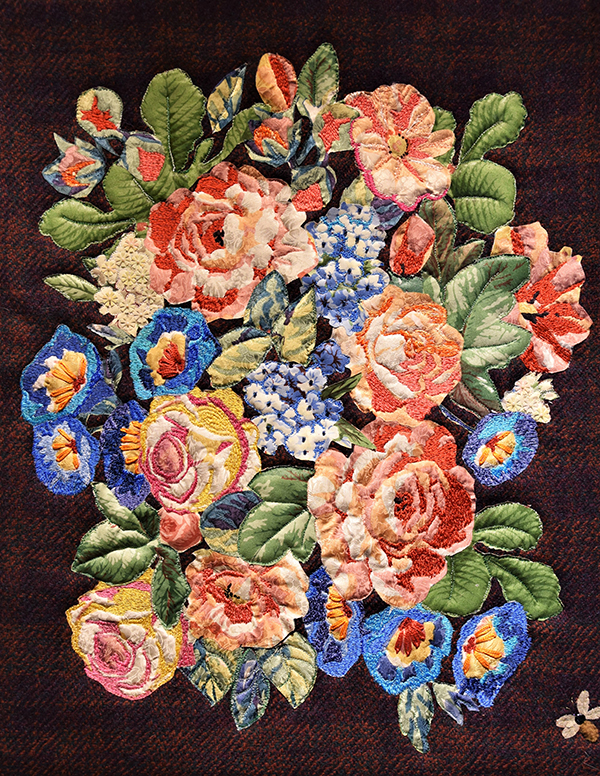 Ann Rutherford
Ann Rutherford
 Anna Diamond
Anna Diamond
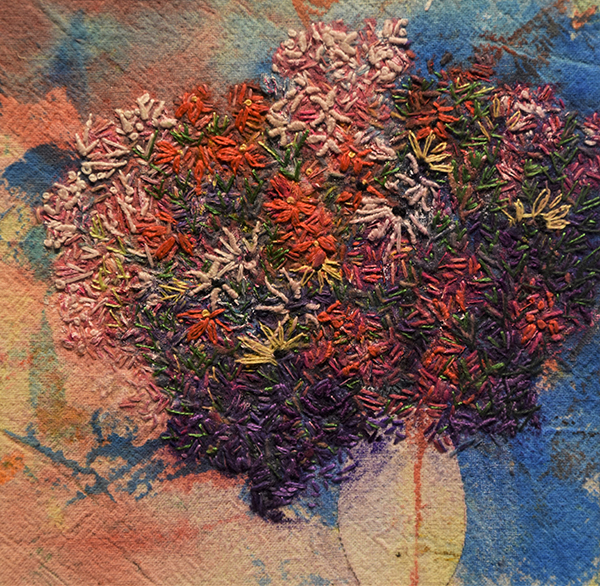 Sandra Hurll
Sandra Hurll
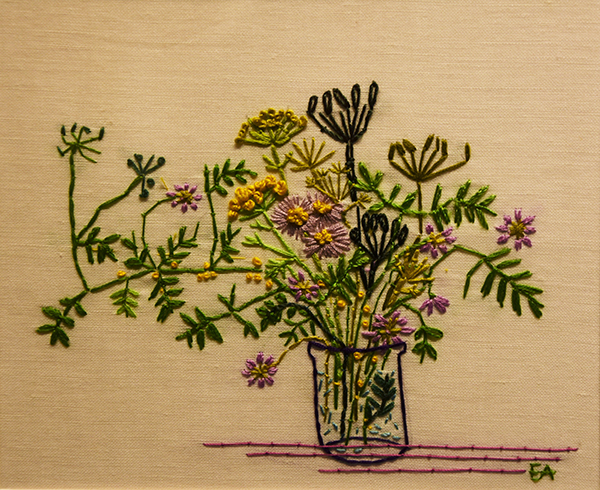 Liz Ashurst
Liz Ashurst
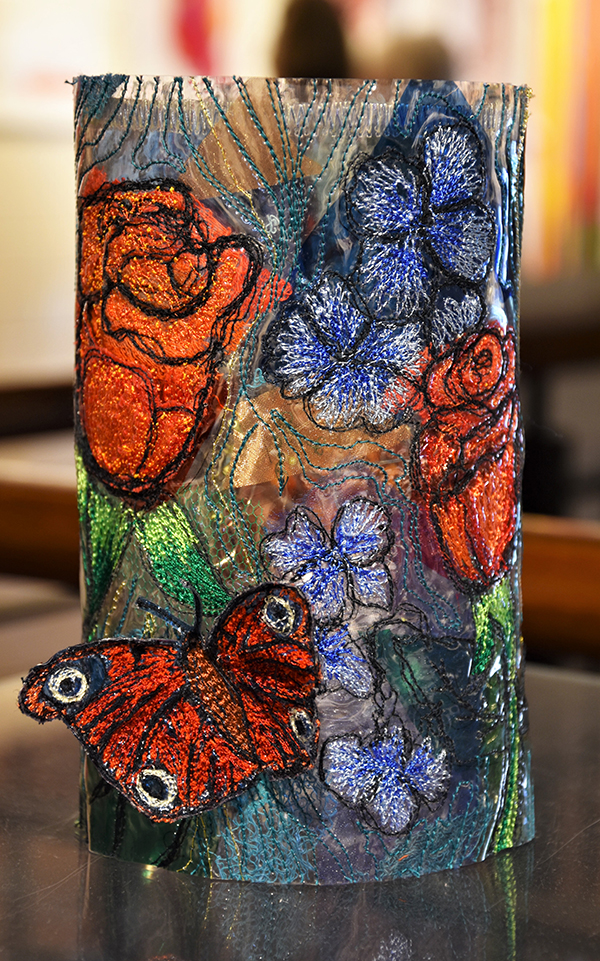 Sue Dunkerley
Sue Dunkerley
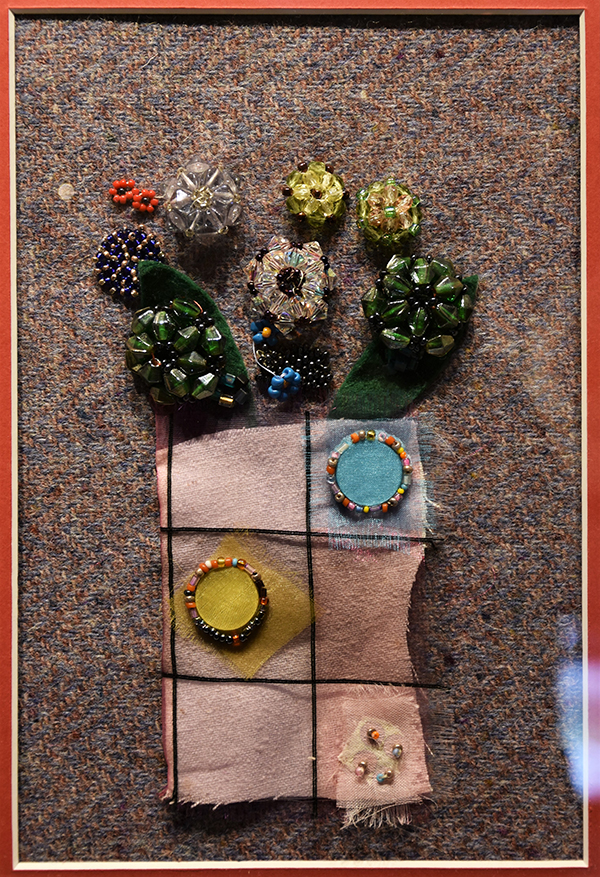 Barbara Jeremiah
Barbara Jeremiah
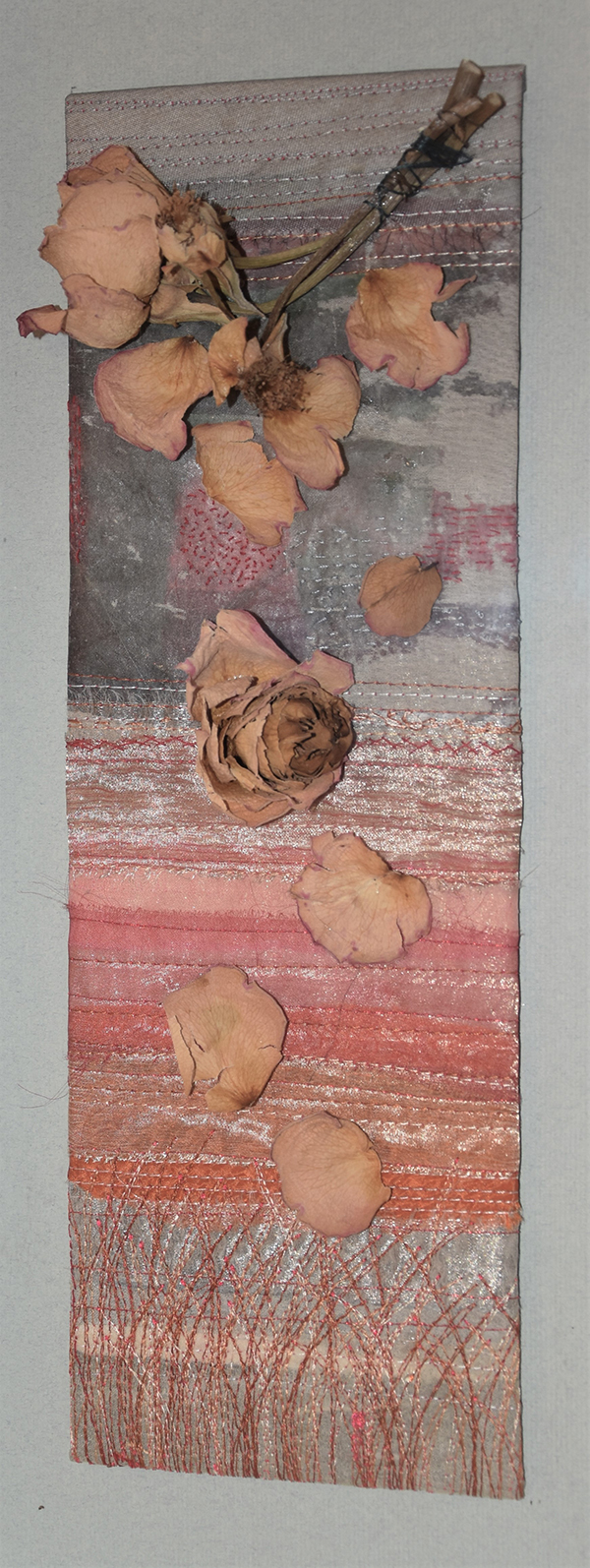 Angela Dewar
Angela Dewar
A portrait of my husband.
Does your mind meander or do you react more formally? Kinetic art.
Painted Khardi paper, machine embroidered.
Contemporary Kantha.
Design developed from foliage art work. Hand stitched.
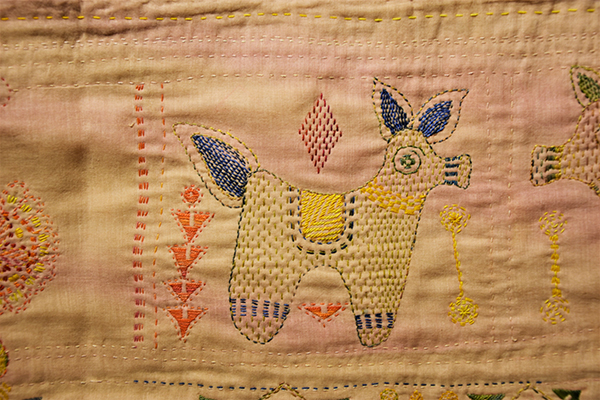 Surjeet Husain
Surjeet Husain
These news presenters have been ‘in my view’ on television for the past eighteen months or so.
Hand stitched portraits on old linen.

From a series of ‘at risk’ birds that represent, in my view, my feelings during lockdown.
Hand stitched on old linen with found fabrics.
From a series of ‘at risk’ birds that represent, in my view, my feelings during lockdown.
Hand stitched on old linen with found fabrics.
Monoprinted fabric, machine quilted and hand-embroidered.
Machine embroidery and paint. A view I pass daily on my way to swim.
Painted and stitched paper collage.
Felt with hand stitching. Inspired by the metaphysical poet, Henry Vaughn.
Novelty, acceptance and frustration. Silk shapes applied to dyed silk background, hand stitched and beaded.
Wheatsheaf wattle stitch and beading on linen.
Wet felted using sheep’s fleece, stitches and pieces of bark from a birch tree.
Personal photographs on painted lutrador, machine embroidered.
Breakdown print, machine quilted and hand embroidered.
Hand and machine stitching calico painted with acrylics, mounted on oil paint on canvas.
Pieces of wool blanket, dyed, hand stitched with applied pieces and beads.
https://www.sarahcampbelldesigns.com/gallery-2
https://www.houseandgarden.co.uk/article/sarah-campbell-pukka-prints
Pulkari stitch.
Hand and machine stitching calico painted with acrylics, mounted on oil paint on canvas.
Hand stitched canvas work.
Free machine embroidery and cord on hand-dyed silk organza and cotton damask.
A fragment of C17th tapestry, the pattern extended with free machine embroidery.
Machine and hand embroidery, wool, beads, fabric paints.
These fritillaries symbolise the danger to wild flowers due to farming methods and climate change.
Fabrics are painted and layered, machine and hand stitched.
Stumpwork, embroidery, beads and patchwork.
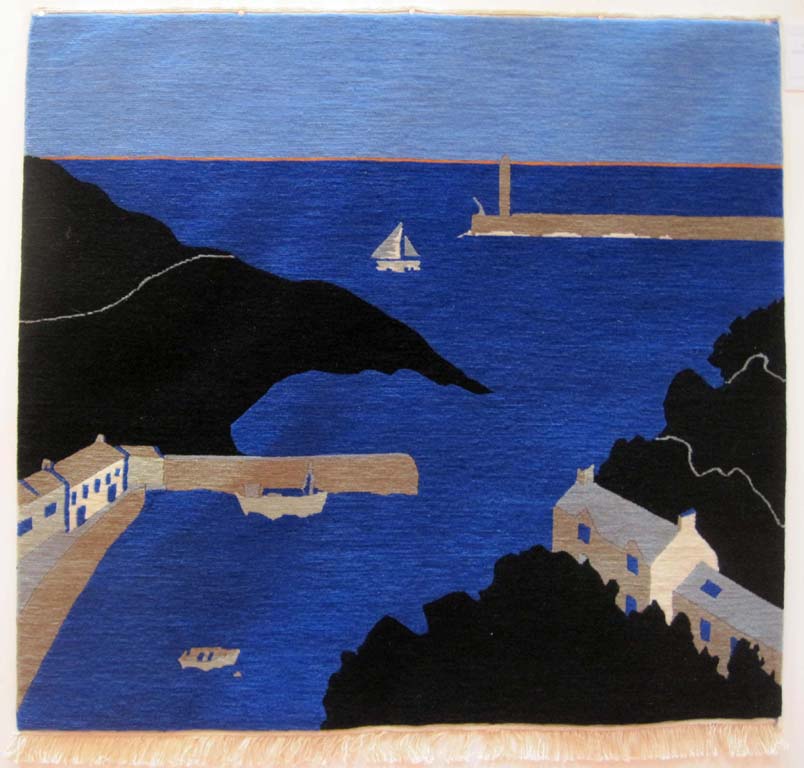 Cornish Harbour
Cornish Harbour
Inspired by Larmona harbour.
Designed by John Allen, President of the New Embroidery Group, and hand woven in Nepal
Free machine embroidered cord on a soluble ground with added sequins and crystal beads.
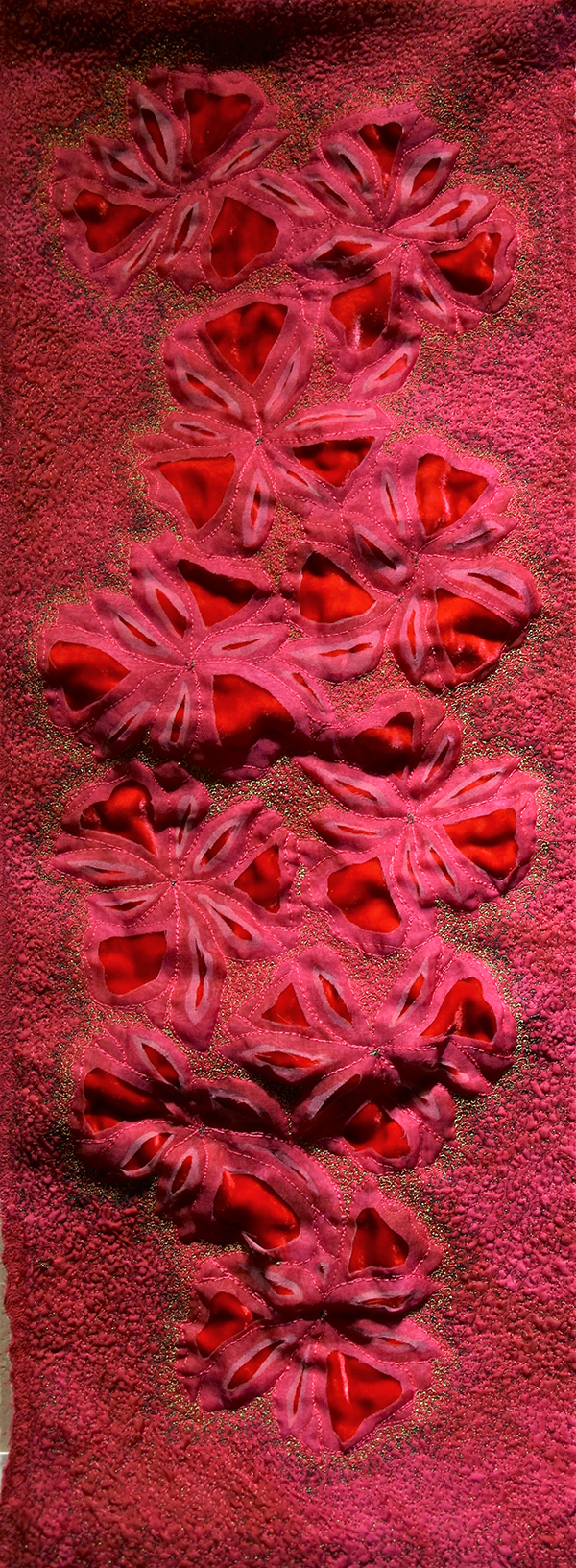 Arlene Shawcross
Arlene Shawcross
Weaving, embroidery and hand-printed fabric.
Four squares of treated papers reassembled.
From a series of ‘at risk’ birds that represent, in my view, my feelings during lockdown.
Hand stitched on old linen with found fabrics.
Machine embroidery of flowers and leaves from the garden.
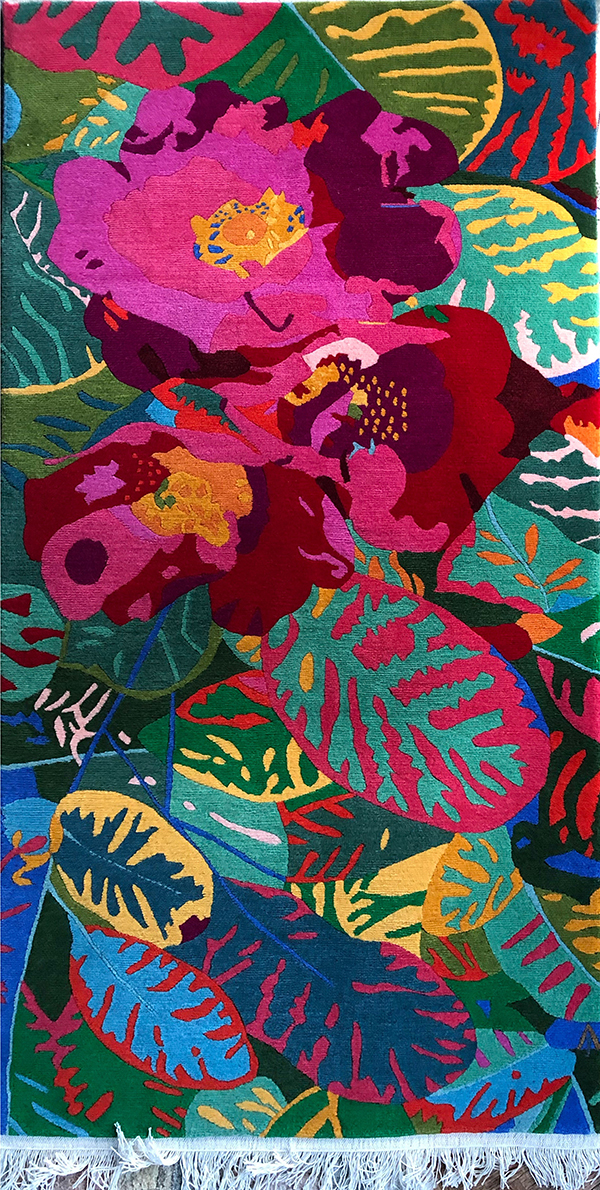 Carpet of Flowers
Carpet of Flowers
Designed by Ann Rutherford, hand woven in Nepal
and hand stitching.
Sashiko embroidery applied to a red background.
Wet felted using sheep’s fleece.
Inspired by a visit to a pomegranate orchard in North India.
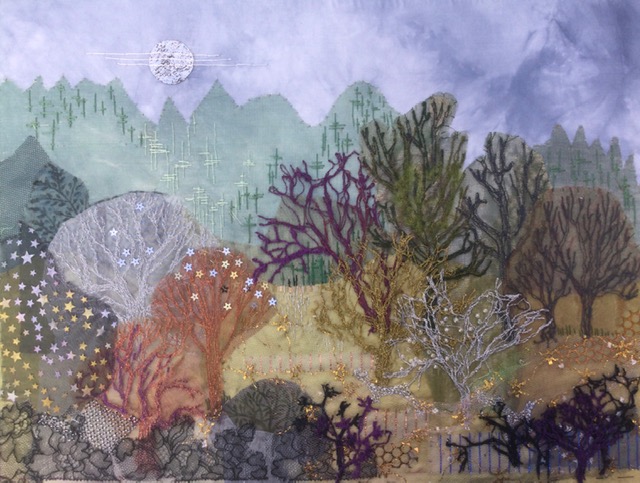
Garden Party
Dianne Whyte
I sweltered!
Talk by John Allen F.R.C.A.
for the New Embroidery Group
1, Liz Ashurst
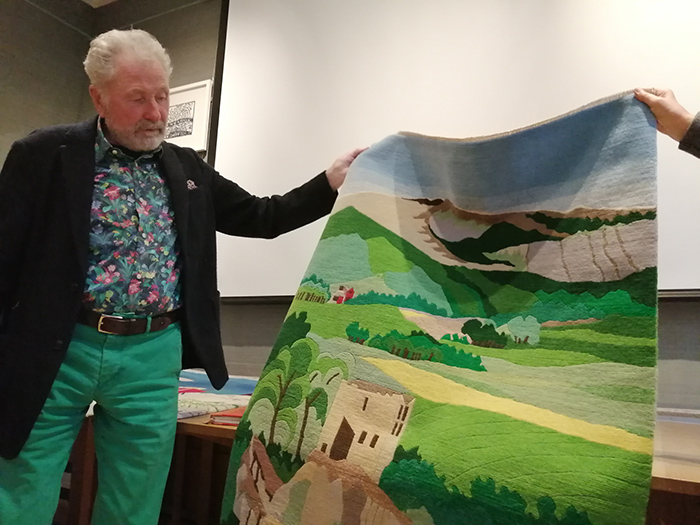
John Allen with one of his landscape wall-carpets.
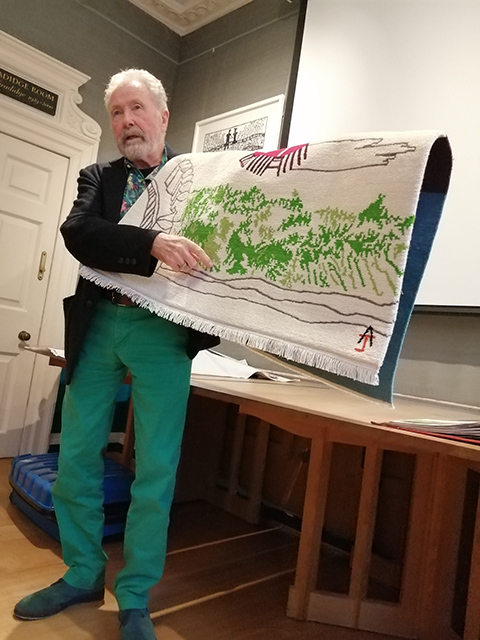
You are an inspiration to us all, John, and we send you our very best wishes for continued creativity and good health.
___________________________________________________
___________________________________________________
2, Alison Hird-Beecroft
John started his creative career at evening classes. His first degree was from the Camberwell School of Art from where he went on to the Royal College of Art for a Masters.
He eventually went back to the Royal College of Art as a tutor and set up the knitting department. He was asked to write a teaching book to which he reluctantly agreed, which went on to sell an unprecedented number of books in that field. He has written other books subsequently. After some years he left to do his own work.
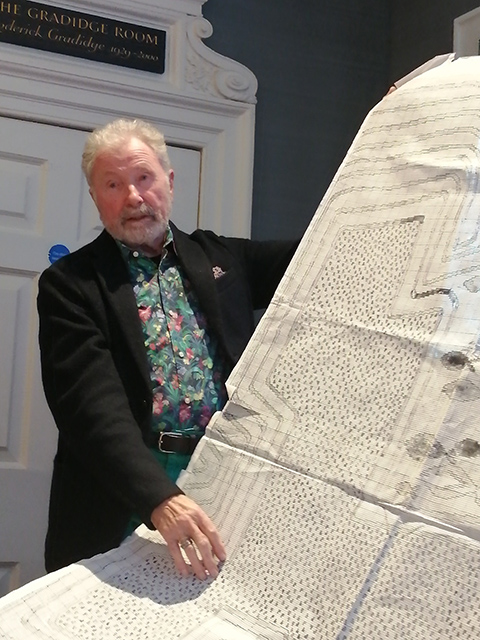
John showing a graph for one of his carpets
The master weaver was able to steer John through the complicated caste system and protocol that exists there, and though John would have loved to to sit on the floor with the weavers themselves, he was not allowed to. He was able to persuade the workshop to take on ideas that seemed alien to them at first.
Thank you John for a fascinating and unforgettable talk.

The Sunbury Embroidery Gallery
Sunbury on Thames TW16 6AB
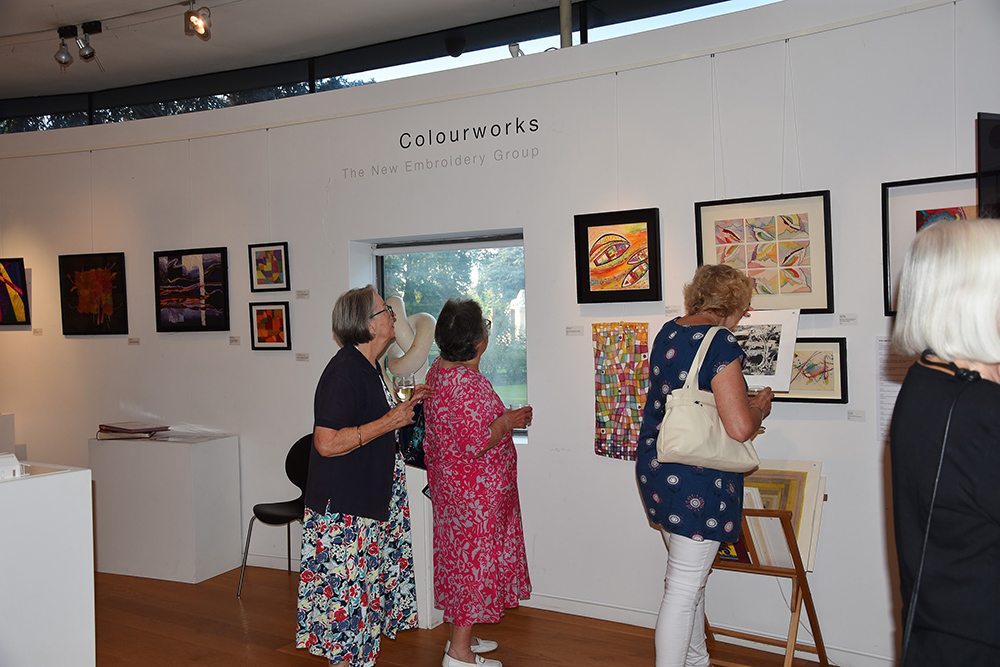
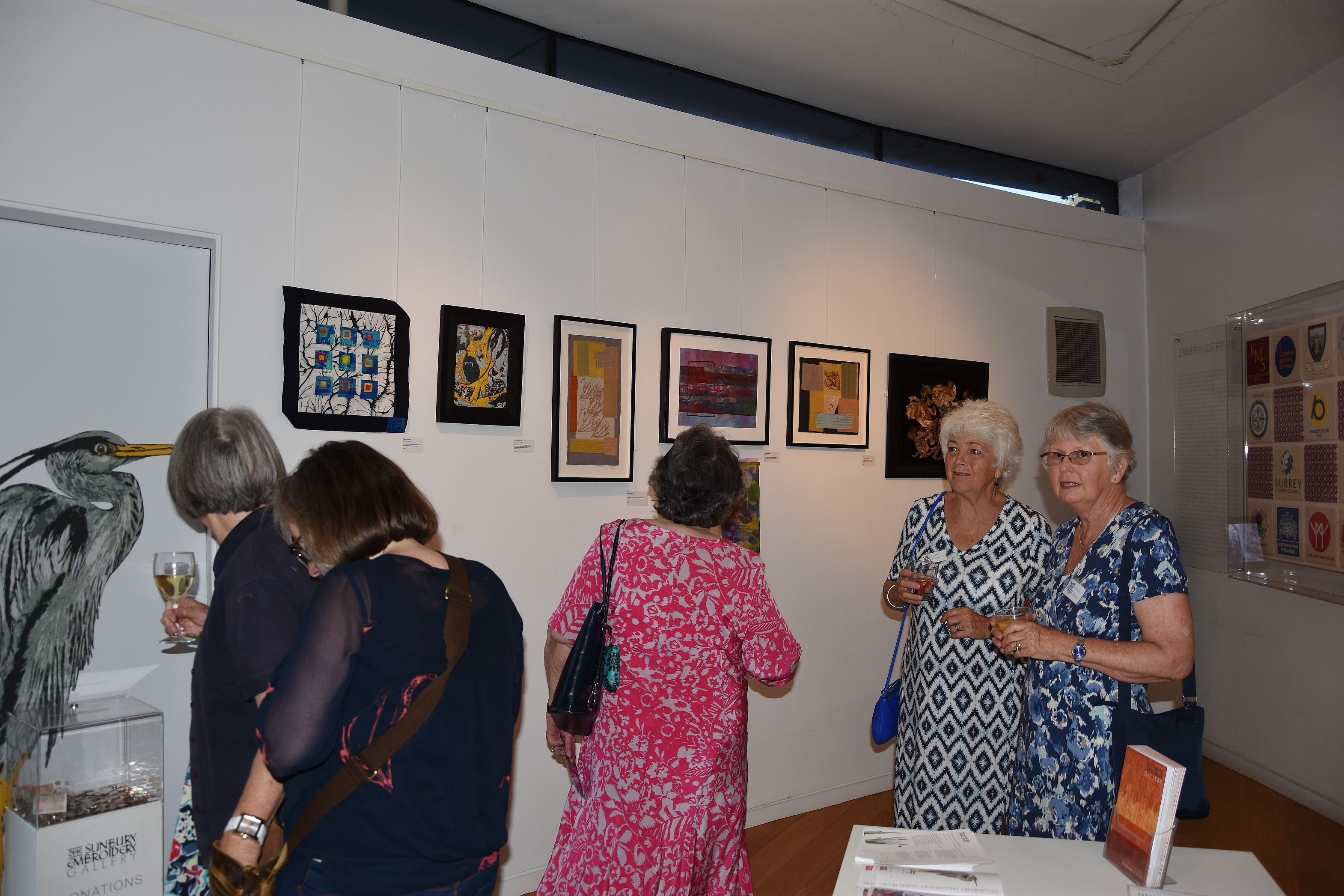
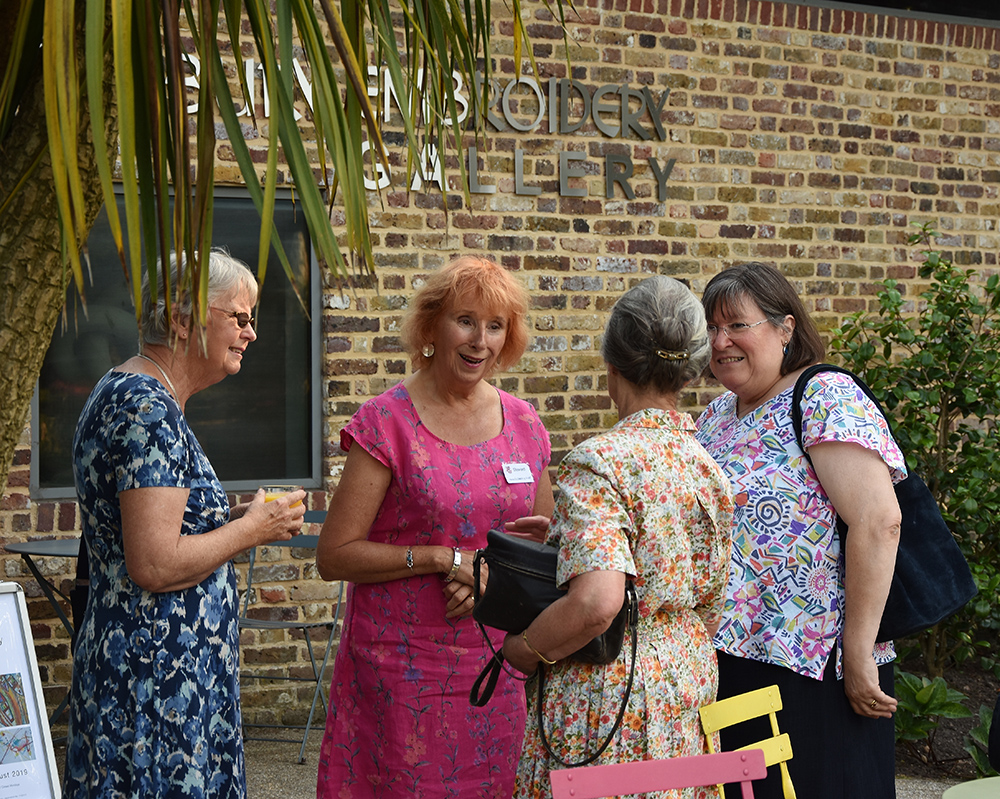
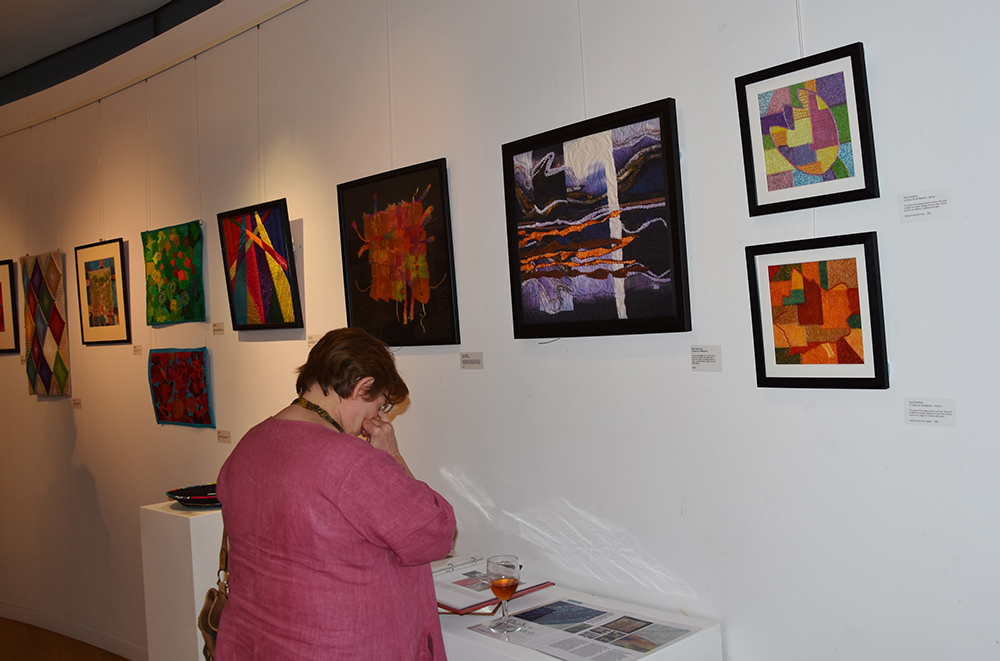
 Liz Ashurst
Liz Ashurst
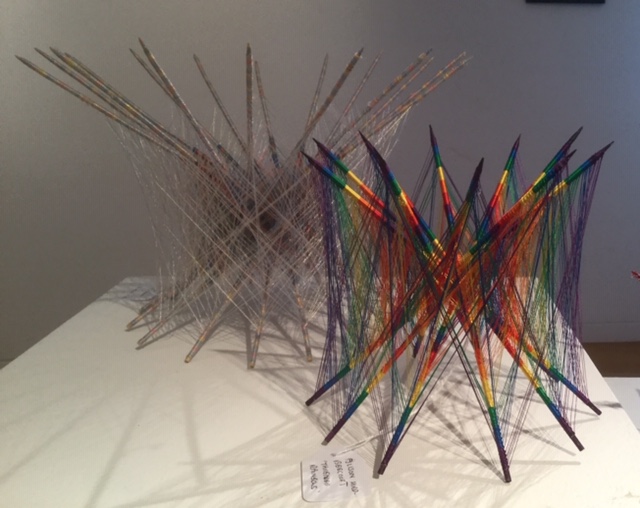 Alison Hird-Beecroft
Alison Hird-Beecroft
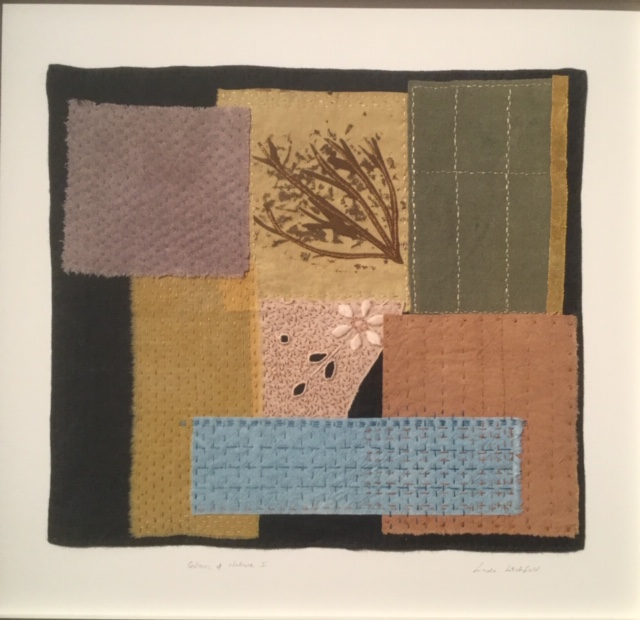 Linda Litchfield
Linda Litchfield
Textile Study day
Kathy Small
Ann had got out textiles from Guatemala, Romania, Syria, Thailand and China.
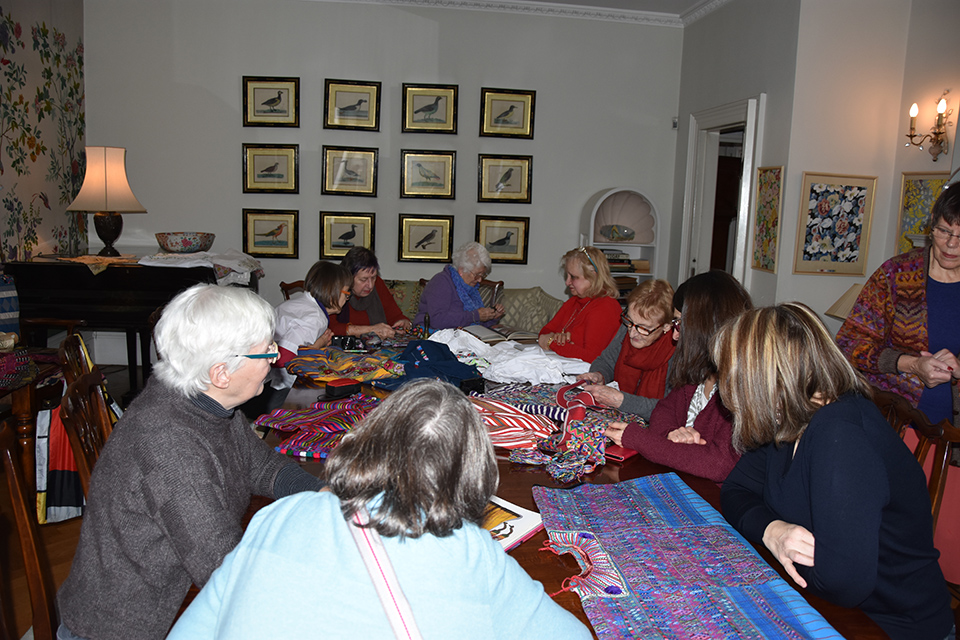
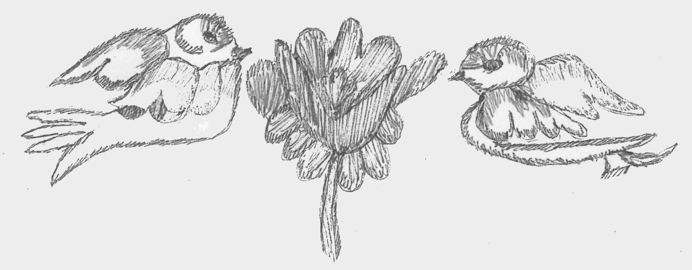
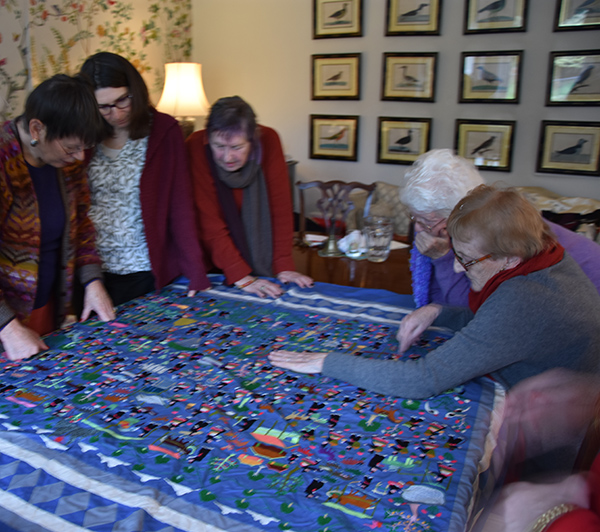
As last year, I am sure we all enjoyed our day very much. Thank you, Ann, for giving us some colour in February.
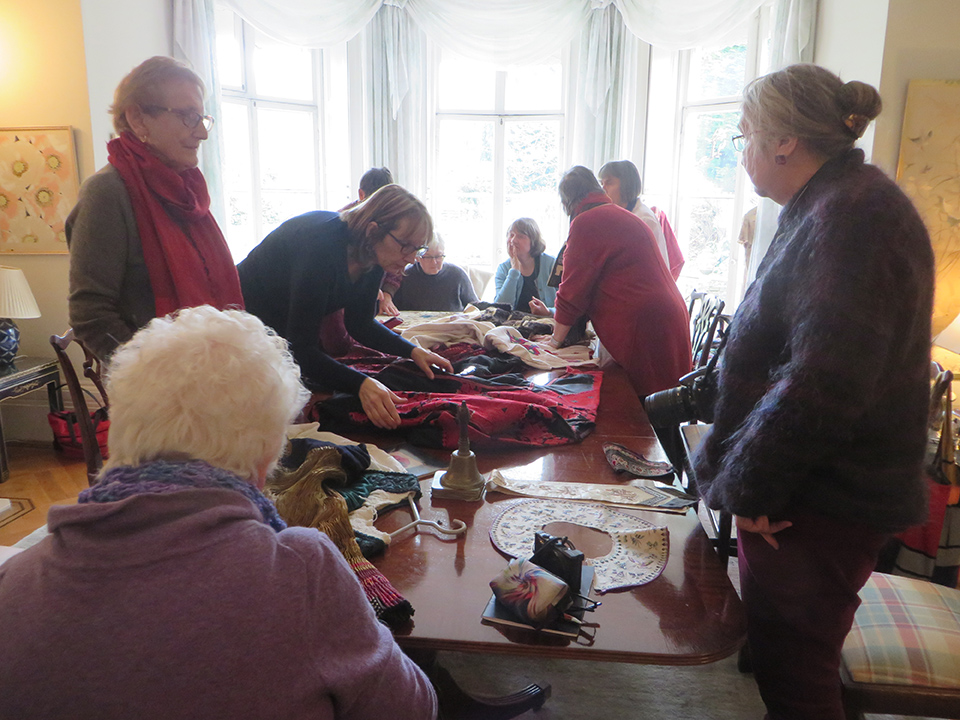
Celebrating the 50th Anniversary of the New Embroidery Group
Deptford Town Hall
New Cross
London S.E.14 6 N.W
9 November – 13 December 2018 inclusive
This exhibition has now finished. Below are some of the exhibits , showing the earliest first.
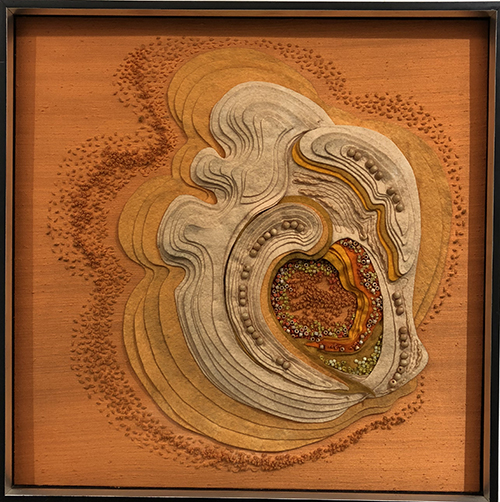
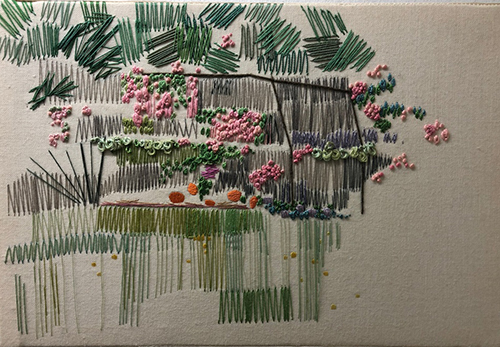
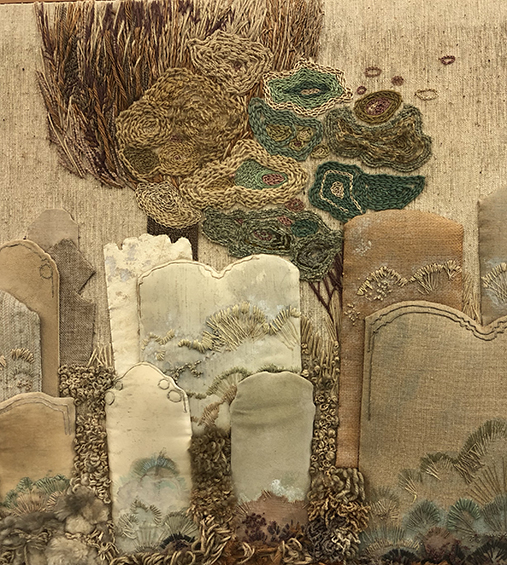
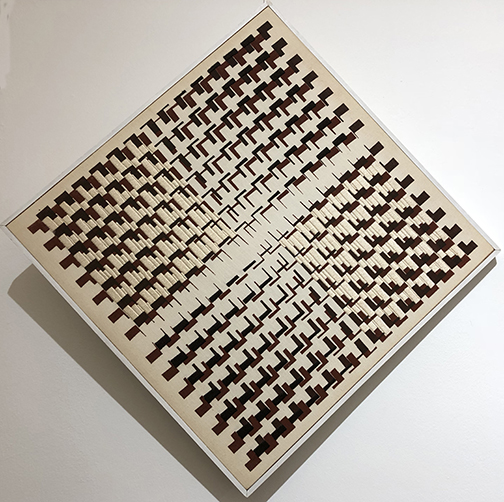
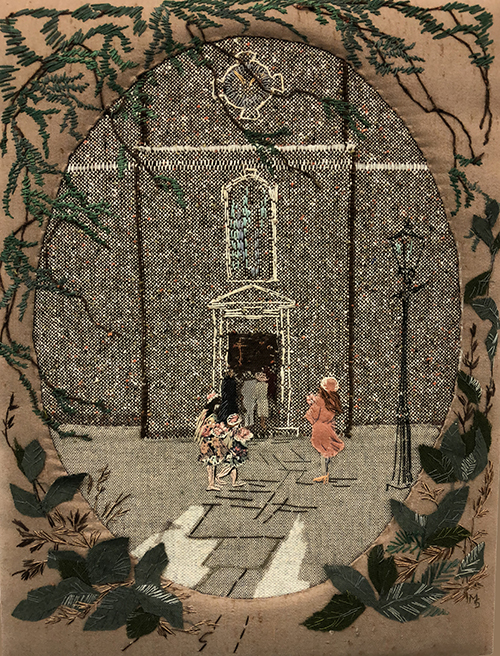
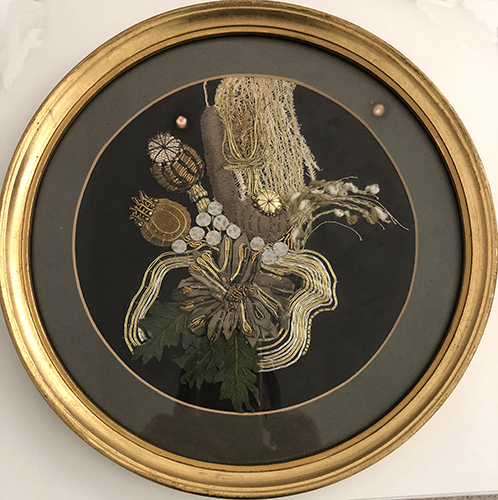
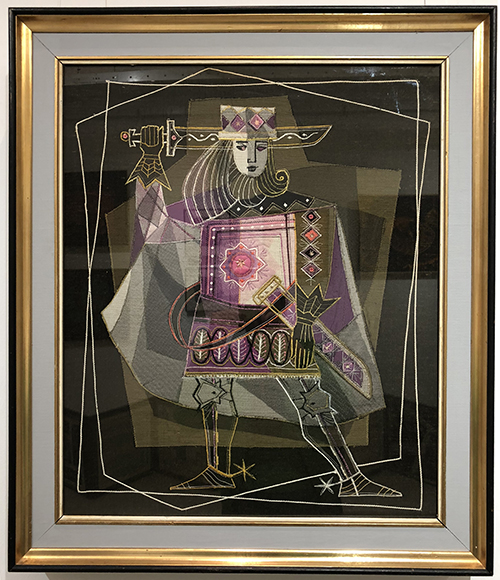
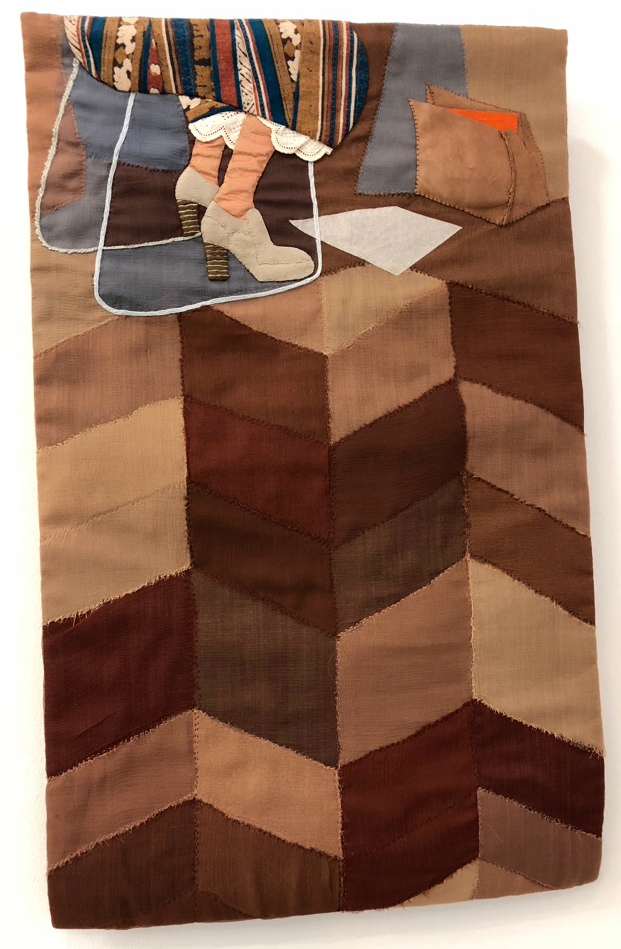
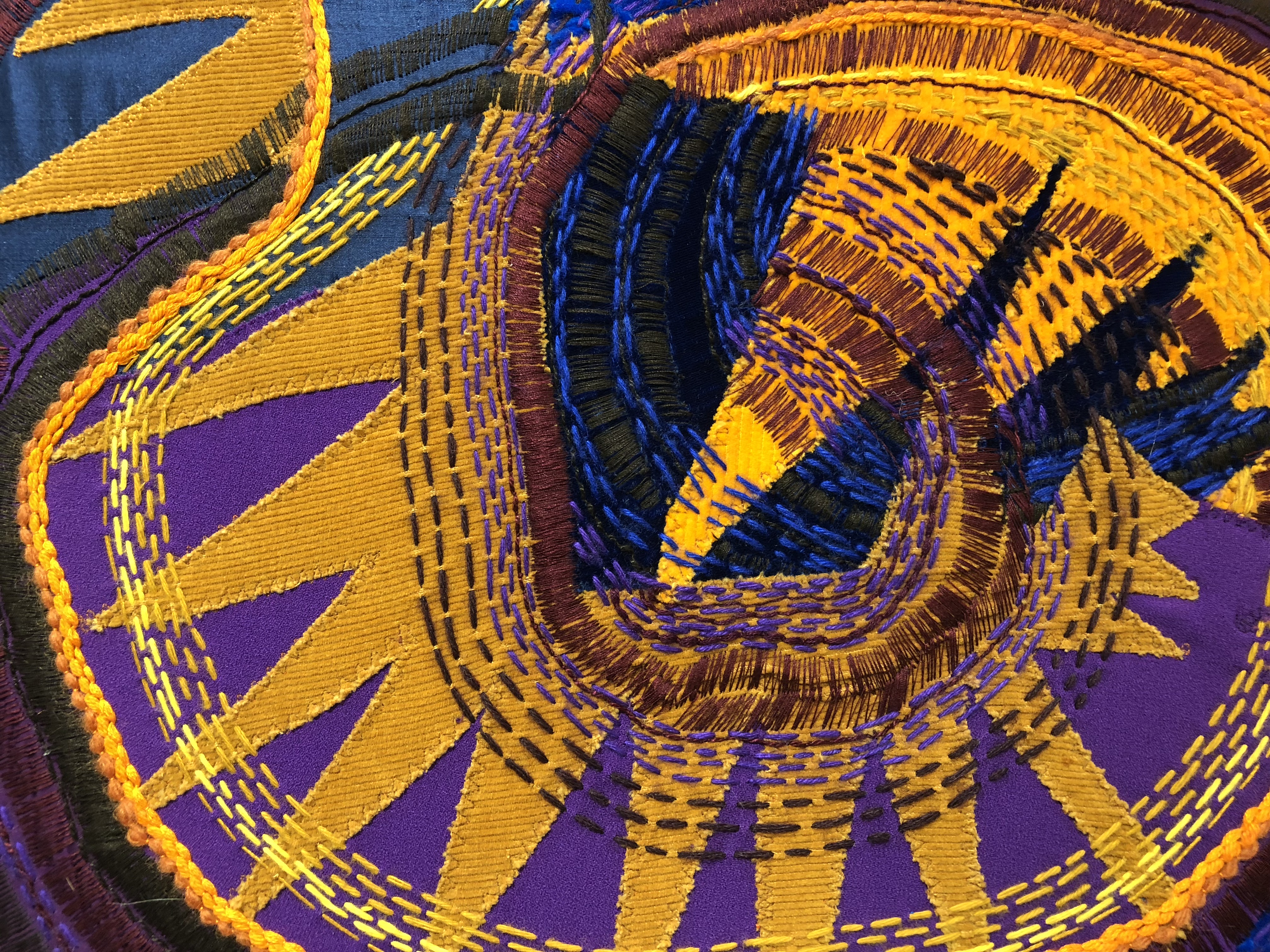
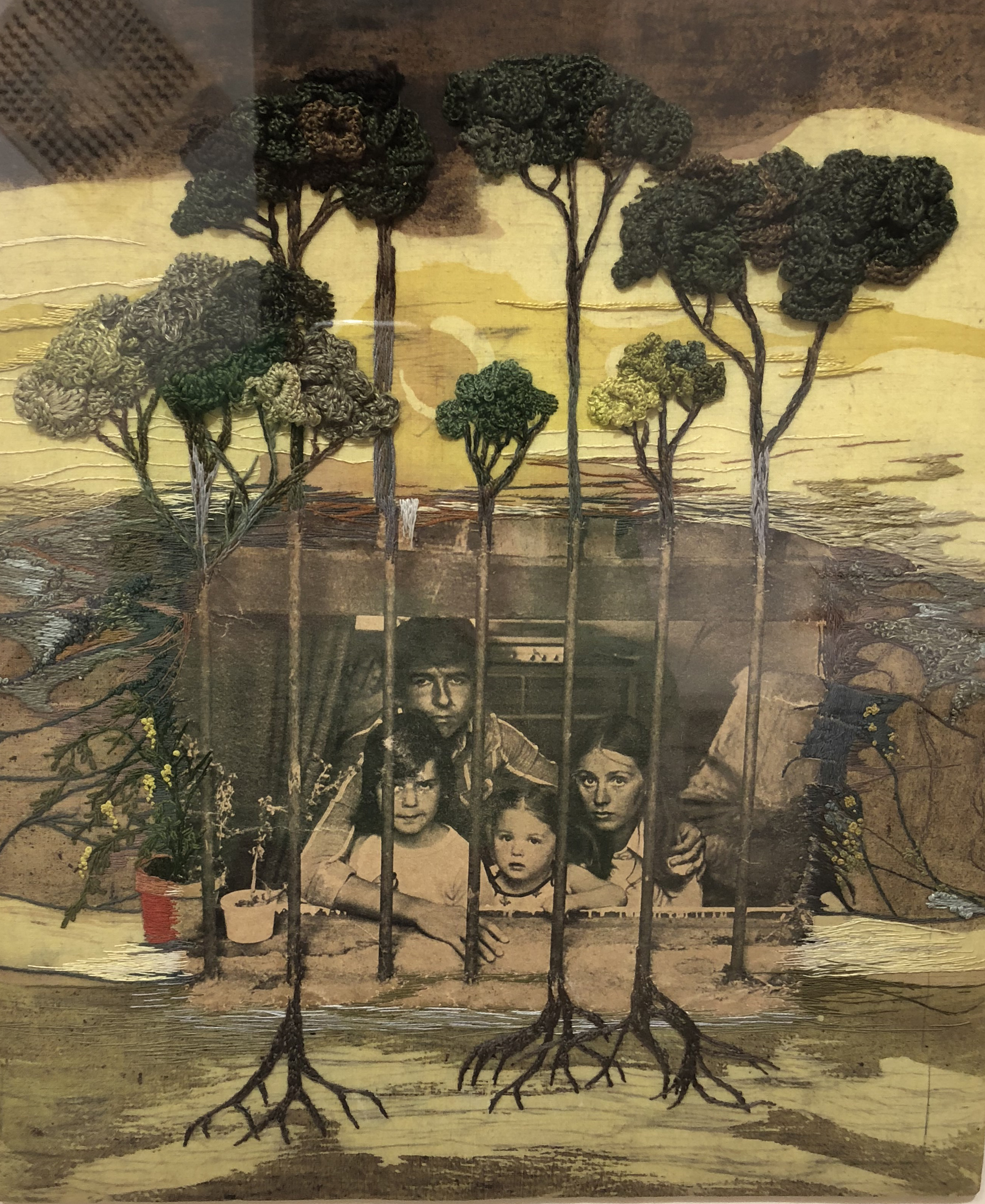
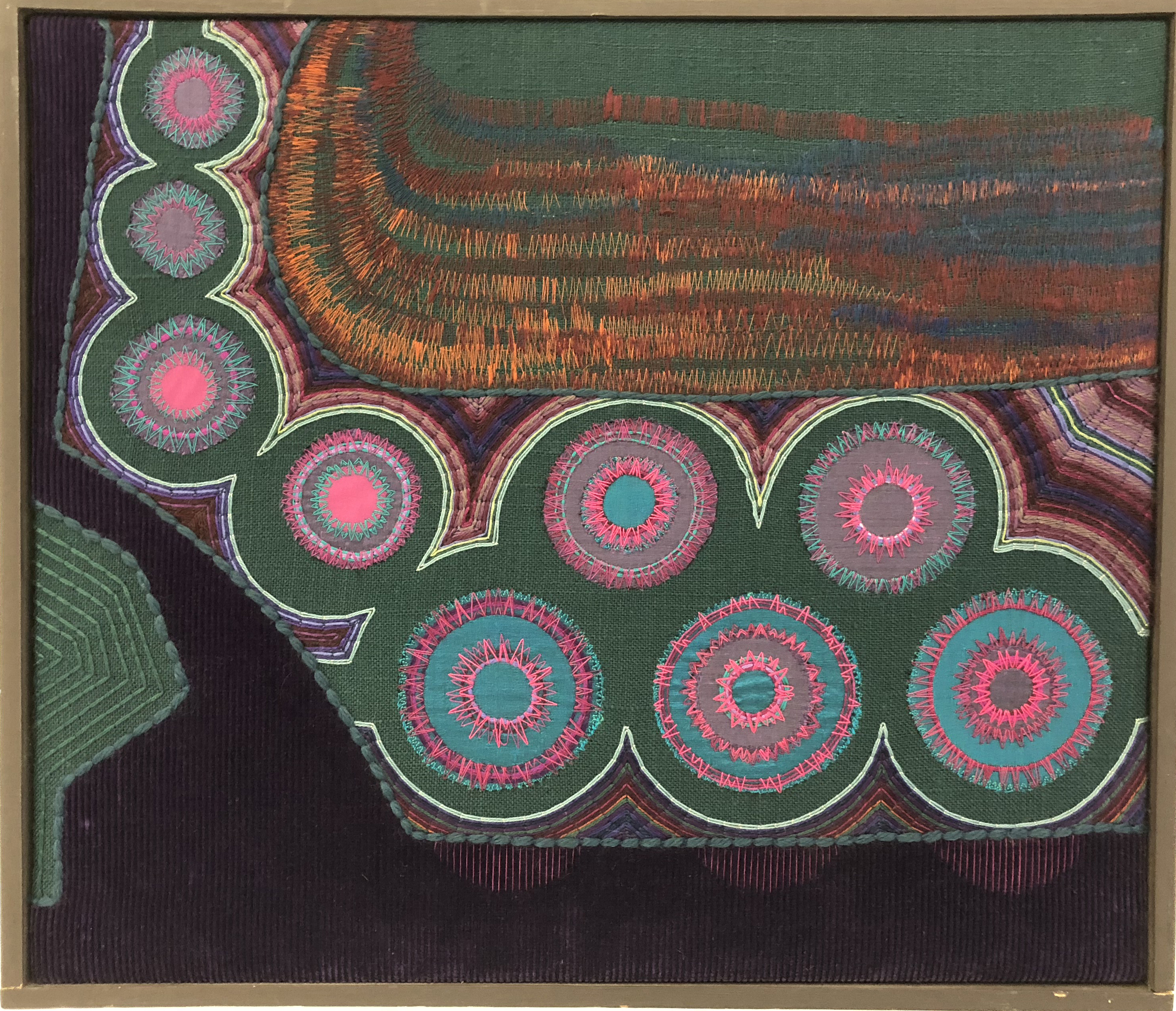
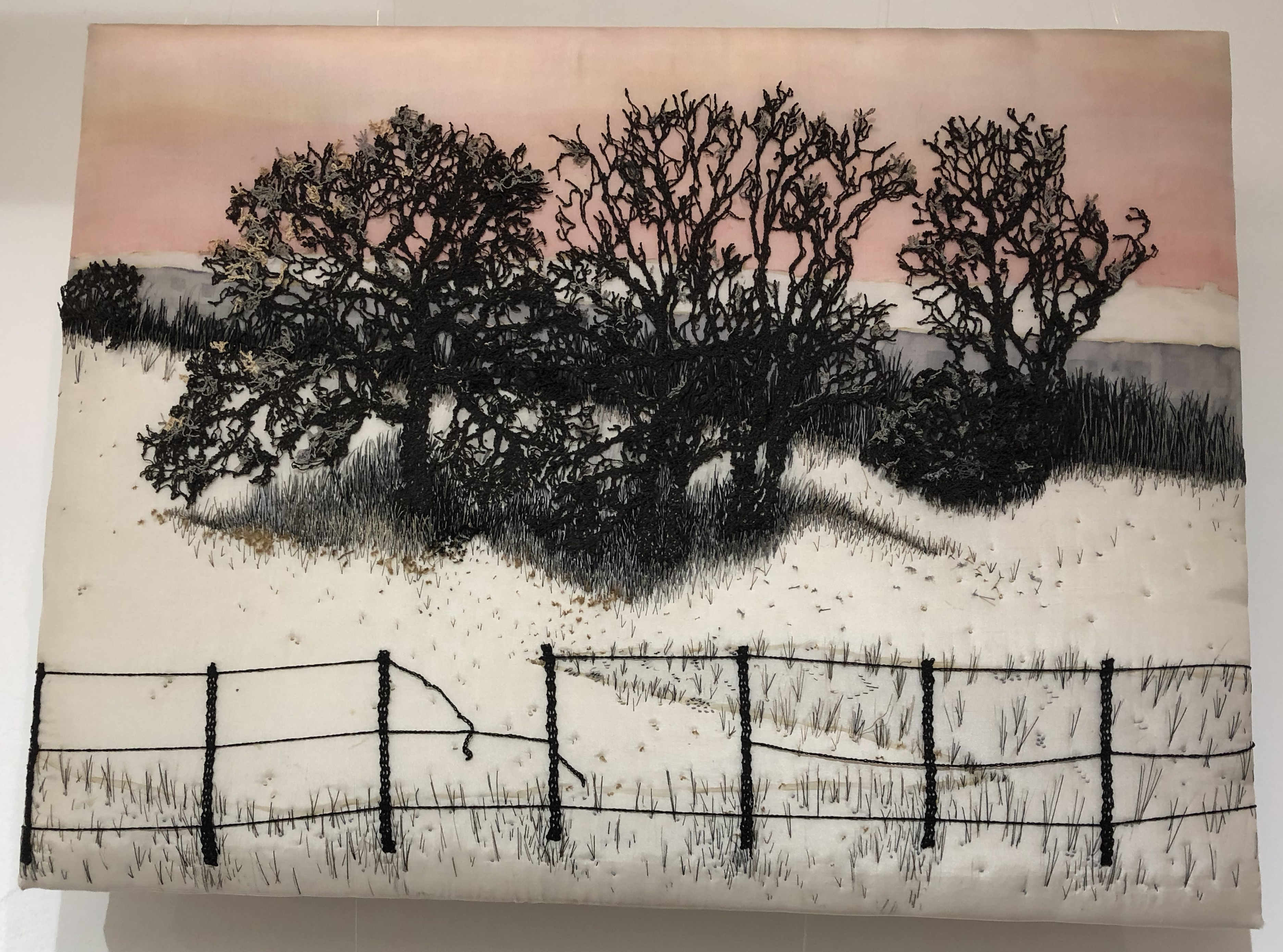
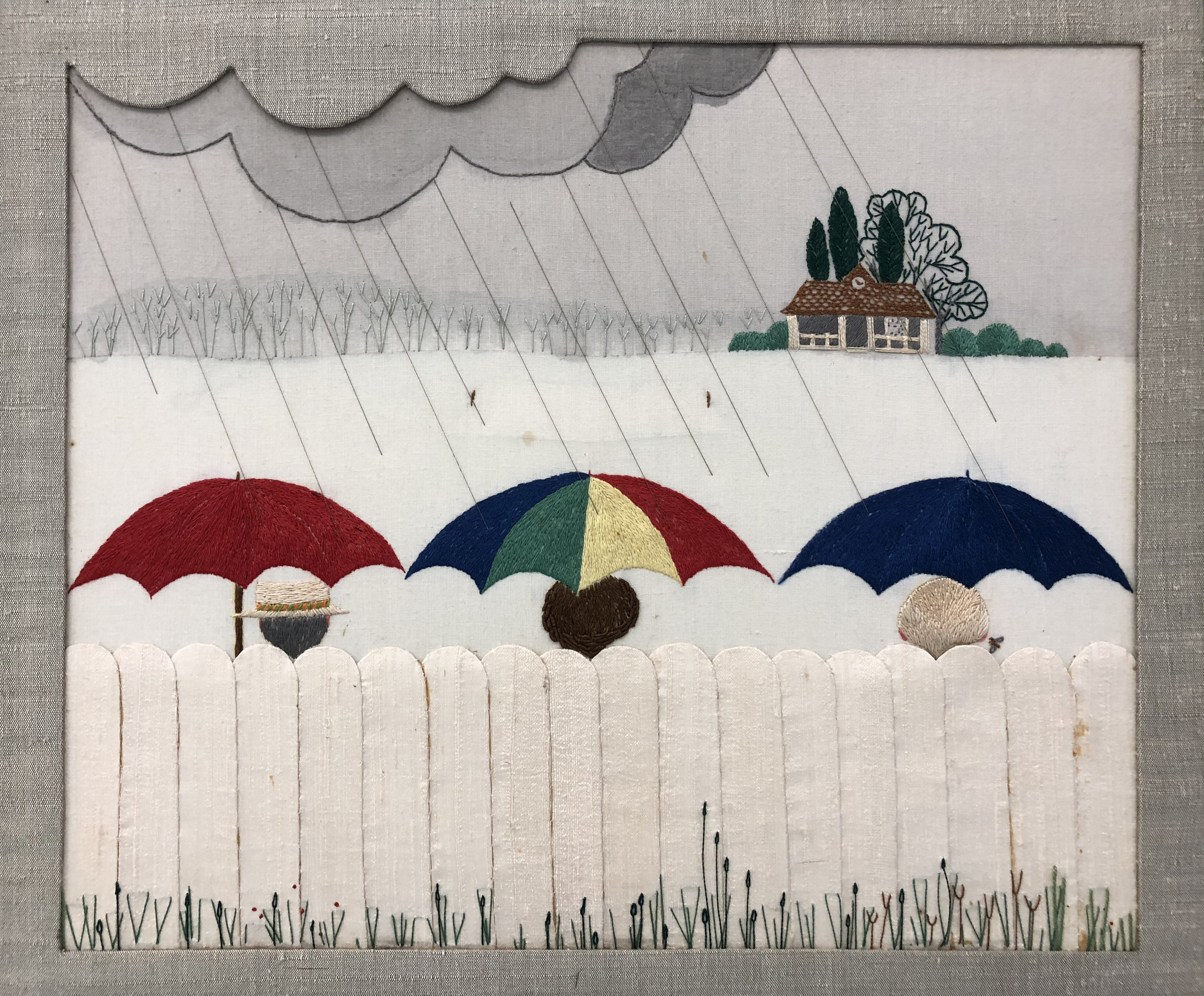
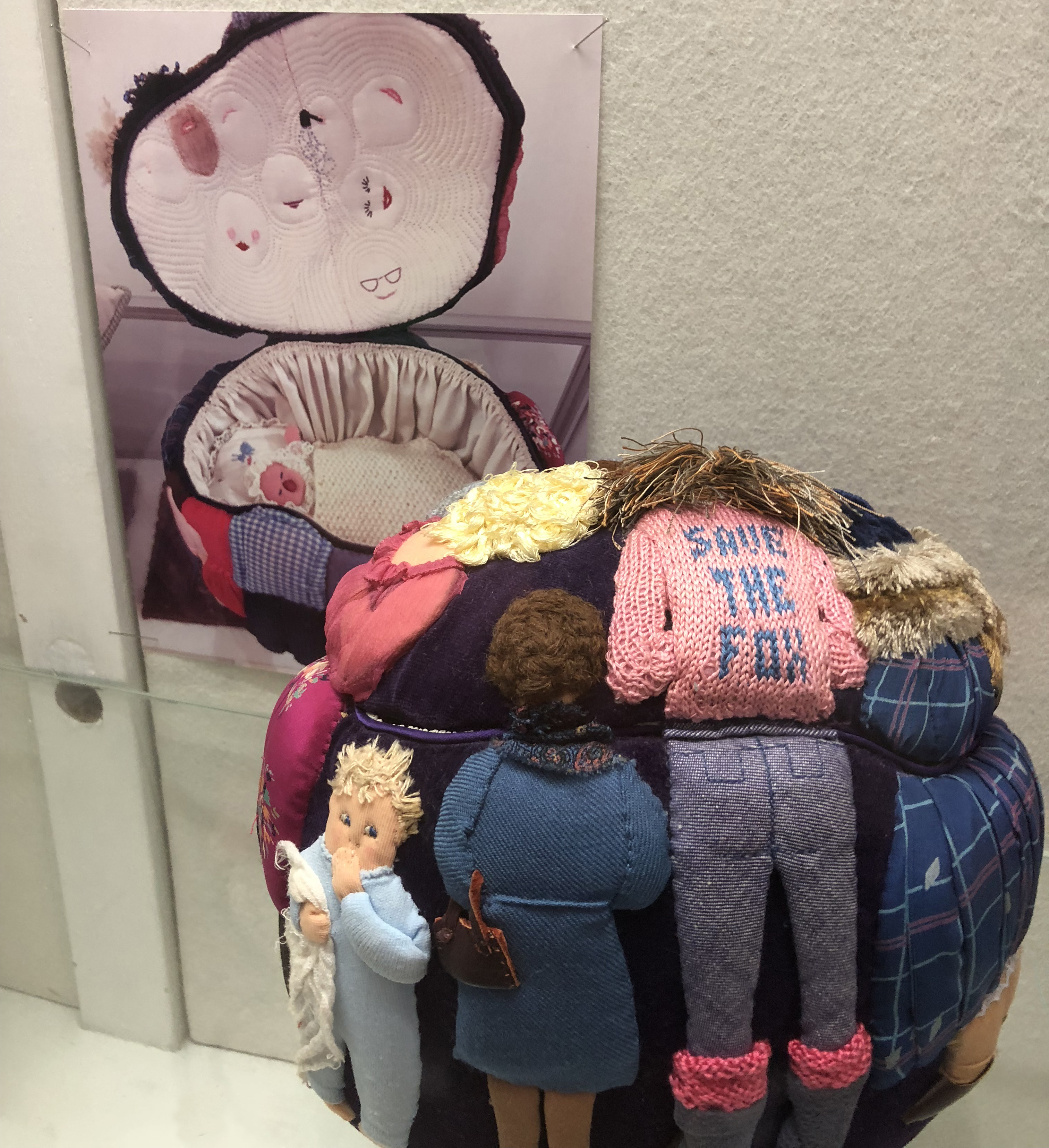
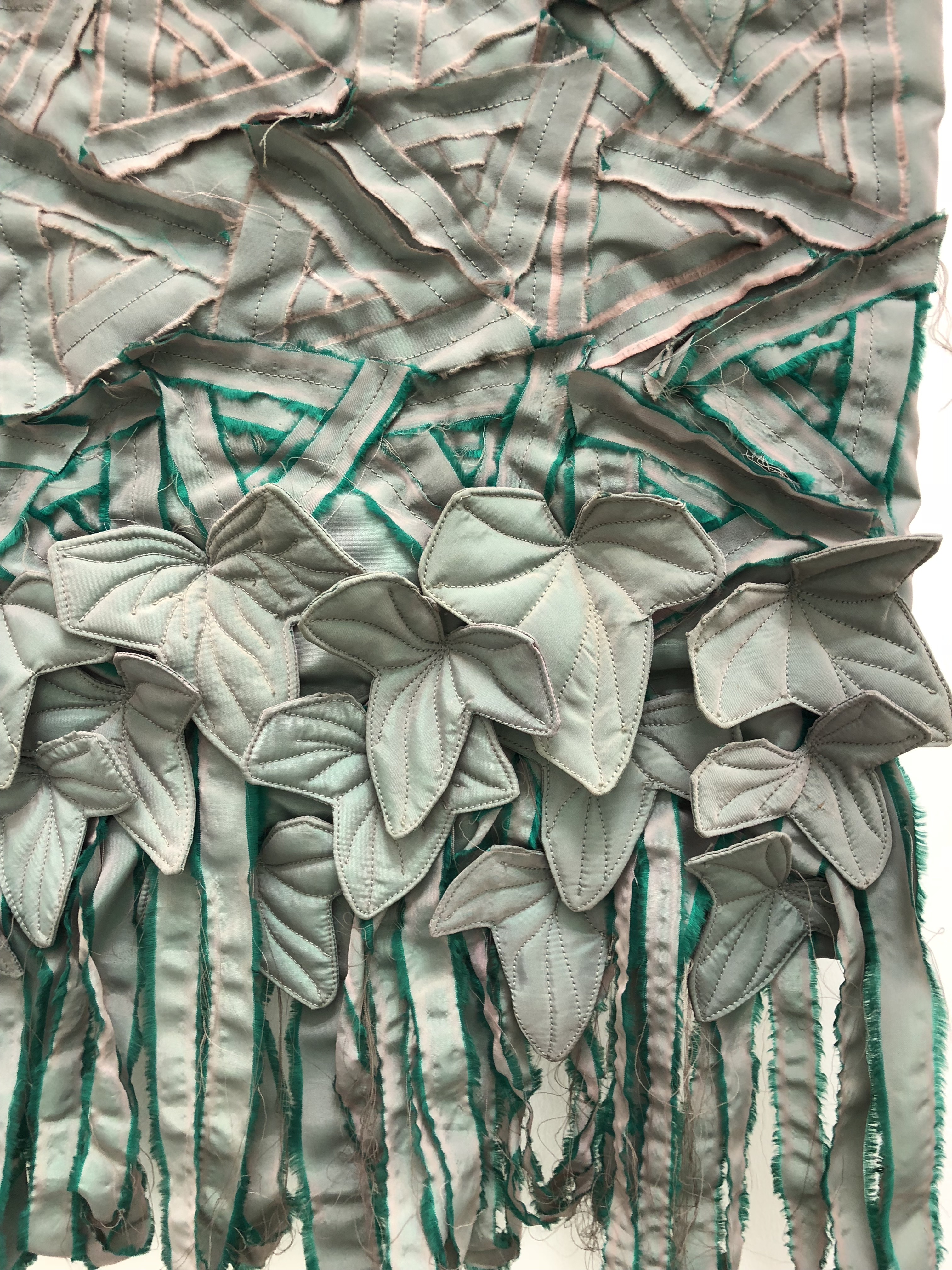
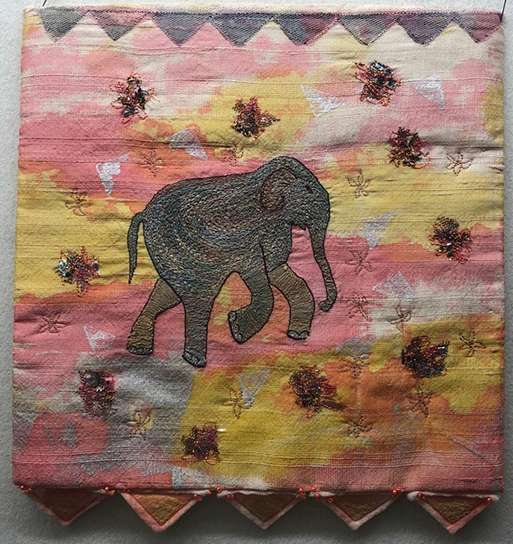
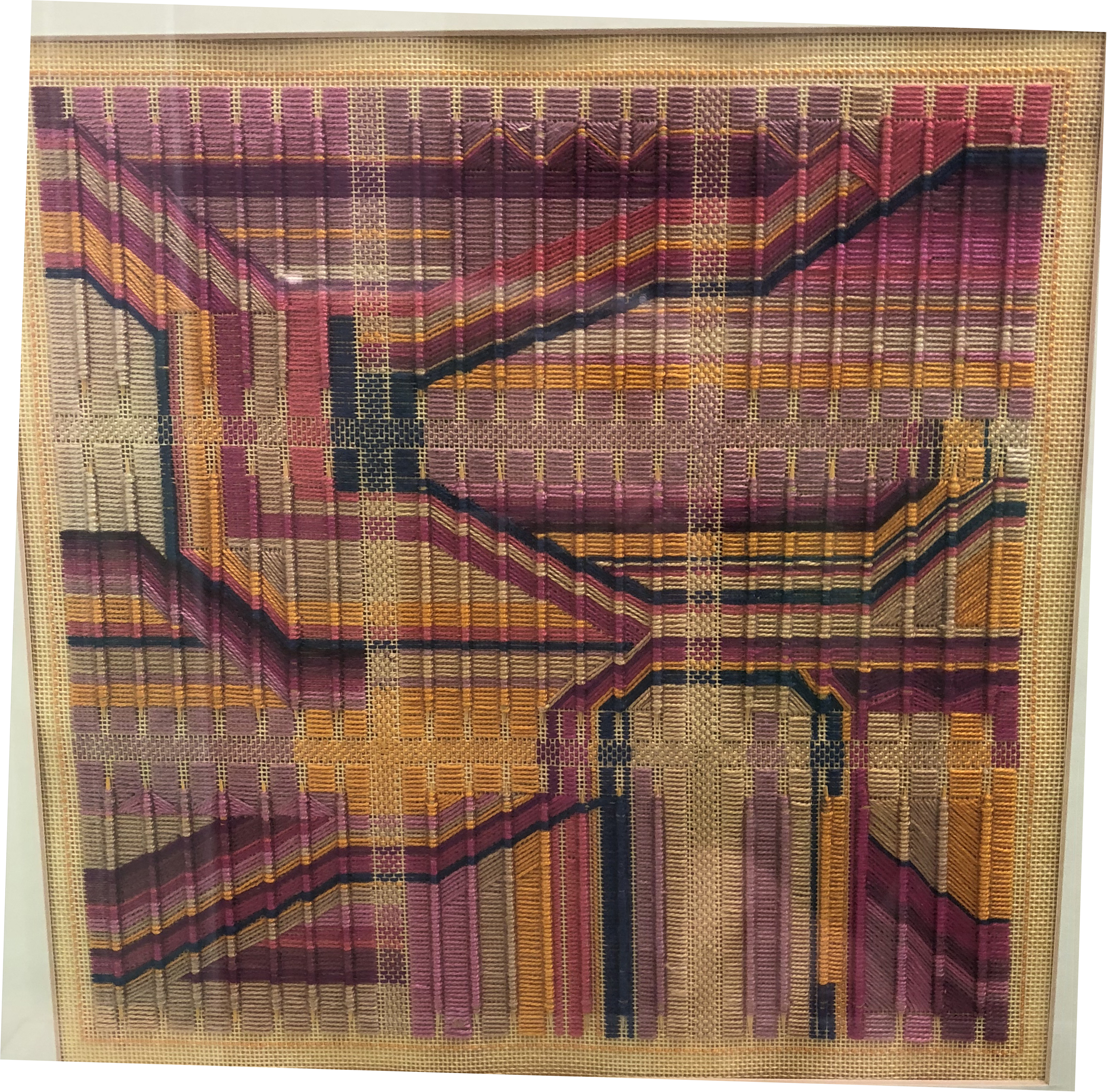
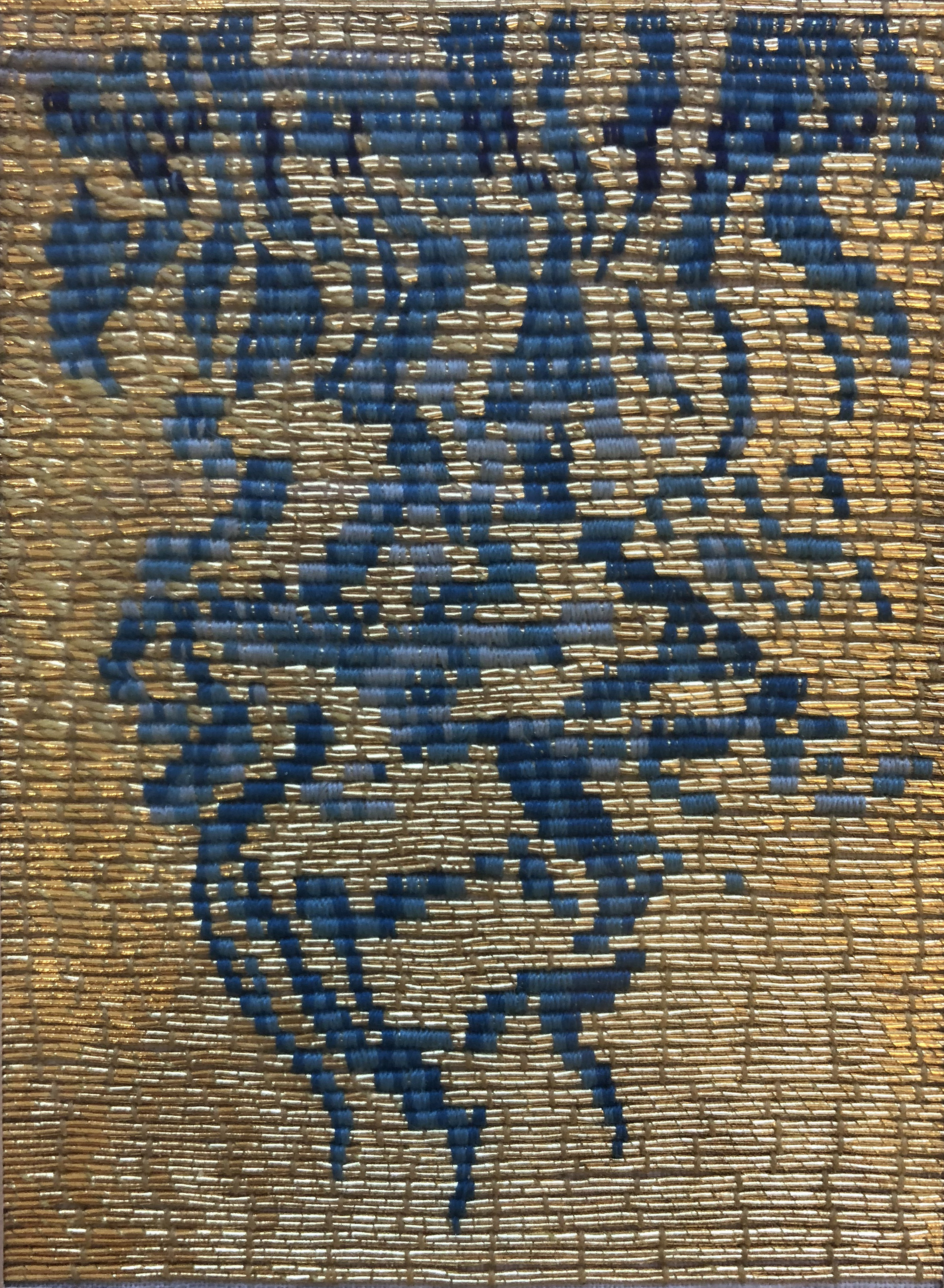
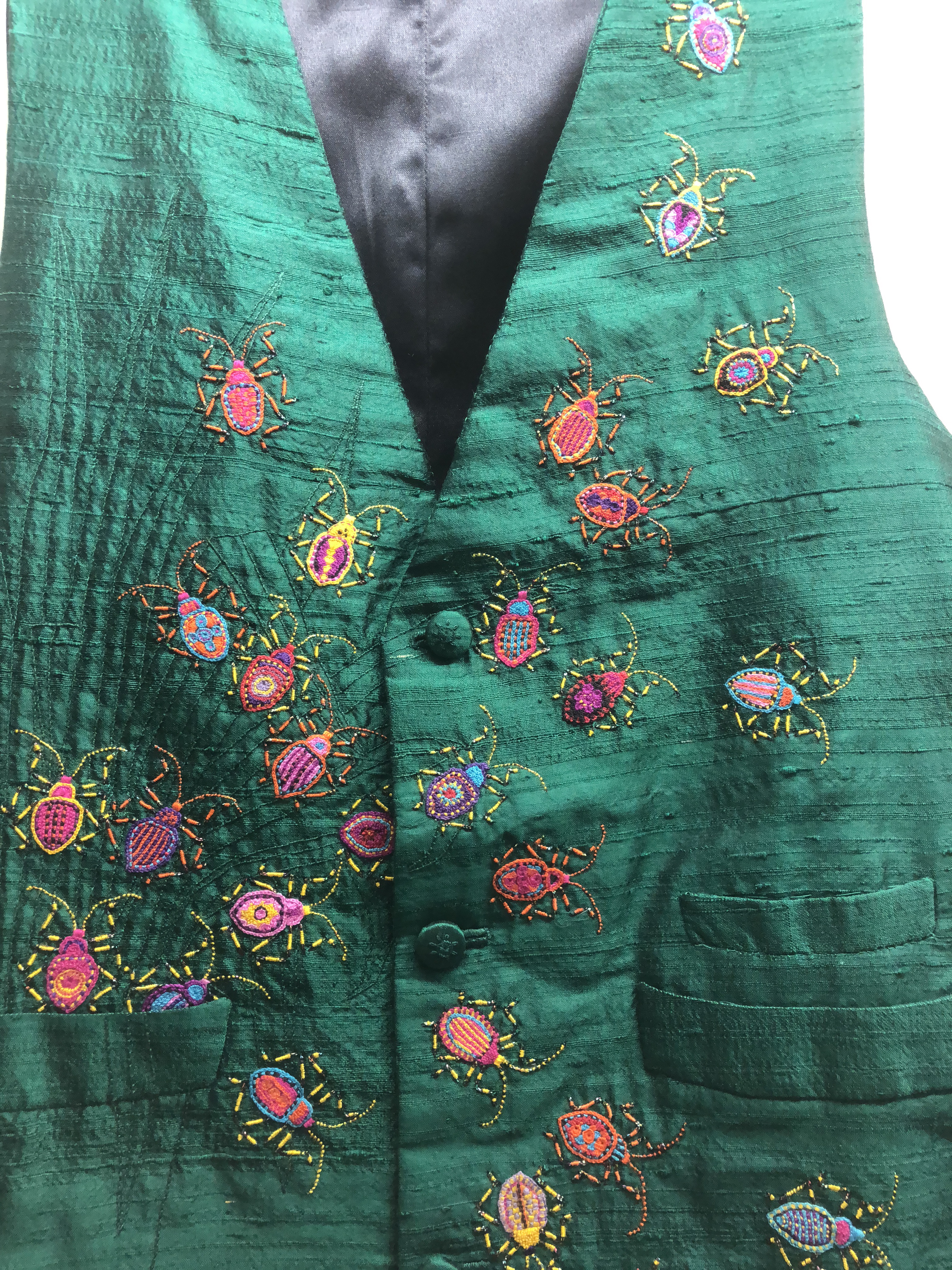
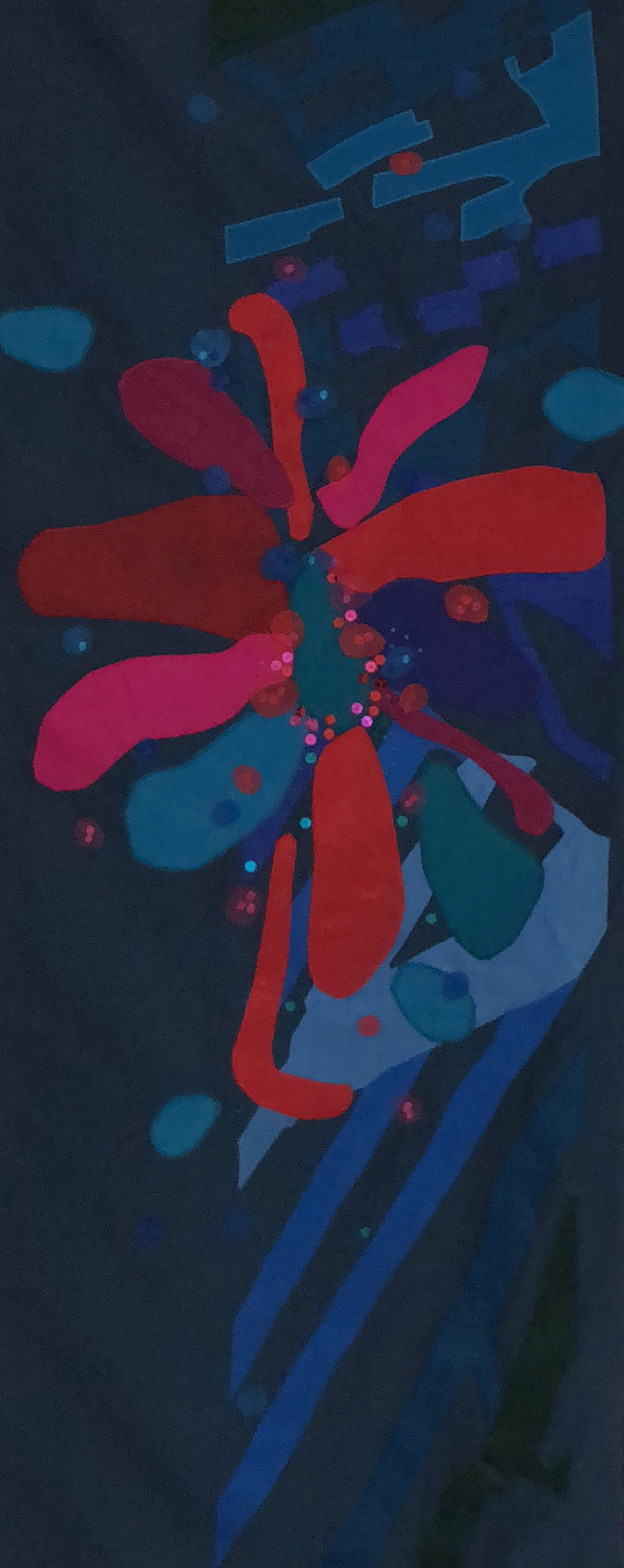
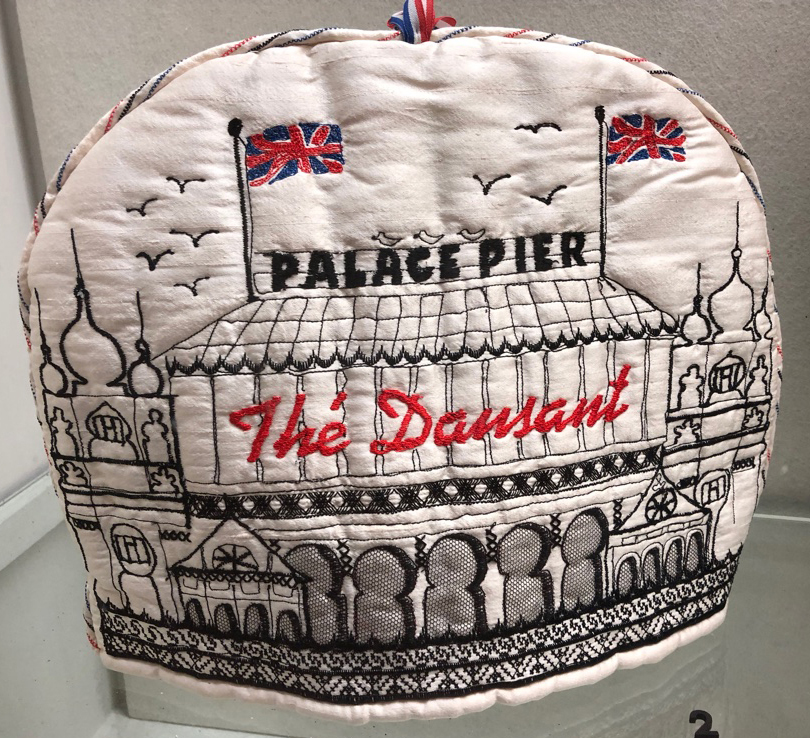
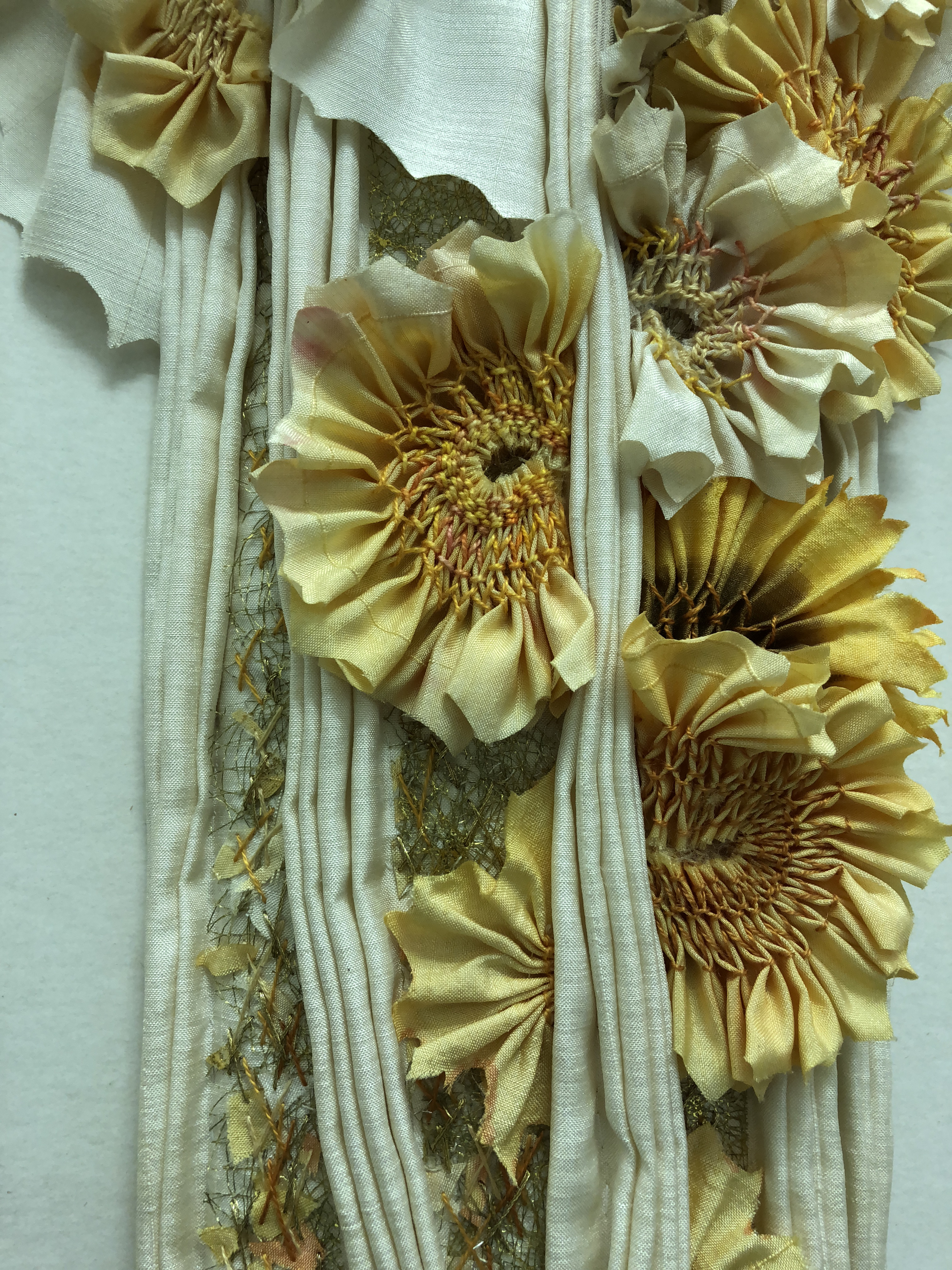
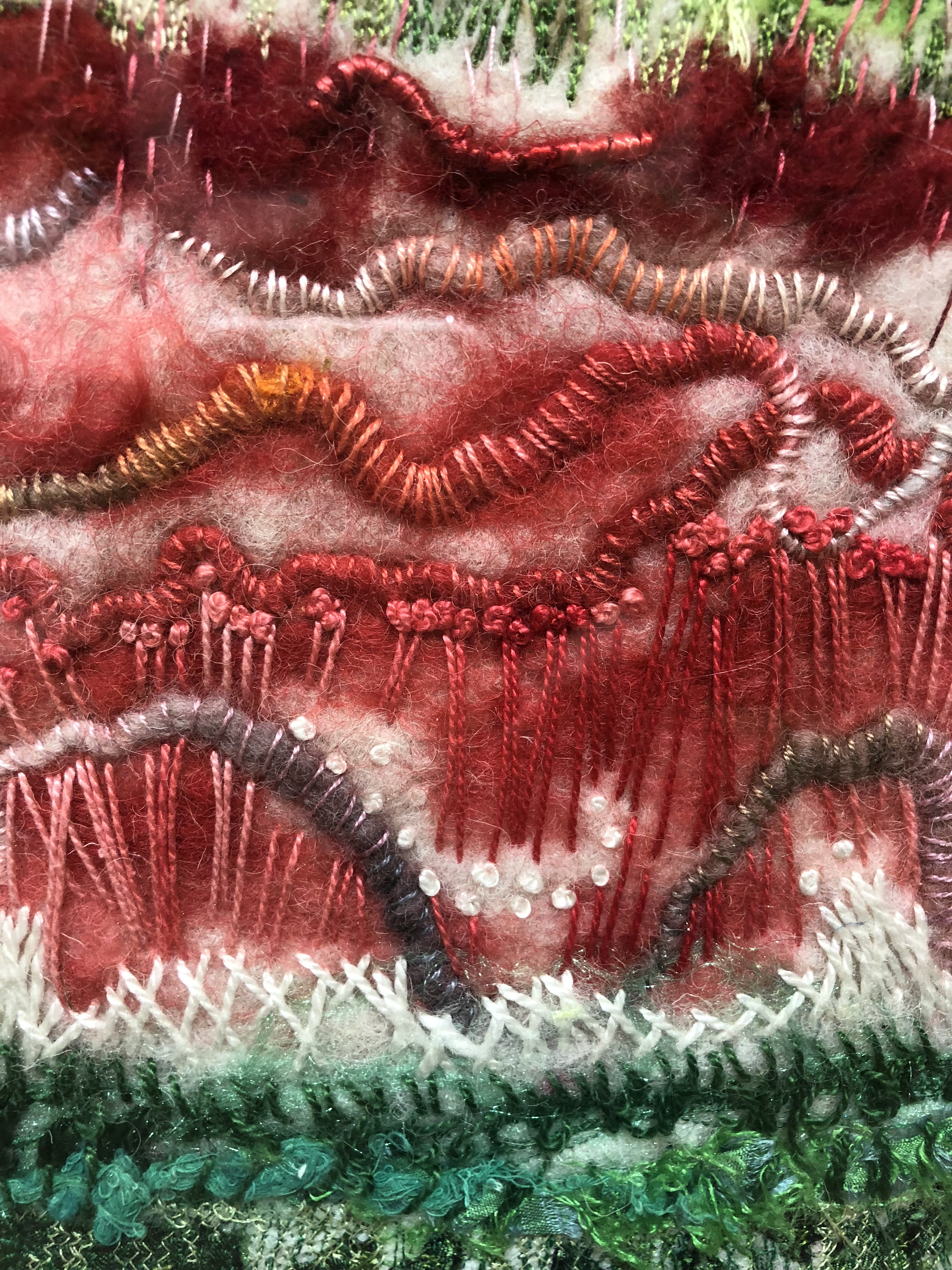
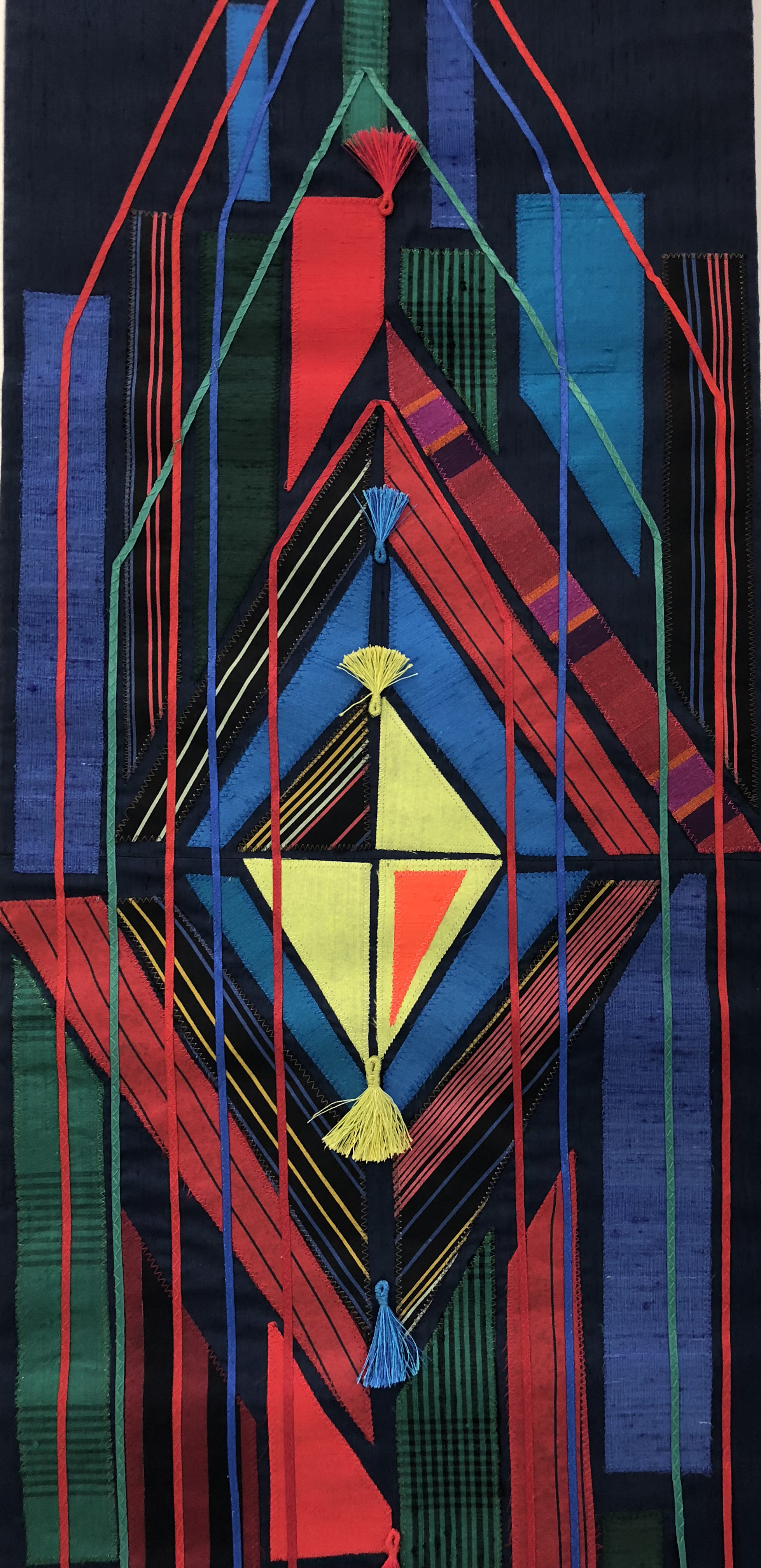
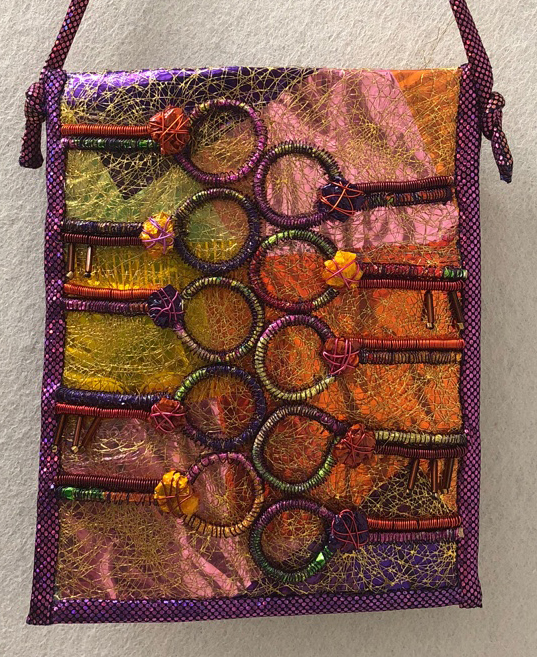

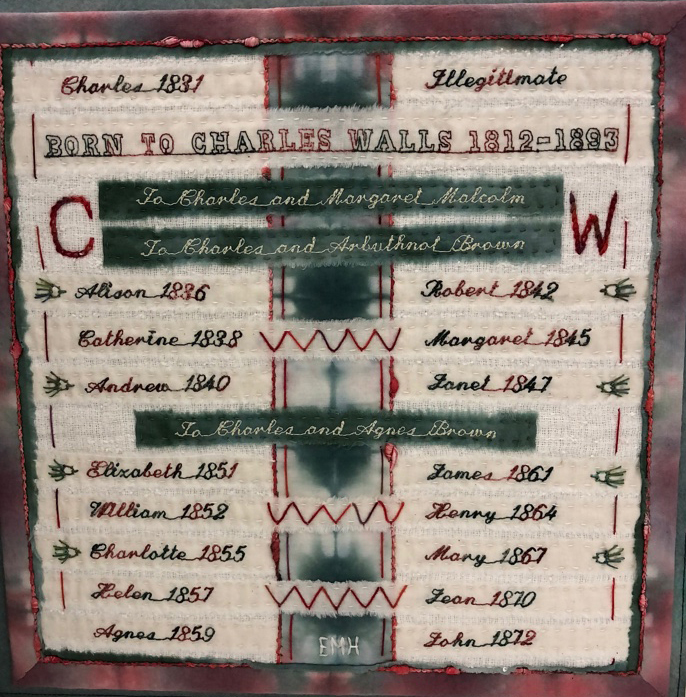
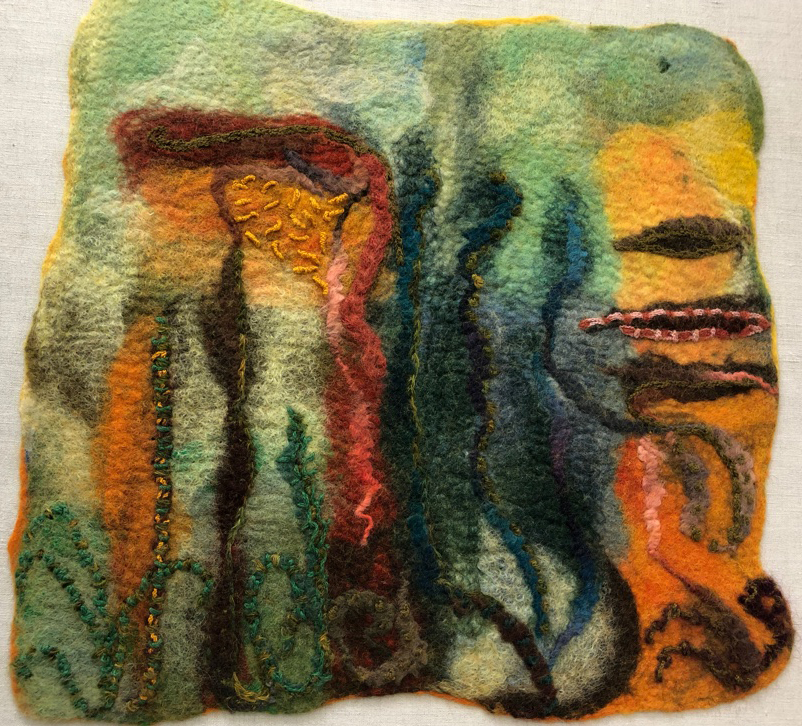
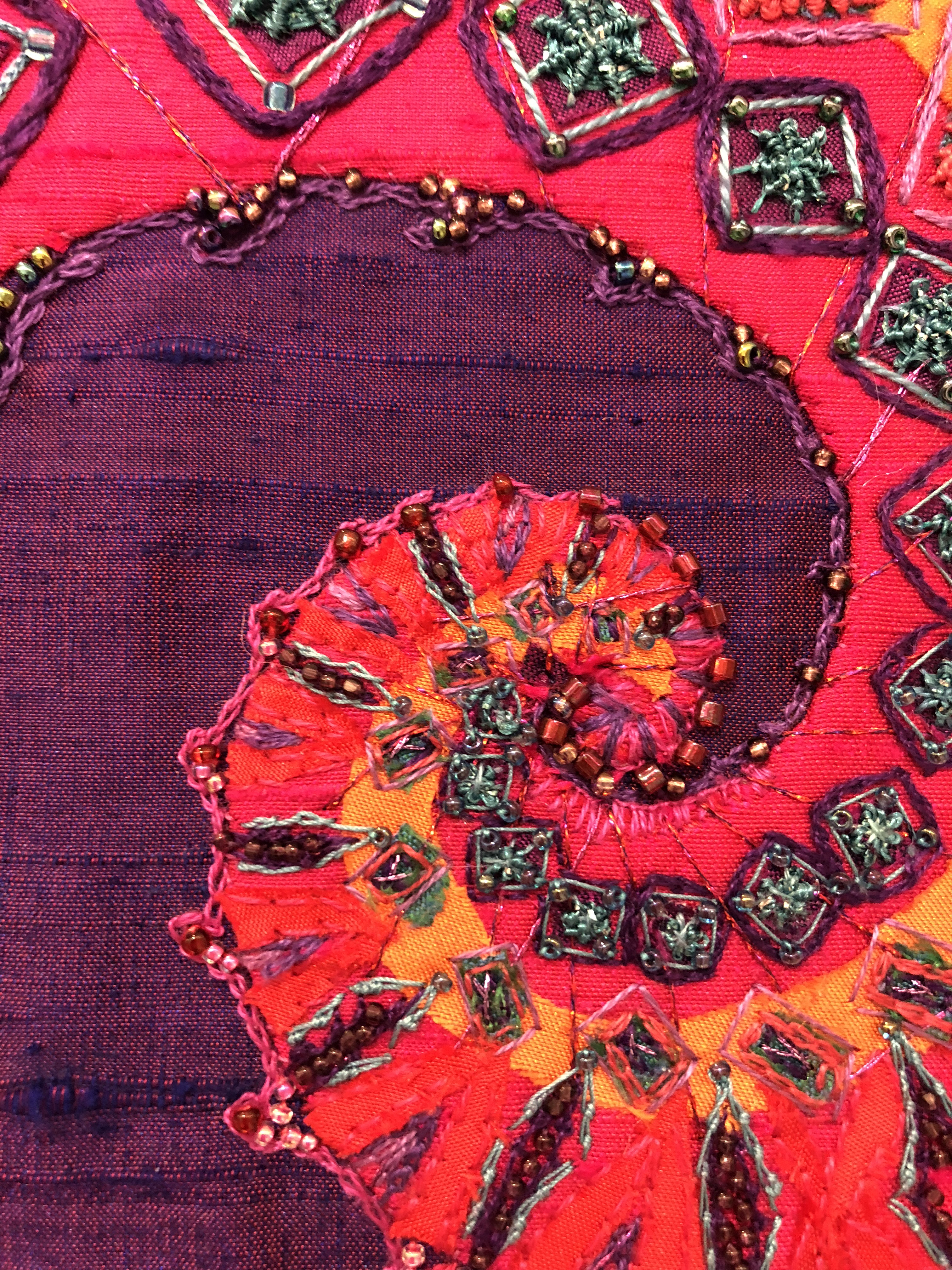
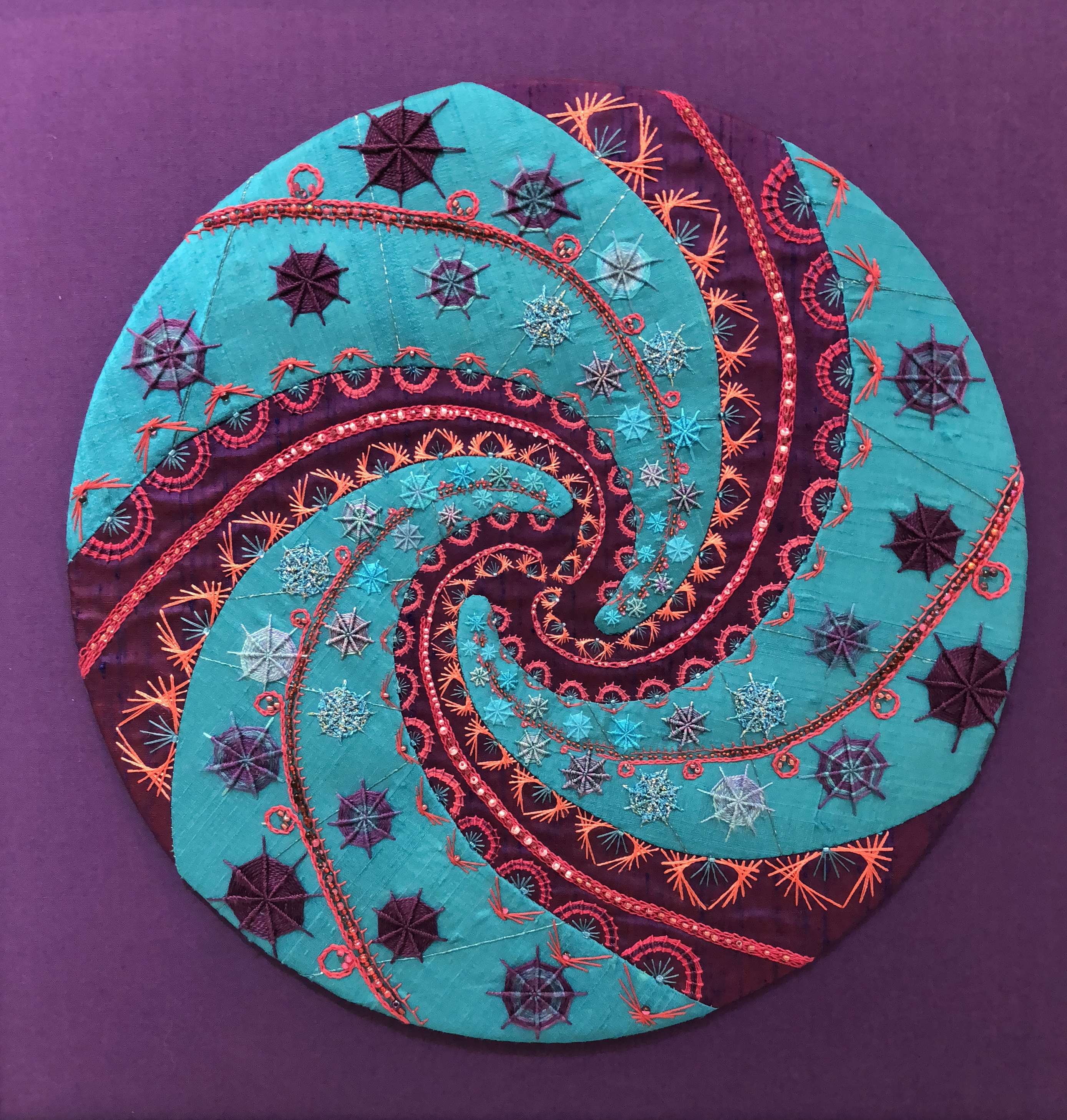
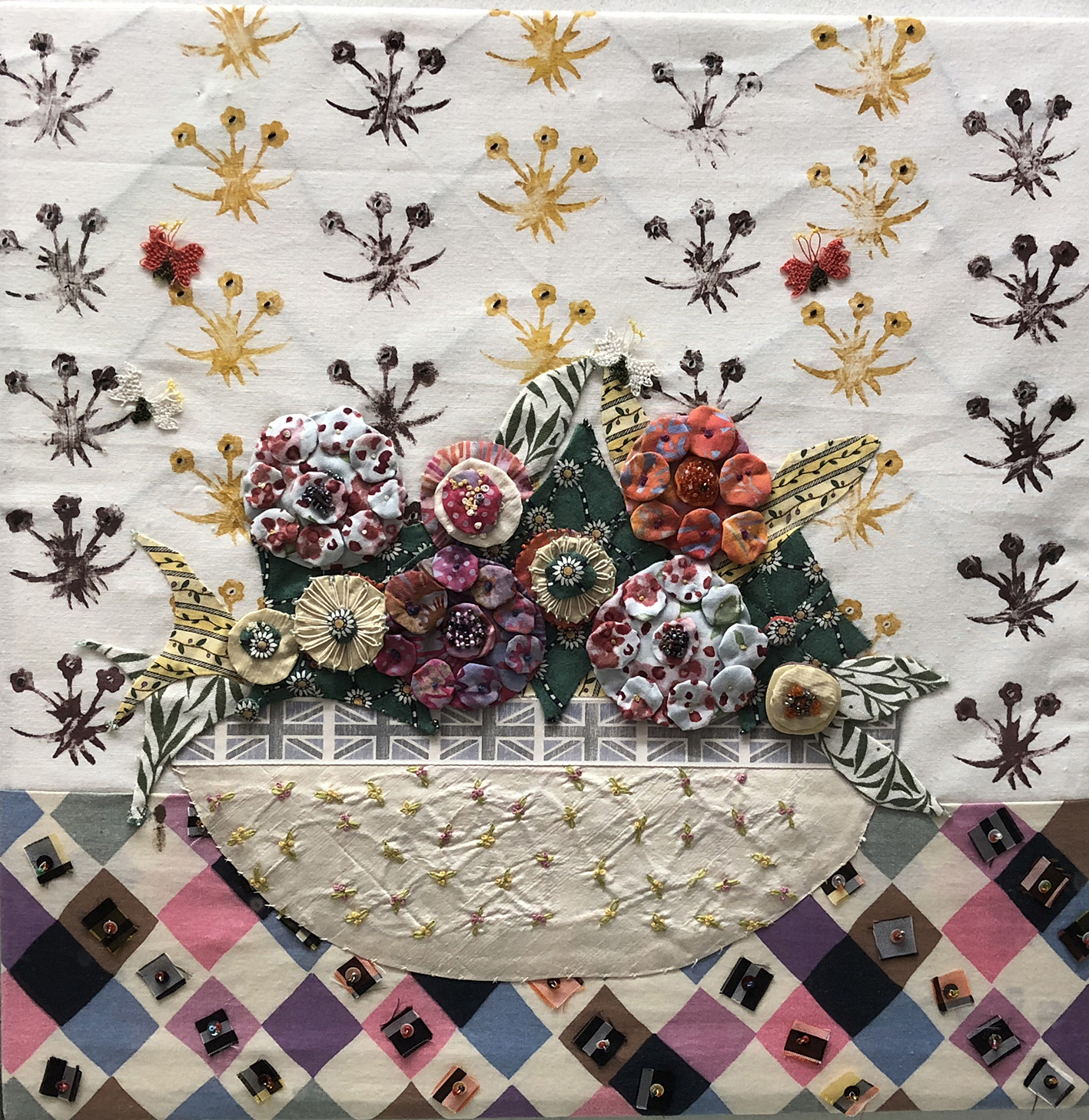
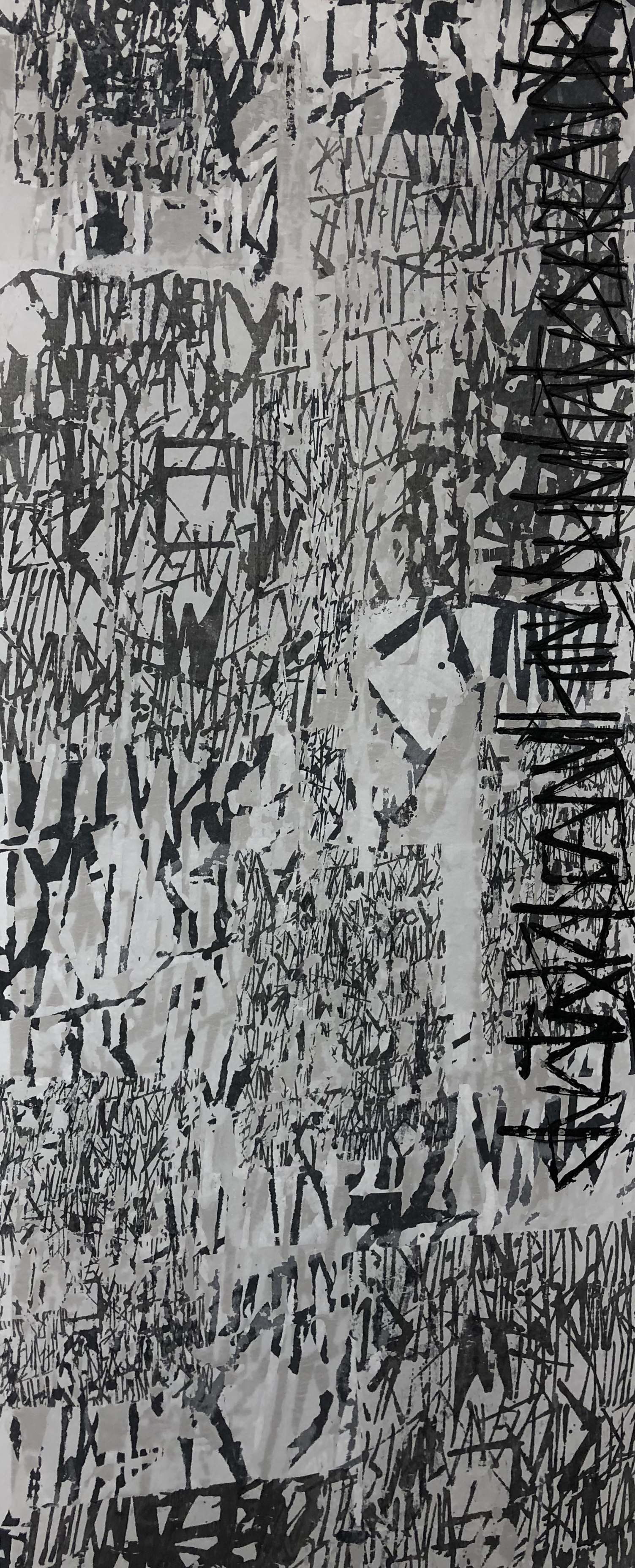
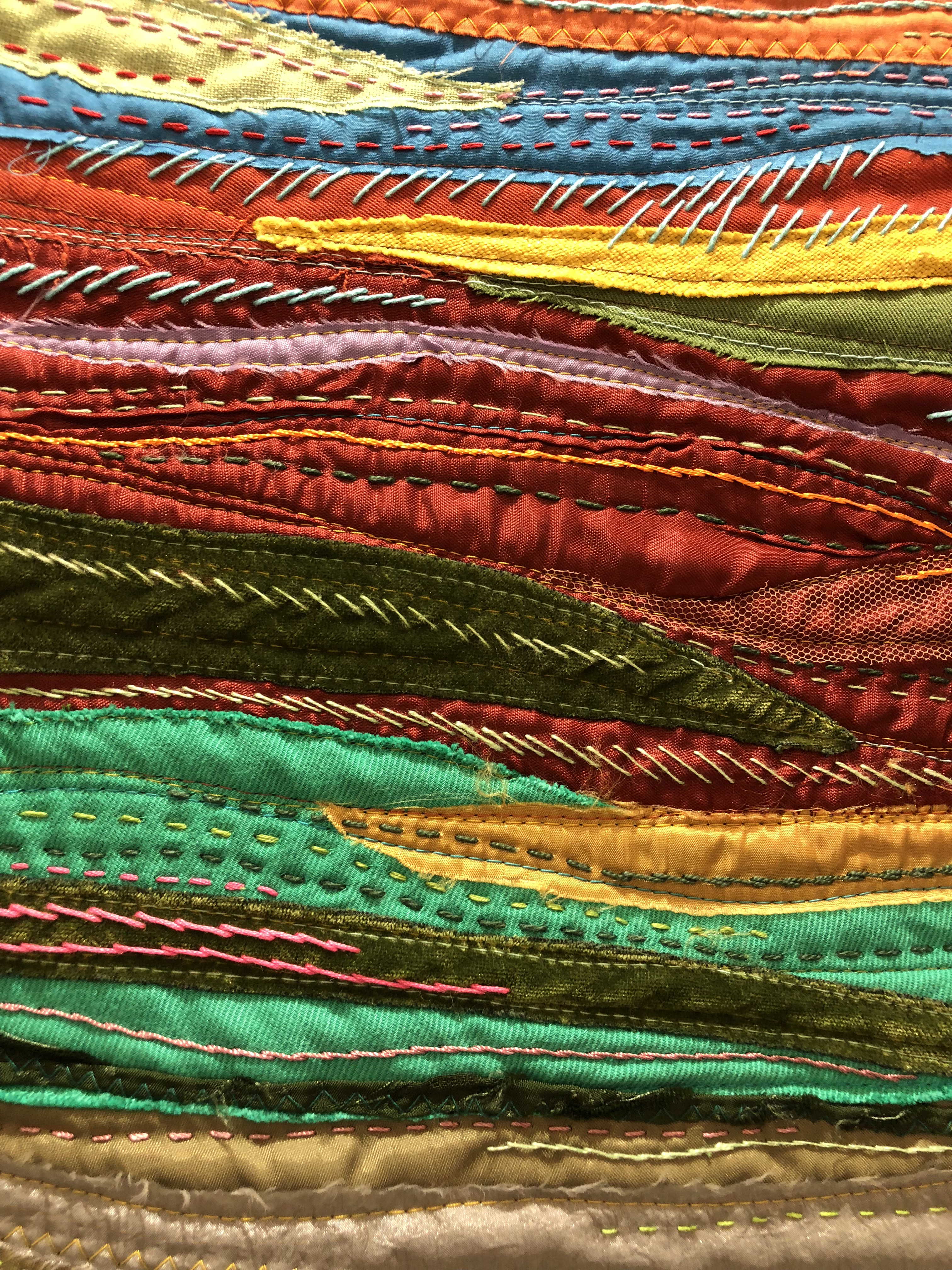

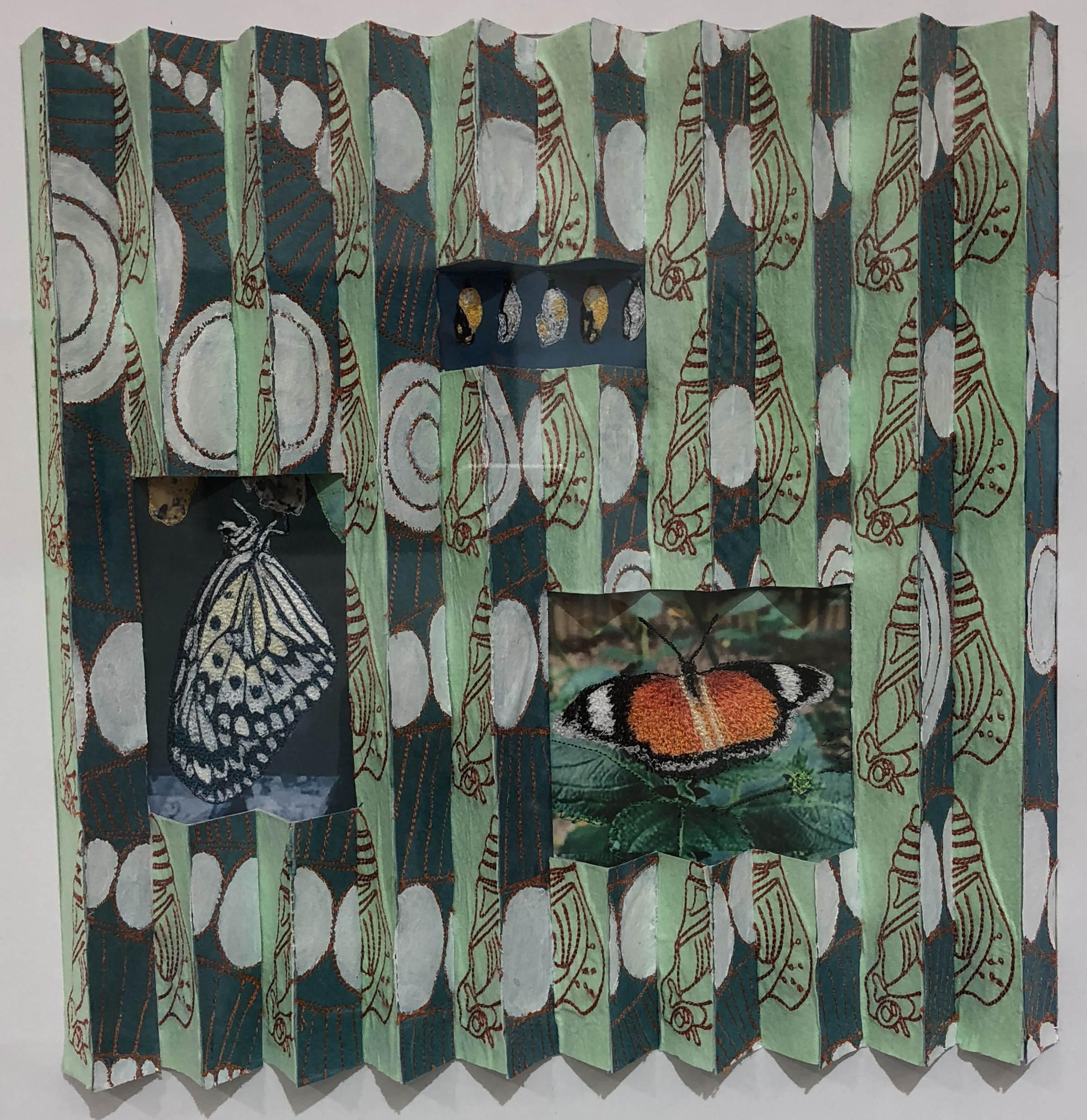
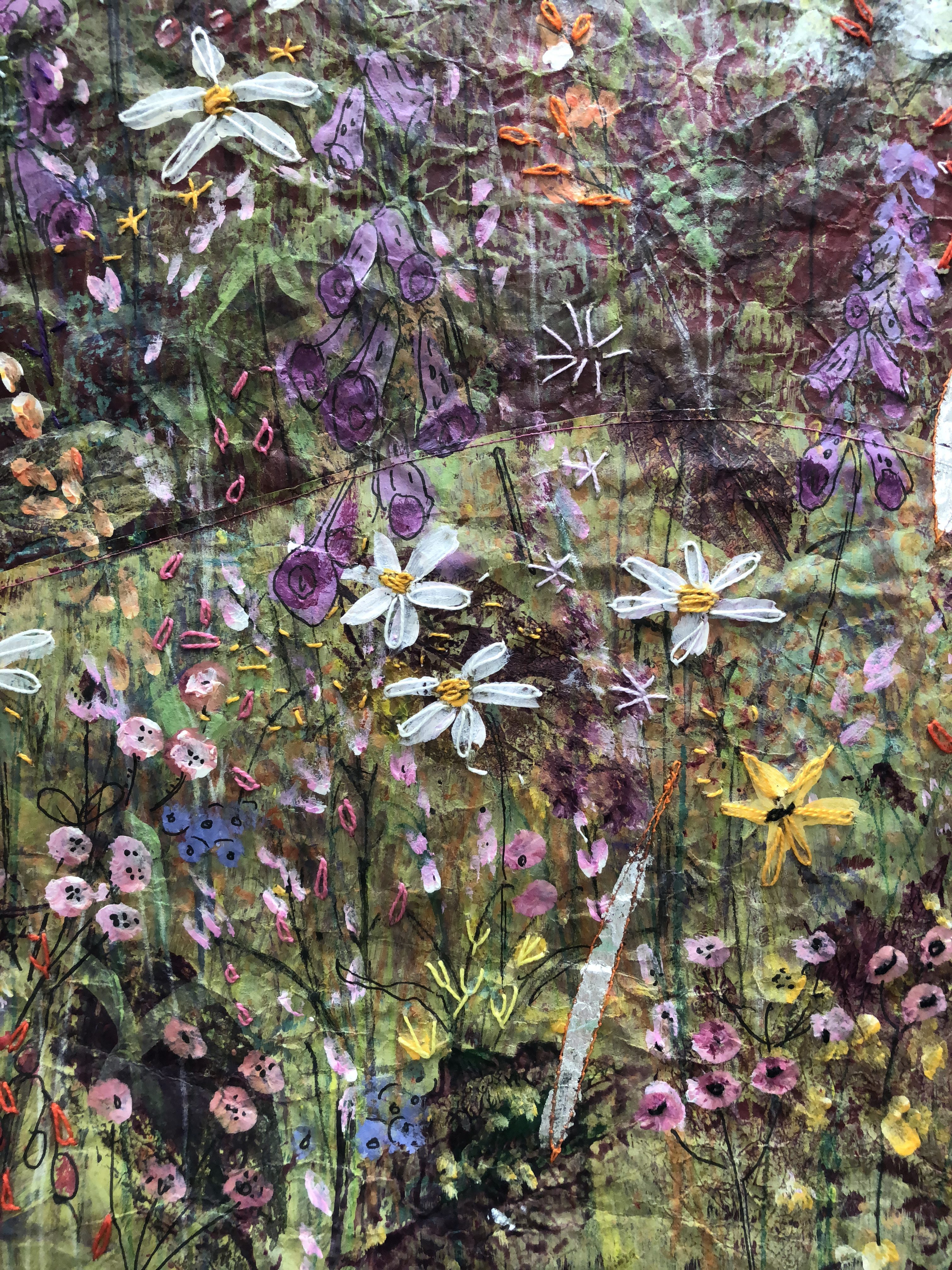
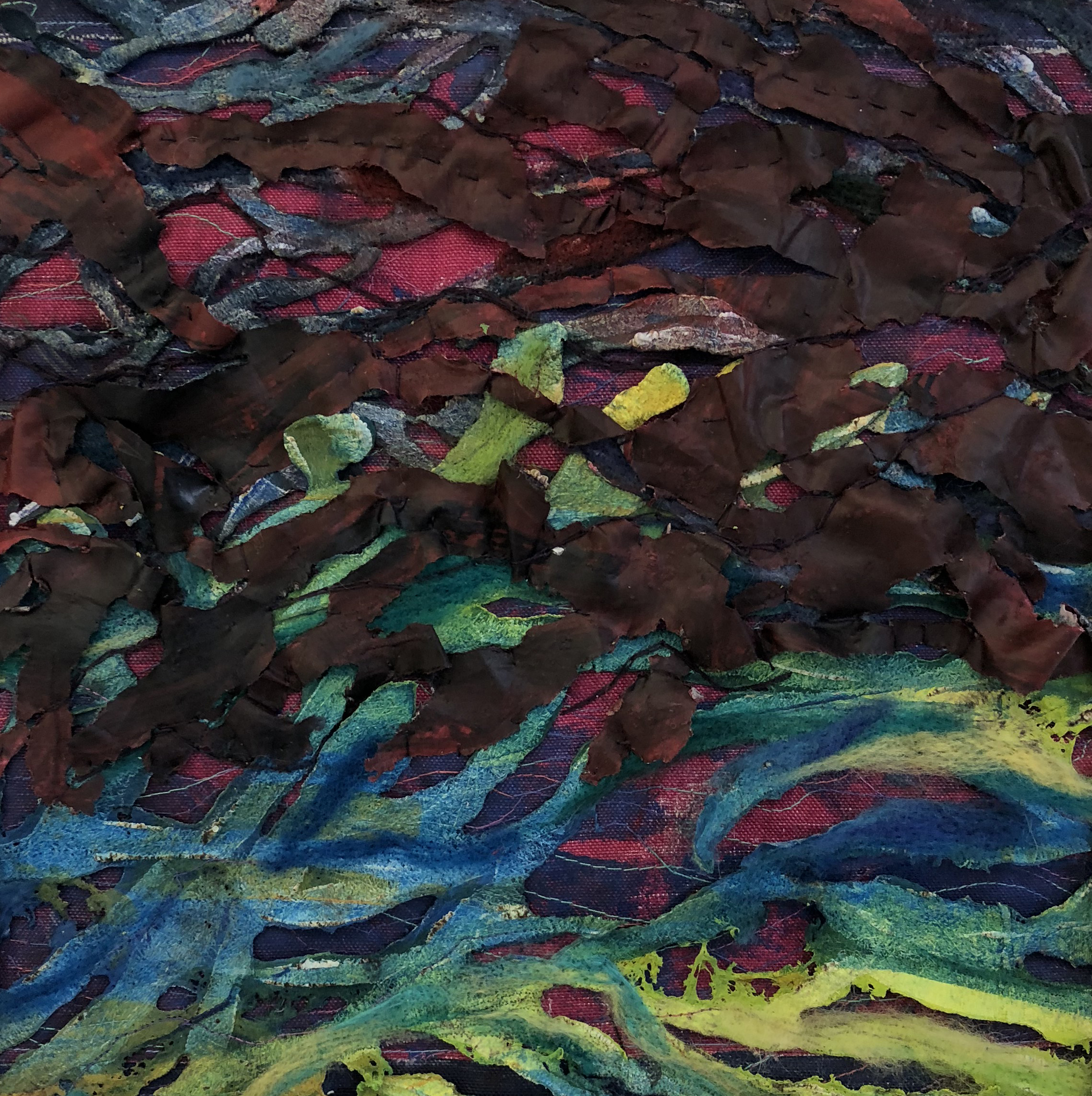
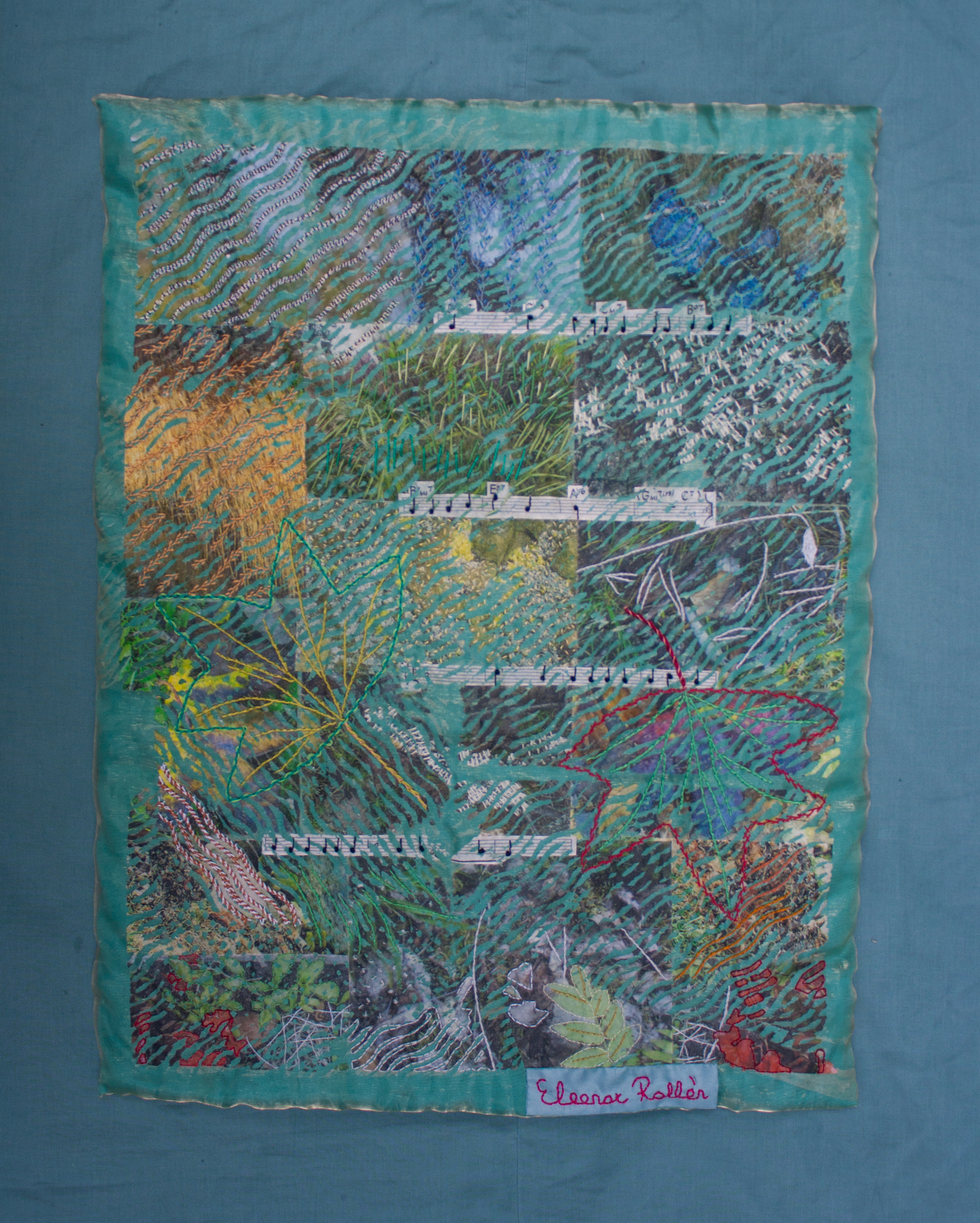
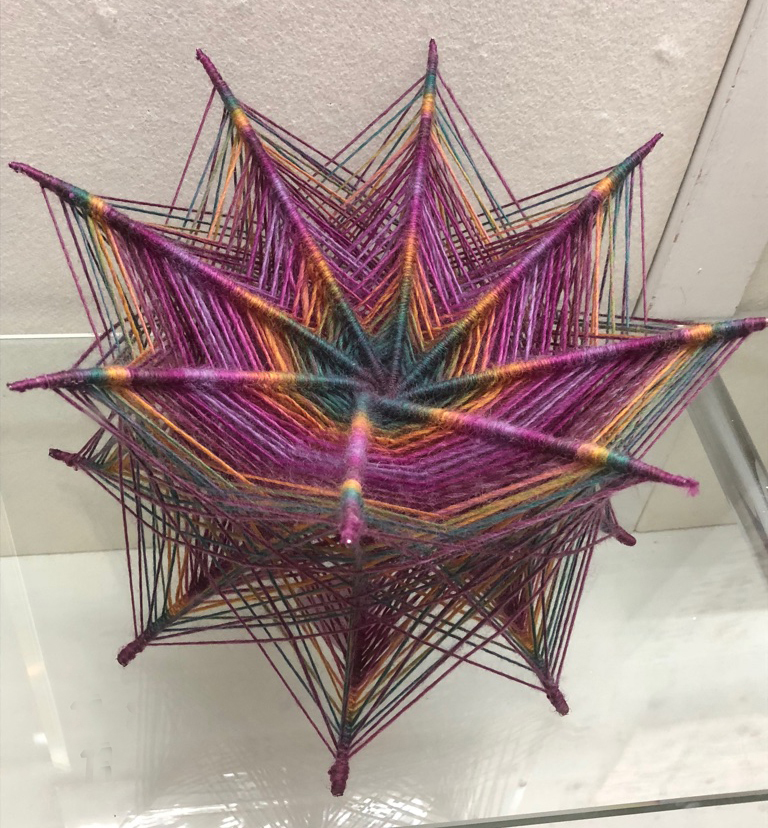

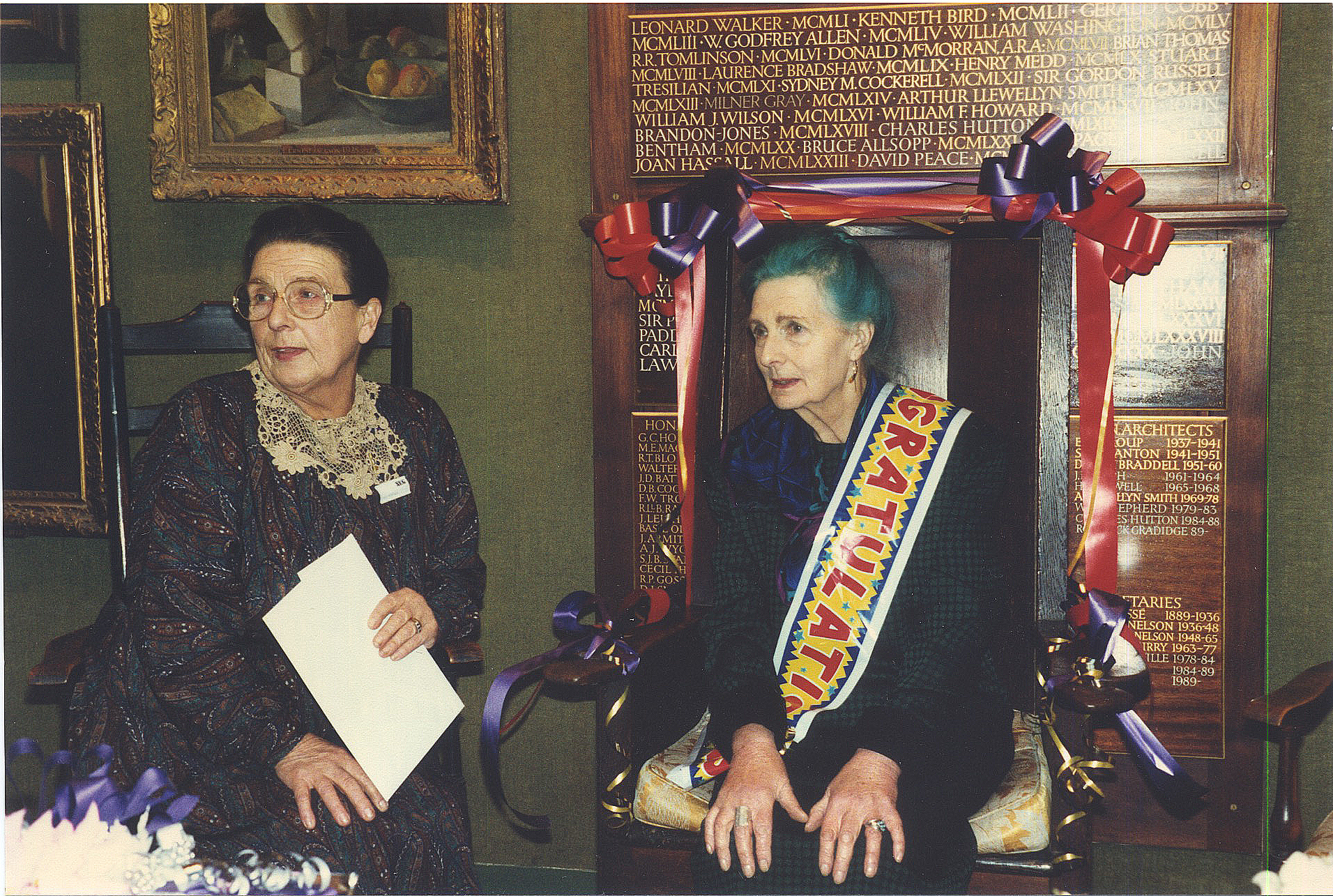
Constance Howard (seen here with our then chairman, Kay MacDonald) was our President in 1990 when we celebrated her 80th birthday with a party at the Artworkers’ Guild. Every member gave her a small embroidery to mark the occasion and we were able to display a few of them (there would have been over 100). This collection now belongs to the Textile Study Centre at Goldsmiths.
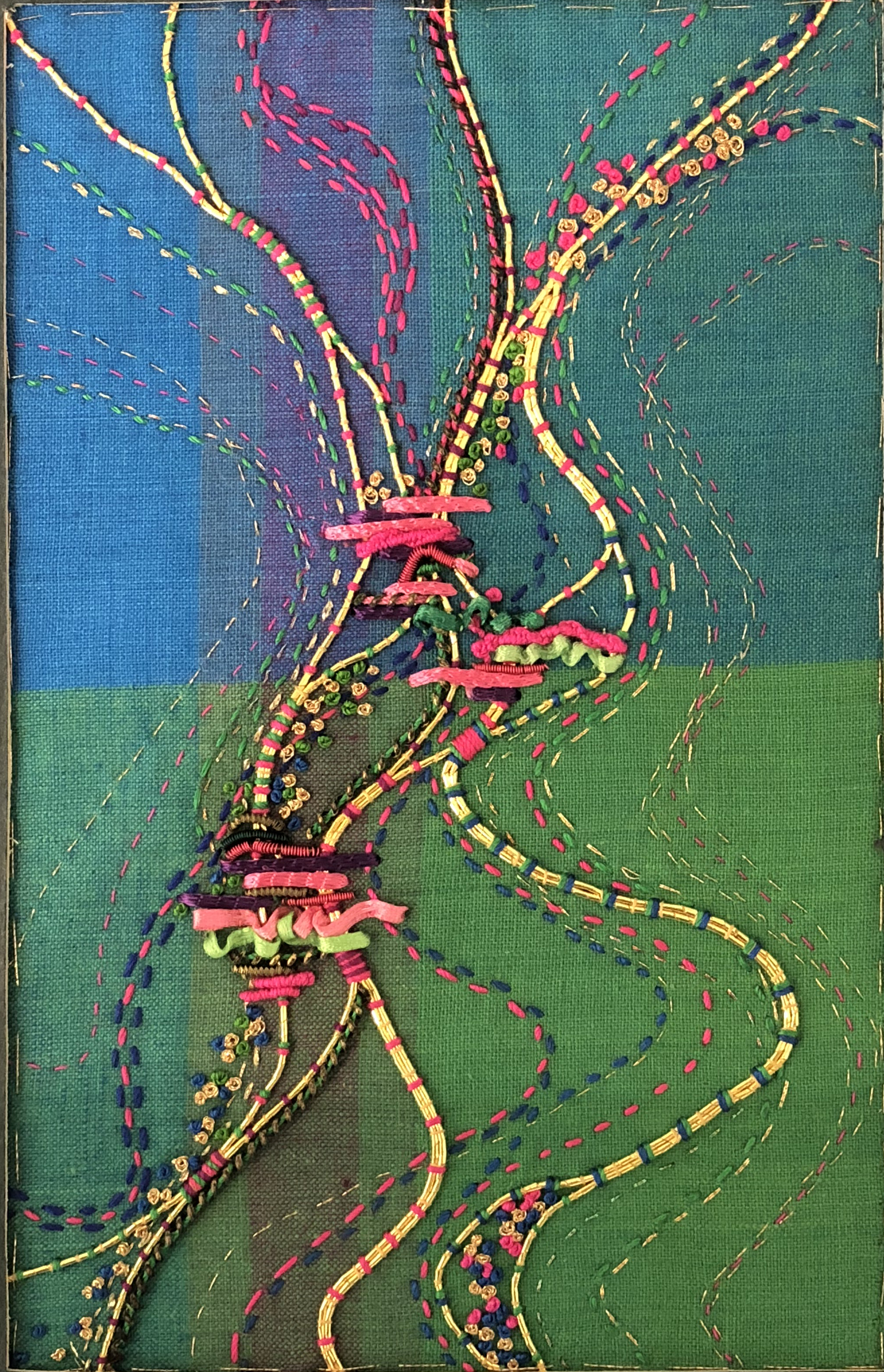
Dorle Dawson
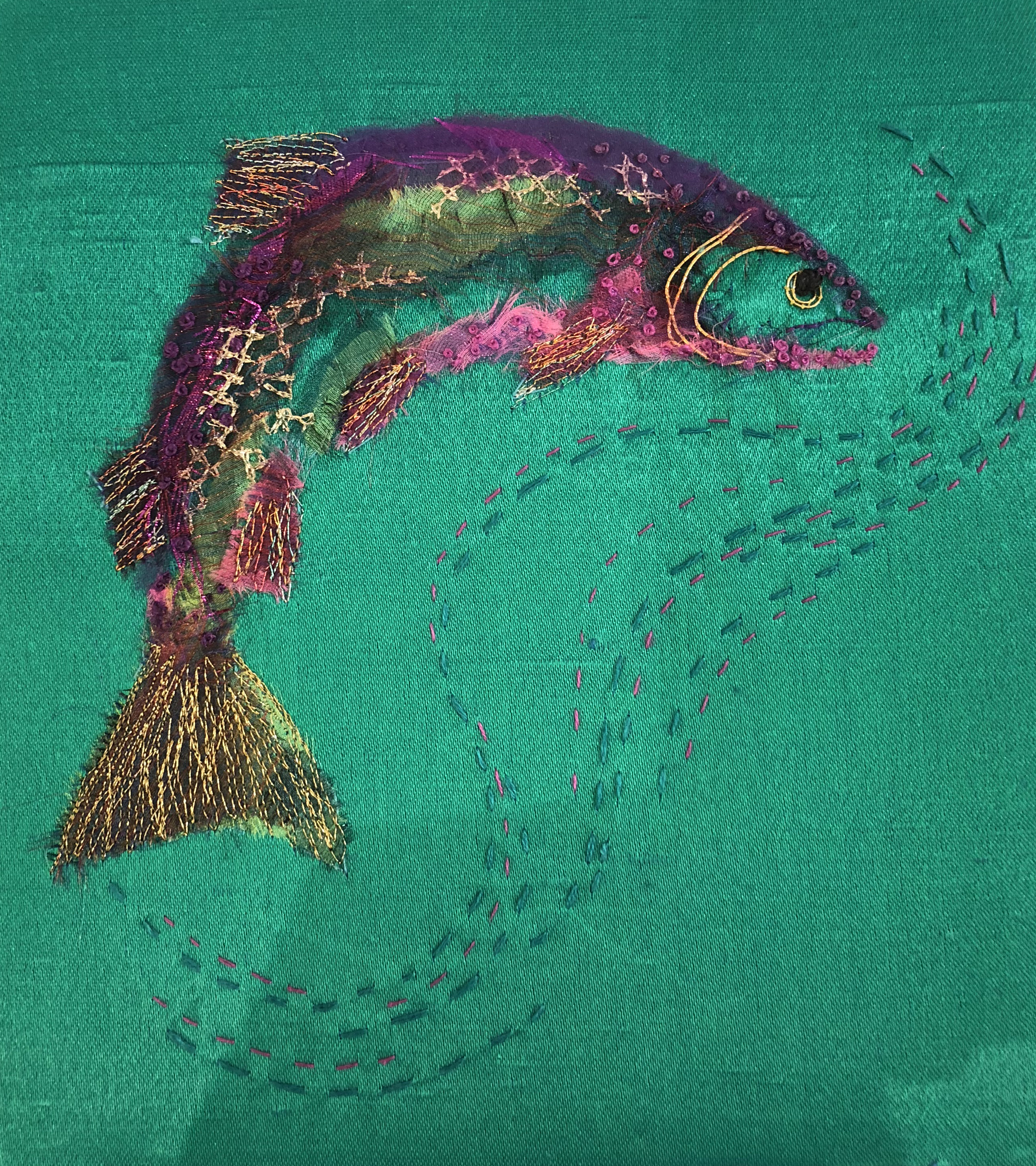
Edith Sutcliffe
Vicky Lugg
Glenys Grimwood
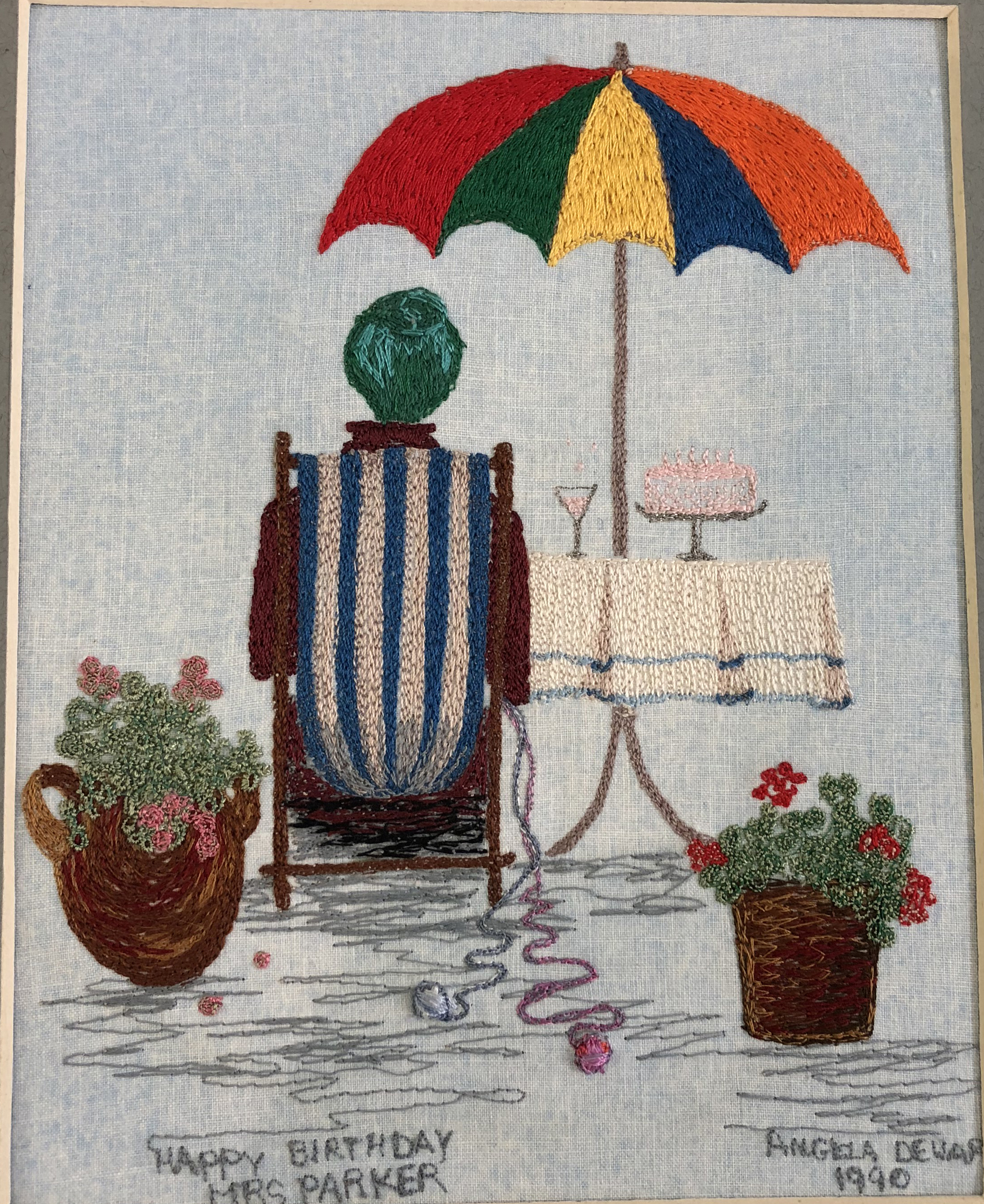 Angela Dewar
Angela Dewar

Ann Rutherford
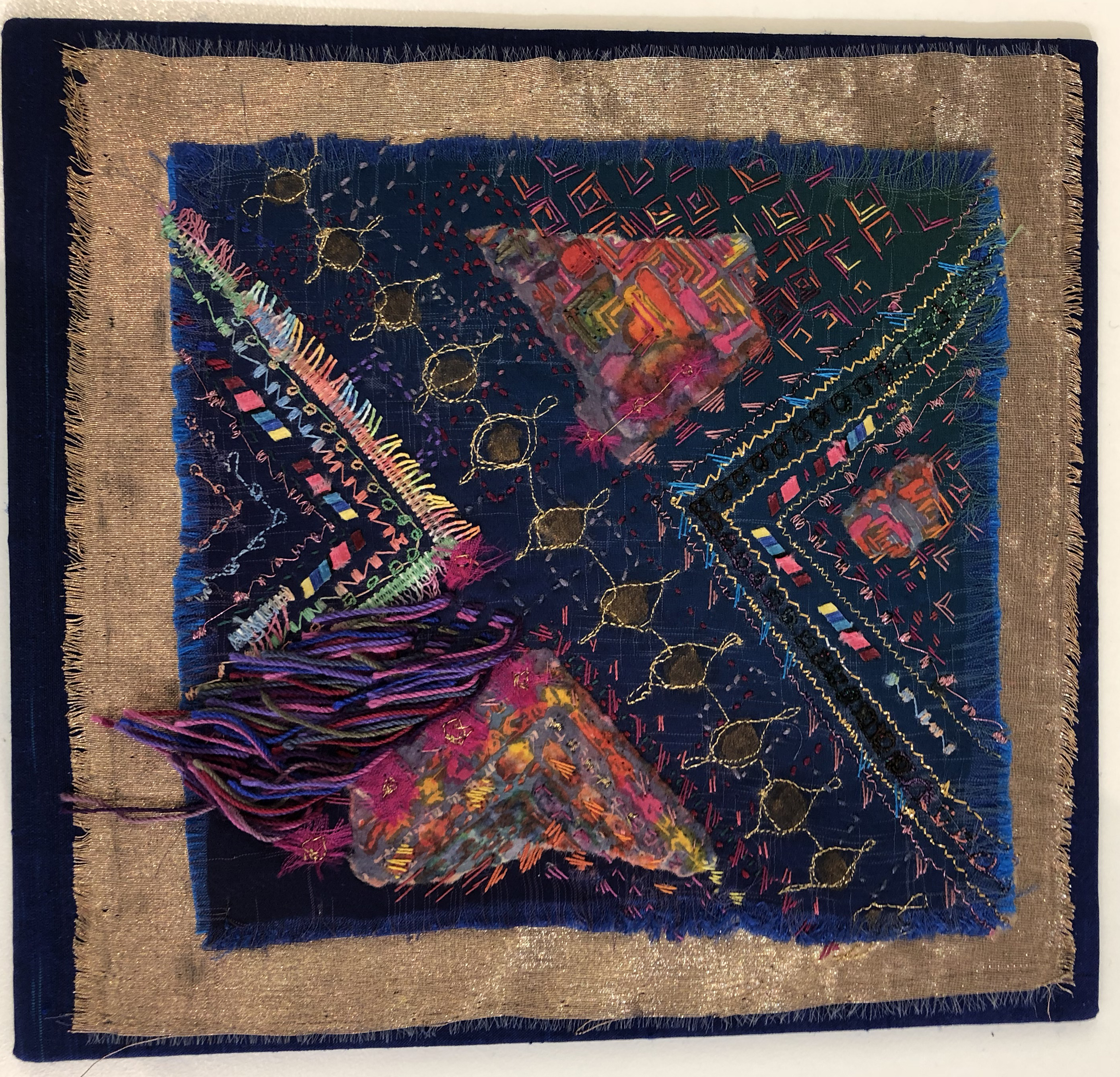
Elizabeth Mott
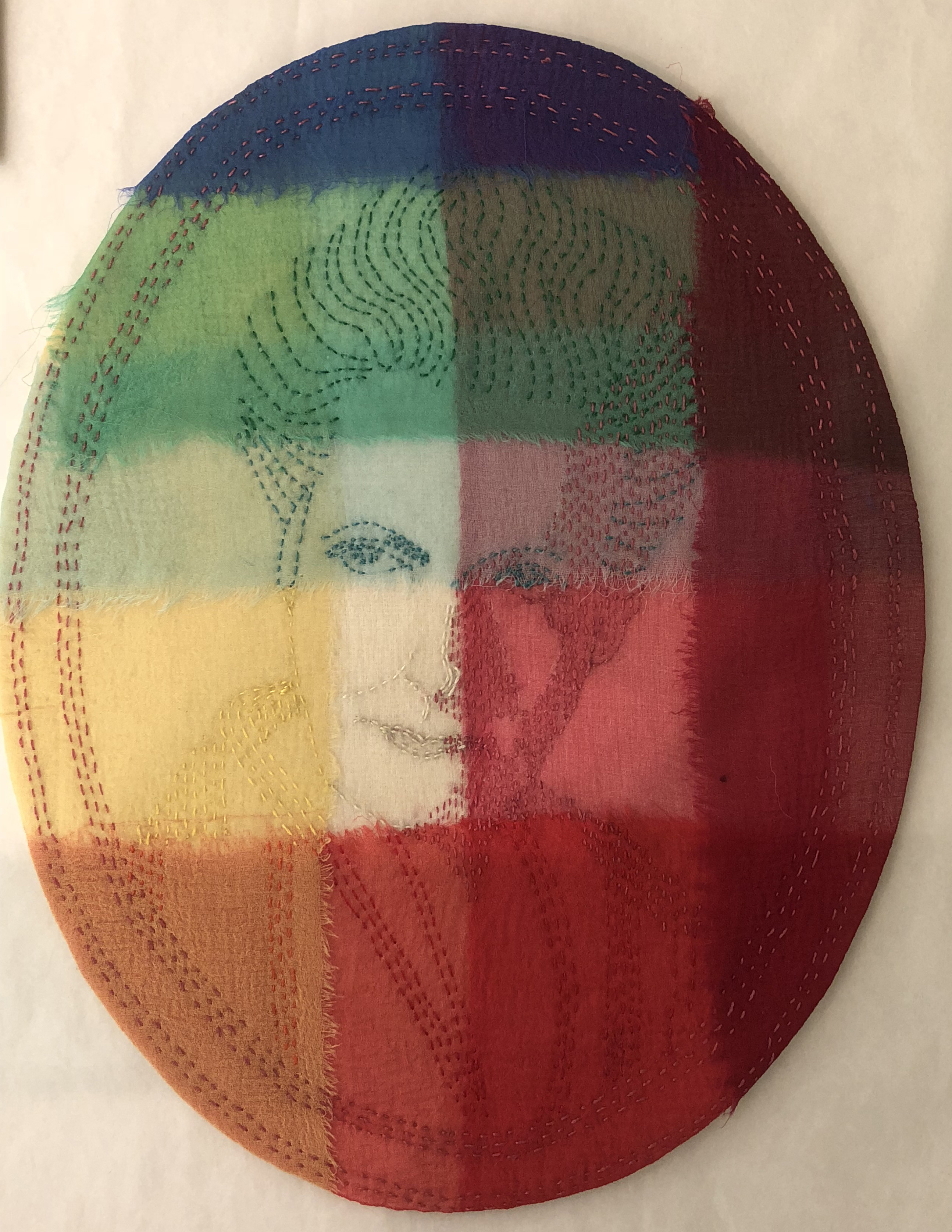
Pat Cove
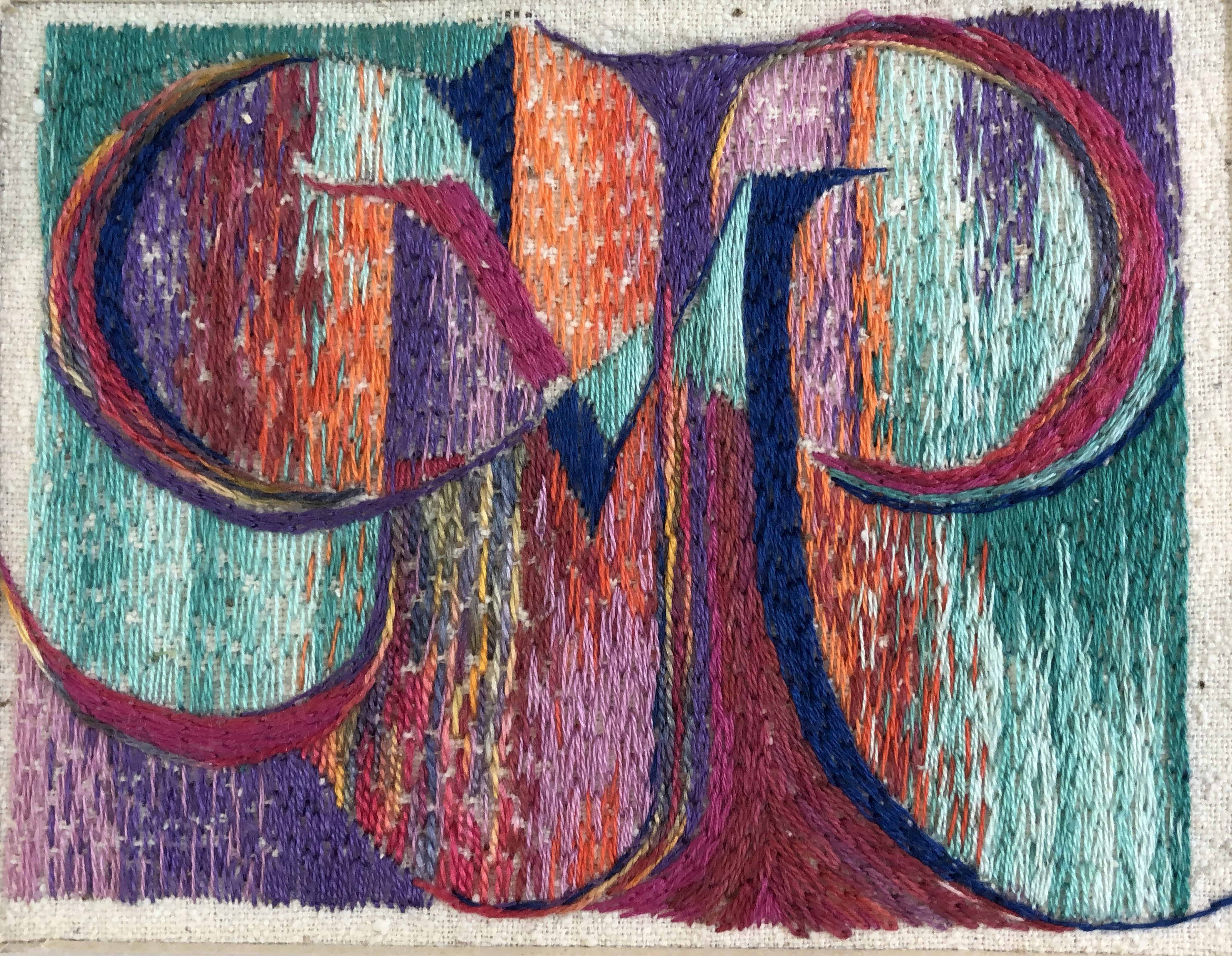
Muriel Best
Visit to Hand and Lock
Ann Rutherford
This was my second visit to Hand and Lock. The first, also with the NEG, was in the autumn of 2006 when 50% of their business was with the military and it was interesting to see how the emphasis has changed. Last time, we were shown the fabric and cutting patterns for military uniforms. While there is less demand for the latter now, it appears that they have a number of requests for military style clothing and gold work for fashion.
Sample using coloured plate with tiny bugle and other beads
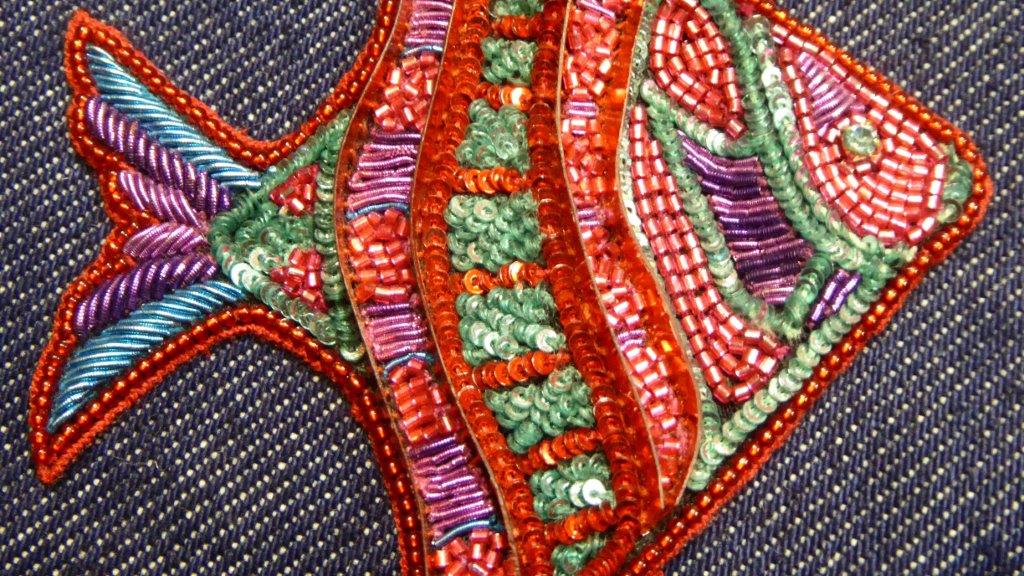
Fish with mini-sequins, beads and coloured purls.
The cupboards also revealed samples for fashion, with machine embroidery, trails of Swarovski crystals, leather, feathers, plexiglass shapes, sequins, beads and some gorgeous hand embroidery.
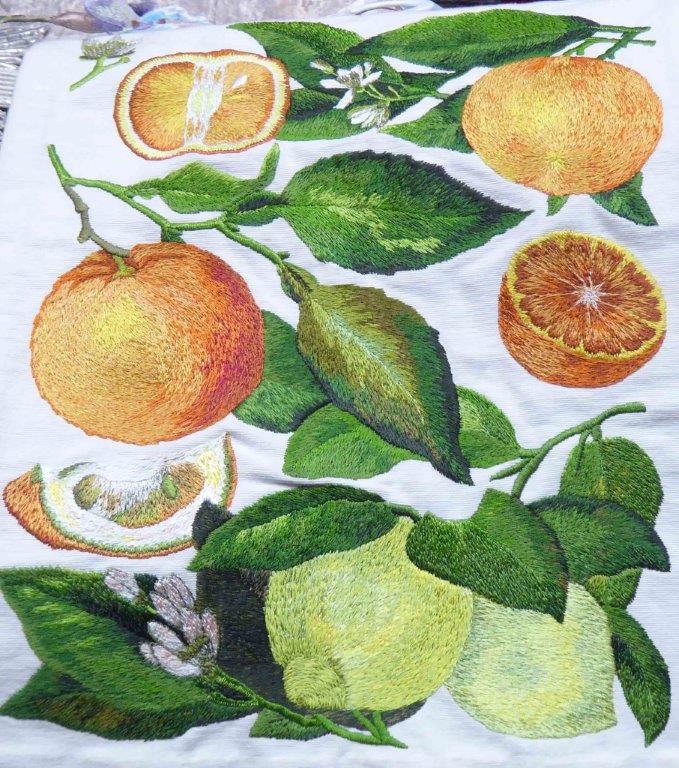
Fine hand embroidery.
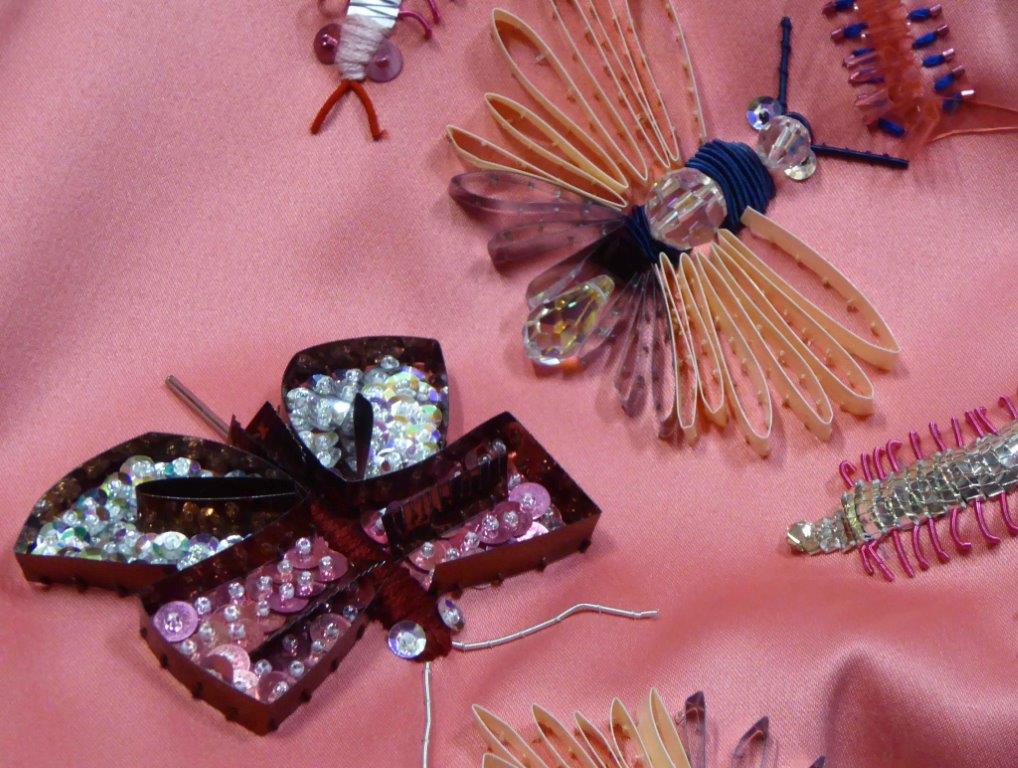
Insects with strips of sequin plastic used on its side with beads and purls.
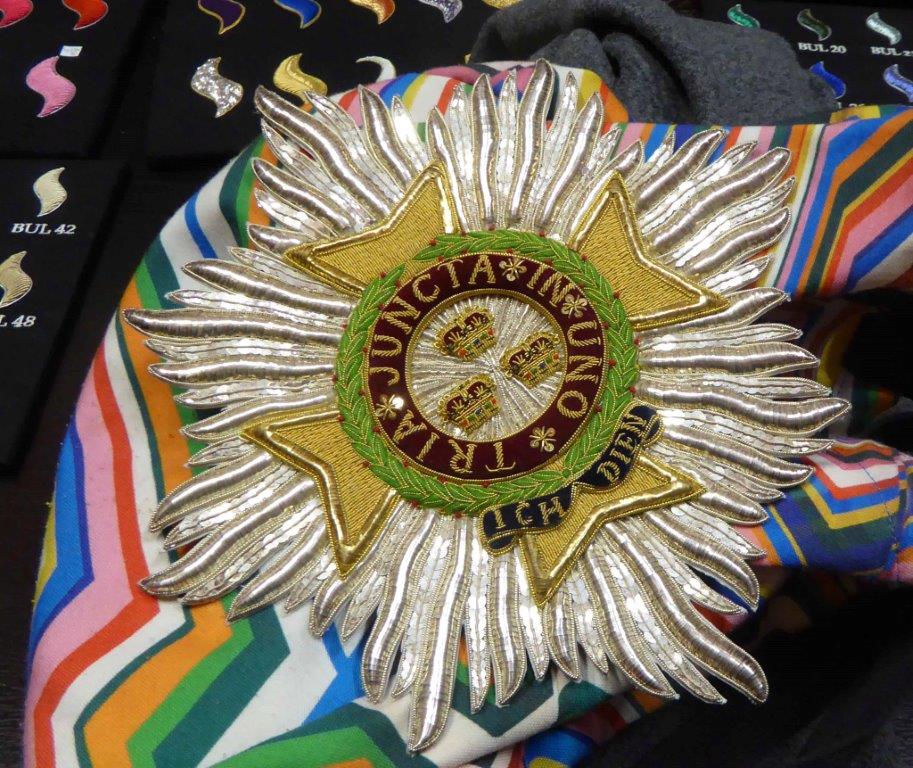
Military-style badge gold work and embroidery.
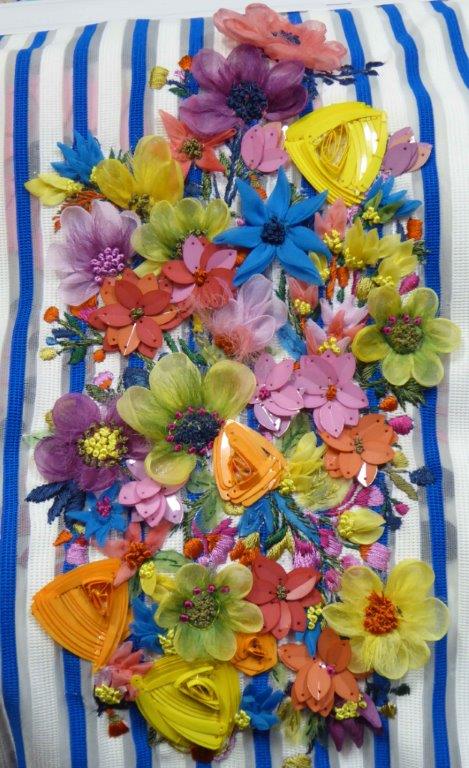
Experimental piece for fashion.
Visit to Diana Springall

Diana, in light blue dress, with her carpet and curtains.
GARDEN PARTY
MASTERPIECE IN DULWICH
Susie and Paul Goulder
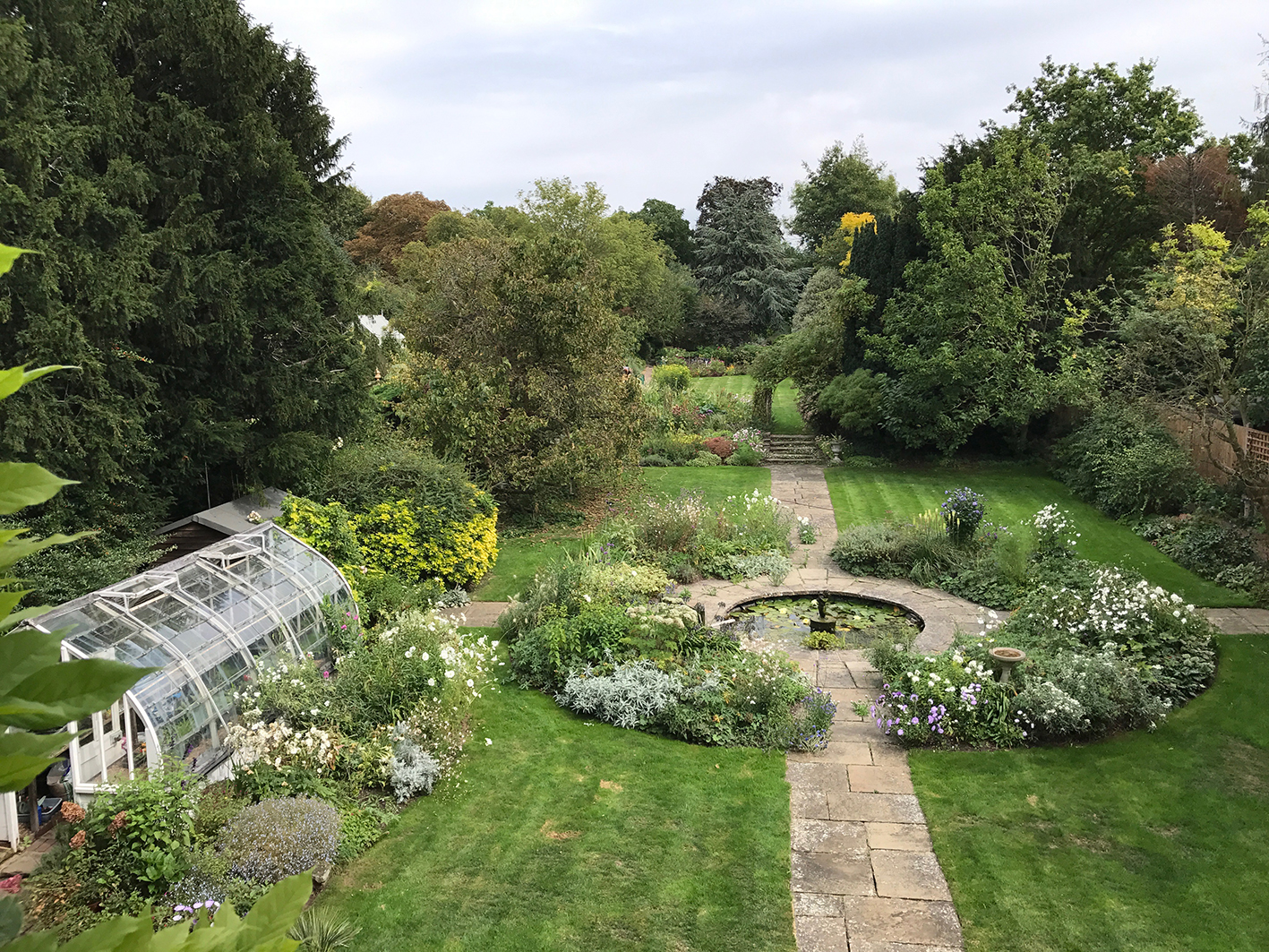
The garden is beautifully non-formal (formal in the sense of the image of an Italian garden below) with curving borders and sweeping herbaceous beds.

It was particularly kind of Ann Rutherford to permit family and friends to come along so that they in turn could enjoy the house, the garden, the especially tasty lunch, and
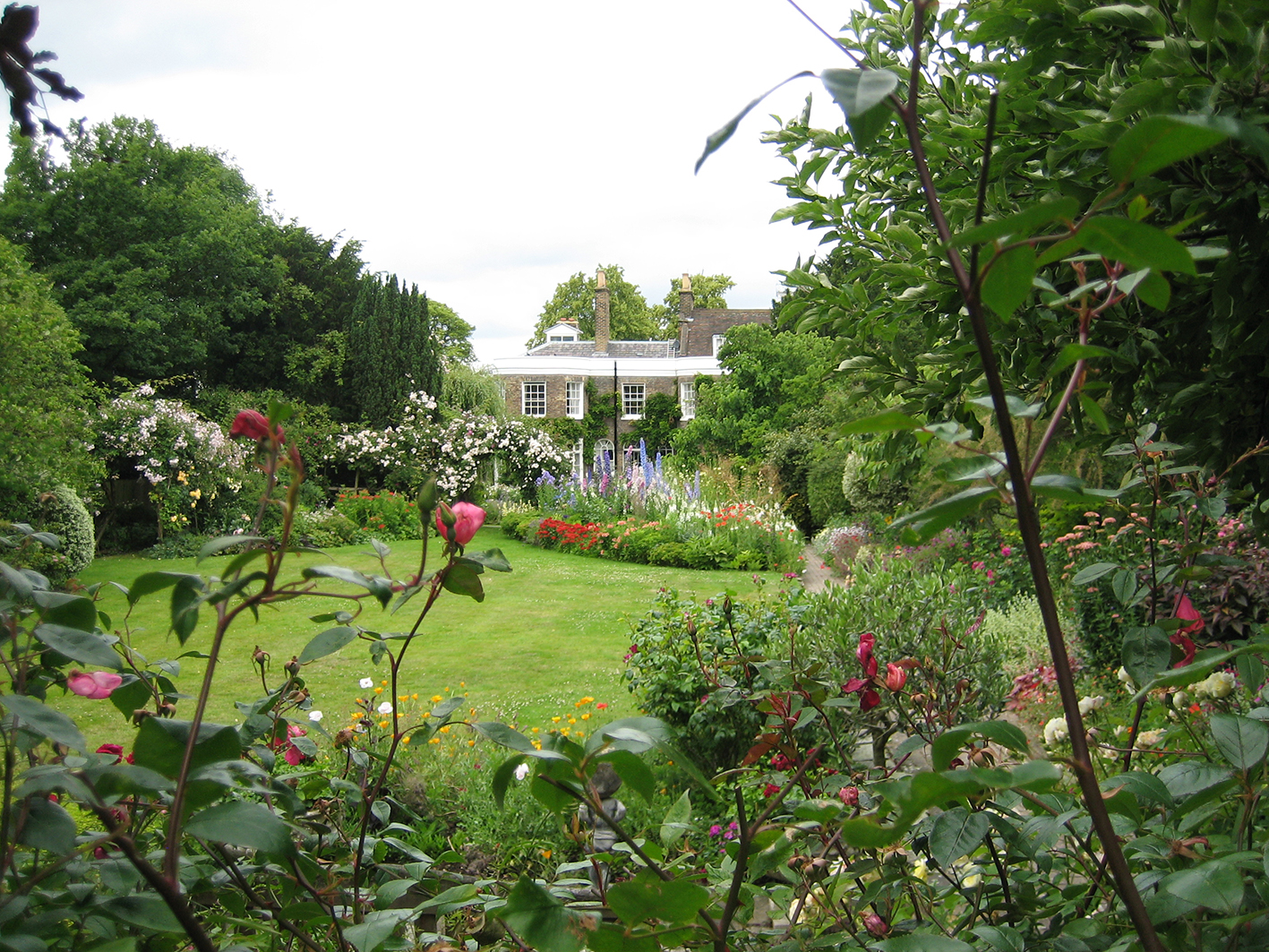
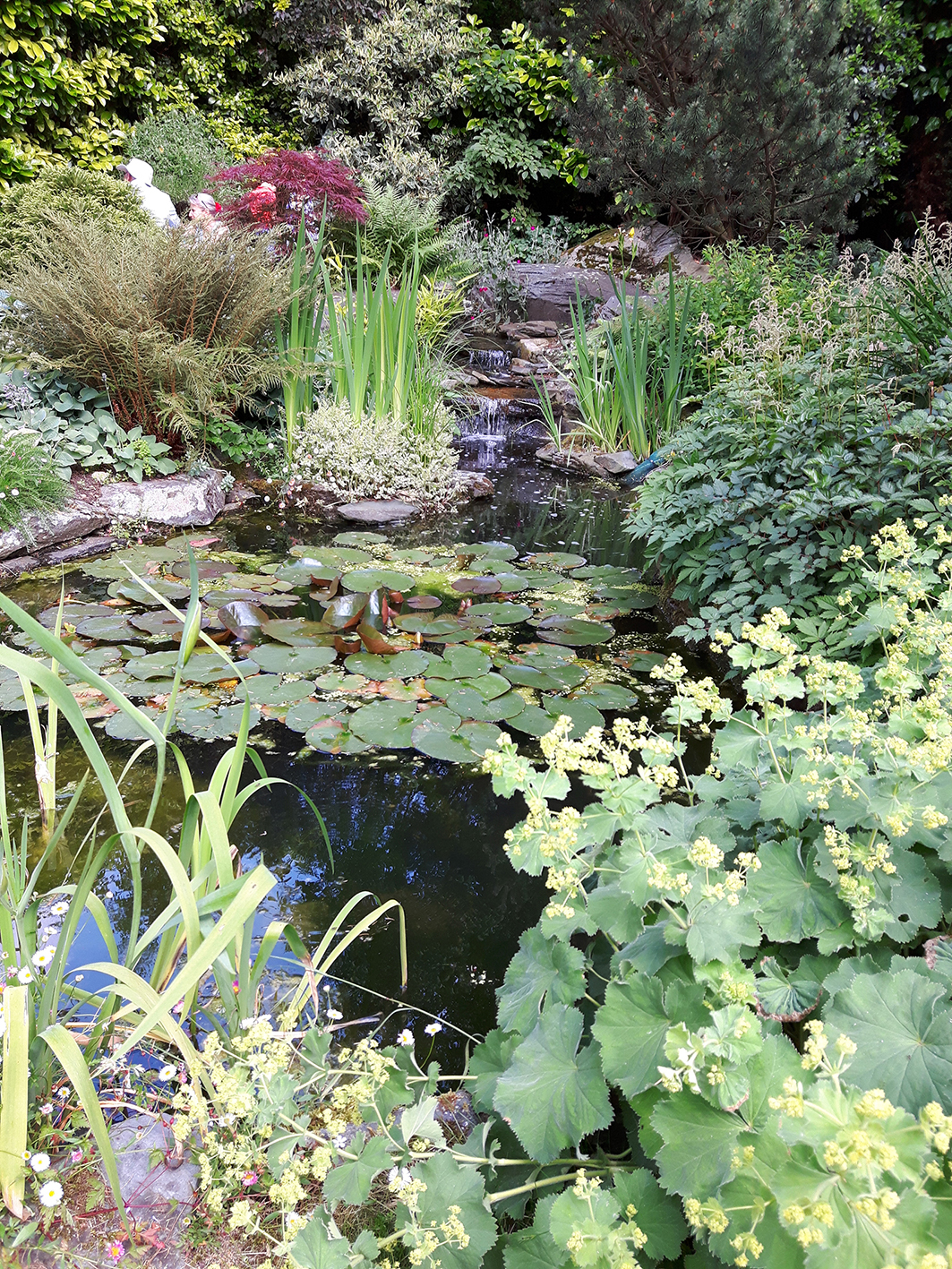
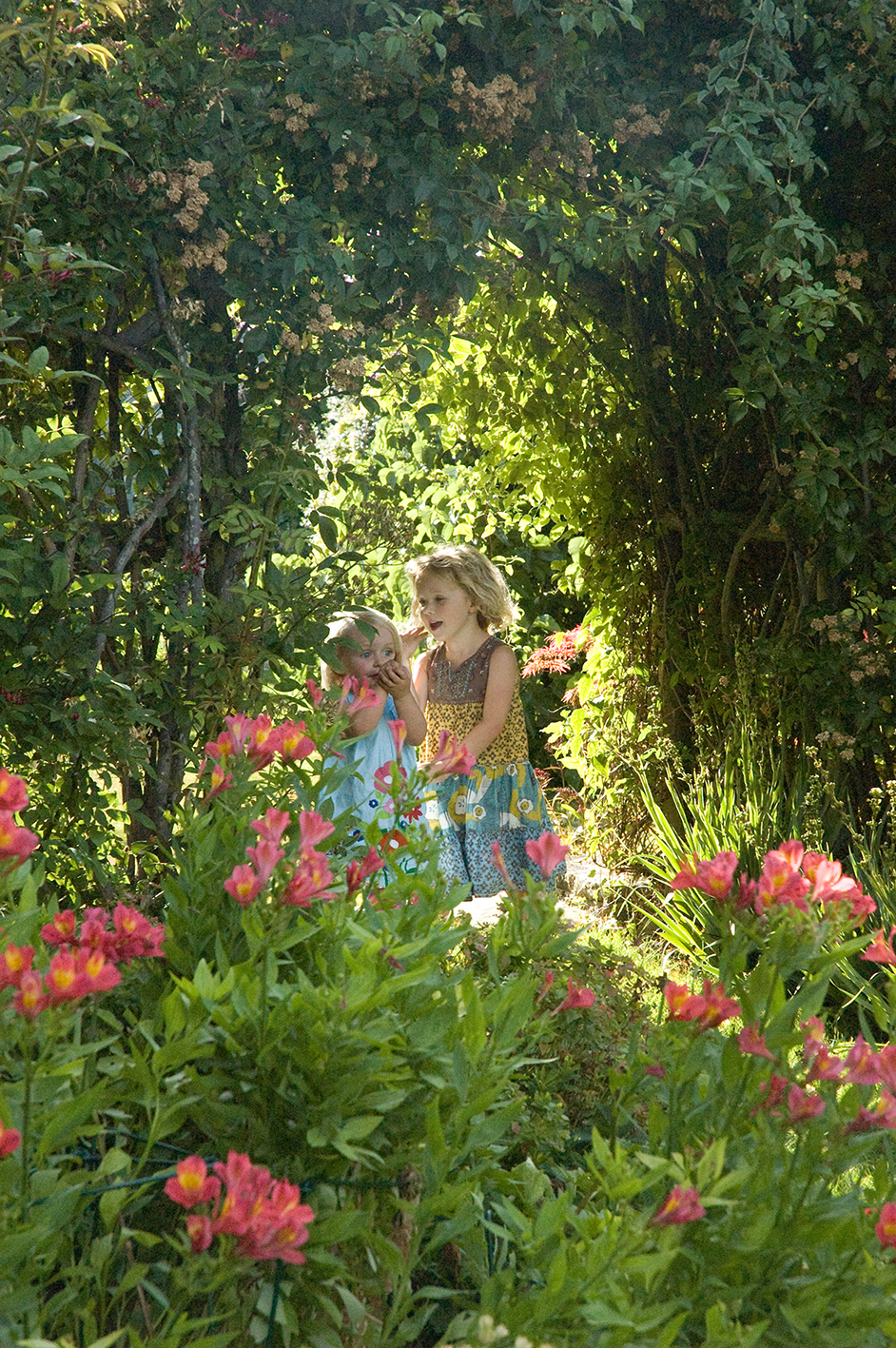
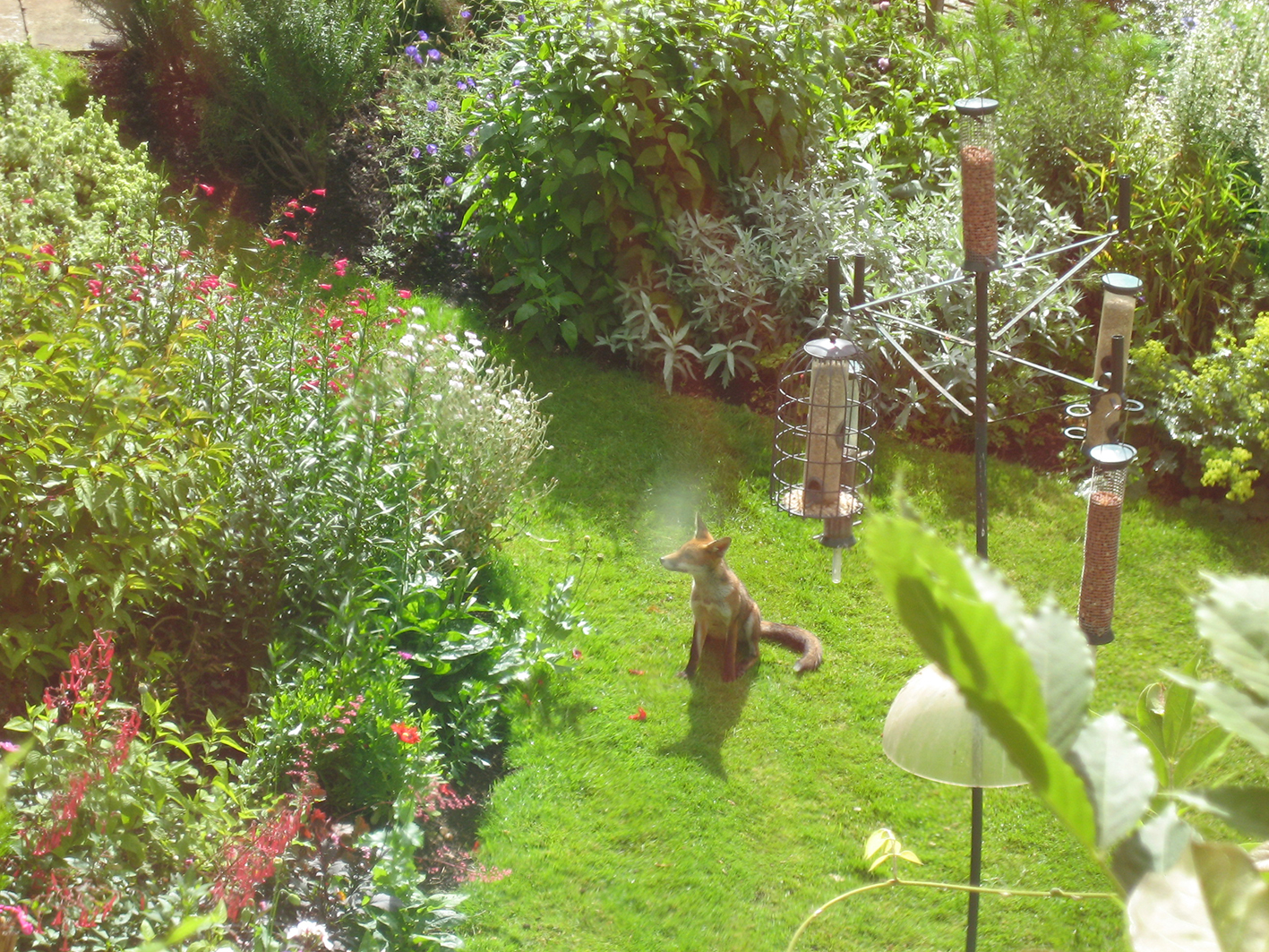
ANCIENT PERUVIAN TEXTILES
John Allen

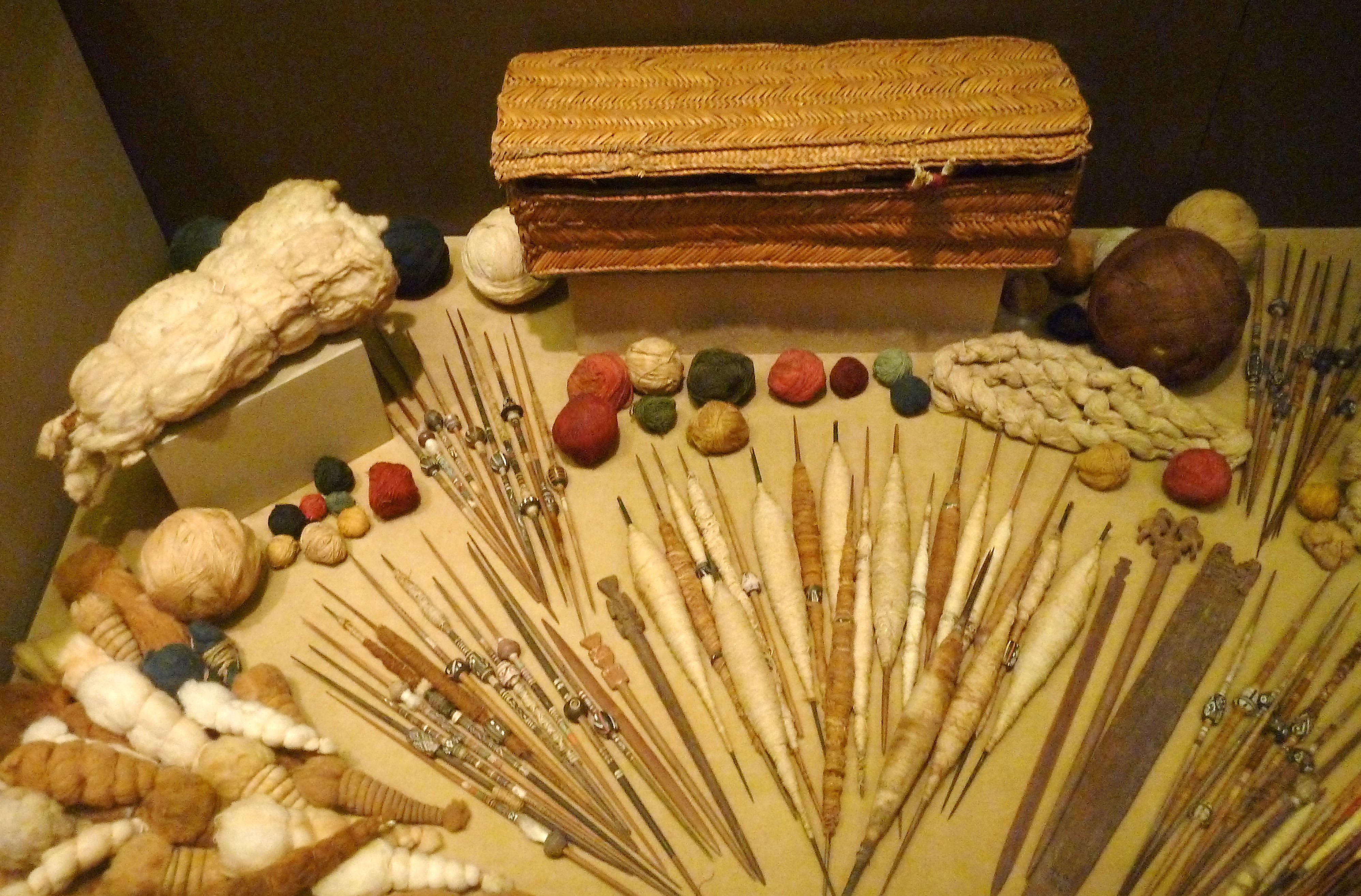
has now infected me and I shall be heading for some of the museums where she and her husband photographed the textiles.
On that note I have to say it was so good to see such excellent photographs, clear even when taken in hideous lighting conditions.
INDIAN TEXTILES AT ANN RUTHERFORD’S
Diane Foxley
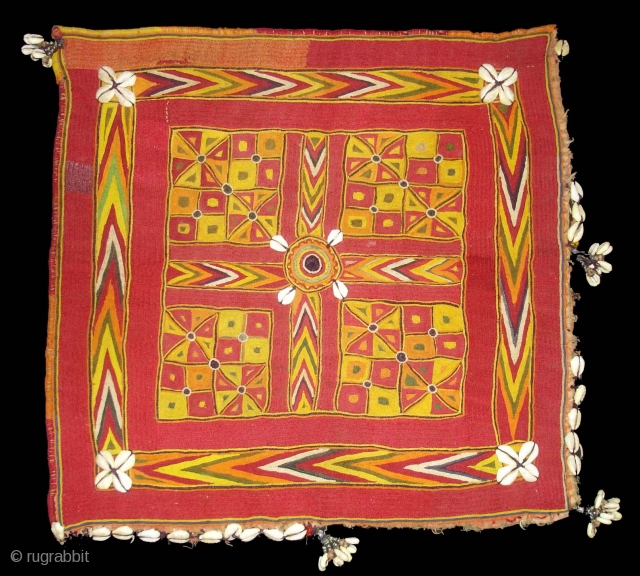
We were all greeted with a very welcome cup of coffee with delicious biscuits by Ann in her lovely home. Laid out in several rooms were her mainly Indian but with some Pakistani and Afghanistani examples of embroidered clothes, bags, scarves, sari lengths and other wondrous items such as a camel halter.
Ann gave a short introductory chat showing us pieces as she spoke then we were free to photograph, draw or paint as we chose.
Tie Dye featured prominently but there are many different ways of tie dyeing and Indians are past masters of the technique. A turban which was still partially held together in half by the stitching so that once pulled apart would break the threads and thus make them easy to remove. A wedding top with amazing tie dye patterns and a length of fabric which had obviously many processes used on it to achieve the finished result using the leheria method of tying. The colours achieved were subtle with yellow, blue and pale orange the main ones in a checked pattern, also so difficult.
Block printing, some of which had been done for Anouki.
Examples of ikat weaving were shown and we discussed double ikat which is SO expensive as both warp and weft are resist dyed and each needs to be aligned as the weaving progresses.
Applique and reverse applique were on quilts we later saw hanging from the landing as well as kantha quilting.
I particularly liked a Banjara or gipsy spice bag made of four oblongs of fabric stitched around a central square and then looped up to make pockets for the spices. It was heavily embroidered with minute cross stitch in patterns and using wound threads as a rope to hang or hold it up with a tassel on the end. The square then fell into a peak with four cowrie shells stitched around the central point. This was all in subtle shades of ochre, orange, green and red.
A hat had half an old metal zip to edge it as a decoration, with tiny white beads stitched on singly in pairs above the zip. Modern objects used when damaged and unable to be used for the purpose they were invented for is typically Indian.
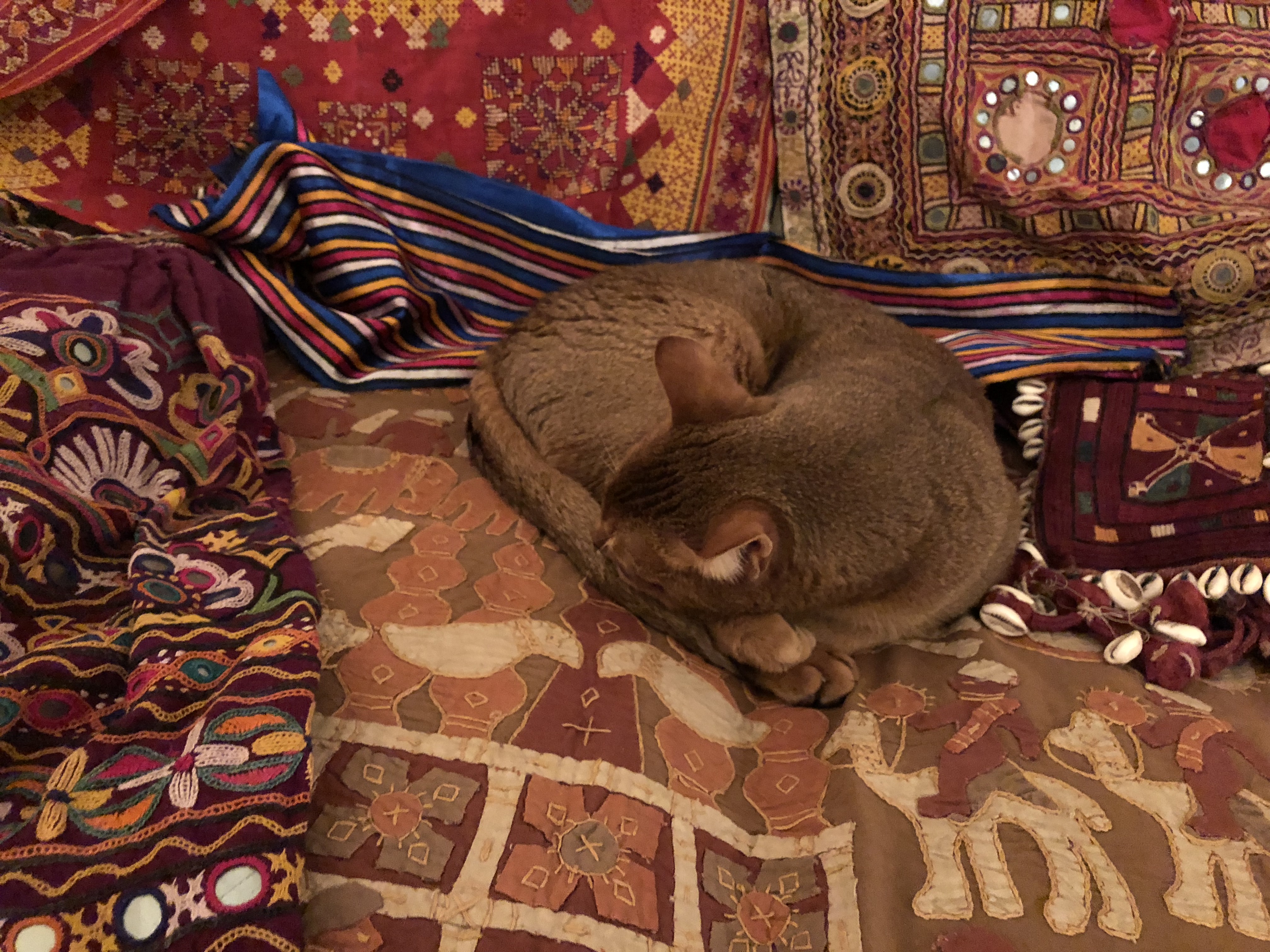
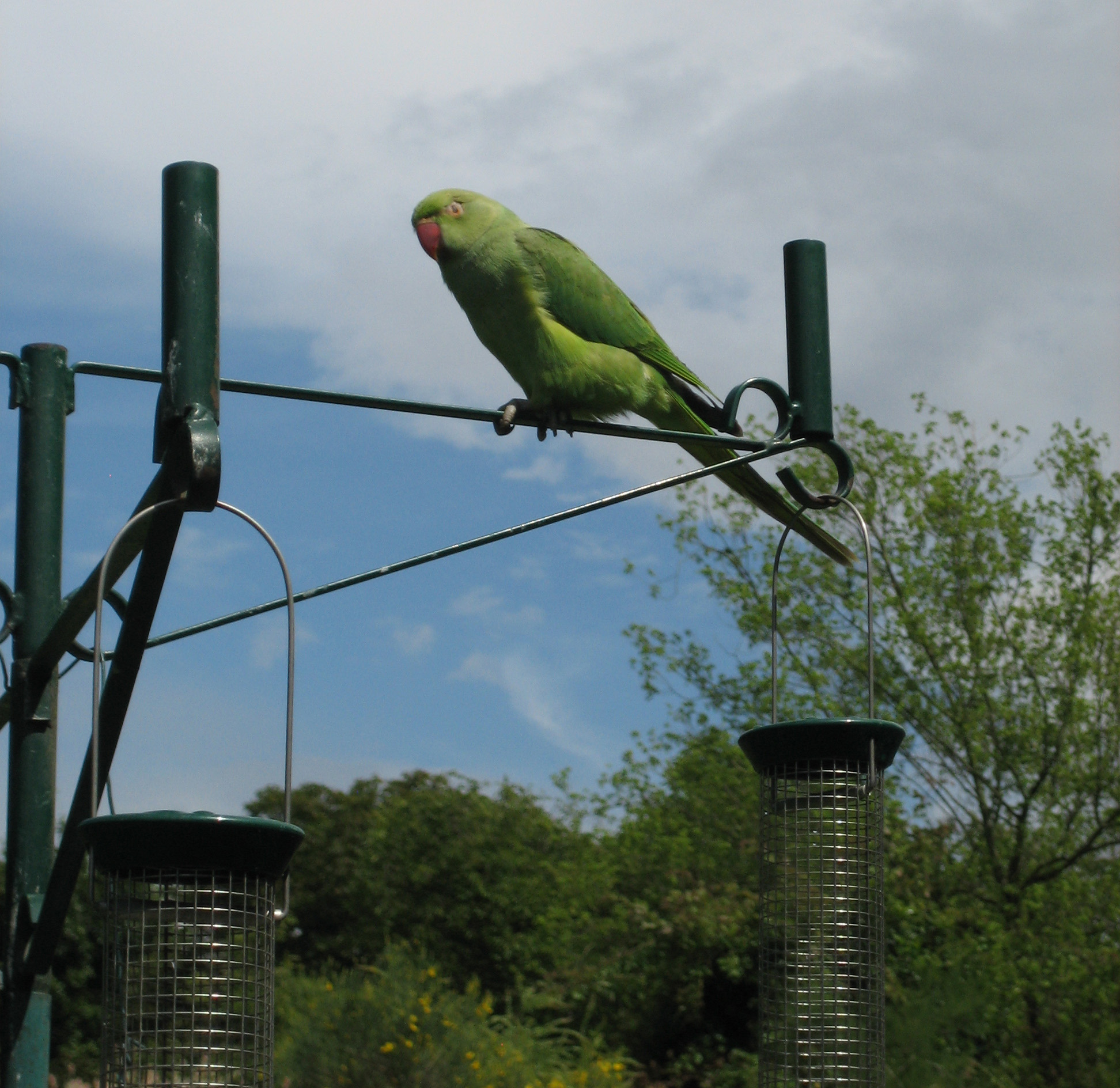
PAINTED HALL CEILING
Ann Rutherford
You find John Flamstead, the Astronomer Royal, and Sir James Thornhill himself who was commissioned in 1707 to design this ceiling, another in the upper hall and the West wall, and was not paid until work was finished in 1726!
There are figures representing gods,heroes from antiquity, the elements, rivers, and abstract notions such as peace and victory. Galileo is there, Hercules, the City of London, even a rat.
We had a knowledgeable guide who really enjoyed his own jokes. Last time I visited, the moulding round the edge of the ceiling was being cleaned with a cotton bud!
KNITTING AND STITCHING SHOW 2017
We were delighted with the position and extent of our stand, just inside the passage from the Palm Court to the main exhibition halls, making it the first exhibit that visitors came across as they entered. We thank the organisers for this splendid bonus. The work went up really well and made an arresting display. We received a lot of compliments and sold a pleasing amount of work.
We now look forward to taking our exhibition to Harrogate in November.
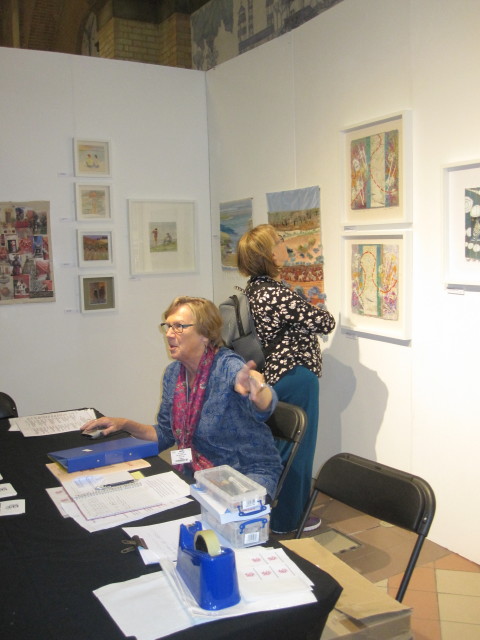
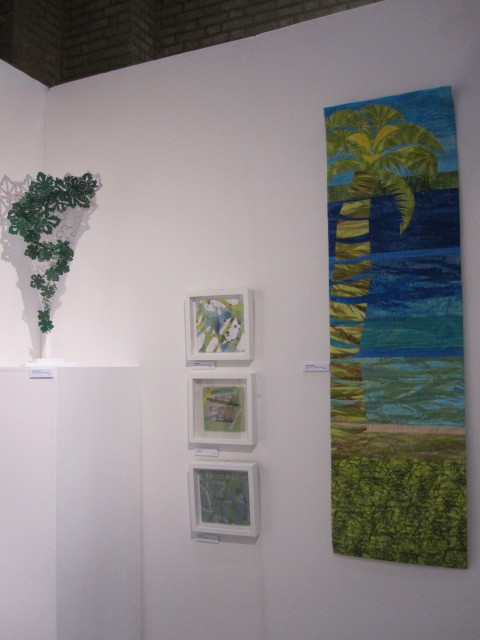
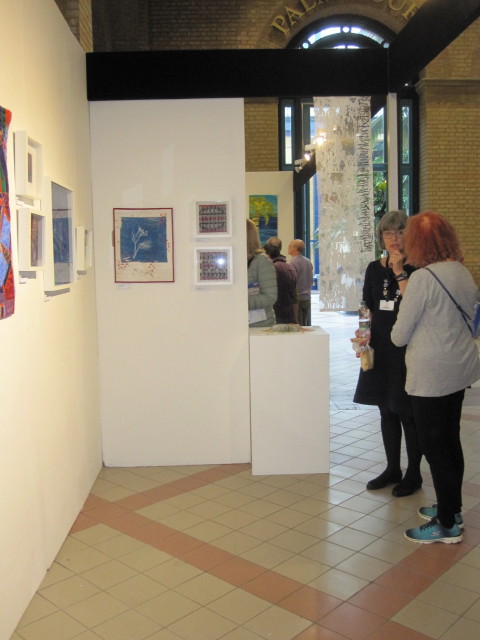
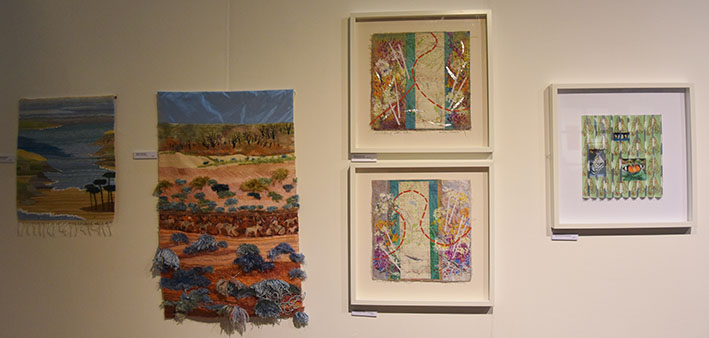
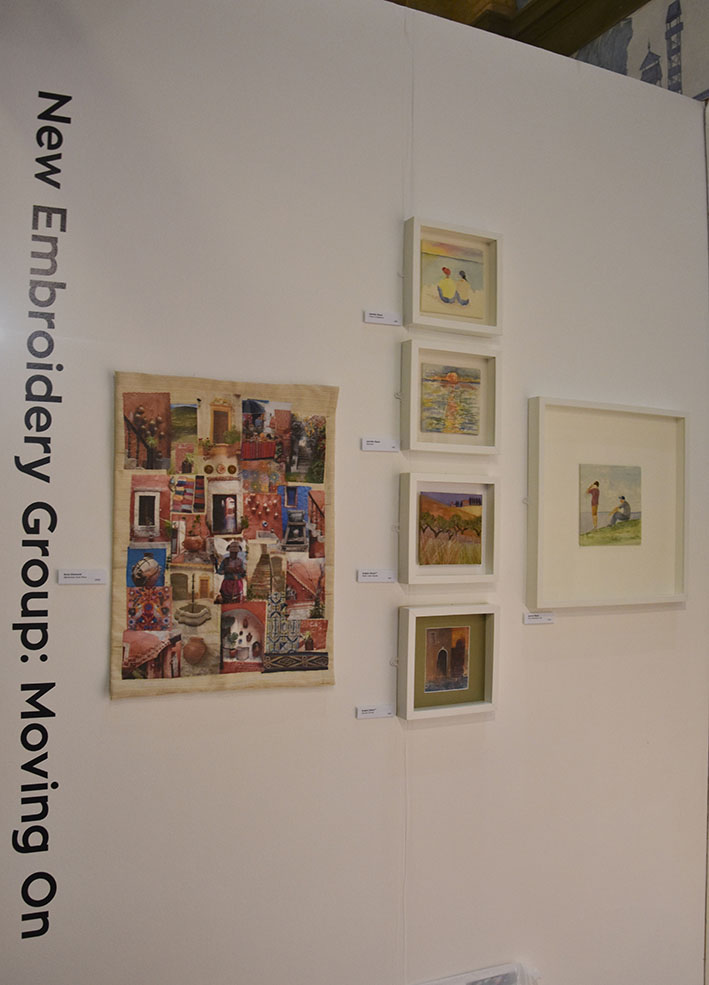
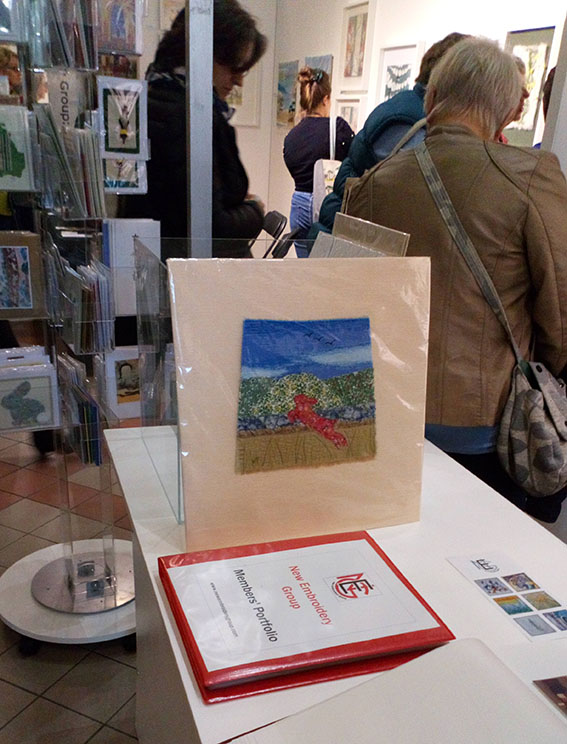
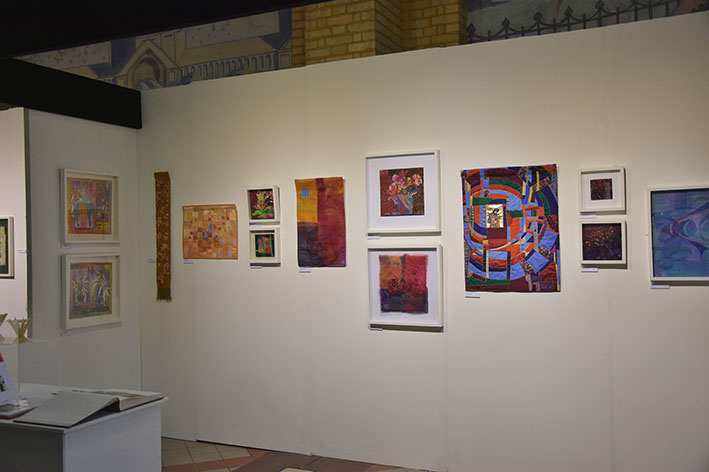
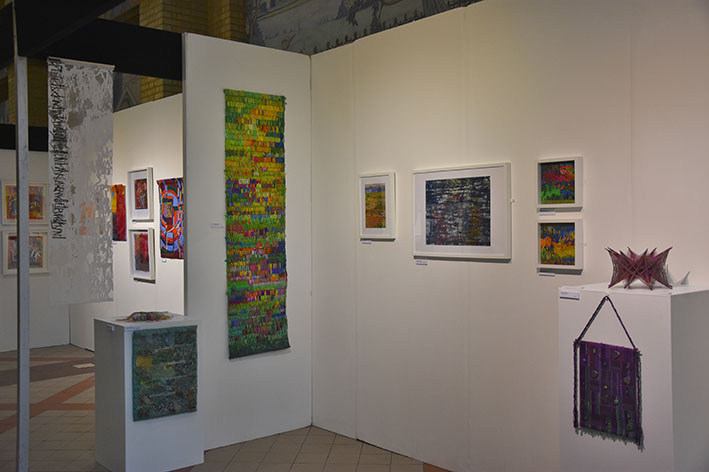
Knitting and Stitching Show at
Harrogate
Once again, we were given a lovely exhibiting area which we very much appreciate.
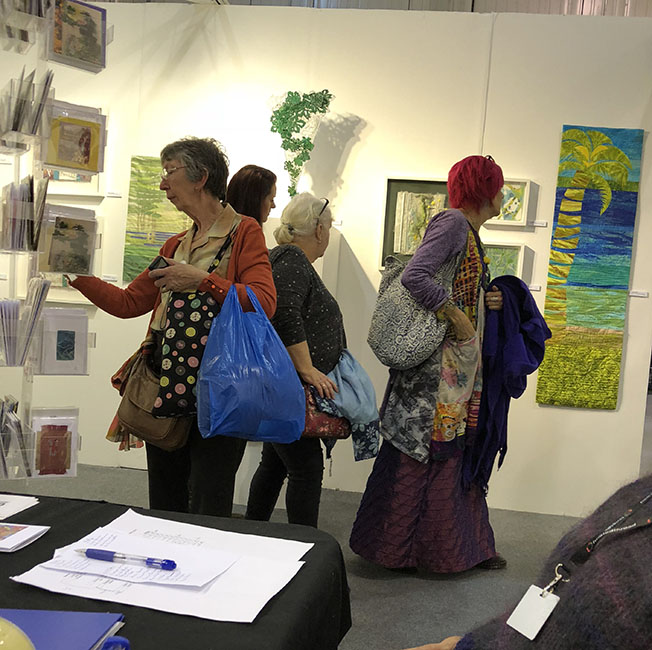
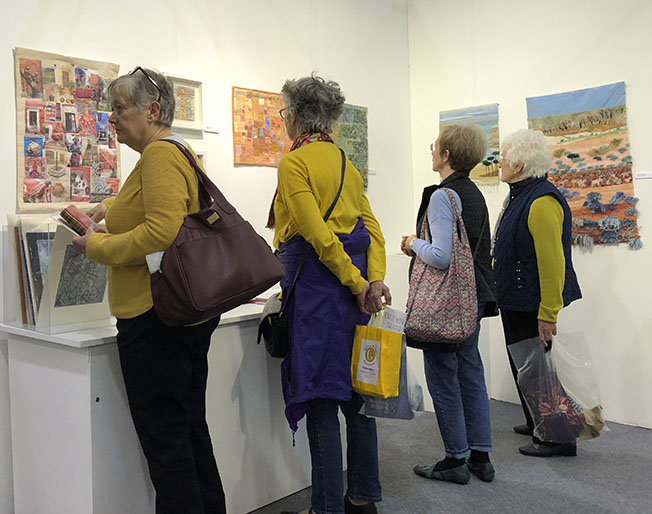
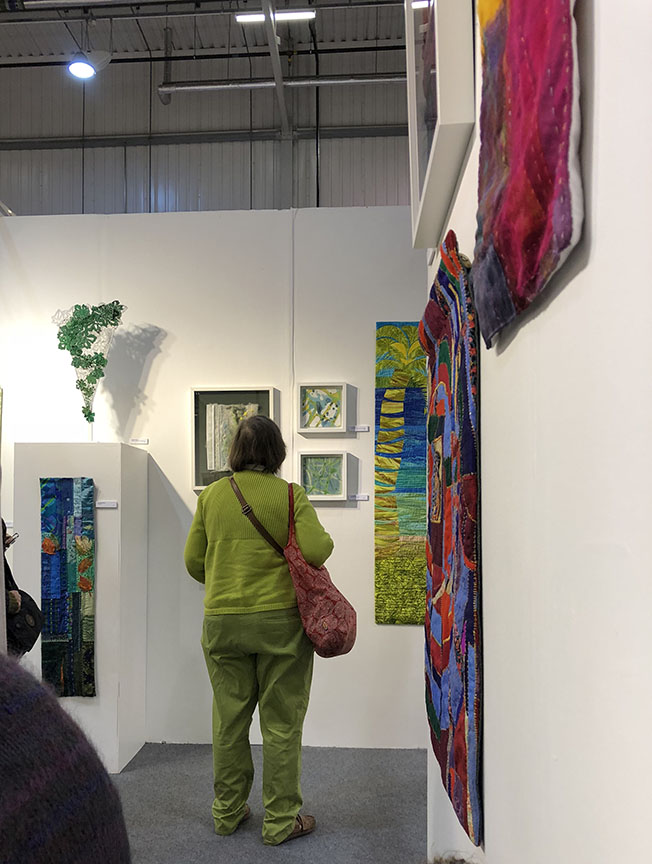
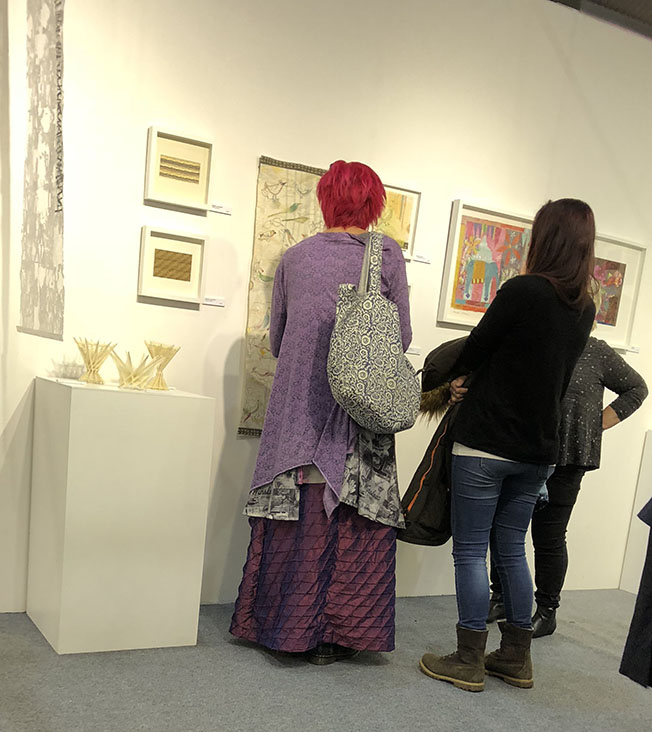
Individual work
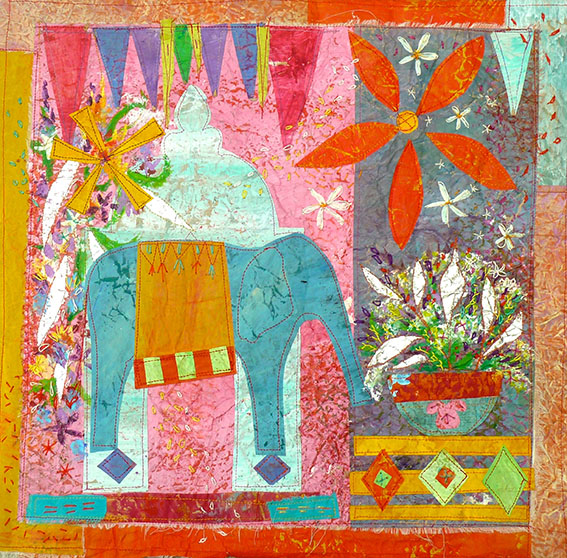
Stitched and painted paper collage. Inspired by a visit to the Amber Fort in India.
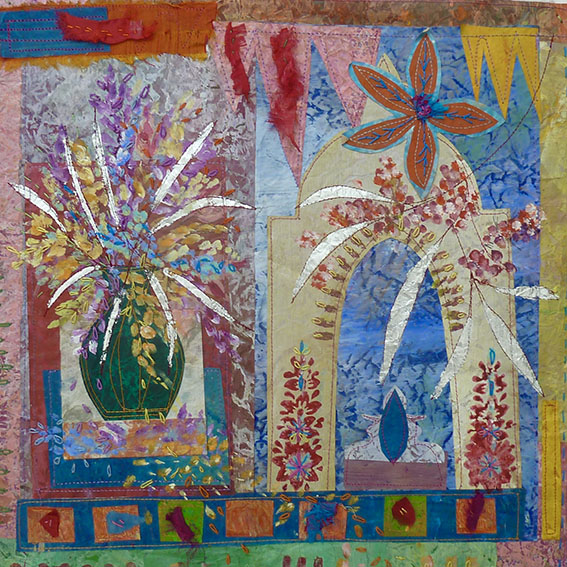
Brenda Parsons. Indian Temples
Stitched and painted paper collage. Inspired by a visit to India and sketchbooks
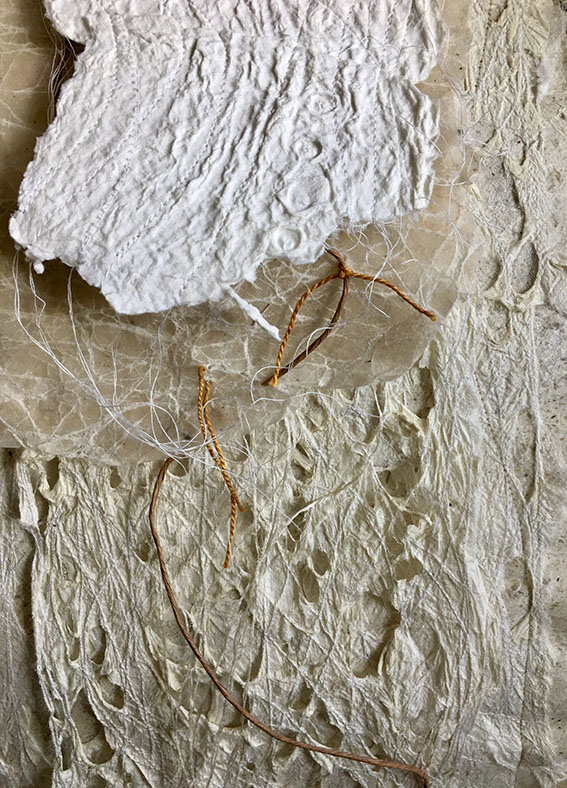

Ann Rutherford. King Roger 11

Ann Rutherford. Orlaya
Hand embroidery on computer printout of own design, based on drawings of plants in the garden.
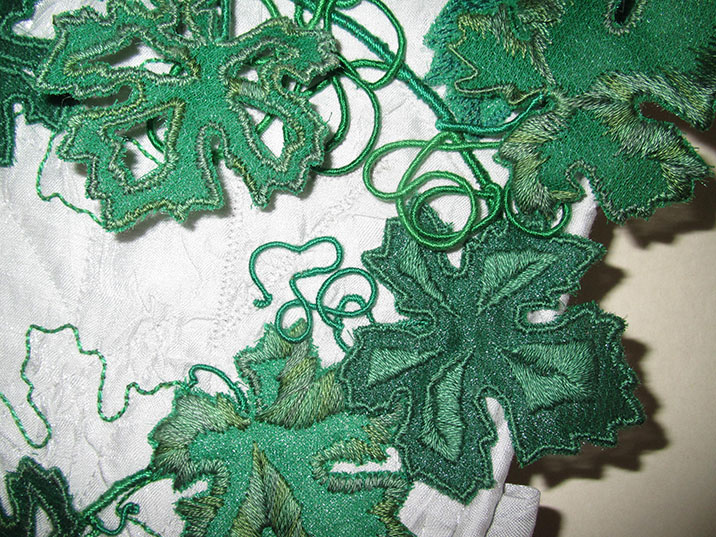
Elizabeth Arkell. Twisting Vines of my Imagination (detail)
Buffy Fieldhouse. City Skyline
Work reflects and is based on a sketch of the apparent chaos of sand patterns and seaweed. Acrylic paint on cotton, lutrador and paper laminations.
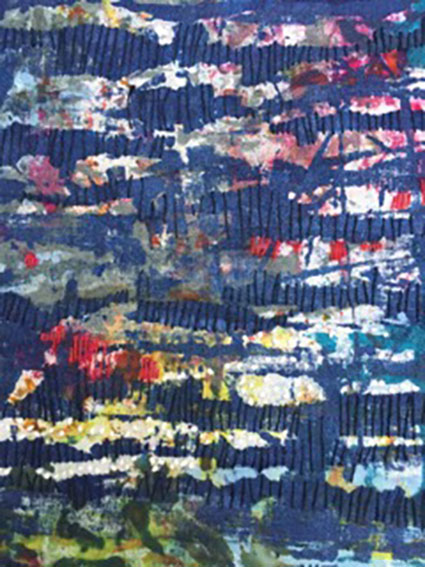
Buffy Fieldhouse. Random Confusion to Final Order
Acrylic paint on heavy cotton that has been randomly over printed many times and then hand embroidered mainly with linen threads.
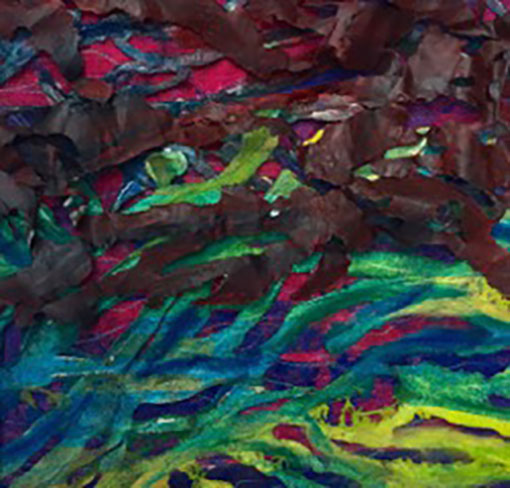
Buffy Fieldhouse. Depths of Time
Work reflects and is based on a sketch of the apparent chaos of sand patterns and seaweed. Acrylic paint on cotton, lutrador and paper laminations.
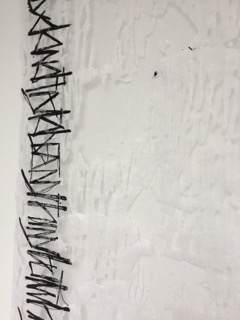
Buffy Fieldhouse. Be What You Are

Angela Dewar. Near Lake Garda
Machine embroidery over layerd silk organzas.
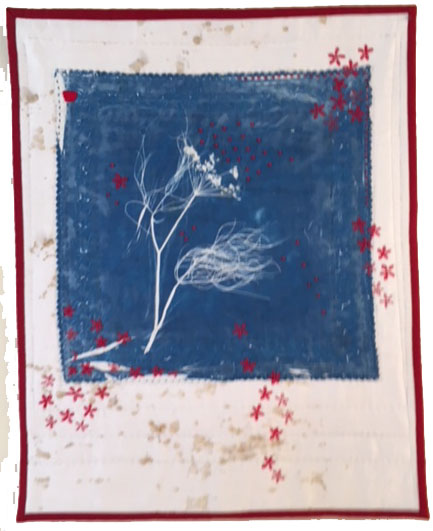
Linda Litchfield. Blue Umbelliferae
Cyanotype embroidered in red, with rust.
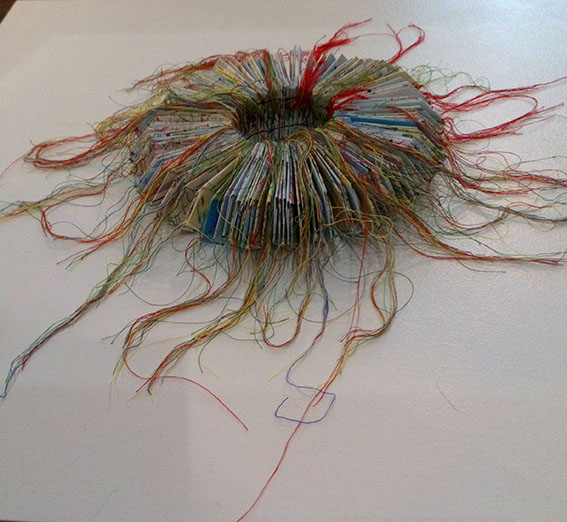
Elizabeth Saunders. Threads of Time Left Behind
Embedded stitch with loose ends encapsulates the memories of time left behind as we travel on through life.
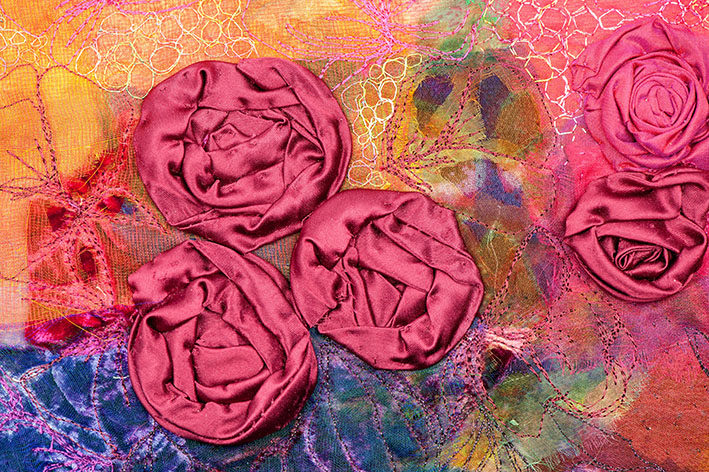
Arlene Shawcross. Roses in Bloom.
Free machine embroidery and hand stitch with velvets, silk and sheer fabrics. Inspired by the beauty of roses in bloom.
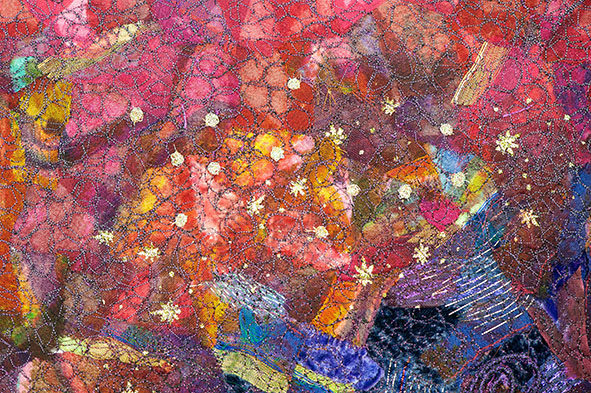
Arlene Shawcross. Night of Stars
Mixed fabrics including silks, sheers, velvet with free machine embroidery. Inspired by uplifting film music.
 Liz Ashurst. Summer Border
Liz Ashurst. Summer Border
Inspired by the summer herbaceous border at West Dean Gardens, Sussex. Silk dyed to match the harmonic sequence of colours and stitched in strips onto a canvas background.
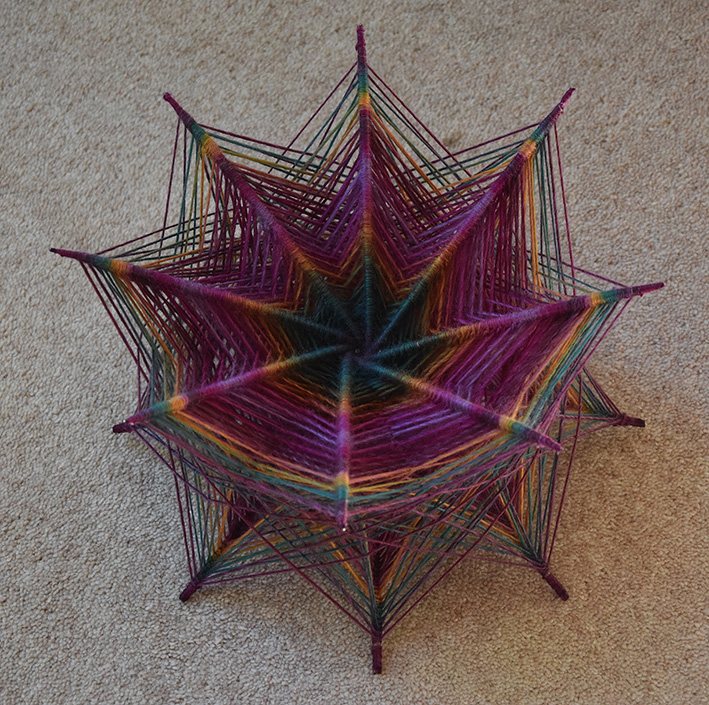
Alison Hird-Beecroft. Cosmic Cat’s Cradle
Bamboo sticks with threads wrapped and knotted around them in various regular patterns.
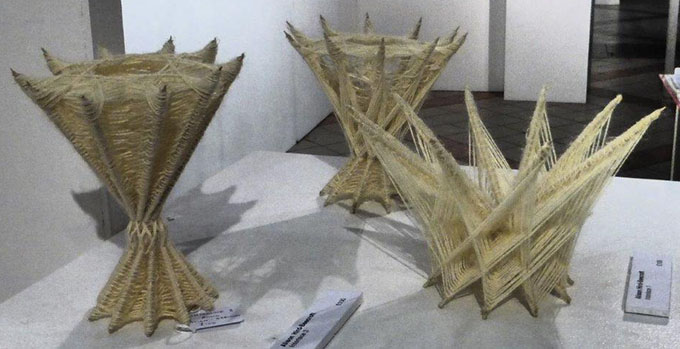
Alison Hird-Beecroft. Interlace 1, 2, 3
Circular structures made of bamboo sticks which are wrapped and knotted in a regular pattern.
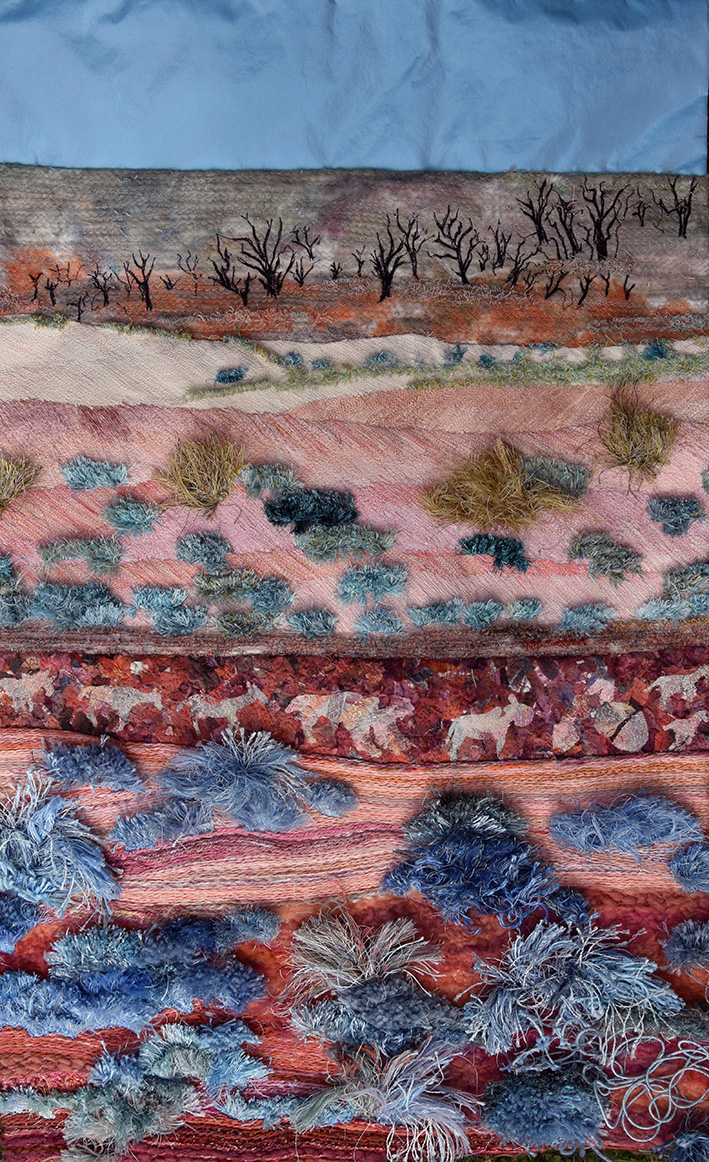
Janice Lawrence. Ghosts of the Namib.
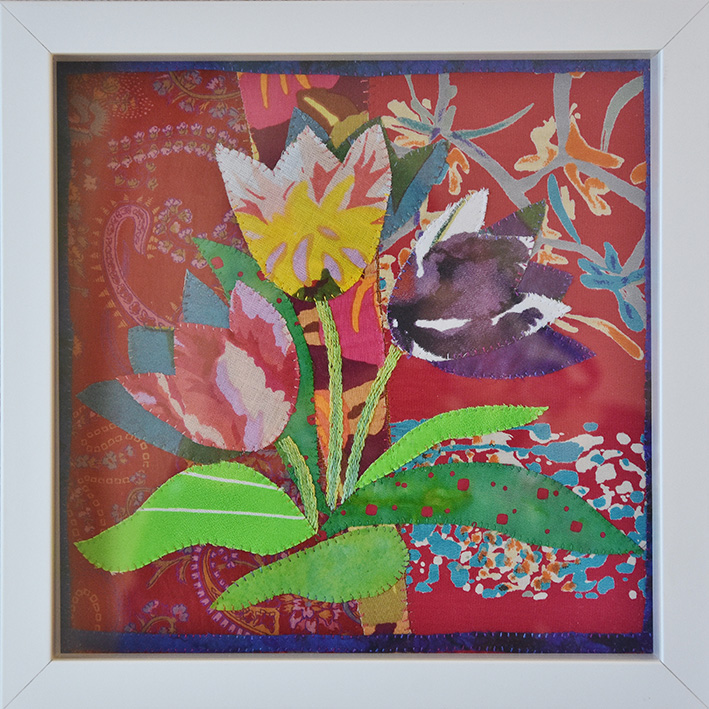
Bridget Barber. Tulips
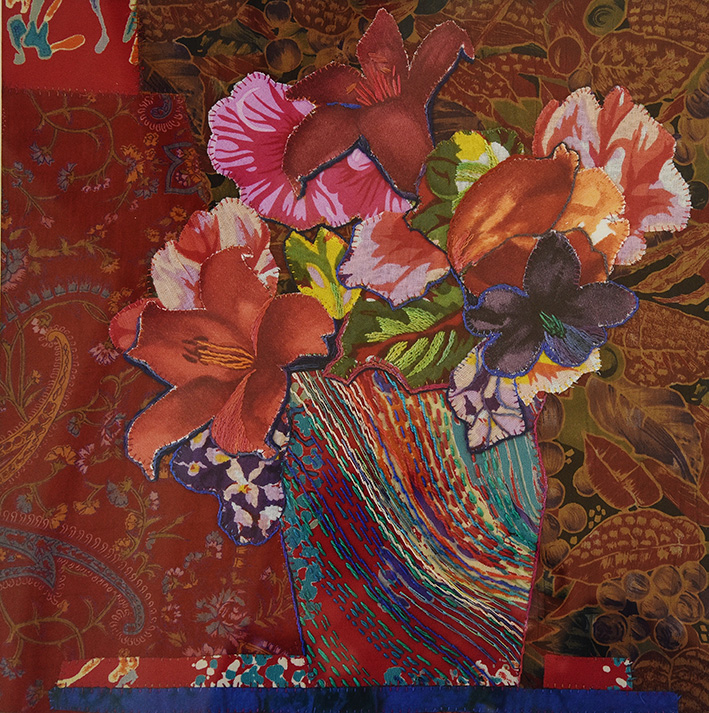
Bridget Barber. Summer Bouquet
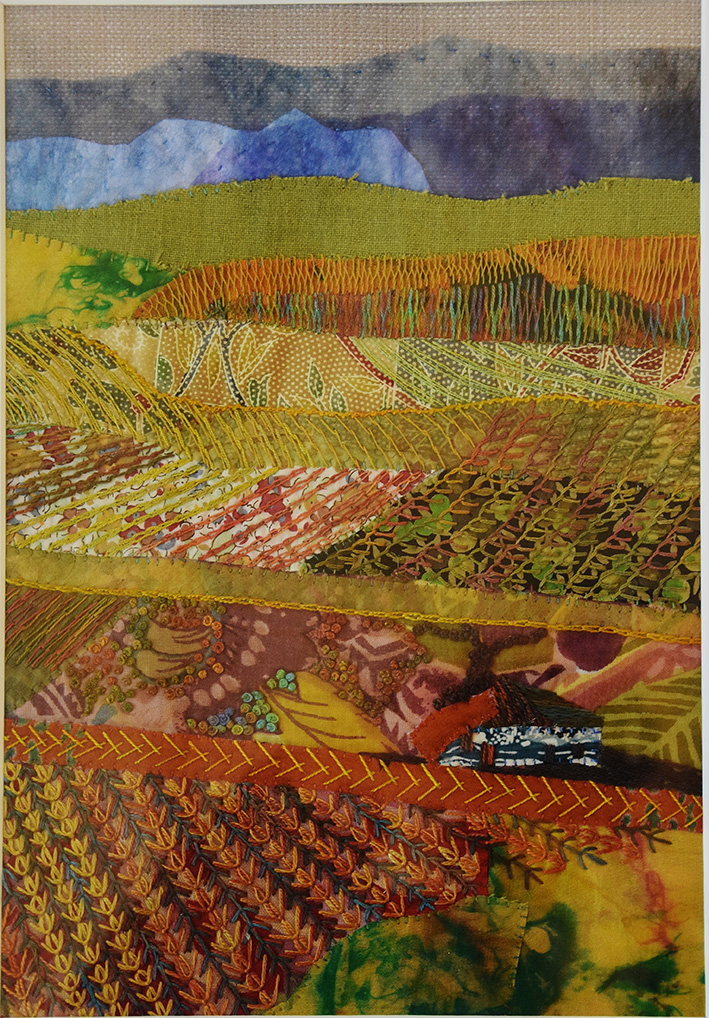
Bridget Barber. Pastures New
Layered landscape using many different fabrics and stitch techniques
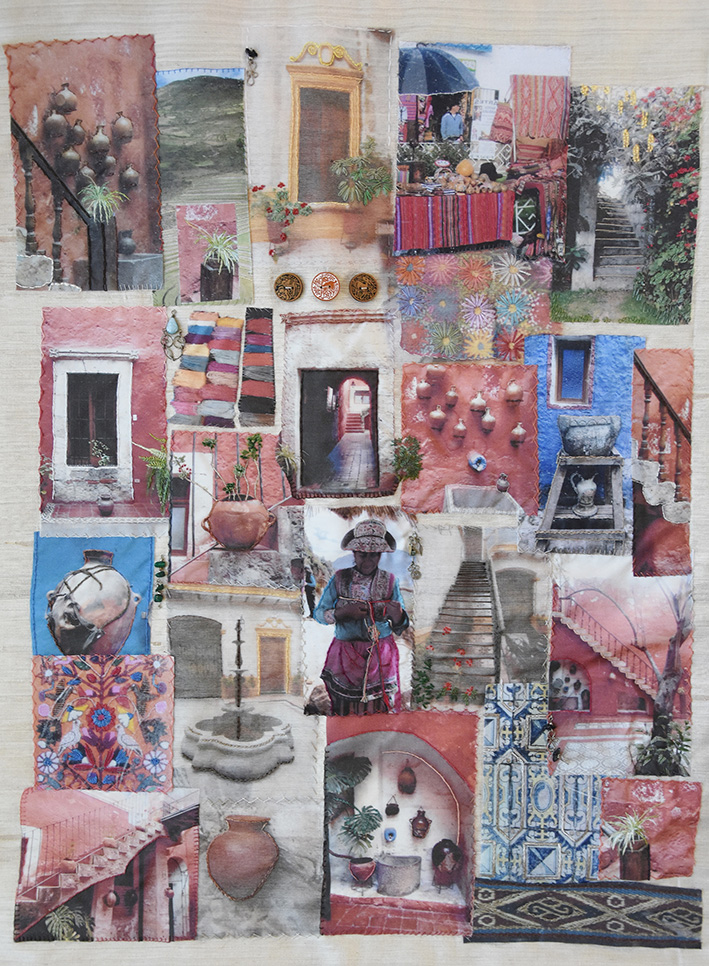
Anna Diamond. Memories from Peru
Images from visit to Peru, printed onto fabric and collaged onto woven silk fabric from India. Hand stitched throughout.
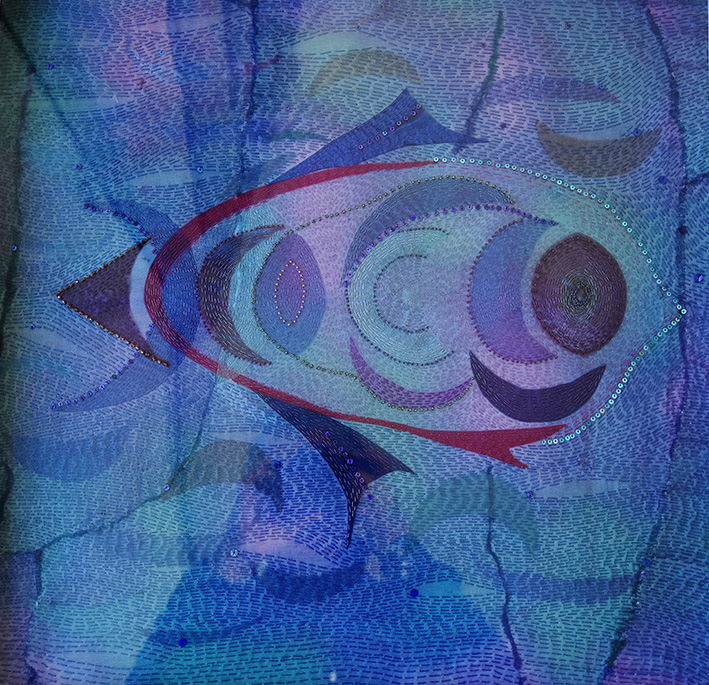
Anna Diamond. Nimo
A collage of organza shapes, burnt with a soldering iron, onto a background of dyed organza. Kantha stitching throughout with some beads and sequins.
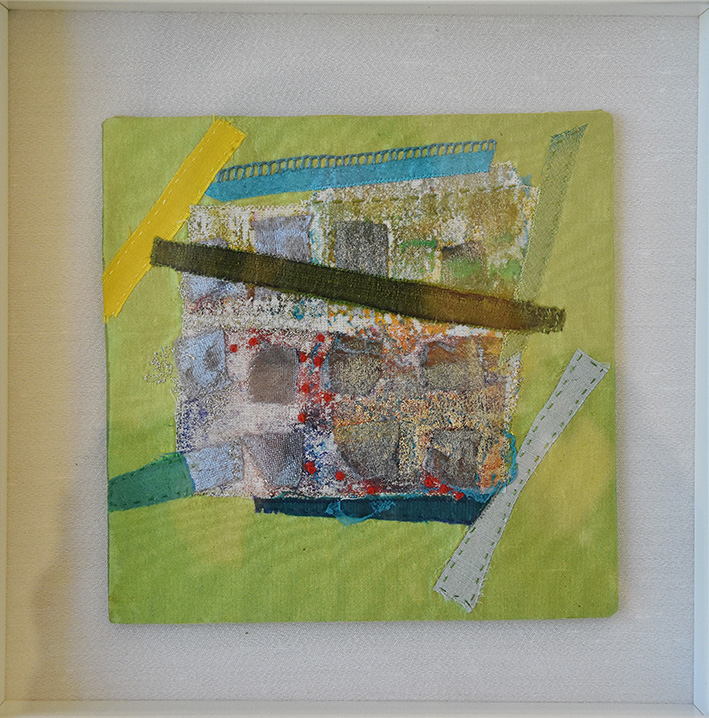
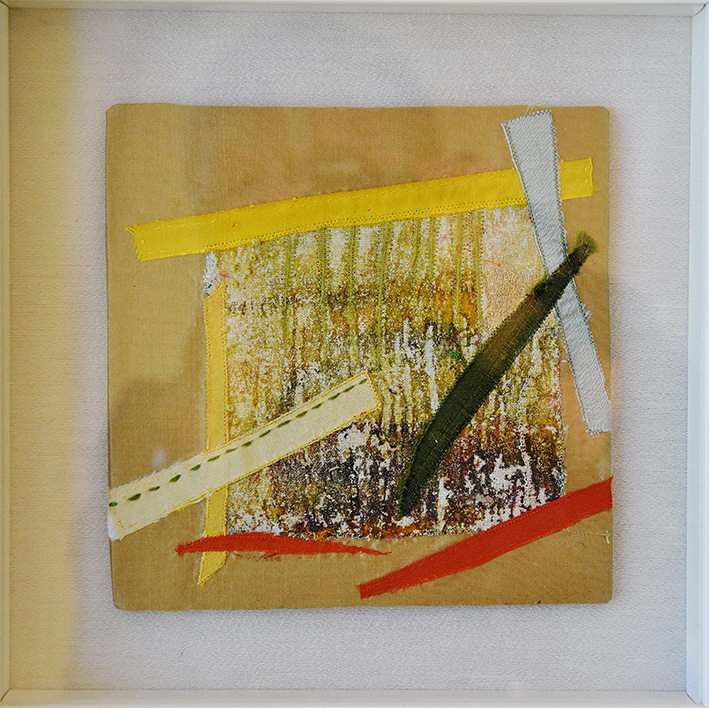
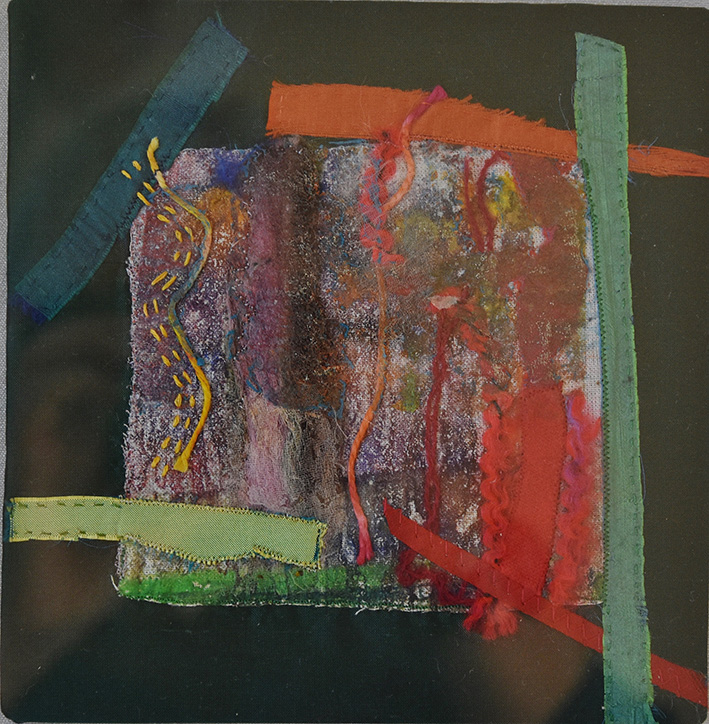
Pat Cove. Green 1,2 and 3
Experiments with household paints, hot iron, fabric and threads, machine and hand stitched.
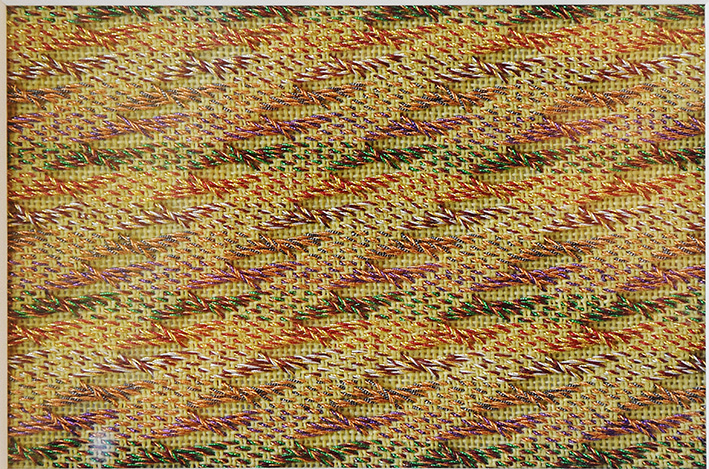
Barbara Jeremiah. Sunset Waves
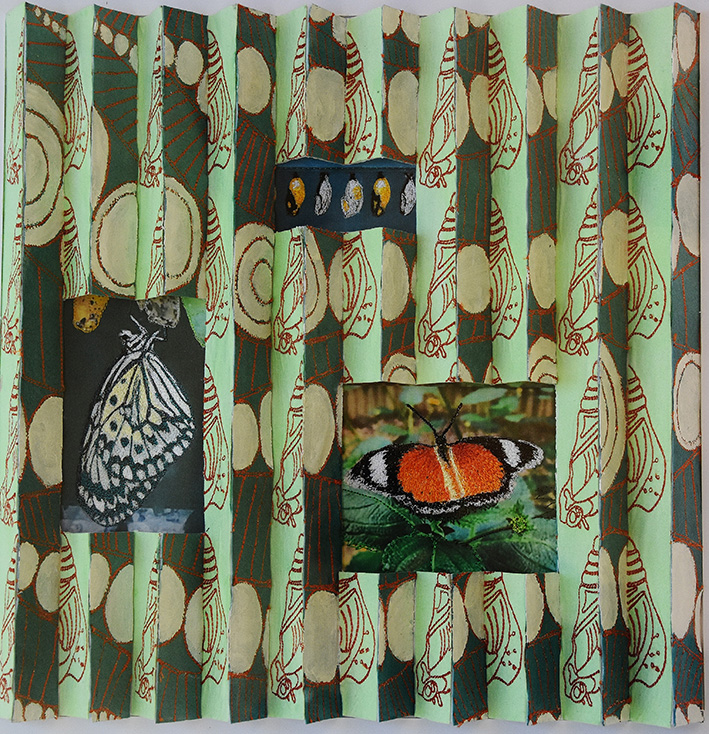
Sue Dunkerley. Nature Nurtures Butterflies
Machine embroidery is used to depict the life cycle of a butterfly as the seasons move on.
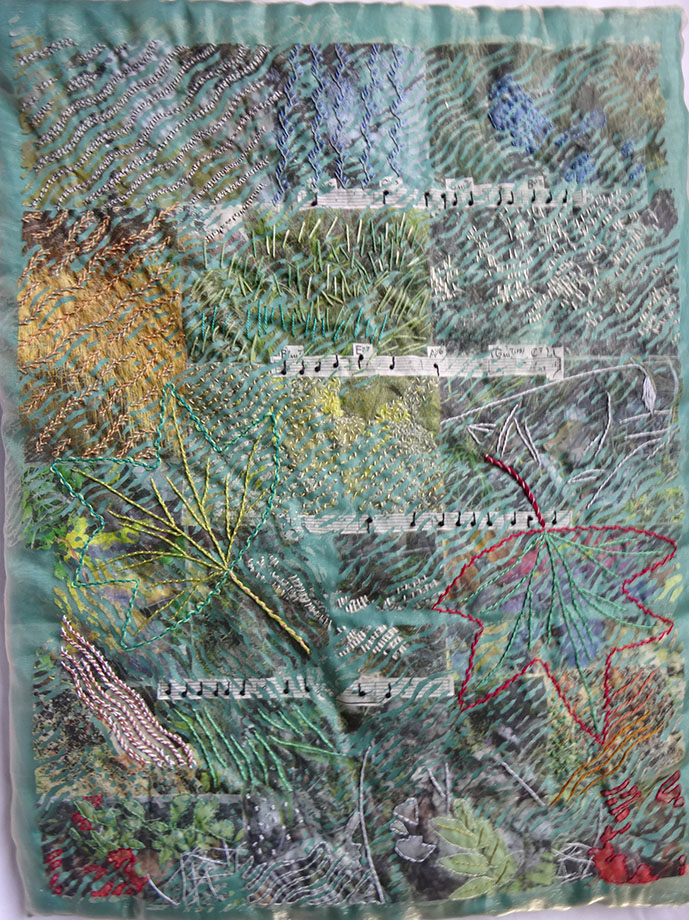
Eleonor Rollen. There’s Music Playing in the Forest
Paper lamination using photographs with added embroidery and stitches.
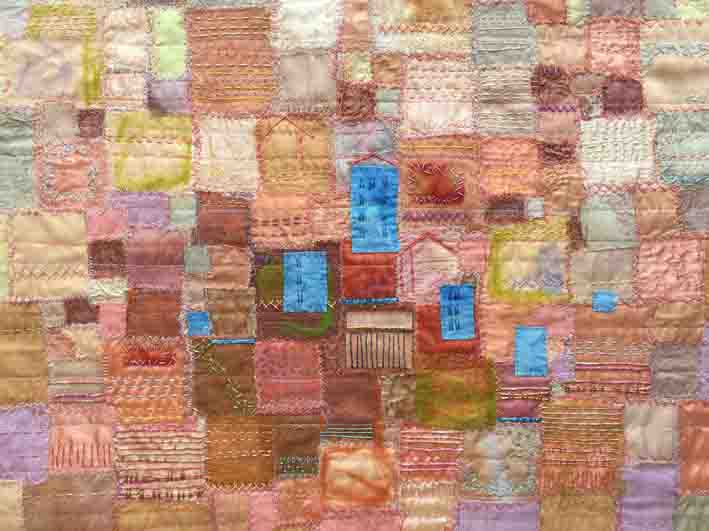
Kate Davis. Lisbon Revealed
Moving on and travel are represented by a visit to Lisbon. Fabrics and fleece are applied and additional details added with fabric collage and stitch.
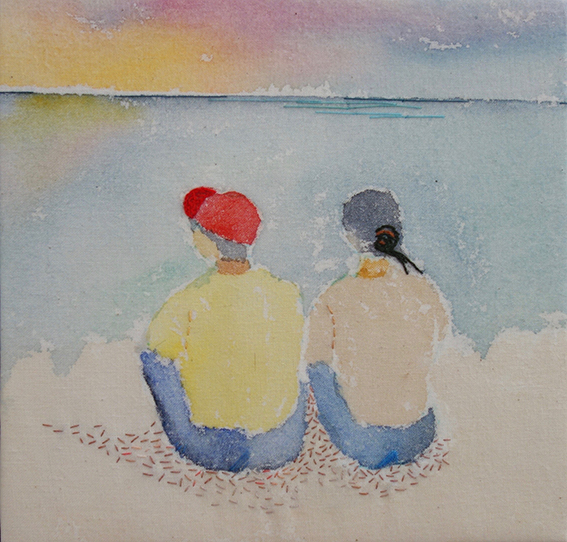
Jenny Black. From a Distance
Watercolour on calico with hand stitching.
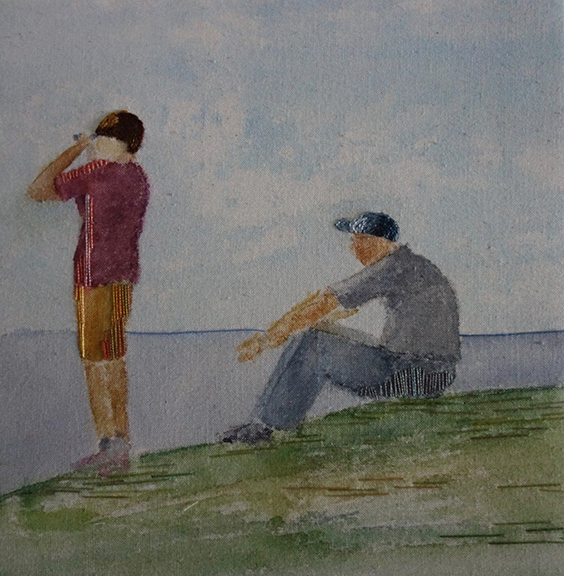
Jenny Black. It’s a Grandad’s Life
Watercolour on calico with hand stitching.
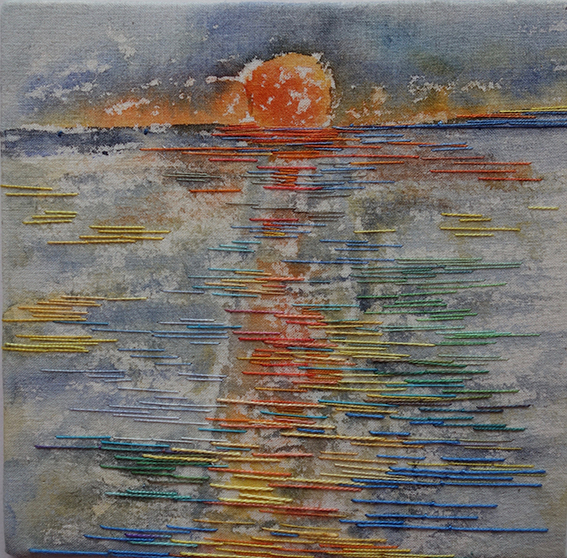
Jenny Black. Beyond
Watercolour on calico with hand stitching.
Buffy Fieldhouse
We were treated to a wonderful array of beautiful vestments and yet again I wondered how such detailed and amazing embroidery was carried out without the benefit of modern lighting and glasses.
There was a cloth of gold and garnet set consisting of chasuble and two dalmatics worn by the priest, deacon and sub-deacon for important festivals. By the number of garnets these garments must have been very heavy to wear and unusual to find in such a small fairly simple parish church. There was intricate gold work on many pieces, which are now being conserved, a task that takes time and money and is yet to be fully completed as there are 194 pieces in all.
Some of the pieces appeared of less ornate designs but still the workmanship was exquisite. I am not someone who enjoys metal thread work as I generally find it too detailed and gaudy, but the visit gave us a small insight into an amazing collection. It is generally only exhibited once a year at the beginning of June unless by special arrangement and it is well worth a visit.
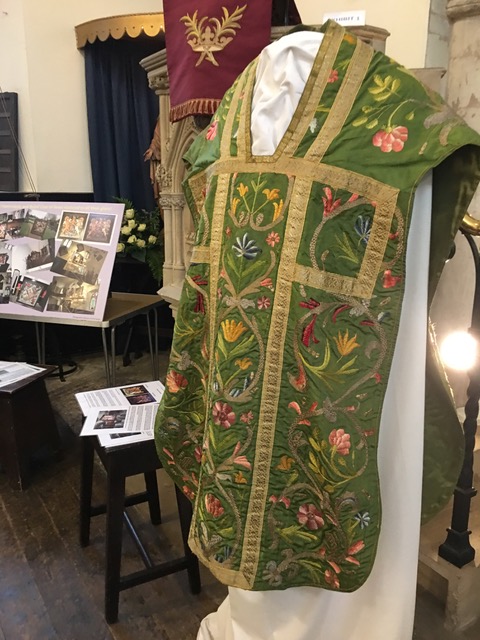
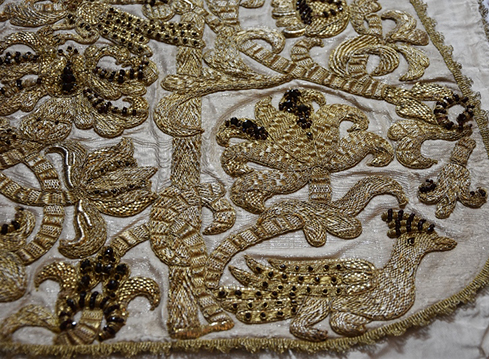
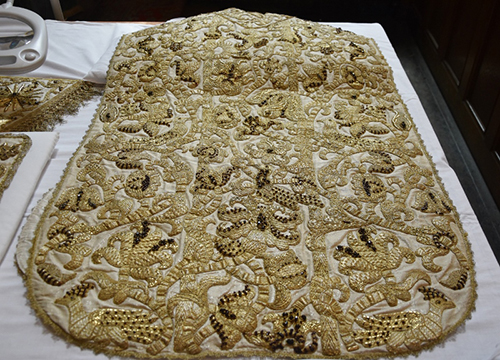
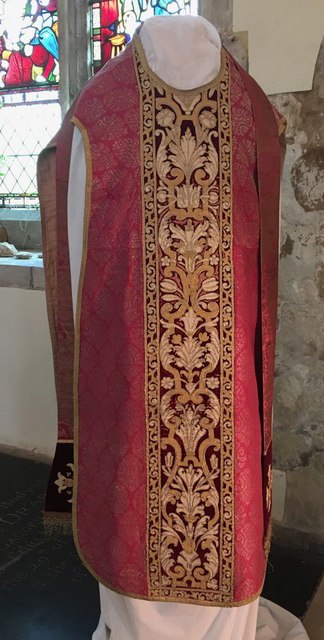
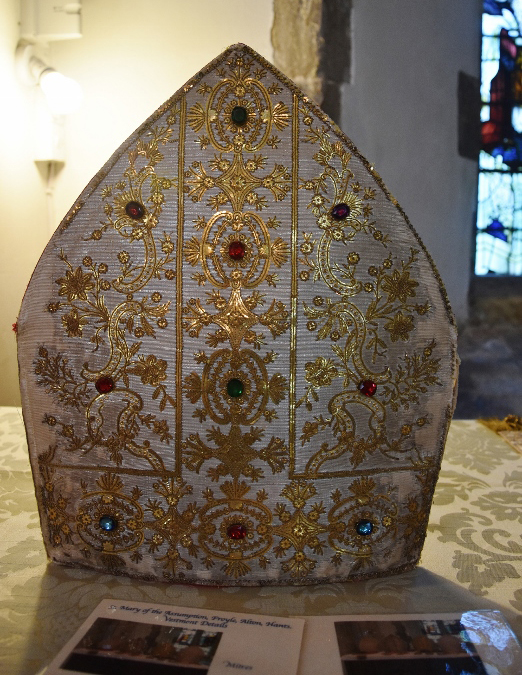

The NEG garden party. June 2017
Kay Ashby
I thought you might like a letter to tell you about the Summer Lunch.
First of all, how does Ann do it? Every year the day the Summer Lunch comes around we always seem to have gorgeous weather.
So we had an excellent start. Gorgeous garden, lovely weather and interesting company, what else was needed? A good lunch! It is not that surprising that those who can design and stitch have an eye and the necessary skill to produce delectable food.
Do come next year if you missed out this time.
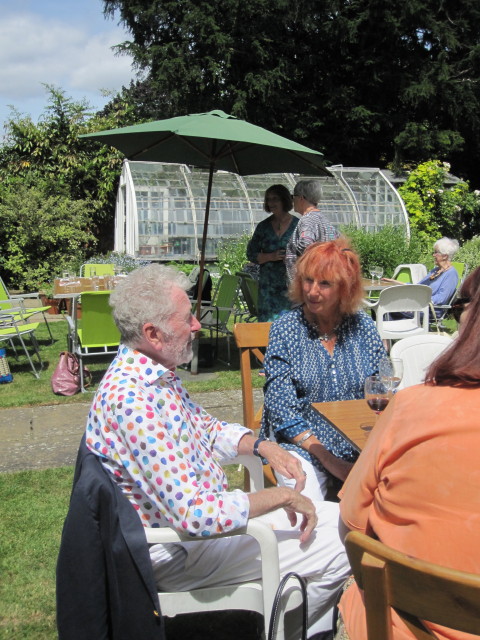
Our new President, John Allen, with former Chairman, Liz Ashurst
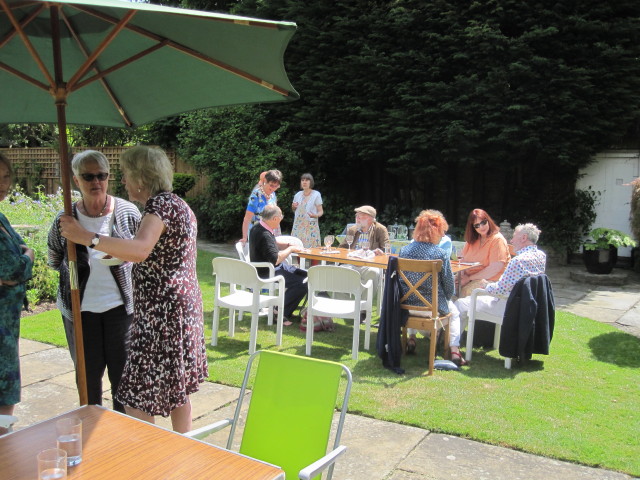
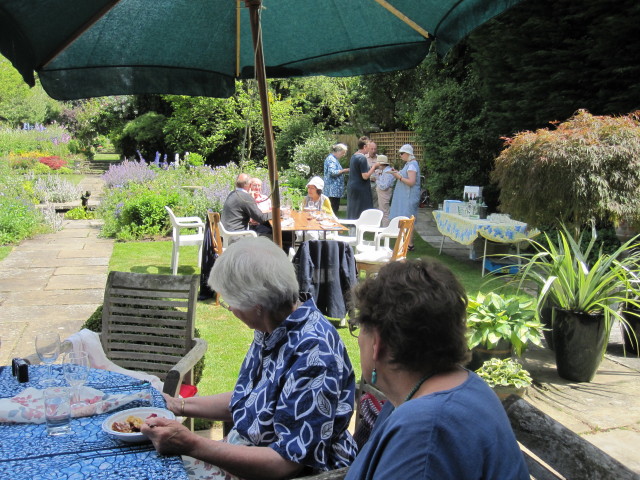
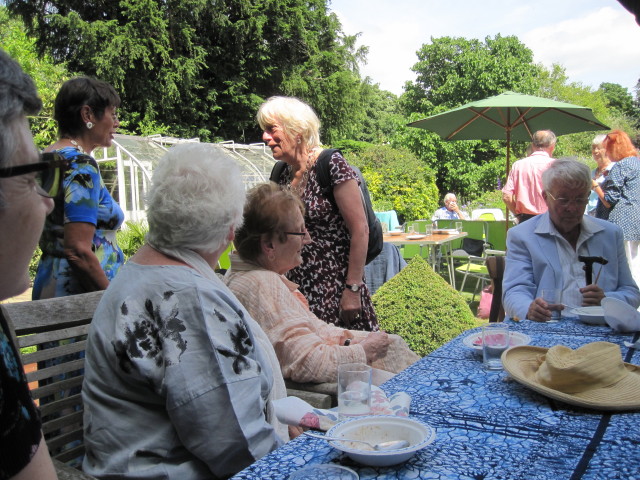

Paper Lamination Workshop
with Christine Chester. May 2017
Kay Ashby
At the end of the day we went home with some interesting pieces of fabric, some more successful than others, but we had learned enough to know what could be done to get a better result or achieved by another method more effectively. We had, though, had a really good day and learned a lot from a generous and enthusiastic tutor.
Visit to the V&A, January 2017
Opus Anglicanum Masterpieces of English Medieval Embroidery
Margaret Mary Griffiths
Now for something different, the Syon Cope 1310-20, this is strikingly bold and simple. The figures are very clear and the seraphs terrifying. The plain background is underside couching of silk twist in two colours, red (now brown) in the quatrefoils and green between them. The figures are highlighted in silver gilt thread.
The Vatican Cope 1280-1300 is made of red silk twill and the figures fit into an Islamic pattern with eight sided stars interlocking to form another geometric shape. The characters are graceful and appear upright when the Cope is worn, but the seraphs stand on guard. This may have been a present to the Pope from Edward I.
The Jesse Cope 1310-25. The figures here, mostly old Testament prophets much resemble those in manuscript paintings of the period. They are embroidered on red silk, the tree of Jesse sends out delicate boughs encircling them.
The Butler Bowden Cope 1335-45 was purchased by the V&A in 1955 with the assistance of seven City Livery Companies and others. Covered in figures on red silk velvet in three tiers of Gothic arches made of oak branches the entwined biblical Holies are guarded by Lion heads once covered in pearls, only one is still so adorned. Two parrots sit at the top.
The Vic Cope 1350 -75 (Vic Cathedral is north of Barcelona). This is made of red silk velvet covered in lacy columns and arches of intertwined branches, the green man prominently on guard. There are 24 saints with their names written above, their drapery emphasised by raised cord out lines covered in silver-gilt thread. This exhibition represents a large collection of medieval talent including Panels, Chasubles, Orphreys and other Church vestments. One picture shows the baby Mary using a three-wheeled baby walker. There is a pair of Episcopal Stockings and shoes 1171- 1200 belonging to Hubert Walker, Archbishop of Canterbury, found with other apparel in his sarcophagus.
Some pieces are of historical significance. A Mitre with the slaughter of St Thomas a Becket and St Stephen. Was the church making a political statement?
There are only a few secular exhibits. The Surcoat and Shield 1376 belonging to the Black Prince, these once hung over his tomb in Canterbury Cathedral, his achievements. The Surcoat is linen padded with wool and covered in silk velvet and embroidered with the royal arms of France and England, fleurs-de-lys and heraldic lions. This Surcoat was worn over armour and must have looked magnificent.
We had expert advice on hand, Elizabeth Elvin was able to answer our questions, for example she showed us how by tightening a split stitch as you stitched round a face you could emphasise the contours.
All thanks to those who organised the outing.
14.11.2016
NEW EMBROIDERY GROUP EXHIBITIONS 2016
The Oxmarket gallery, Chichester in September and the Spa Gallery, Tunbridge Wells in October.
The theme was Fusion and work had to be at least a metre in one direction.
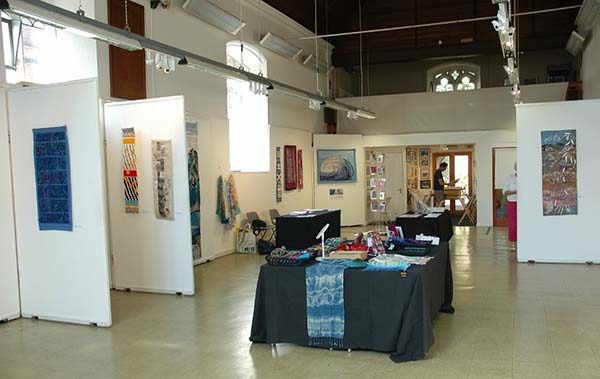


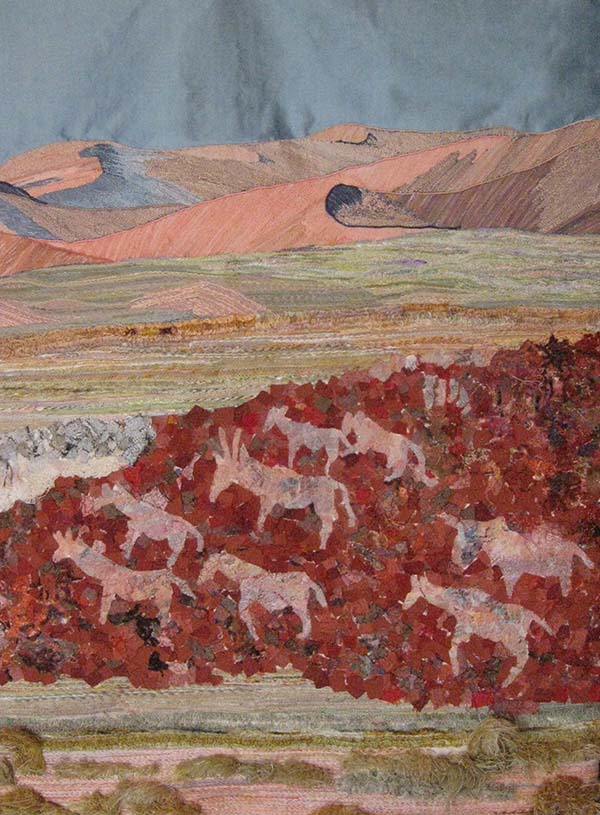
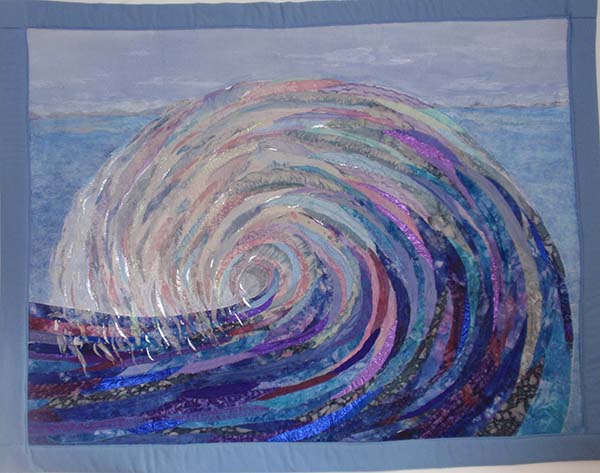

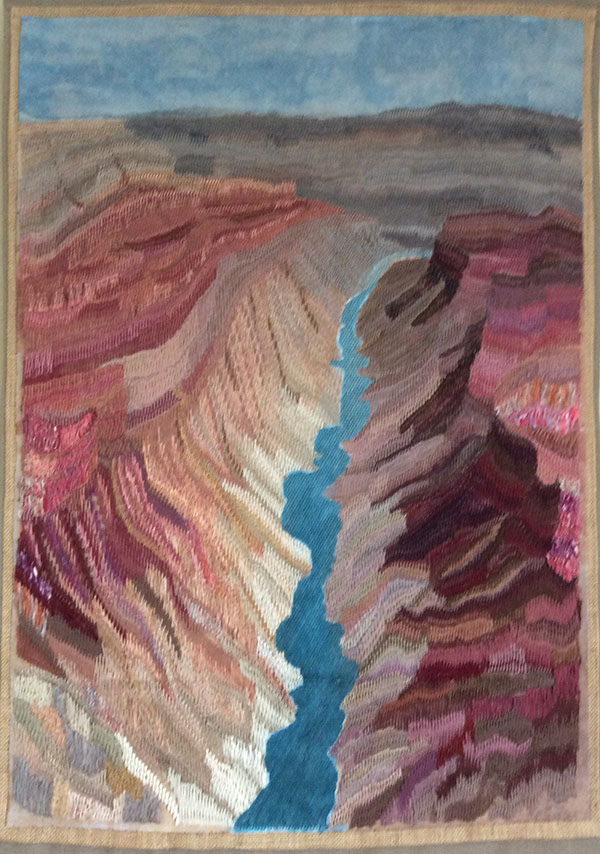
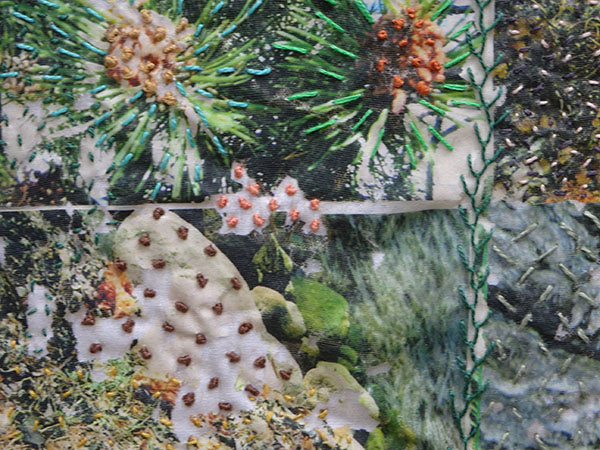
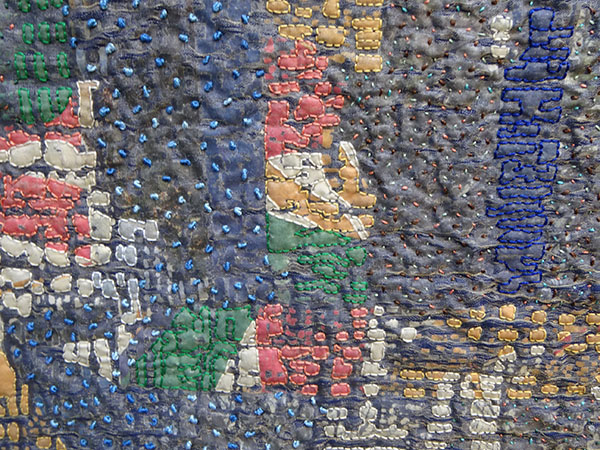


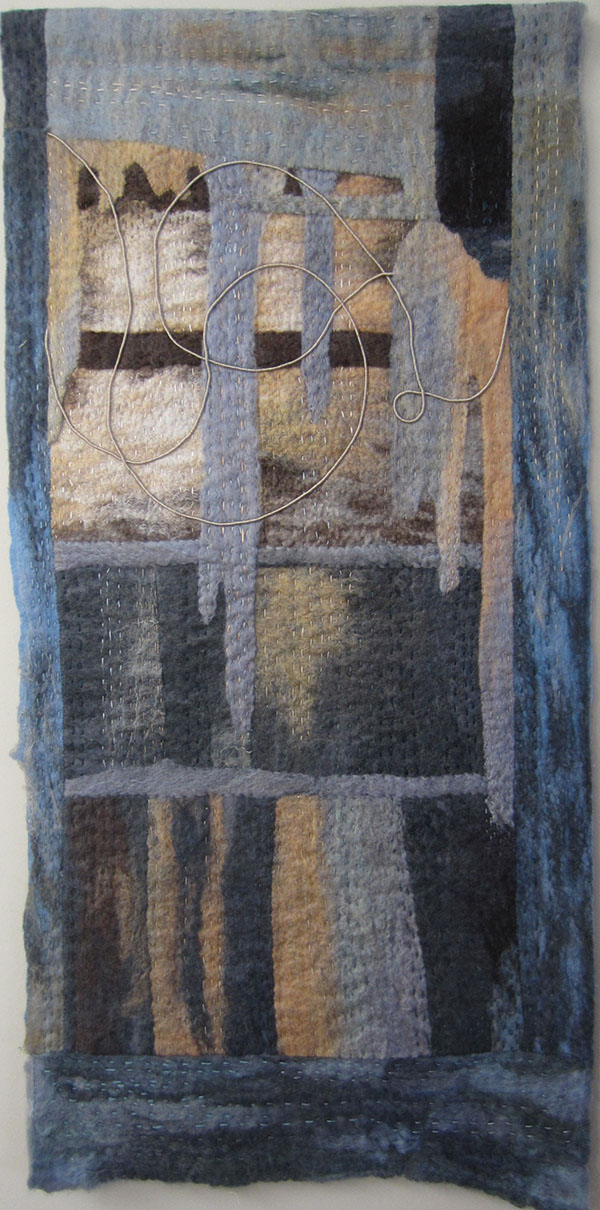

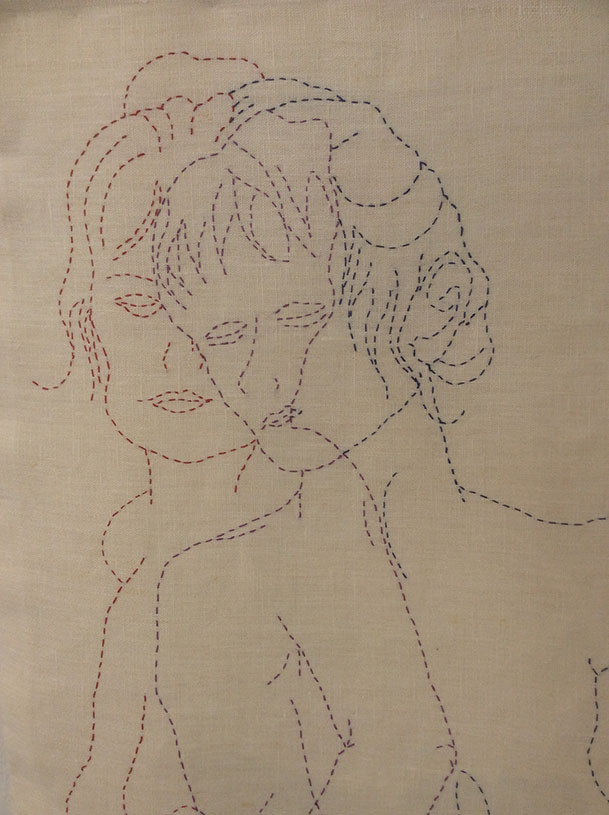
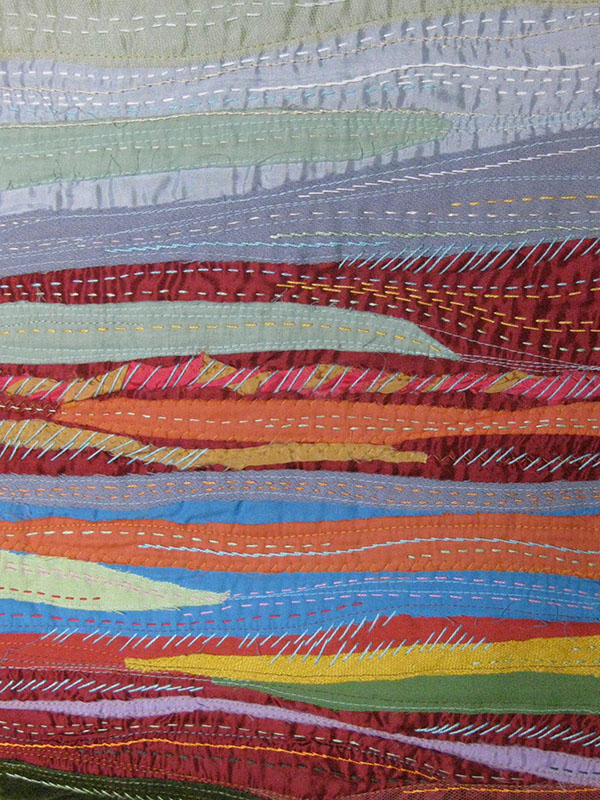
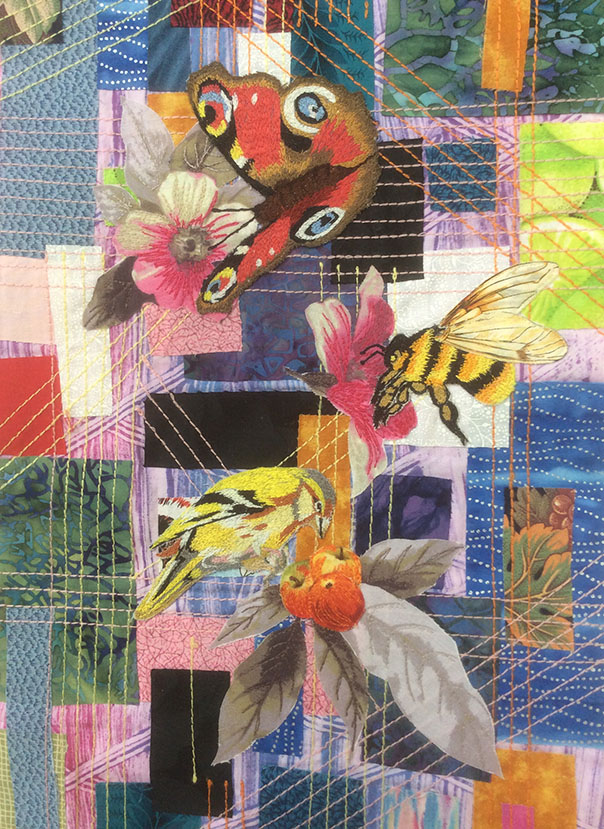
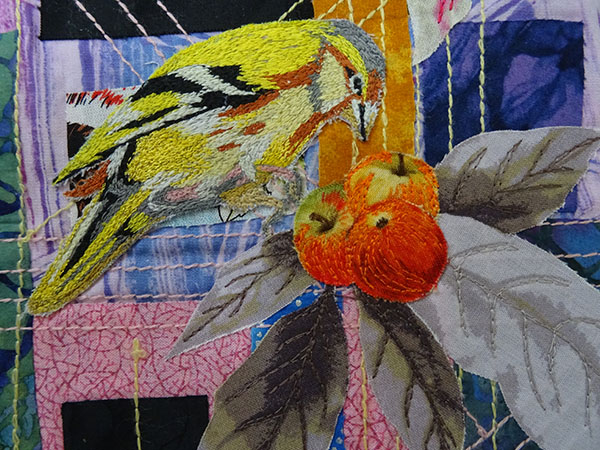
Nature Trail, detail
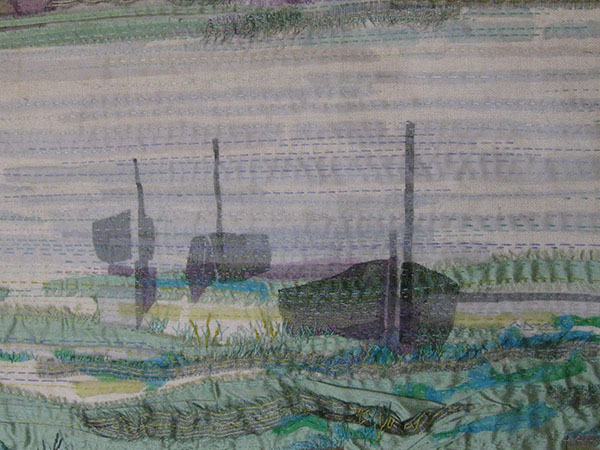
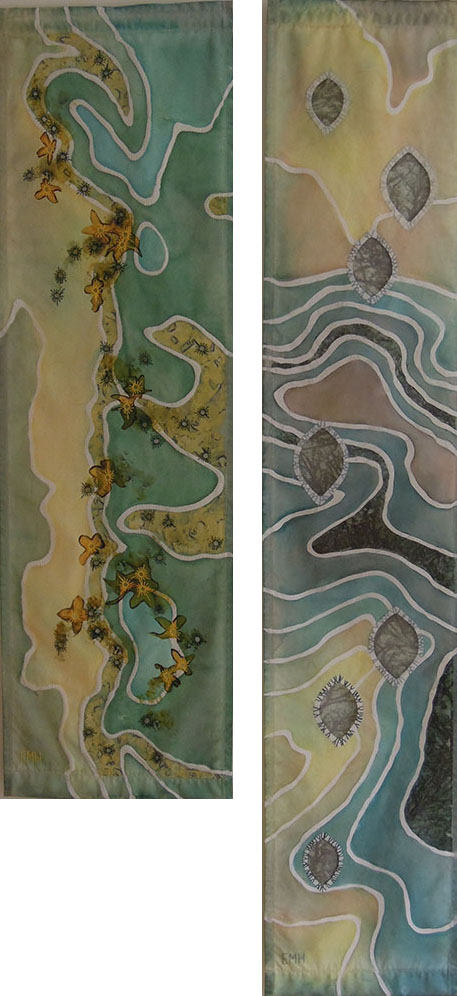

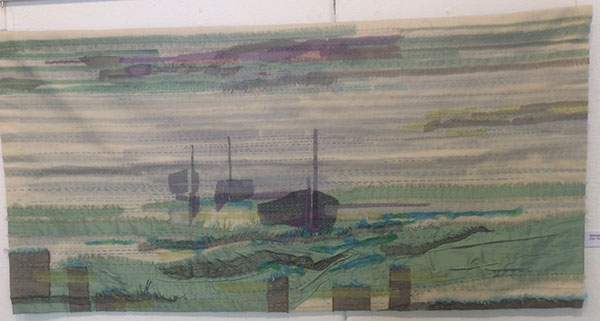

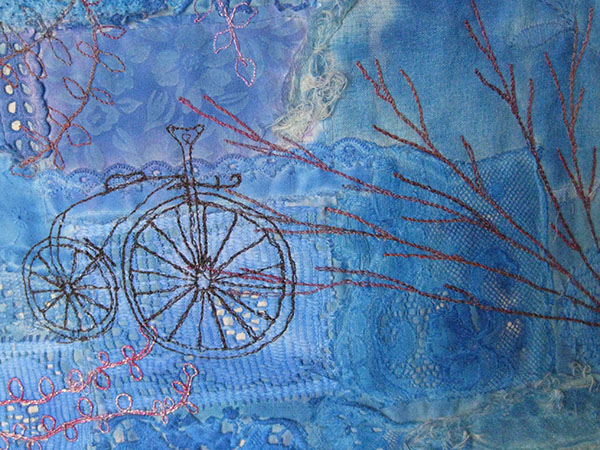
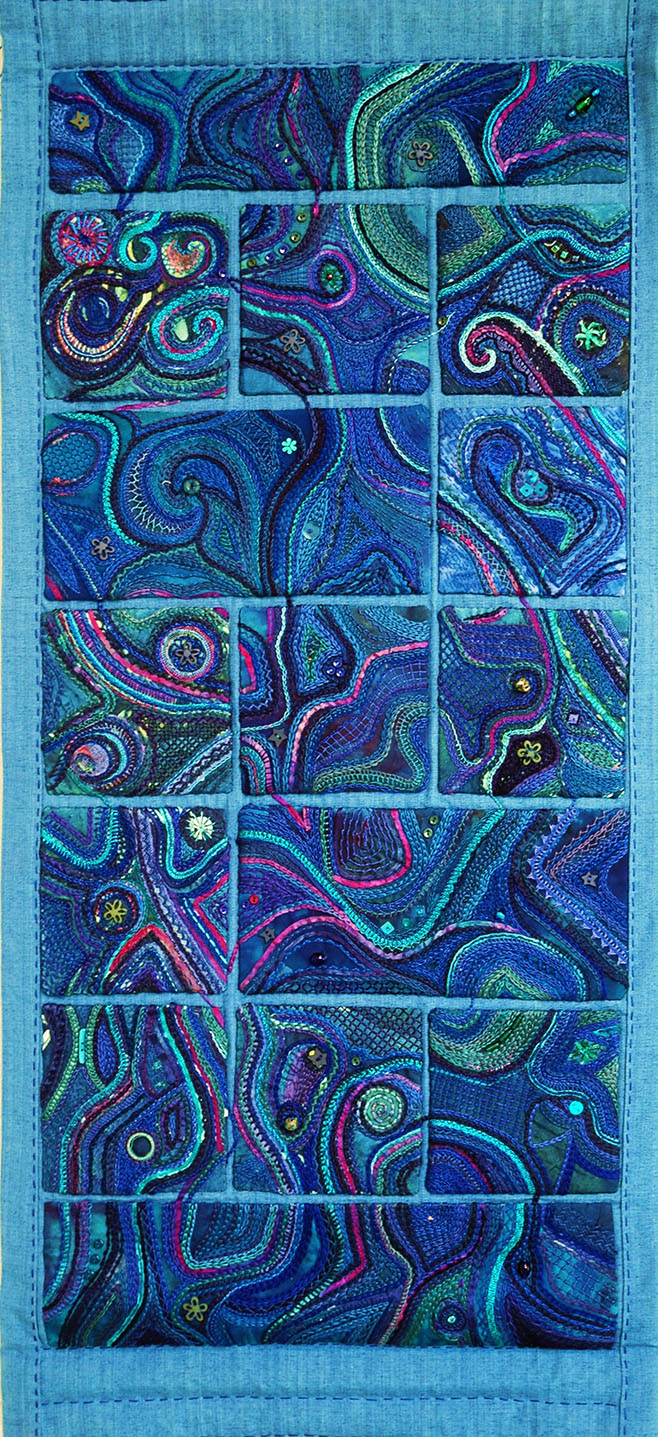
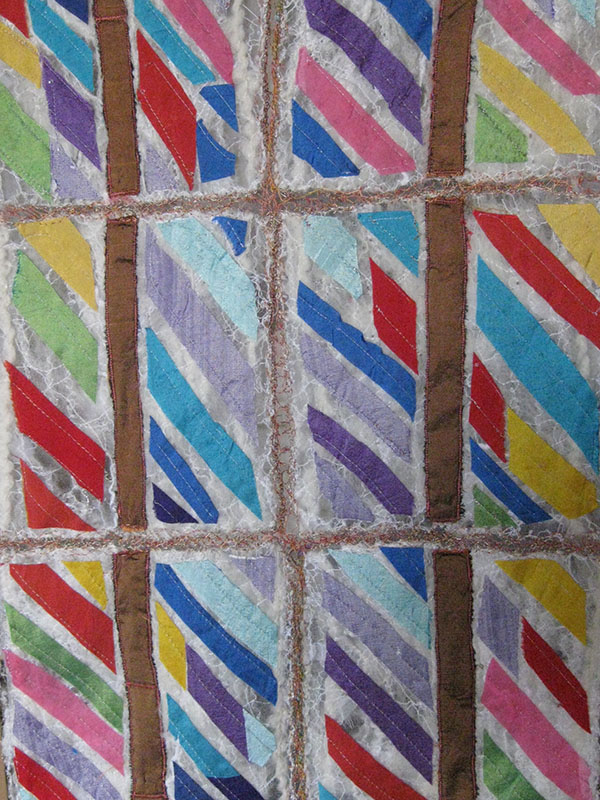

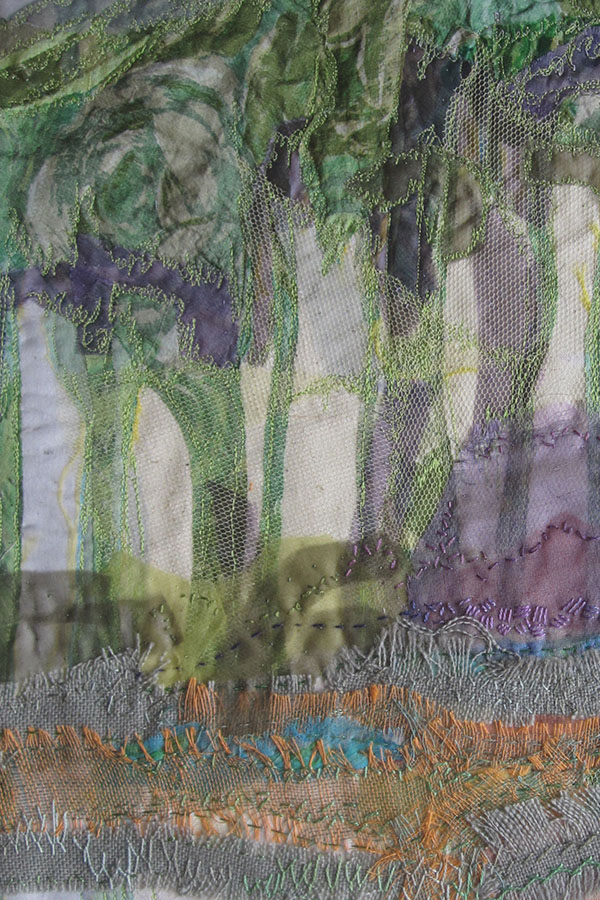

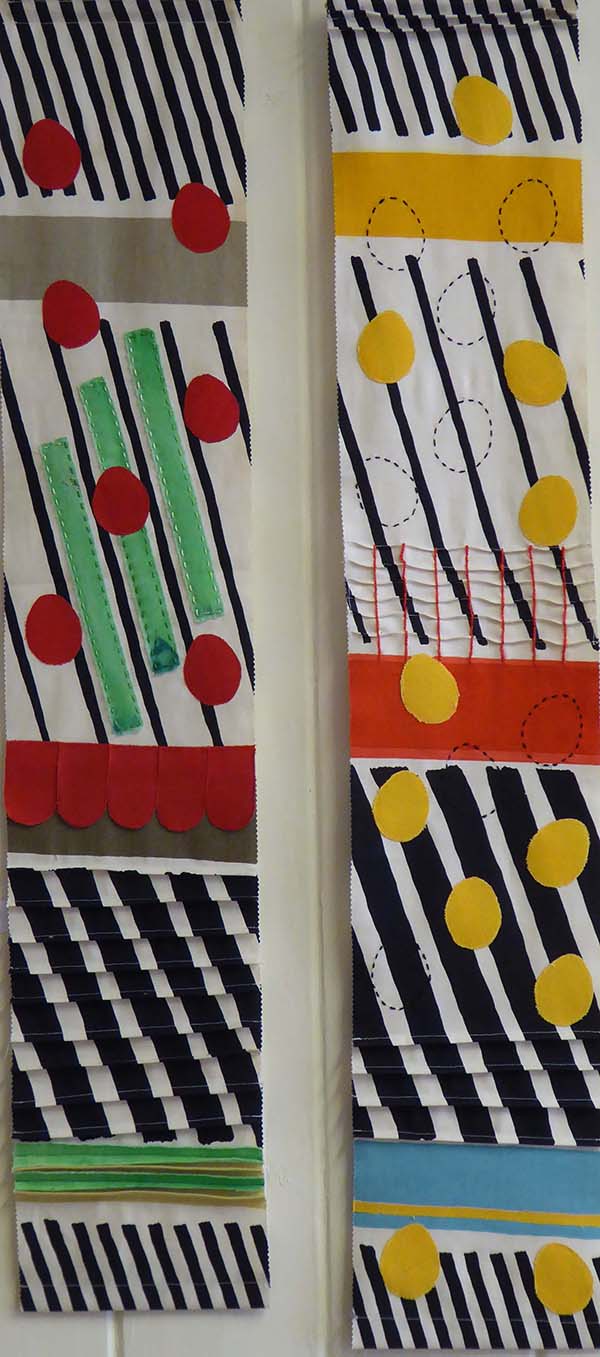

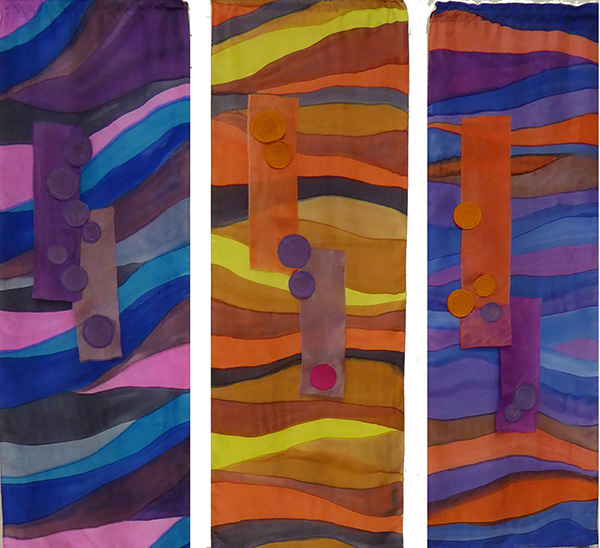







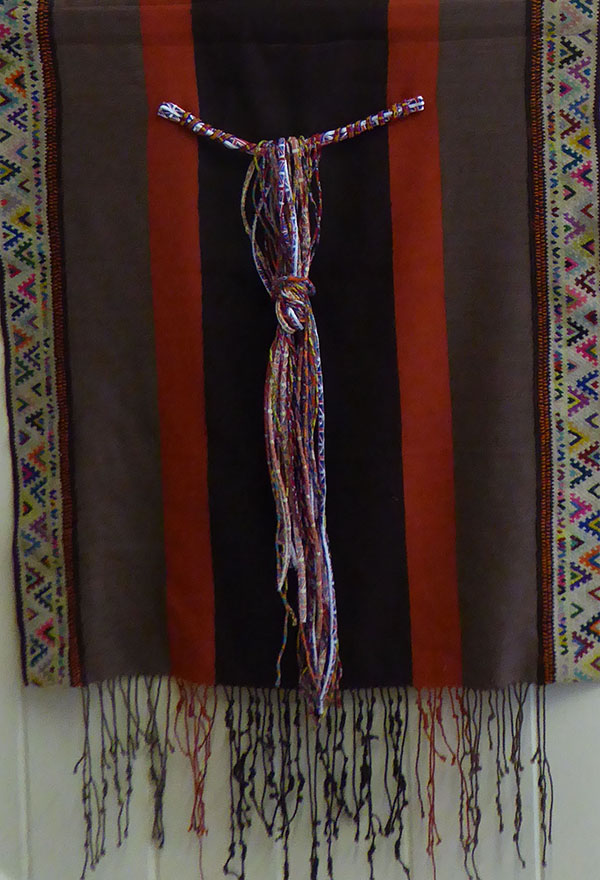
GEORGIA O’KEEFFE EXHIBITION VISIT
Alison Hird-Beecroft
She went on to paint New York cityscapes of which there were some examples, and this continued until the Wall Street Crash. She visited New Mexico and investigated abstracts in nature and this also influenced Stieglitz.
She fell in love with New Mexico, staying in Taos and had a special feeling about the area. She eventually bought a house there, an adobe. Here she met photographer Ansel Adams who became a lifelong friend. She loved the earth-built architecture of the area and the influence of the Native Americans together with Spanish colonial influence. There were no flowers, and her interest turned to animal bones and here began a series of paintings. Looking at the image of the sky through a pelvic bone it is impossible to tell if it is the bone or the sky that is the solid object. She also painted doorways, inspired from the buildings in the area, sometimes with very few lines, and just blocks of colour. She studied the way light falls on cliffs and mountains. The folds of colour and texture reminded me of the way fabric folds and falls over objects. Some of her last works were inspired by clouds as seen from above.
I found it an incredibly moving exhibition, particularly seeing how her early work influenced what she did in later life and I loved the structural nature of her work. It is hard to believe that you are looking at flat canvases.
4.08.2016
NEW EMBROIDERY GROUP GARDEN PARTY
Kay Ashby
